Curriculum Overview 2022-2023
Grove School: Curriculum
Grove School g
Contents
Creative Engineering and Hospitality (CEH) Faculty
Art & Photography
Business
Design and Technology
Information Communication Technology
English and Drama Faculty
English
Drama
Humanities, Music and Modern Foreign Languages (HMM) Faculty
Citizenship
Geography
German
History
Music Psychology
Religious Studies
Sociology
Grove School: Curriculum
g
Contents
Learning Support Faculty
Maths Faculty
Science Faculty
Key Stage 3 Science
Trilogy Science
GCSE Triple Science
A Level Biology
A Level Physics
Grove School: Curriculum
g
Grove School: Curriculum
Art & Design CEH Faculty g
Vision
Our vision for the Art Department is one of nurturing pupil’s natural abilities within Art and encouraging a love for the subject by allowing pupils to gain techniques in a wide range of media and by studying many different artists and art styles.
Art, craft and design embody some of the highest forms of human creativity. We aim to engage, inspire and challenge pupils, equipping them with the knowledge and skills to experiment, invent and create their own works of art, craft and design. As pupils progress, they should be able to think critically and develop a more rigorous understanding of art and design. They should also know how art and design both reflect and shape our history, and contribute to the culture, creativity and wealth of our nation.
Grove School: Curriculum
g
Context
We encourage pupils to understand the basis of art which comes from looking closely and giving them to tools they need to be able to reproduce images and objects as accurately as they can, given the knowledge they have learned, using the many different media and techniques shown to them.
In KS3: Students study 2 hours a fortnight in Art in Years 7 and 8 and 1 hour a fortnight in Year 9 as part of the Arts Award.
In KS4: Students study 5 hours a fortnight in Art & Design, Graphical Communication or Photography
In KS5: Students study 8 hours a fortnight in Art & Design, Photography, Graphics or 3D Design.
Grove School: Curriculum
g
Disciplinary Knowledge
Art has many forms, and it is important that, as well as their knowledge of practical techniques, students are able to explore the thinking and history behind the work of an artist, through timelines and research. Students should be able to engage in debate and discussion about Art both generally and when visiting an Art Gallery. In addition, students should gain knowledge about the differences between traditional, modern and contemporary Art through our teaching, videos and displays.
Grove School: Curriculum
g
Supra Curriculum
Supra-curricular activities are things that you do to extend and deepen your knowledge of the curriculum. Below are some examples.
Online galleries: www.tate.org.uk www.saatchigallery.com
www.nationalgallery.org.uk
www.musee-orsay.fr/en
Local galleries: www.wolverhamptonart.org.uk/visit/wolves thenewartgallerywalsall.org.uk liverpoolmuseums.org.uk www.birminghammuseums.org.uk
Reading lists:
‘You should know Art’ series by Prestel.
‘The Story of Art’ by E. H. Gombrich.
Grove School: Curriculum
g
Grove School: Curriculum
Key Stage 3 Art & Design g
Autumn Term – Year 7
Stones and Bones (Natural forms)
• Lesson on elements of Art
• Drawing stones and bones in various media
• Create a sculpture based on natural forms
KS3 Curriculum Road Map

Summer Term – Year7 Still Life
• Ralph Goings work
• Set up a still life of every- day object
• Create a still life picture. Inspired by Ralph Goings


Art & Design
Autumn Term – Year 8 Africa
• Draw African Patterns
• Colour using oil pastels
• Construct 3D mask in card or make a clay pot using the African patterns observed
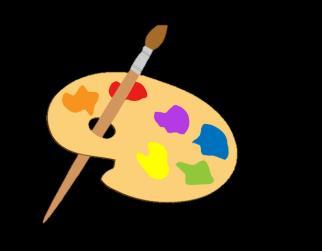
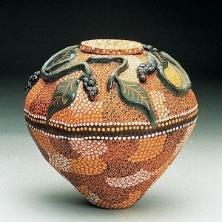
Spring Term – Year 8
Animals & Insects
• Draw an image of an animal or insect in sketchbook.
• Draw another image onto A3 sugar paper
• Look at the work of Deborah Shapiro for inspiration.
• Create a collage based on animal drawings

Summer Term – Year 8
Francis Bacon-Distorted Faces
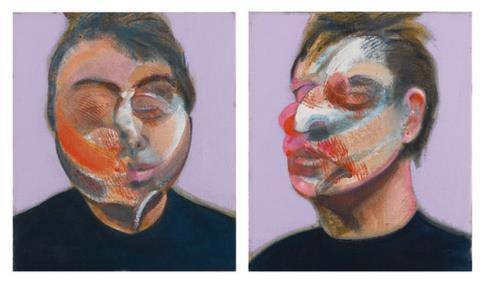
• Copy a Francis Bacon
Spring Term – Year 7
John Piper Painting
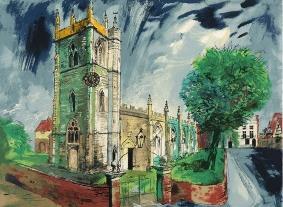
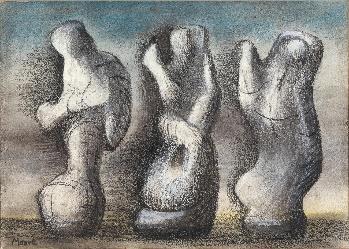
• Cop a piece of Pipe o k
• Draw from a photograph of Market Drayton Town
• Create your own Piper style painting from your Market Drayton picture.
Year 9
Personal project
• Themes introduced
• Research
• Development of ideas through a range of techniques
• Final piece
• Draw from your own distorted face
• Create a final painting in the style of Francis Bacon
E e child i an a i
–
g
Pablo Picasso
Year 7
Students will enter Year 7 with a range of different experiences from Key Stage 2. This being the case, our journey will begin by learning the visual elements of art. These concepts underpin art technique and a student’s ability to articulate their thought processes whilst creating art. The visual elements are threaded throughout Key Stage 3 so that students have the opportunities to explore and develop them in a greater level of detail. In Year 7 specifically, students will explore shape, form, texture and tone whilst studying Henry Moore and natural forms. This will be expanded into exploring how a range of artists use these visual elements to create art in different ways and media.
In Spring, students will then focus on their local landscape for inspiration as many artists before them. We will study the use of pattern, line and colour to create compositions with mixed media and students will be encouraged to photograph their local environment. Finally we will move into the world of realism. Students will be encouraged to apply their knowledge of the visual elements and the techniques they have been taught to create a still life painting from observation demonstrating the progression they have made.
Grove School: Curriculum Narrative
g
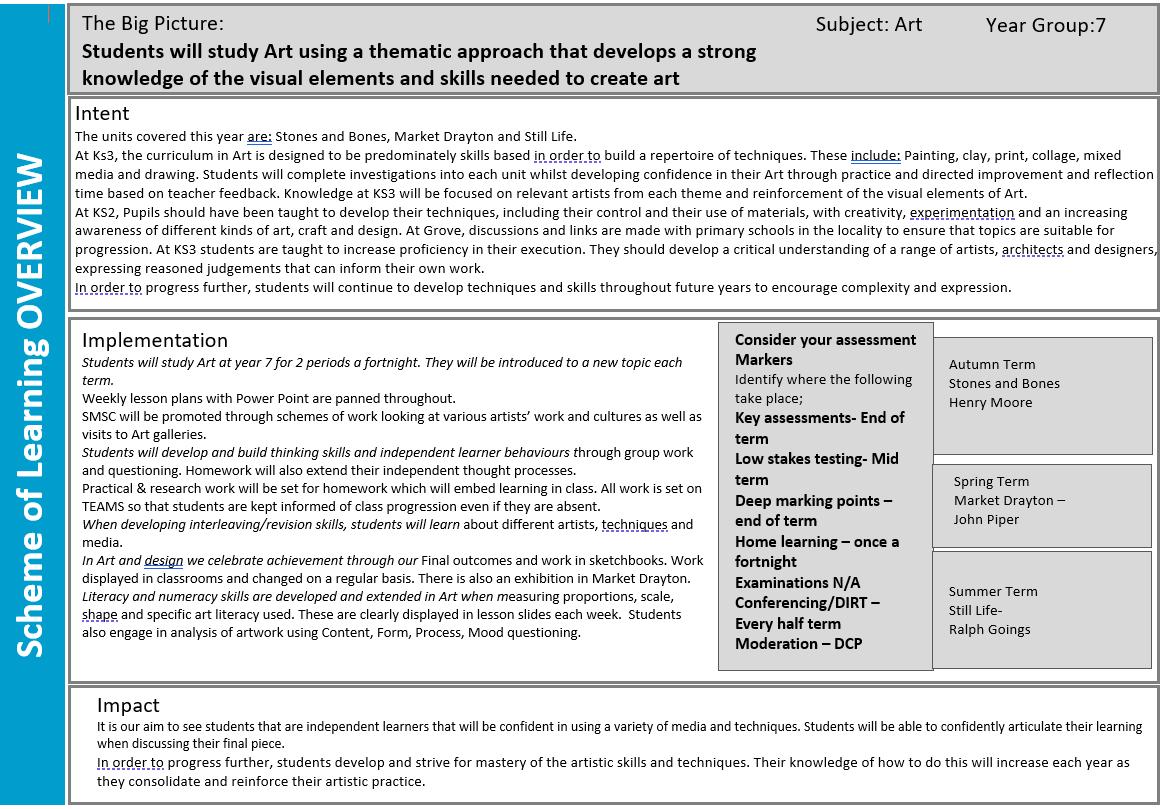
g
Year 8
This year we will build upon the knowledge gained in Year 7. Again, our learning of visual elements will be important. We will expand on knowledge of other cultures and how art has developed in African / Aboriginal art. Next, we will explore a variety of collage artists with a focus on Deborah Shapiro to create an animal and insect final piece. Finally, we will explore the emotional and expressive qualities of Art through a variety of expressionist art with a focus on distortion and Francis Bacon. This will culminate in a final painted piece.
Grove School: Curriculum Narrative
g
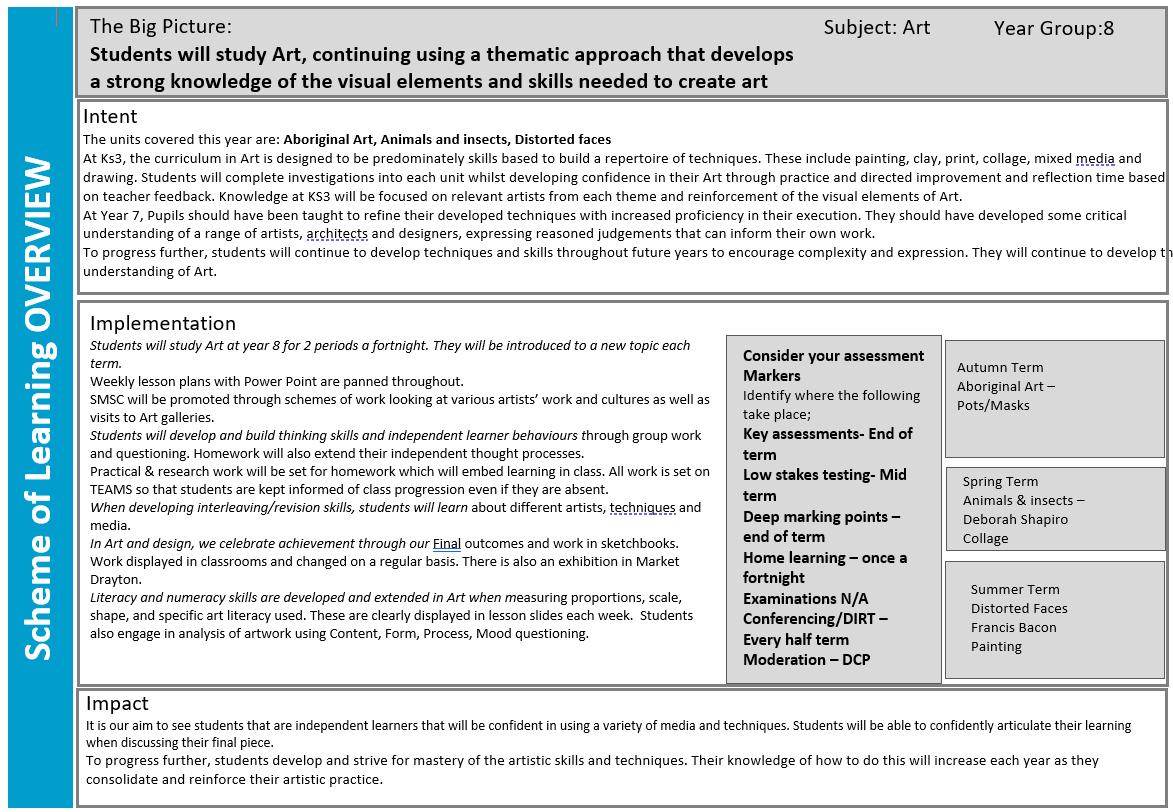
g
Year 9
This year we will focus on developing student independence through a thematic approach of their own choice. Students will be encouraged to focus on an artist of their own selection from which to base their original studies. They will be encouraged to develop authenticity in their work by taking their own photographs, sketching from observation and reinforcing techniques learned in Year 7 and Year 8. This will culminate in a final piece in a media of their own choice.
Grove School: Curriculum Narrative
g

g
Grove School: Curriculum
Key Stage 4 Art & Design g
Year 10
In Year 10, students will begin their self-directed projects using a thematic start and the culmination of knowledge and techniques acquired at Key Stage 3. They will be begin researching artists that could provide inspiration for their own studies. In addition, they will demonstrate skills in a variety of media such as drawing and painting whilst developing a contextual knowledge of the art they are inspired by. This will then lead on to students creating a portfolio of work to be submitted as 60% of their overall mark at GCSE.
Grove School: Curriculum Narrative
g
Year 11
At the start of year 11, students will continue to produce coursework for their portfolio, culminating in a final large piece of Art.
In the January of Year 11, the exam board (OCR) will provide learners with themes, each with a range of written and visual starting points and stimuli. A response should be based on one of these options. Students will be expected to generate a substantial amount of research, sketches and studies before sitting a 10 -hour externally set task where they will create a final piece.
The weighting of the individual units are as follows:
Portfolio: 60% (120 marks)
Externally set task: 40% (80 marks)
Grove School: Curriculum Narrative
g

g
Grove School: Curriculum
Key Stage 4 Photography g
Year 10
In Year 10, students will begin to learn techniques to use in their self -directed projects. It will be expected that students demonstrate a commitment to taking photographs outside of school as well as in lessons due to the restrictions in class. They will be set a range of tasks to complete starting with researching artists that could provide inspiration for their own studies. In addition, they will demonstrate skills in a variety of media whilst developing a contextual knowledge of the art that they are inspired by. Students will also study the visual elements of art and photography to enable them to annotate their work effectively. This will then lead on to students creating a portfolio of work to be submitted as 60% of their overall mark at GCSE.
Grove School: Curriculum Narrative
g
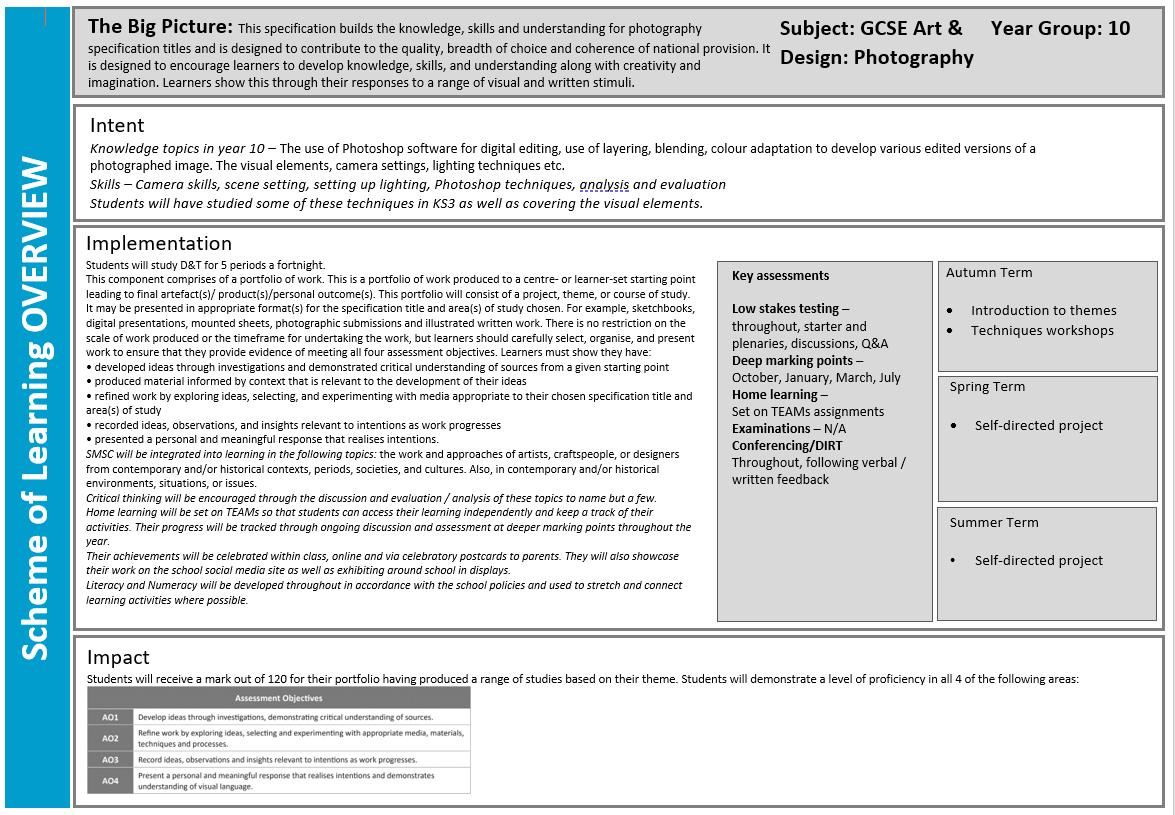
g
Year 11
At the start of Year 11, students will continue to produce coursework for their portfolio, culminating in their final photographic piece/s.
In early January, the exam board (OCR) will provide learners with five themes, each with a range of written and visual starting points and stimuli. A response should be based on one of these options. Students will be expected to generate a substantial amount of research, sketches and photographic studies before sitting a 10 -hour externally set task where they will create a final piece. This may be a series of edited works using Photoshop.
The weighting of the individual units is as follows:
Portfolio: 60% (120 marks)
Externally set task: 40% (80 marks)
Grove School: Curriculum Narrative
g
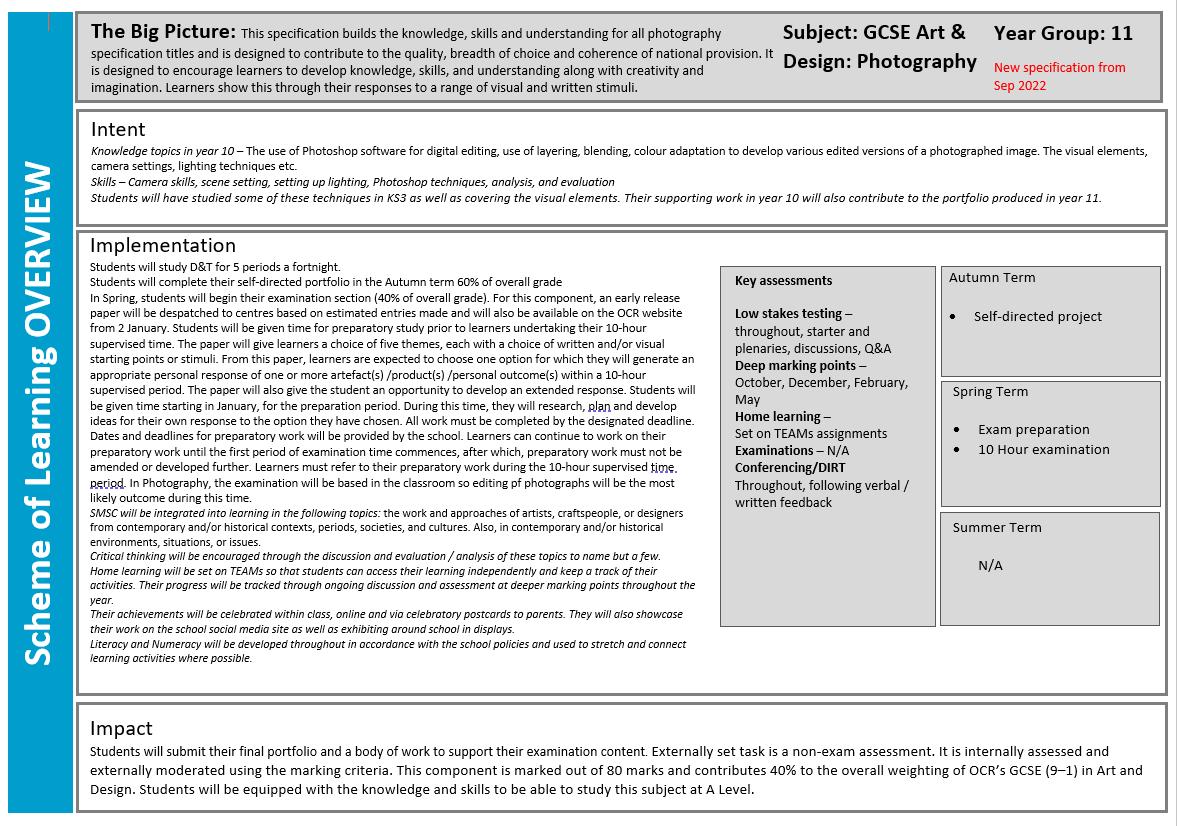
g
Grove School: Curriculum
Key Stage 4 Graphic Communication g
Year 10
In Year 10, students will begin their self-directed projects using a thematic start and the culmination of knowledge and techniques acquired at Key Stage 3. They will also be introduced to new techniques that will support their studies as well as editing software that can be used to create digital content.
They will be begin researching designers that could provide inspiration for their own studies. In addition, they will demonstrate skills in a variety of media such as drawing, printing, photography and paint whilst developing a contextual knowledge of the types of design they are inspired by. This will then lead on to students creating a portfolio of work to be submitted as 60% of their overall mark at GCSE.
Grove School: Curriculum Narrative
g
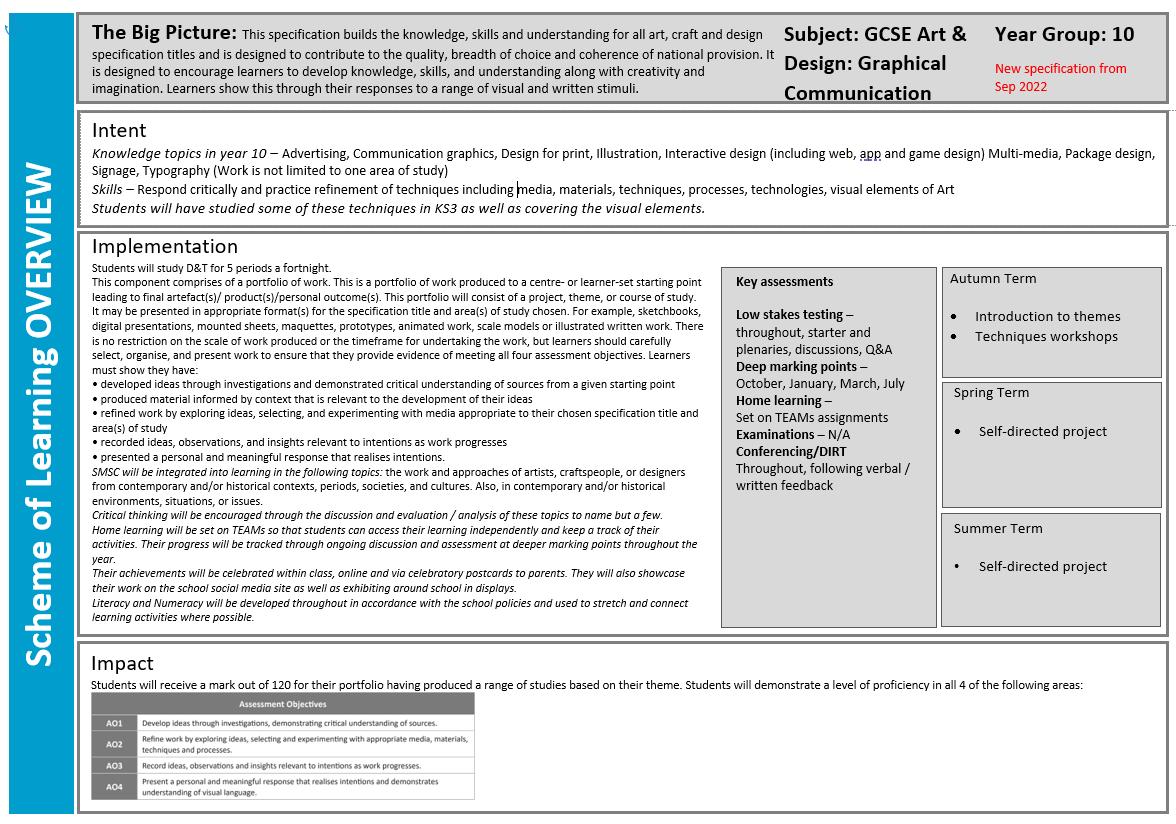
g
Year 11
At the start of Year 11, students will continue to produce coursework for their portfolio, culminating in a final large piece of Graphic Design. In early January, the exam board (OCR) will provide learners with themes, each with a range of written and visual starting points and stimuli. A response should be based on one of these options. Students will be expected to generate a substantial amount of research, sketches, photography, digital designs and studies before sitting a 10 -hour externally set task where they will create a final piece.
The weighting of the individual units is as follows:
Portfolio: 60% (120 marks)
Externally set task: 40% (80 marks)
Grove School: Curriculum Narrative
g

g
Key Stage 5
Art & Design
Photography
3D Product Design
Graphic Communication
Grove School: Curriculum
g
Year 12
Unit 1 enables learners to gain and develop comprehensive knowledge and understanding of the hospitality and catering industry including provision, health and safety, and food safety. From September of Year 10, students will learn to apply this knowledge through a series of practical tasks so that they can develop their independence ready for their set assignment (unit 2) in June.
In June, unit 2 will be released. This enables learners to develop and apply knowledge and understanding of the importance of nutrition and how to plan nutritious menus. They will learn the skills needed to prepare, cook and present dishes. They will also learn how to review their work effectively. Students will continue this unit into year 11.
Grove School: Curriculum Narrative
g
Year 13
This students will continue with their set assignment as well as planning for their practical demonstration where they will design a 2-course menu and serve it to staff and students. Once completed, students will revisit prior learning that they have applied throughout the course to begin preparing for their final exam in June.
The weighting of the individual units is as follows: Unit 1 40% (external exam) of final grade, Unit 2 (set assignment) together are 60% of the final grade.
Grove School: Curriculum Narrative
g
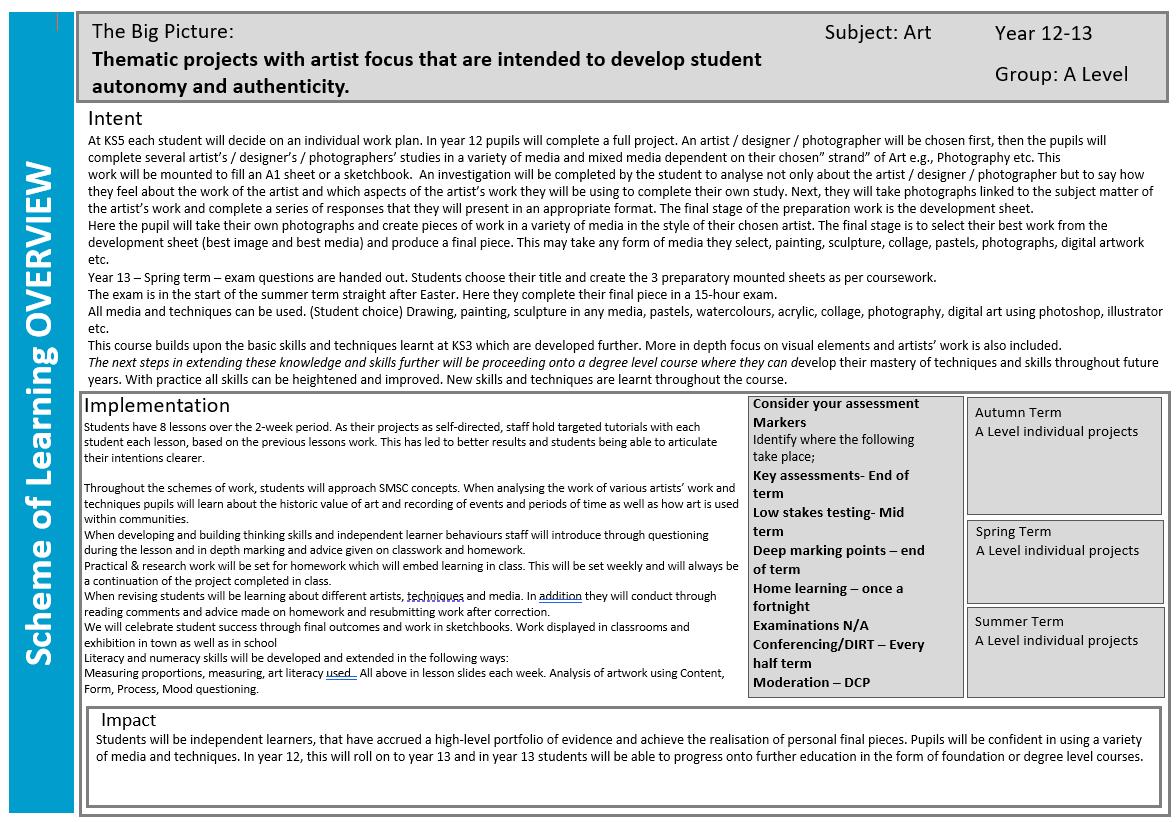
g
Grove School: Curriculum
Business Studies CEH Faculty g
Vision
Economics and Business Studies play such an important role in our daily lives. At Grove School, we passionately believe that access to both subjects, and a developed understanding of these, will significantly enhance the opportunities available to young learners.
We are an energetic and ambitious team, who seek to deliver rich and innovative lessons that enthuse our students about Business and Economics and equip them with the skills they need to support future aspirations. Our results reveal that students flourish in our classrooms and benefit from the support and feedback we give. We are very successful classroom practitioners who work well as a team, but offer individual and varied teaching styles.
We offer both Economics and Business Studies at Grove.
Grove School: Curriculum
g
Department: Staffing and Expertise
Conor McStay Business and Economics teacher to GCSE and A Level
Teaching both subjects since 1998
Current role Deputy Director of Studies
Previous roles Assistant Head of Year, Head of Year, Head of House, Senior Leadership Team.
Paul Duerden Business and ICT Teacher
Teaching since 2014
Current role Head of Year 8
Previous roles Head of Department
Grove School: Curriculum
Key skills that we hope to develop in a Business and Economics student:
Knowledge
Application
Oracy
Investigative
Analysis
Evaluation
Grove School: Curriculum
•
•
•
•
•
•
•
Confidence
The Ascent of the Business Curriculum
The intent is to achieve ascent within the Business curriculum journey at both Key Stage 4 and 5. This means that concepts that are generally understood by students are elevated to new aspects and generality allowing the students the opportunity to develop and improve their knowledge, be able to articulate this confidently and to challenge accepted conventions, rethink and recreate.
Grove School: Curriculum
Overcoming cumulative disfluency in the KS4 and KS5 Curriculum
• Sticky Knowledge
• Knowledge checks
•
Key term starters
•
Glossaries
•
Revision grids
• PLC s
• Independent learning folders
• Past Paper questions to perfect exam technique
Grove School: Curriculum
Context
We study Edexcel GCSE Business (9-1). Lessons are taught in mixed ability groupings. We deliver 4 lessons per fortnight for GCSE Business. The subject is assessed across 2 papers. It is entirely examination based:
Paper 1 (50%) Investigating small business
Paper 2 (50%) Building a business
Each exam is 90 mins long and worth 90 marks. Questions range from 1 -12 marks on both papers
At A-Level, we offer Edexcel A Level Business and Edexcel A Level Economics qualifications. We deliver 9 lessons per fortnight. The subject is assessed across 3 papers:
Paper 1 - (35%) Marketing, People and Global business
Paper 2 - (35%) Business activities, decisions and strategy
Paper 3 (30%) Investigating business in a competitive environment
Each paper is 2 hours long and worth 100 marks. Questions range from 1 -20 marks on each paper.
Grove School: Curriculum
Kno ing and remembering more
A knowledge rich curriculum means that students can confidently articulate and understand key content within their specification, and are able to recall this information consistently throughout the co rse We implement this thro gh a range of strategies incl ding starters recap and hat do o remember q alit first teaching re ision grids and ke term glossaries We re ie kno ledge through questioning, linked strands at GCSE, Chains of Reasoning at A Level, and Exam questions
Disciplinary Knowledge The order and sequence of our lessons
We break the course into 7 distinct units because we feel that students prosper when all the subject matter is compartmentalised into discrete areas. We have designed summary learning journeys that outline the content to be covered in each unit. We do these in the following order:
Year 10 Starting a Business; Understanding Customer Needs; Marketing; and, Finance.
Year 11 People; Operations; and, The External Environment.
Grove School: Curriculum
Supra Curriculum:
All students will be given additional reading materials to support their learning. These articles will be topical, helping students to consolidate and enhance their learning experience
Example of resources include:
Bank of England minutes .- (Click link here)
BBC Business news - (Click link here)
BBC Economy news - (Click link here)
The Day current affairs - (click link here)
The Guardian Financial news -(Click link here)
Financial Times (Click link here)
The Economic times - (Click link here)
Grove School: Curriculum
g
Cultural Capital
We aim to enhance our business curriculum experience by introducing the following activities into our planning:
• Young Enterprise (Shropshire Company of the Year winners 2022); County inners of Best Compan Report and Best Team Regional inners of Best Promotional Video
• Bank of England reports, Monetary Policy committee minutes
• Economics and Business Conference Shrewsbury School November 2022
• Enterprise opportunities for students
• BBC News articles
• Entrepreneur stories
• Dragon s Den
• Application to Market Drayton and local businesses
Grove School: Curriculum
g
Grove School: Curriculum
Key Stage 4 Business g
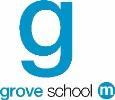

















Year 10 4 Units covered Autumn Term – Year 10 –Unit 1 – Starting a Business • Entrepreneurship • Start up options • Business aims and objectives • Business ideas • Business location • Business Plans Autumn / Spring Term –Year 10 – Units 2 & 3 –Marketing • Market segmentation • Market Research • Marketing Mix • Design Mix • Product Life cycle Summer Term – Year 10 –Unit 5 – Finance • Revenue and Costs • Breakeven • Business Calculations • Sources of finance • Cashflow management • Average rate of return Year 11 3 Units covered Year 11 All 7 Units revisited Autumn Term – Year 11 –Unit 4- People CV, Job description and adverts Organisation structure Training and development Communication methods Motivation Types of working/ Job roles Summer Term – Year 11–Unit 7 – External Influences • Globalisation • Technology in business • Organic and Inorganic growth • Stakeholders and their interests • Ethics • Consumer Autumn Term – Year 11 –Preparation for Mock Paper 1 Focus on exam technique for 2,3,6,9 and 12 mark questions. Recap on Unit 1 Summer Term – Year 11 –Preparation for Paper 1 and Paper 2 Focus on exam technique for all questions. Revision grids used to plug gaps in knowledge Assessment: 4 unit tests 9 Summer exam Assessment: 3 unit tests 10 Summer exam Assessment: 7 unit tests 2 Mock exams Yr 11 Summer exam -2 Papers Paper 1 – Investigating a small business Paper 2 – Building a business SpringTerm –Year 11 Unit 6Operations • Adding Value • Stock control methods • Types of production • Quality • Technology • Sales process and customer service Spring Term – Year 11 –Preparation for Mock Paper 2 Focus on exam technique for 2,3,6,9 and 12 mark questions. Recap on Unit 5-7 Edexcel GCSE Business specification https://qualifications.pearson.com/content/dam/pdf/GCSE/Business/2017/specification -and-sample-assessments/GCSE_Business_Spec_2017.pdf
Year 10
Students will be introduced to entrepreneurship and explore what characteristics a successful entrepreneur needs to set up a small business. Students will need to apply their knowledge and understanding to both familiar and unfamiliar business contexts. They will need to demonstrate an awareness of the challenges entrepreneurs face in setting up a business and then building a business in a competitive environment. The key focus in Year 10 is to focus on the Entrepreneurship, Marketing, and Finance units. Students will understand how an entrepreneur can establish and build the business successfully. They will study Units from Theme 1 and Theme 2.
Theme is called In estigating Small B siness and looks at the challenges comple ities and decisions facing an entrepreneur today. The areas we will study are: Entrepreneurship; Spotting a Business Opportunity; and, Putting an Idea into Practice.
Theme is called B ilding a B siness and looks at the challenges small b siness face in tr ing to survive and grow in a competitive world. The Units that we will study are: Marketing Decisions; Operational Decisions; Financial Decisions; and, Human Resources Decisions.
Grove School: Curriculum Narrative
g
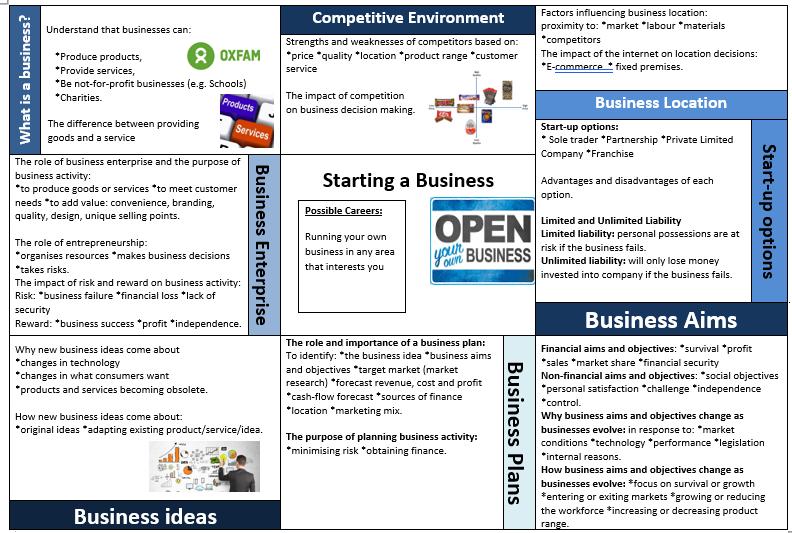
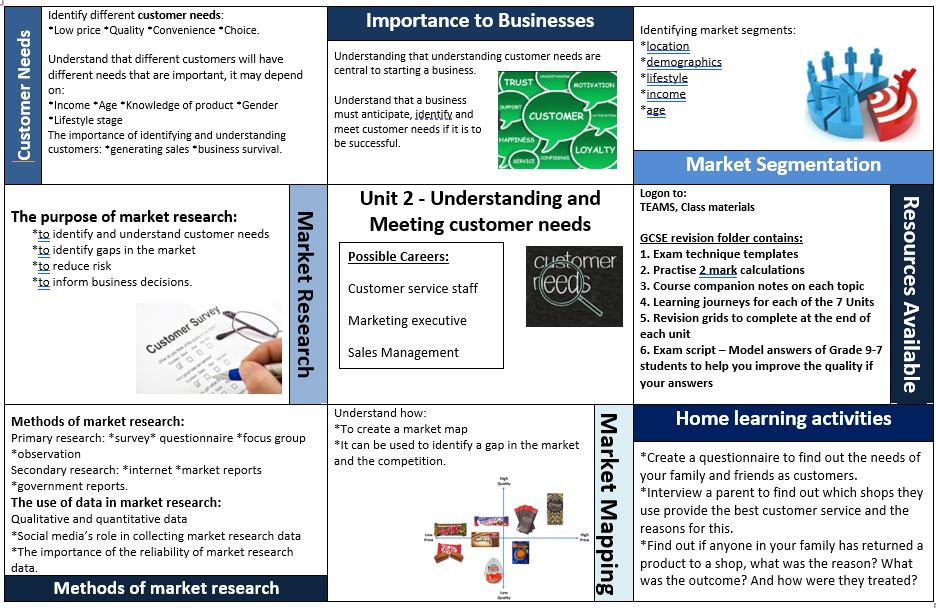
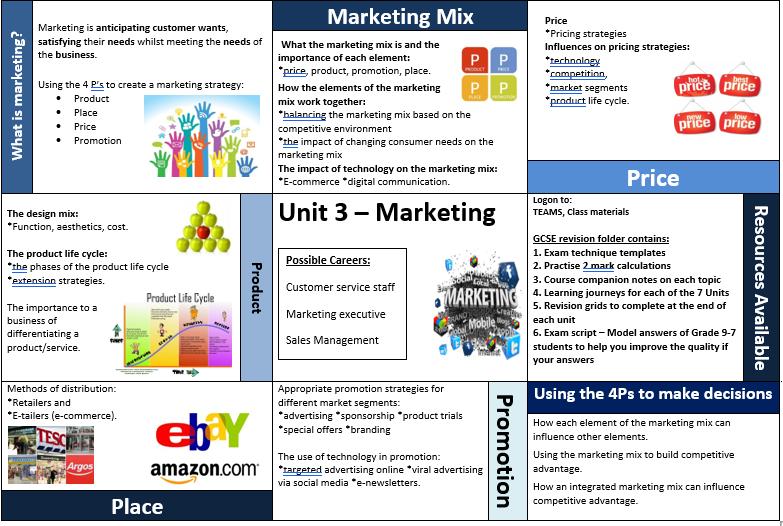
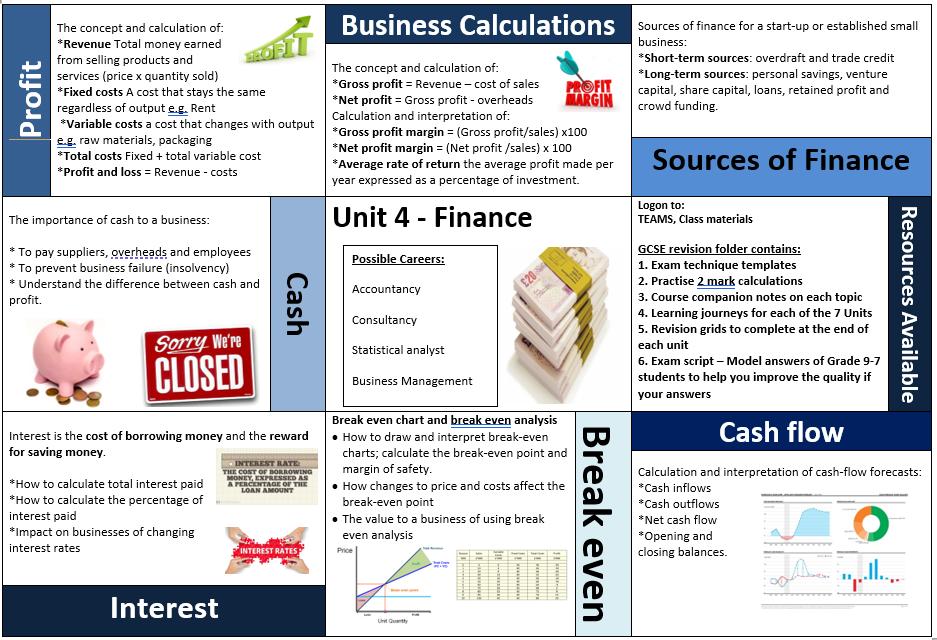
Year 11
The key focus in Year 11 is to focus on Theme 2 and to cover the People, Operations and External Environment units. It will recap on the Marketing unit that was covered in Year 10 and students will be encouraged to understand how Theme 2 focuses on how an entrepreneur can establish and build the business successfully.
Theme 2 is called Building a Business and looks at the challenges that small business face in trying to survive and grow in a competitive world.
Units of study: Marketing Decisions; Operational Decisions; Financial Decisions; Human Resources Decisions; and, the External Environment.
Grove School: Curriculum Narrative
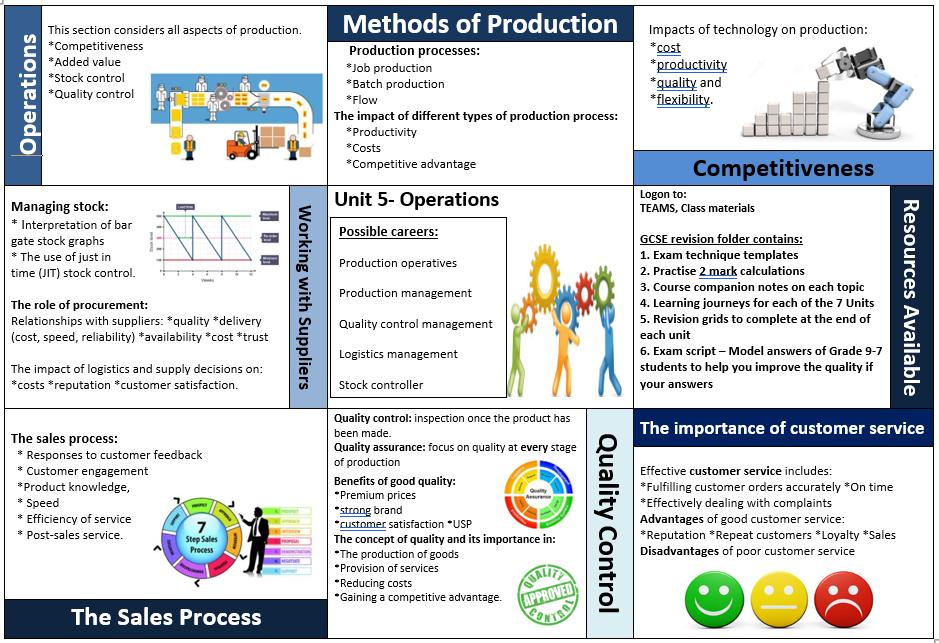
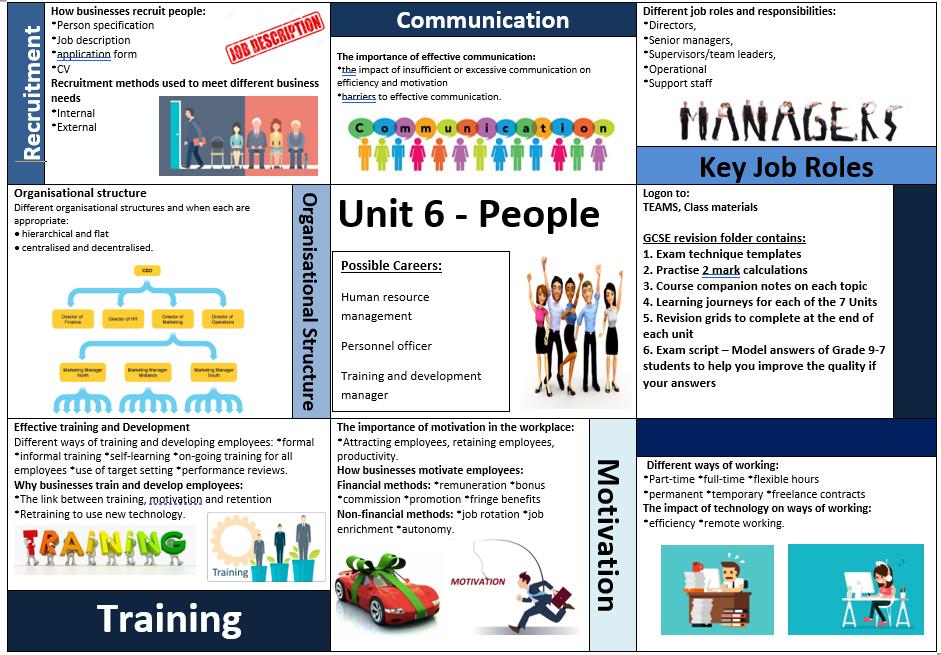

Grove School: Curriculum
Key Stage 5 Business g




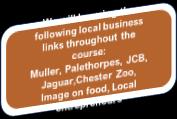
Year 12 Theme 1 – Marketing and People Theme 2 – Managing Business activities Autumn Term – Year 12 Theme 1 Meeting customer needs Market forces Theme 2 Raising finance Financial planning Year 13 Theme 3 – Business decisions and strategy Theme 4 – Global business Assessment: • Progress Tests • Exam based calculation and extended response questions • Theme 1 and Theme 2 exam Assessment: Paper 1 –Marketing, people and global business Paper 2 – Business activities, decisions and strategy Paper 3- Investigating business in a competitive environment Spring Term – Year 12 Theme 1 The marketing mix Marketing Strategy Theme 2 Managing finance Financial strategy Summer Term – Year 12 Theme 1 Managing People Entrepreneurs and Leaders Theme 2 Resource management External Influences Autumen term –Year 13 Theme 3 • Business Objectives and strategy • Business growth Theme 4 • Globalisation • Global marketing Spring Term – Year 13 Theme 3 Decision making techniques Influences on business decision Theme 4 Business expansion Global marketing for MNC’s Summer Term – Year 13 Theme Assessing competitiveness Managing change Theme 4 Paper 3 pre-issued research task Edexcel A Level Business Specification https://qualifications.pearson.com/content/dam/pdf/A%20Level/Business%20Studies/2015/specification -and-sample-assessment-materials/9781446914694_GCE2015_A_BUS_WEB.PDF
Year 12
Students are introduced to business in Themes 1 and 2 through building knowledge of core business concepts and applying them to business contexts to develop a broad understanding of how businesses work.
Theme 1 (Marketing and People)
Students will understand the importance of a business making effective marketing and effective strategic decisions in a competitive environment.
Units of study: Meeting Customer Needs; The Market; Marketing Mix and Strategy; Managing People; Entrepreneurs and Leaders.
Theme 2 (Managing Business activities)
Students will understand the complexity of financial decisions that need to be made, and the impact that the external environment has on business decision making.
Units of study: Raising Finance; Financial Planning; Managing Finance; Resource Management; External Influences.
Grove School: Curriculum Narrative
g
Year 13
The subject builds on Theme 1 and Theme 2, that are covered in Year 12. Students will need to apply their knowledge and understanding to both familiar and unfamiliar contexts in the assessments and demonstrate an awareness of current economic events and business issues. Students will need to demonstrate an increasing awareness of strategic management tools, and an awareness of business issues on a global scale.
Theme 3 (Business Decisions and Strategy)
This builds on Theme 2 (Managing Business Activities). Students will be introduced to analytical strategic management tools that a business uses. The concept of accountability will become much more prominent in Theme 3.
Units of study: Business Objectives and Strategy; Business Growth; Decision Making Techniques; Influences on Business Decisions; Managing Change.
Theme 4 (Global Business)
This builds on Theme 1 (Marketing and People). Students will be presented with global business issues and will be more critical in their understanding.
Units of study: Globalisation; Global Markets and Expansion; Global Marketing; Global Industries and Companies.
Grove School: Curriculum Narrative
Career Opportunities
These skills will allow you consider the following careers as possible options:
• Management Consultancy
• Entrepreneurship in various trades
• Teaching
• Chartered Accountancy
• Advertising
• Investment Banking
• Banking Services
• Retail
• Distribution and Logistics Management
• Insurance Underwriting
• Marketing Executive
• Market Research Executive
• Personnel Officer
• Public Relations Officer
• Retail Management
• Sales Management
Grove School: Curriculum Narrative
Grove School: Curriculum
D&T/ Food CEH Faculty g
Vision
Design and Technology at Grove is designed to provide opportunities for students to engage in activities that are challenging, relevant, motivating and centred ithin the school s ethos
Our goal continues to be, to pass on this passion and love for our subjects to our students. We want to inspire future generations of engineers, graphic designers, chefs, mechanics, product designers and architects.
We believe that Design & Technology at its best is about practical problem solving and innovation, both of which play a huge part in improving human existence and making the world a better place for everyone. We aim to equip students with the vital knowledge needed to perform well at these tasks, developing skills for life.
Grove School: Curriculum
g
Context
Key skills and knowledge for D&T is based on the National Curriculum and have been mapped across the Faculty to ensure progression between year groups. Links to other STEM (Science, Technology, Engineering and Maths) subjects have been made so that students have the opportunity to develop links between their learning experiences. Our curriculum is designed to reflect the types of career paths in the local area as well as inspiring students to take an interest further afield.
In Key Stage 3: Students study 2 hours per fortnight in D&T and 1 hour per fortnight in Food.
In Key Stage 4: Students study 5 hours per fortnight in Engineering or Hospitality & Catering.
Grove School: Curriculum
g
Disciplinary Knowledge
Disciplinary knowledge in Design and Technology (D&T) is designed to be broad and balanced, so that our students can use their substantive knowledge of products and materials around them to make links both between and across different areas of the curriculum. We hope that they will learn about a variety of designs and designers and develop a passion for this subject.
This knowledge is intended to equip students with the opportunity to explain how and why products have changed over time and how they might be further improved in the future. As they grow in autonomy, they will be expected to try to problem solve and develop the cultural capital to become global citizens in an ever -changing and technologically advancing world.
Grove School: Curriculum
g
Supra Curriculum
Supra-curricular activities are things that you do to extend and deepen your knowledge of the curriculum. Below are some examples: Revision and extended knowledge: Seneca learning podcasts and revision activities for D&T. (click here)
Practical learning tasks: These downloadable resources introduce students to engineering and the design process through activities and lessons that can be completed at home. James Dyson engineering. (Click here)
Reading lists: Engineering for Teens. (Click here)
100 things to know about inventions. (Click here)
Grove School: Curriculum
g
Grove School: Curriculum
Key Stage 3 Design Technology g





















/
KS3 Curriculum Map –D&T g Year 7 Year 8 Year 9
technology
STEM Robotic
Benchmaking
world Mobile Phone designing Mobile Phone manufacture Thi k a
forming processes
Solutions Alternative materials Emerging technologies Re di g a cha gi g ld
H&S
Drawing skills
Control
Forces, Levers, Linkages CAD / CAM
Hand Metals
skills Material
Plastics
Storage
In Design & Technology we value students abilities to kno and remember more.
To promote independent learning, students will be encouraged to complete a knowledge and skills passport. An example can be seen in this video. This helps students to track their learning and identify gaps in their knowledge so that they can improve their performance.
Grove School: Curriculum Narrative
Knowledge & Skills Passports g
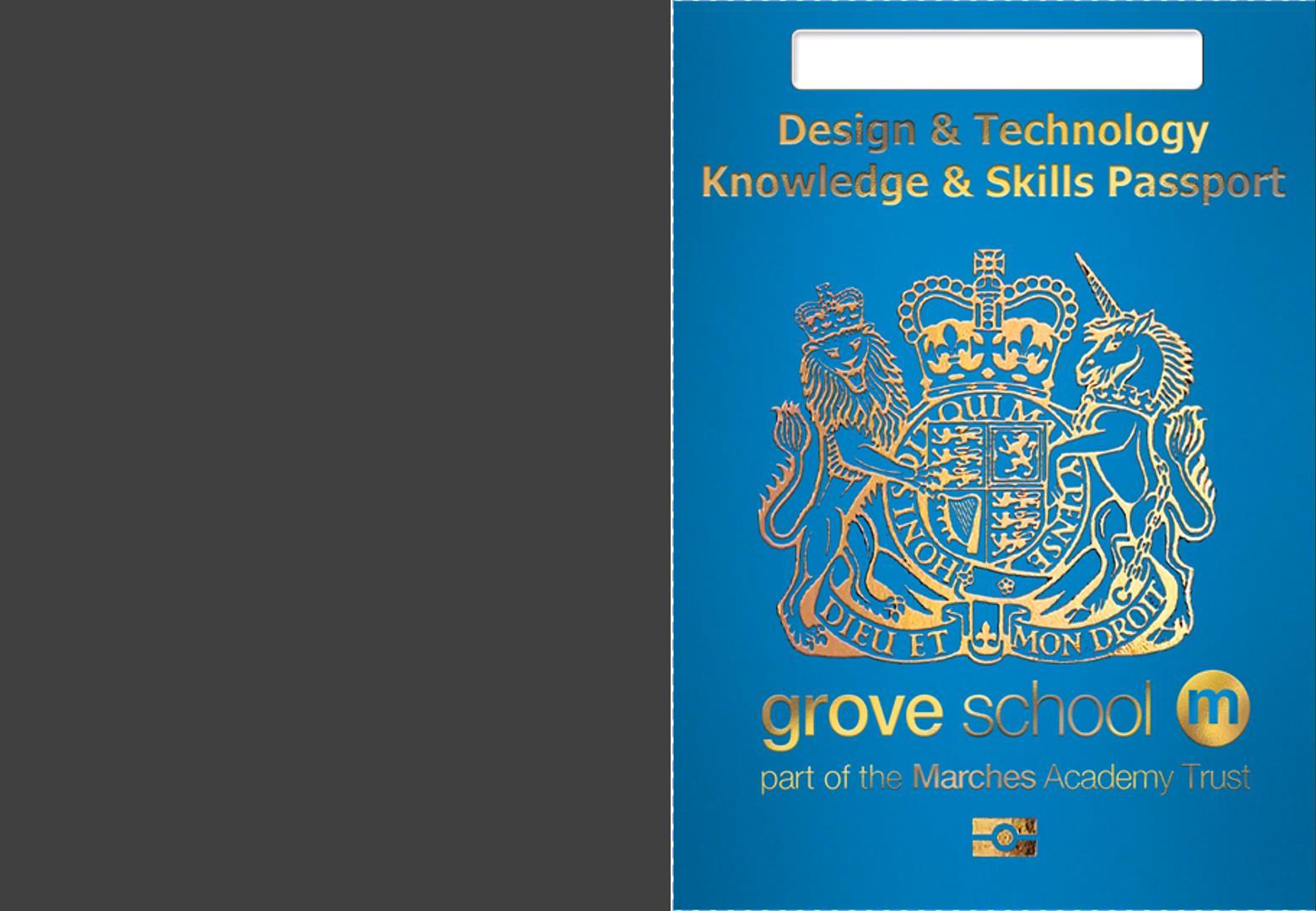
Year 7
Students will enter Year 7 with a range of different experiences from Key Stage 2. This knowledge will be considered in order to provide support or extension to their learning journey before we embark on our adventure. In D&T students ill be issued ith a kno ledge and skills passport so that the can track their learning and independently identify areas they need to practice / improve throughout the year. They will complete health & safet training before sitting their driving test on the scroll sa and pillar drill as ell as learning ho to construct amazing design work so that they know how to meet our high expectations and communicate their ideas effectively.
Next, we will investigate the exciting world of robots and electronic systems. We will create a robot hand and an electronically controlled product to a set theme. They will know all about circuits and their uses.
In the Spring Term, we will focus on creative thinking, incorporating knowledge of forces and mechanisms to create a cra machine to solve a problem Ne t e ill be touring the orld of computer aided design and use our knowledge of the laser cutter to create a high quality product for a specific target market. Finally, in the Summer Term we will be using our hand skills to create a product made from metal. Students will gain a range of knowledge relating to metals and their impact on the environment. It will be important for our students to demonstrate their knowledge and understanding of a range of D&T concepts throughout the year.
Grove School: Curriculum Narrative
g

g
Year 7 Curriculum Road Map – Design & Technology

Control technology
We will learn about inputs and outputs and how these can be used to solve problems.
September Weeks 1 - 6
Health and Safety training
We will know about the differences between hazards, risks and control measures. You will show progress by correctly identifying the different hazards, risks and control measures and applying them when working. You will know how to present your work so that it is clear to others.
Assessment: You will complete a technology knowledge survey to identify what you already know.
Oct - Week 7
STEM Skills
We will learn about careers in robotics and how levers and linkages work.
You will show progress by using levers and linkages to create a simple robotic hand and by solving a problem using this knowledge.
We will discuss how electronics can be embedded into robotics.
Assessment: LORIC skills, the effectiveness of your design, your evaluation.
October Assessment point 1 - Results of Technology knowledge survey & practical assessments
Nov / Dec Weeks 8 - 14
DecemberAssessment 2: knowledge test –control technology

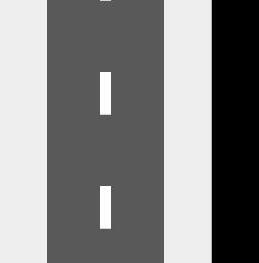
You will show progress by designing circuits to create solutions to a variety of problems. You will be able to name basic electronic components and discuss how they work / what they are used for. You can relate them to robotics.


Assessment: Components and circuit troubleshooting, levers & linkages
Forces, Levers & Linkages
We will look at Rube Goldberg machines & develop our creativity.
February / MarchAssessment 3: Model, knowledge test
Jan / Feb Weeks 15 - 21
You will show progress by creating a crazy machine that uses forces in different ways to solve a problem. You could incorporate control technology and robotics.
Assessment: Levers, Linkages, Forces
CAD / CAM
We will learn about how we can use CAD / CAM
You will show progress by creating a design using CAD to be laser cut (CAM)
Assessment: CAD /CAM, components, final product
May July Weeks 28 - 40
Metal June: Assessment 4: knowledge test
Final product
We will learn about how we can use properties of metals and the tools used for cutting / shaping / finishing them. You will show progress by understanding about raw materials, sustainability and a range of manufacturing techniques.
Assessment: End of year final assessment
March / April Weeks 22 - 27
Aim f he m If mi ma ill la d i he a g
Year 8
This we will build upon the knowledge from Year 7 starting with looking at our Material World Students ill respond to a client s needs follo ing the design process to understand the aesthetic, technical, ethical and social dimensions that impact on the world. Students will apply their knowledge of materials and production processes to design a phone cradle and produce solutions that are relevant and fit for purpose. They will also apply their practical knowledge and assess the criteria used to judge the quality of products, including fitness for purpose, and the extent to which they meet a clear need and whether resources have been used appropriately. Students then will extend their thinking into the world of smart materials to solve problems as well as investigating scales of production.
Grove School: Curriculum Narrative
g
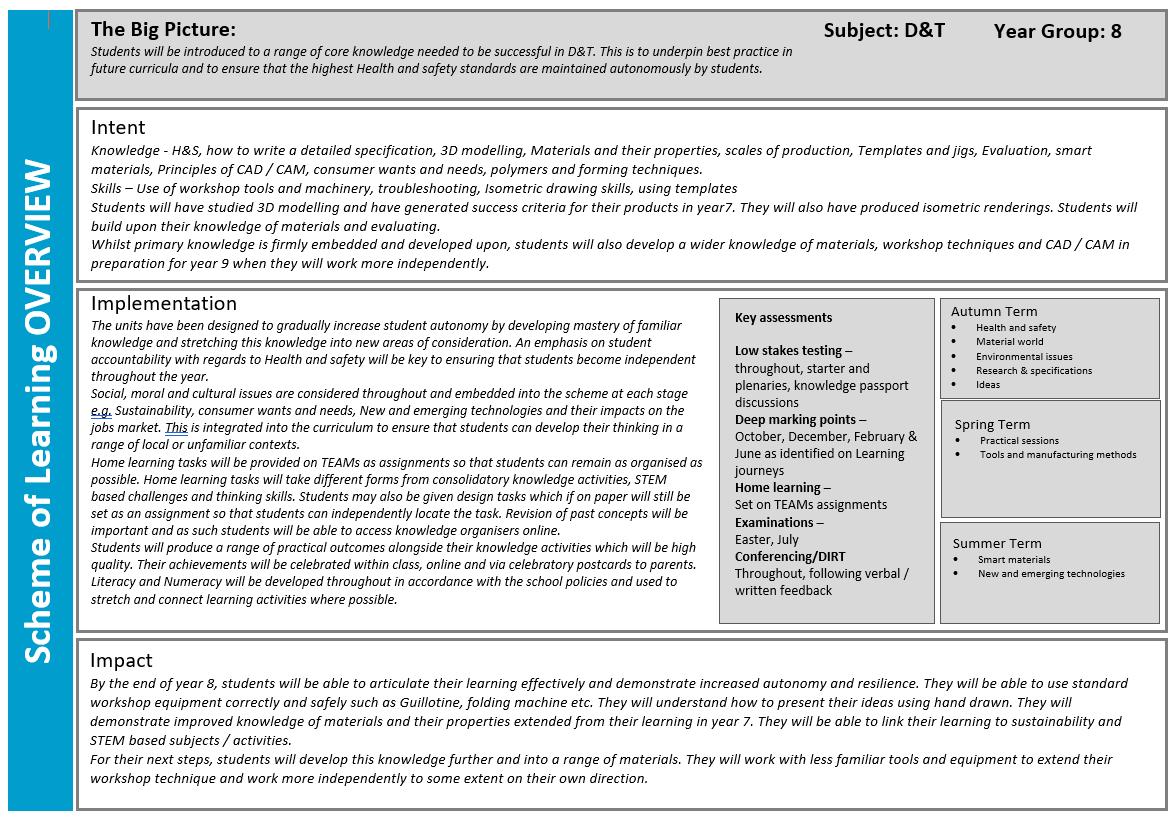
g
Year 8 Curriculum Map – Design & Technology
Jan / Feb Weeks 13 - 28
Phone
We will learn about how to manufacture a design concept using wasting techniques. Using the tools and equipment safely and in the correct manner. Along with how evaluations help improve practical design You will show progress by manufacturing a product to the design brief and specification. You will be able to name the tools and describe there unique function. The ability to evaluate a design to ensure it met the design specification.
September Weeks 1 - 6
Material world
We will know about how energy is transferred and the types of materials that can be used. Along with their environmental impact and how they can be recycled. You will show progress by understanding the types of materials that are available and how the environment is impacted on the choice of materials. Gain knowledge on how materials are recycled.
Assessment You will complete an end of unit knowledge assessment on subjects such as energy transfer the types of materials and their environmental issues and how they can be recycled.
Oct - Weeks 7 - 12
Phone cradle - design
We will learn about how designers use ACCESSFM utilise isometric drawings, models in 3D and the use of templates to all aid in the design process.
You will show progress by using developing a specification and a 3D model in card turning the model into a template that can be able to mark out on your raw material.
We will discuss how these skills can be used in a local industry.

Assessment: You will complete an end of unit knowledge assessment on how ACCESSFM is used by designers. The key words used when drawing in isometric, 3D modelling and templating.
June Weeks 28 - 34
October Assessment
point 1 - Results of Technology knowledge survey & practical assessments
Nov / Dec Weeks 8 - 14
DecemberAssessment 2: knowledge test –control technology



February / March - Assessment 3: Model, knowledge test
Materials/material properties CAD modelling
You will show progress by understanding the concept of the mechanical and physical properties of material the different types of materials available to designers and the types of CAD to be available to design a product.
Assessment: You will complete an end of unit knowledge assessment on the use of 3 D modelling. The types of materials available to designers their physical and mechanical properties.
Assessment: You will complete an end of unit knowledge assessment on safety rules in the workshop. The types of tools used to cut and shape with when manufacturing and their unique function.
Concept of manufacturing in volume


You will show progress by understand the different scales of production and how to develop a production plan and the cost of producing an manufactured product.
Assessment: You will complete an end of unit knowledge assessment on the different scales of production. The sections of a production plan and how to cost when producing an manufactured product.
July Weeks 34 - 40
Injection moulding techniques. Consumers/Gears/CAM
June:
Assessment 4: knowledge test
Final product
You will show progress by knowing about the differences injection moulding techniques available in industry and the workshop, how products effect consumer choices. The concept on how gears are used in modern industrial machinery. You will know how to present your work so that it is clear to others.
Assessment: You will complete an end of unit knowledge assessment on the use of CAM in industry, injection moulding techniques and gears.
July - Assessment 5 End of year test:
cradle - Manufacture
Mi d a e like a ach e They only function when he a e e James Dewar g
Year 9
In Year 9, students will be applying their knowledge of environmental, social and economic challenges that influence the design and making of products. They will be introduced to a context from which they will research and develop a concept for a storage solution. Students will discover alternative materials that are being developed to solve environmental problems. Students will apply their knowledge of materials and manufacturing process to select appropriate ones for their prototype storage container. They will then revisit and discuss scales of production and how new materials and emerging technologies can be used to ensure a product is fit for purpose hilst meeting the client s needs
Grove School: Curriculum Narrative
g

g
September Weeks 1 - 3
Context & investigation
We will learn about different contexts within design and write your own design brief. You will show progress by conducting focused research that will enable you to respond to the context effectively.
Assessment: Research section

j fail

learn from it. You can never learn
Year 9 Curriculum Road Map – Design & Technology

Emerging technologies
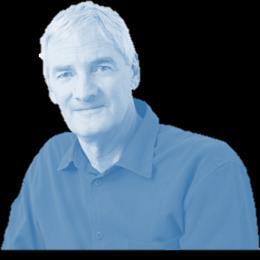
Sep -Oct - Weeks 4 - 6
Alternative materials
We will learn about pressing environmental concerns and alternative materials that could solve some of these problems. You will show progress by discussing how these materials could be adapted to suit different purposes. You will develop a specification using ACCESS FM
Assessment: Module test
October Assessment point 1 - Results of Research section & practical assessments
We will apply our learning by completing focused practical tasks for our storage solution. We will also be learning about new and emerging technologies.
You will show progress by discussing your knowledge from current and previous learning whilst creating a high quality prototype that is suitable for meeting the wants and needs of the context you are responding to.
Assessment: Prototype model, evaluation, module test.
January - Assessment 2: practical product so far, knowledge test
March - Assessment 3: knowledge test –practical product continued


Responding to a changing world
We will be learning about how changes to attitudes, technology and the environment. You will show progress by demonstrating your knowledge of current issues in the world and your local environment whilst applying your knowledge to suggest solutions
Assessment: sustainability text.
JanJune Weeks 717
July: Assessment 4: sustainability test
Final product and evaluation
July Weeks 18 - 20
E
f m cce
g
e a d
James Dyson
Grove School: Curriculum
Key Stage 3 Food Technology g
Food waste
Food provenence & Seasonality




Special diets & Food labelling
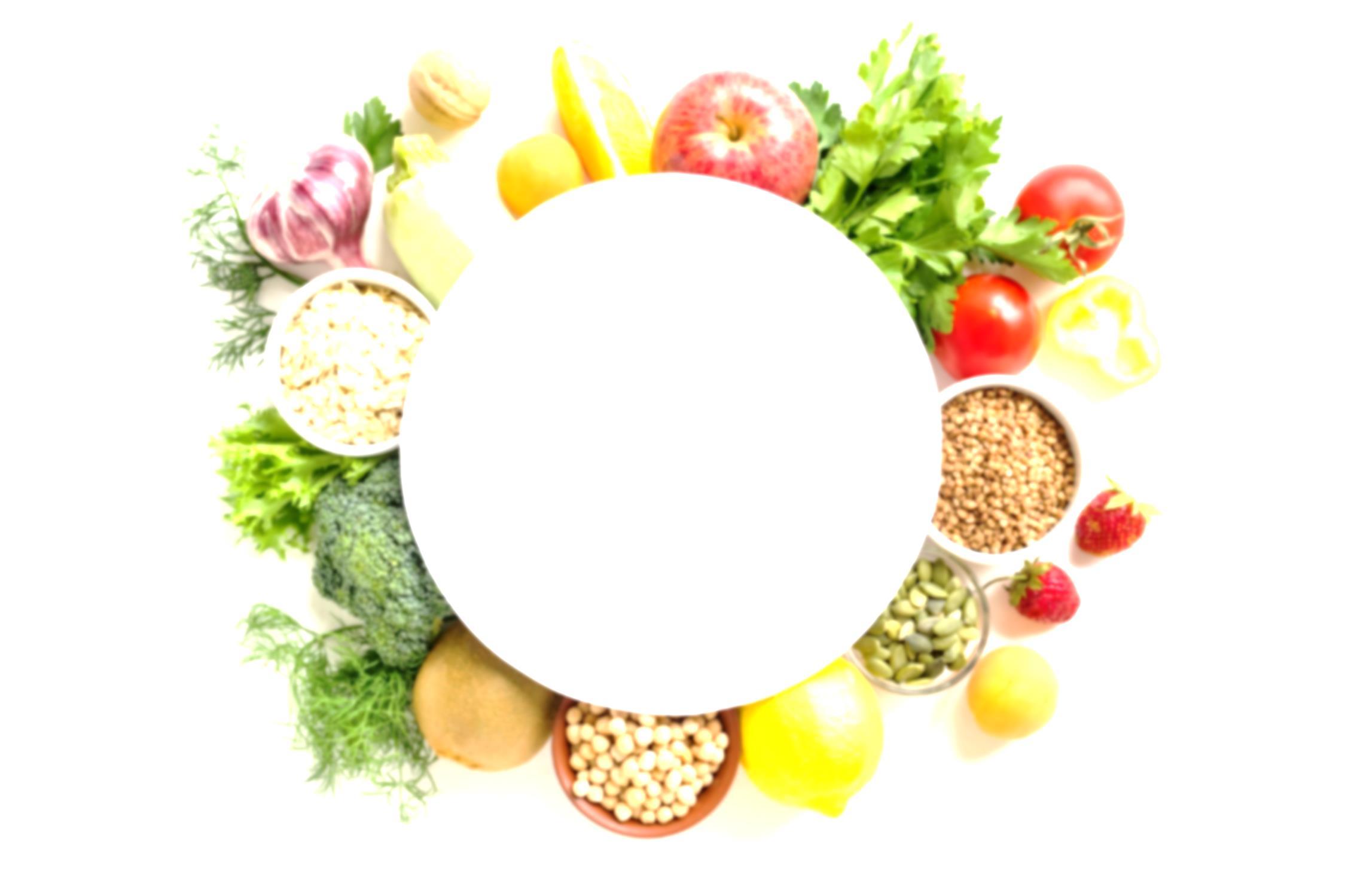
Year 9
Reducing sugar intake
Evaluating food skills Ea



Bacteria & Food poisioning

Year 8
International cuisine
“All over the newspapers”
Nutrition: Teenagers
Nutritional needs
Ea e fi h



Grilled snack
Year 7
Top tips for health









Eatwell guide





hygiene KS3 Curriculum MapFood g
Understanding
e fib e
Wha i he e
well for less
Eat
Year 7
During Year 7, students will be introduced to the individual parts of a working kitchen. This will begin with training them in important aspects such as Health and Safety rules, working safely and maintaining hygiene. Our lessons are based on the National Curriculum s principles of learning to prepare a variety of healthy and mainly savoury dishes which develop knowledge of a range of techniques. These include elements such as using the hob, oven and grill, chopping, rubbing in, bread making, how to pannè in breadcrumbs, etc.
Grove School: Curriculum Narrative
g
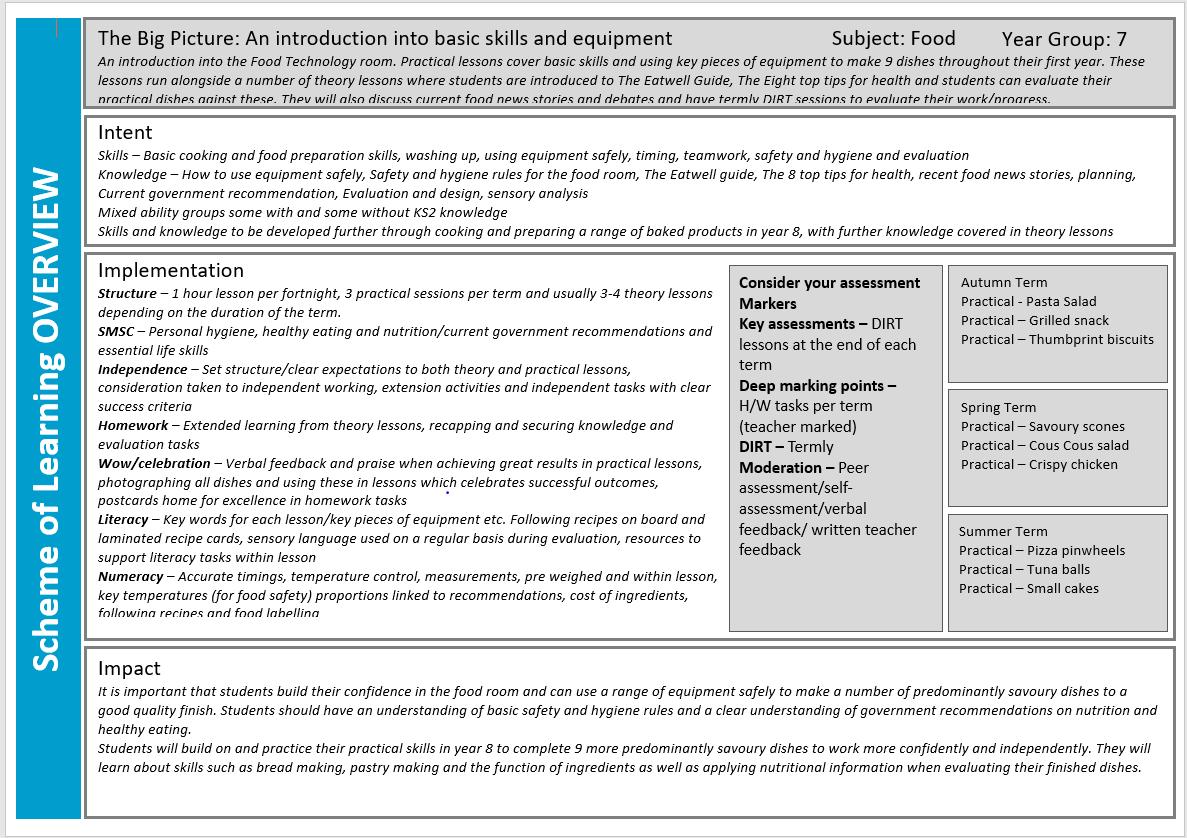
g
Autumn Term
• Washing up
Year 7 Curriculum Road Map – Food Technology

Assessment: Hygienic routines
Assessment: 8 top tips for health
Summer Term
• Current food news story debate
• Eat more fish!
• Nutritional analysis of a cooked dish
Spring Term
• Introduction to the Eatwell guide
• Understanding Hygiene and safety rules for practical lessons
• Designing a grilled snack product
• Evaluating and assessing work completed during term 1
Autumn Term - Practical lessons
• Pasta salad
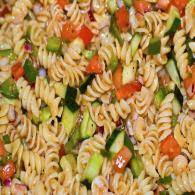
• Grilled snack
• Thumbprint buns

• Evaluating and assessing work completed in term 3
• Introduction to the 8 top tips for health
• Evaluating and assessing work completed in term 2
Spring Term – Practical lessons
• Savoury scones

• Cous Cous salad
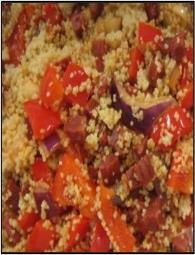
• Crispy chicken
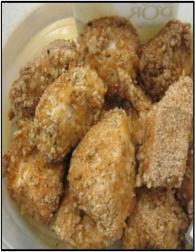
Summer Term – Practical lessons
• Pizza pinwheels
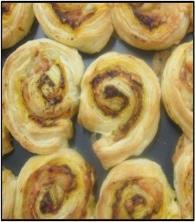
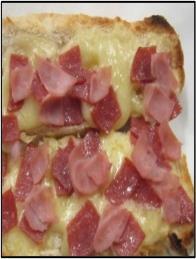
• Tuna bites
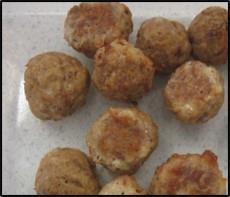
• Small cakes
Assessment: Knowledge of year 7

g
Year 8
In Year 8 we will continue to build upon the knowledge and skills learned in Year 7. We will practice techniques in new ways whilst developing a greater understanding of the Eatwell guide, food poisoning and nutritional needs for teenagers. This ill be focused around baked products An e ample of this ould be using the rubbing in method from Year 7 to create shortcrust pastry and mini quiches.
Grove School: Curriculum Narrative
g

g
Autumn Term
• Create a plan to make bread effectively

• The nutritional needs of a teenager
• How bacteria cause food poisoning
• Evaluating and assessing work completed in term 1
Year 8 Curriculum Road Map – Food Technology
Assessment: Bread –plan of making
Assessment: product evaluation
Summer Term
• Current food news story debate
• Reducing our sugar intake
• Evaluating and assessing work completed in term 2
Spring Term
• To analyse a dish in terms of nutritional value
• To evaluate the skills used when making a dish
• Eat more fibre!
• Evaluating and assessing work completed in term 2
Autumn Term - Practical lessons
• Bread rolls
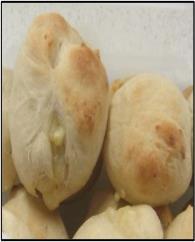
• Apple cakes

• Stuffed chicken
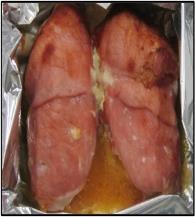
Spring Term – Practical lessons
• Shortcrust pastry

• Mini quiches
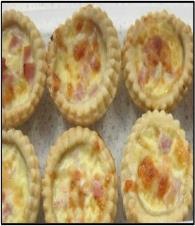
• Chicken goujons
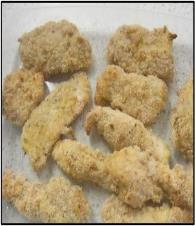
Assessment: Knowledge of year 8
Summer Term – Practical lessons
• Pastry pizzas

• Turkey bites
• Rock cakes

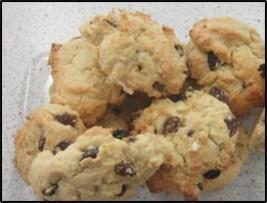
g
Year 9
In Year 9 we extend our learning further afield by focusing on a variety of multicultural dishes from around the world.
This year, we develop a greater sense of important food -related issues such as reducing food waste, food labelling, food miles and seasonality of ingredients.
We also discuss a range of current affairs that have direct impact on the food we eat.
Grove School: Curriculum Narrative
g

g
Autumn Term
Year 9 Curriculum Road Map – Food Technology

Assessment: Food provenance
Assessment: Special diets
Summer Term
• Food waste
• Current food news story debate
• Costing and eat well for less
• Evaluating and assessing work completed in term 3
Spring Term
• International cuisine
• Food provenance
• Seasonal produce
• Evaluating and assessing work completed during term 1
Autumn Term - Practical lessons
• Bolognese
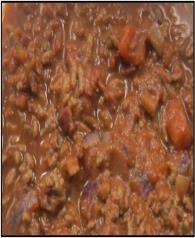
• Thai curry
• Muffins
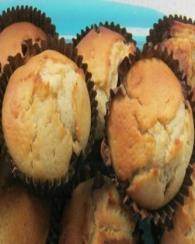
• Special diets and food allergies
• Food labelling
• Evaluating and assessing work completed during term 2
Spring Term – Practical lessons
• Mini pizzas
• Omelette

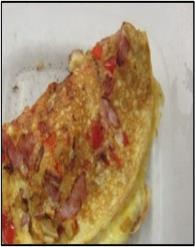
• Sweet and sour chicken
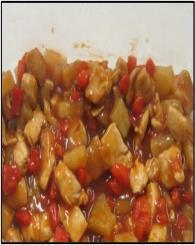
Summer Term – Practical lessons
• Swiss roll

• Stroganoff


• Fajitas
Final Assessment: Year 9 knowledge
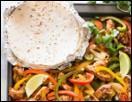
g
Grove School: Curriculum
Key Stage 4 Engineering g
Year 10
Students will study the key aspects of engineering manufacture and have the opportunity to apply what they learn through a number of practical experiences. This will involve the study of three mandatory units: R014 (external exam), R015 and R016 (coursework assignments).
At the start of Year 10, students will begin developing and consolidating key knowledge (R014) and skills in order for them to work autonomously through the set assignments (R015, R016) which will become available in September and June respectively.
They will begin their first assignment (R015) concurrently in the September of Year 10 and continue this unit until June of the same year.
Grove School: Curriculum Narrative
g
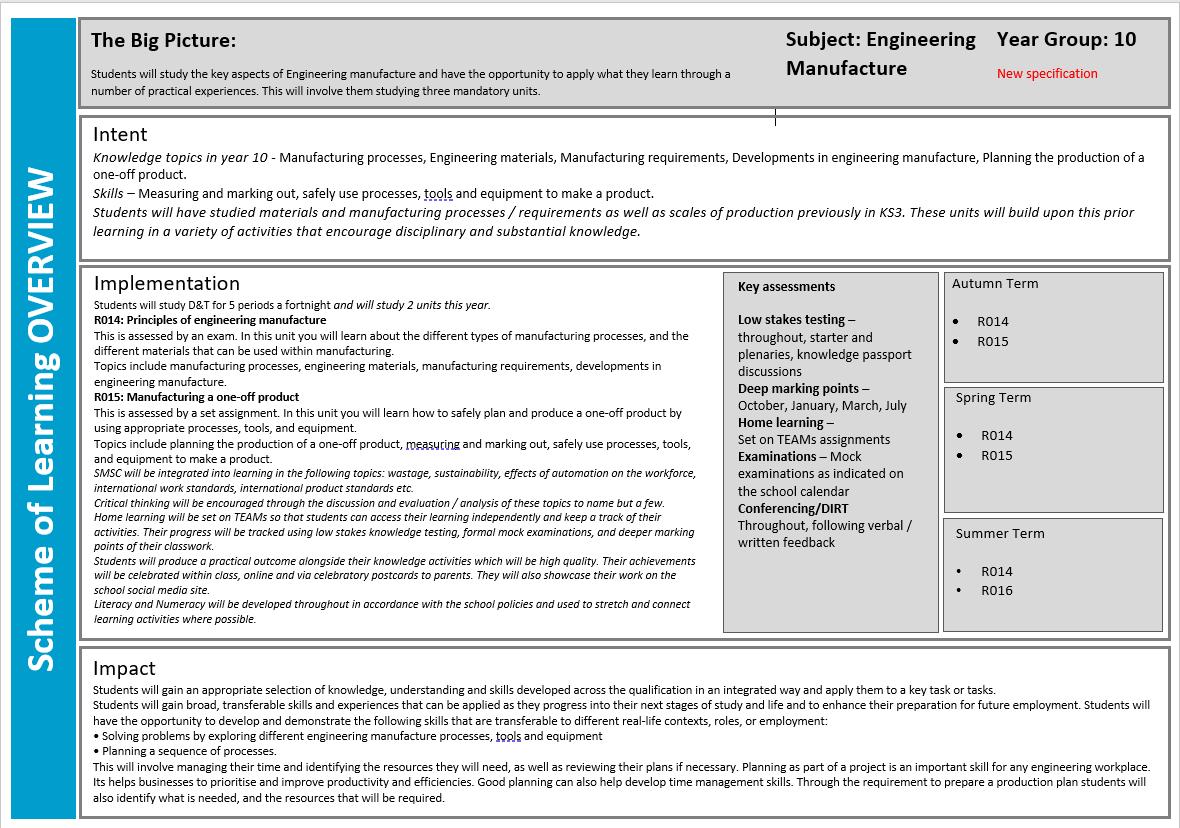
g
Year 11
At the start of Year 11, students will continue to produce coursework for their set assignment (R016) and be expected to have completed this before February half term. Later in the Spring Term, they will begin their external exam preparation (R014) and continue this unit until their examination in June.
The weighting of the individual units are as follows: R104 is worth 40% of the final grade. R105 and R106 together are worth 60% of the final grade.
Grove School: Curriculum Narrative
g

g
Grove School: Curriculum
Key Stage 4 Hospitality & Catering g
Year 10
Unit 1 enables learners to gain and develop comprehensive knowledge and understanding of the hospitality and catering industry including provision, health and safety, and food safety. From September of Year 10, students will learn to apply this knowledge through a series of practical tasks so that they can develop their independence ready for their set assignment (Unit 2) in June.
In June, Unit 2 will be released. This unit enables learners to develop and apply knowledge and understanding of the importance of nutrition and how to plan nutritious menus. They will learn the skills needed to prepare, cook and present dishes. They will also learn how to review their work effectively. Students will continue this unit into Year 11.
Grove
School: Curriculum Narrative
g

g
Year 11
In Year 11, students will continue with both their set assignment and the planning for their practical demonstration, where they will design a 2course menu and serve it to staff and students. Once completed, students will revisit all of their prior learning that they have applied throughout the course to begin preparing for their final exam in June. The weighting of the individual units are as follows: Unit 1 is worth 40% (external exam) of the final grade, Unit 2 (set assignment) is worth 60% of the final grade.
Grove School: Curriculum Narrative
g
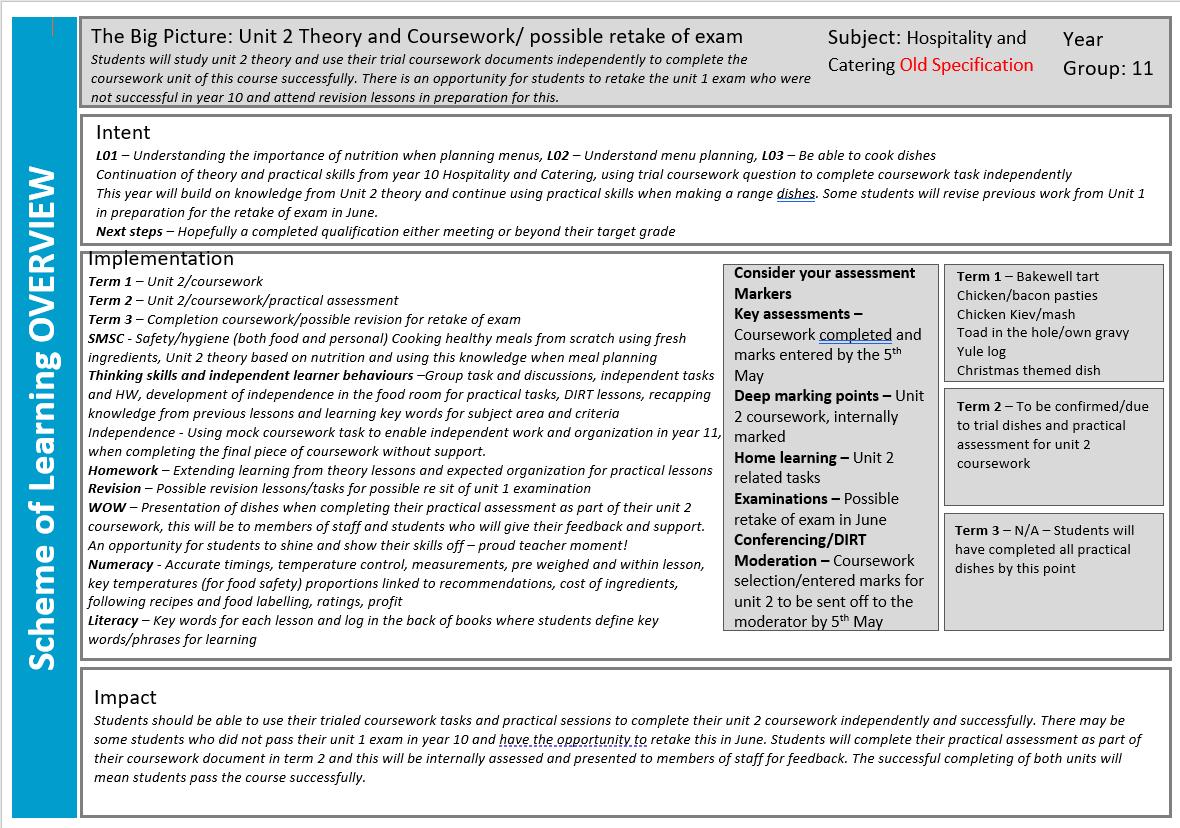
g
Grove School: Curriculum
Computing, ICT and iMedia CEH Faculty g
Vision
The computing curriculum at Grove School have been designed to cover the three main areas of: Digital Literacy, Computer Science and Information Technology. Our students will be introduced to the IT skills that they will need to support other subjects across the curriculum and will be introduced to elements such as programming, algorithms, some more complex elements of software packages and an understanding of computer hardware and how it works.
We are an energetic and ambitious team, who seek to deliver rich and innovative lessons that enthuse our students about ICT and Computing and equip them with the skills they need to support future aspirations. At Key Stage 4, we offer both ICT and iMedia at Grove School.
Grove School: Curriculum
g
Department Staffing and Expertise
Dave Pollard ICT and Business Studies Teacher
• Teaching both subjects since 2008
• Current role - Teacher
Paul Duerden Business and ICT Teacher
• Teaching since 2014
• Current role Head of Year
• Previous roles Head of Department
Grove School: Curriculum
Key Skills that we hope to develop in an ICT student
Grove School: Curriculum
•
• Application • Confidence •
•
•
•
Knowledge
Oracy
Investigative
Analysis
Evaluation
The Ascent of the Computing Curriculum
The intent of our department is to achieve ascent within the computing curriculum journey at both Key Stage 3 and Key Stage 4 by providing students with the foundations in the 3 key elements of the curriculum:
1) Computer Science
2) Digital Literacy
3) Information Technology. This means that concepts that are generally understood by students are elevated to new aspects, allowing our students to have the opportunity to develop and improve their own knowledge, be able to articulate this confidently and to challenge accepted conventions, re -think and re-create.
Grove School: Curriculum
Overcoming cumulative disfluency
in the Key Stage 3 and Key Stage 4 Curriculum
We aim to overcome disfluency within computing through a range of strategies including:
• Sticky Knowledge
• Knowledge checks
• Key term starters
• Knowledge organisers
• Microsoft Forms
• Past Paper questions to perfect exam technique
Grove School: Curriculum
Key Stage 3 ICT Content
Year Topics
Year 7
Introduction to Grove Computer system, E-Safety, Computer Basics, Office skills (PowerPoint, Publisher, Word), Scratch, Spreadsheets
Year 8
Binary and Data, Business Documents, Networks and Cryptography, Microbits, Python and Kodu
Year 9
User Interface, Microbits, Graphics introduction and Idea program
Grove School: Curriculum
Key Stage 4 ICT Content
Course Topics
OCR Information Technologies
OCR Cambridge National IT Level 1 / 2 (New Specification)
R012 Understanding Tools, Techniques, Methods and Processes for Technological Solutions (Exam 50%)
R013 Developing technological solutions (Coursework 50%)
R050: IT in the Digital World (Exam 40%)
R060: Data Manipulation using Spreadsheets (Coursework 30%)
R070: Using Augmented Reality to Present Information (Coursework 30%)
Grove School: Curriculum
Key Stage 4 iMedia Content
Course Topics
OCR Cambridge Nationals in iMedia
R081: Pre-production Skills (Exam: 25%)
R082: Creating Digital Graphics (Coursework: 25%)
R087: Creating Interactive Multimedia Products (Coursework: 25%)
R091: Designing a Game Concept (Coursework: 25%)
OCR Cambridge Nationals in iMedia Level 1 / 2 (New Specification)
R093 - Creative iMedia in the Media Industry (Exam: 40%)
R094 - Visual Identity and Digital Graphics (Coursework: 30%)
R097 - Interactive Digital Media (Coursework: 30%)
Grove School: Curriculum
A knowledge rich curriculum means that students can confidently articulate and understand key content within their specification, and are able to recall this information consistently throughout the course
We implement this through a range of strategies including: recap and recall starters; Microsoft Form quizzes; and, knowledge organiser tasks. We also review this knowledge through a range of testing understanding and retention through regular questioning and use of exam questions.
Disciplinary Knowledge
The order and sequence of our lessons has been carefully considered to allow students to develop confidence, skills and knowledge effectively. For example, Scratch and Microbits - which are blocked based coding languages - are studied before Python - a text-based programming language - that allows students to build up their knowledge and understanding of algorithms and programming. We introduce students to PowerPoint and Word before moving onto more in -depth units in Excel and Access to provide students with a well-rounded understanding of how to use the Microsoft Office suite.
We provide an overview of computer basics in Year 7 where we introduce students briefly to concepts such as binary and then go on to develop these aspects in more detail during Year 8.
Grove School: Curriculum
K i g a d emembe i g m e
Supra Curriculum
We aim to enhance our computing / information technology curriculum experience by introducing the following activities into our planning:
Silver IDEA Badges
U i g he BBC Click ech l g cli Coding Courses e.g., w3Schools and Code Club
BBC News articles
Grove School: Curriculum
g
Grove School: Curriculum
Key Stage 3 Computing g
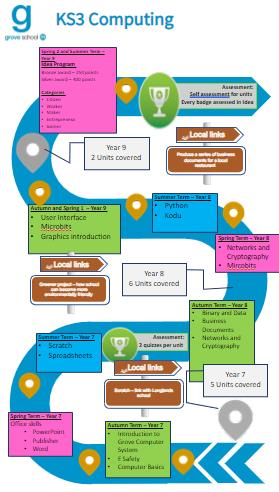
MATNAV IT KS3.pptx
Key Stage 3 Computing Curriculum
Key Stage 3 Year 7 Curriculum
Unit Overview Introduction to Grove Computer System
The intent of this unit is to introduce students to Microsoft Teams and Office 365 features so that they can effectively use them.
E-Safety
Computer Basics
To understand how to use computers effectively and safely.
To understand how computers work and the key hardware and software used to run them effectively.
Office skills (PowerPoint, Publisher, Word)
Scratch
Spreadsheets
To understand how to use PowerPoint/Publisher/Word more effectively and to know how to use features of them to make effective documentation.
To understand algorithms and how to use scratch as a route into the world of programming.
To understand the purpose of spreadsheets and how to use them effectively to perform various tasks.
Grove School: Curriculum Narrative
g
Key Stage 3 Year 8 Curriculum
Unit Overview
Binary and Data
Business Documents
To understand how binary is used to represent numbers, character and picture on computers.
To provide pupils with a better understanding of when and where different computer programs should be used and how to create effective documents for a purpose.
Networks and Cryptography
To understand the theory behind networks and security threats. Students to learn about the use of cryptography for system security.
Microbits
Python
Kodu
Students are asked to solve problems to create a variety of programs such as a digital compass using Microbits
To understand the purpose of programming languages and to be able to produce various programs using the language Python.
To understand how to make games e.g., racing and maze games, using the Kodu programming language.
Grove School: Curriculum Narrative
g
Key Stage 3 Year 9 Curriculum
Unit Overview
User Interface
Provide students with a better understanding of planning, creating, evaluating and improving a project. Students will experience advanced features of various software programs in Microsoft Office.
Microbits
Students are asked to solve problems to create a variety of programs such as a digital compass using the Microbits
Graphics Introduction
To explore the purpose and the function of pre-production documents.
Idea Program
• Bronze award
• Silver award
Categories
250 points
400 points
• Citizen, Worker, Maker, Entrepreneur and Gamer
The overall aim is to give students a broad education that encourages creativity and equips them with the knowledge and skills to understand and change the world.
Grove School: Curriculum Narrative
g
Grove School: Curriculum
Key Stage 4 ICT g
OCR Information Technologies (Year 11 2022 -23)
Purpose
For pupils to develop applied knowledge and practical skills in using information technologies.
Modules
• Assessment Unit R012: Understanding Tools, Techniques, Methods and Processes for Technological Solutions
• Assessment Unit R013: Developing Technological Solutions
Intent
Our current Year 11 students will learn the theory for the exam R012 and complete a practice piece of coursework for unit R013. Our current Year 11 students will then revise for R012 unit and will complete the exam in January 2023. Students will then complete the coursework unit R013.
Grove School: Curriculum Narrative
OCR
Cambridge National IT Level 1 / 2 (New Specification)
Unit Overview
R050: IT in the Digital World (Exam)
R060: Data Manipulation using Spreadsheets (Coursework)
In this unit you will learn about design and testing concepts for creating an IT solution or product, and the uses of IT in the digital world.
Topics include: Design Tools; Human Computer Interface (HCI) in everyday life; Data and testing; Cybersecurity and legislation; Digital Communications; Internet of Everything (IoE).
This is assessed by completing a set assignment. In this unit you will learn how to plan, design, create, test and e al a e a da a mani la ion ead hee ol ion o mee clien e i emen Yo ill be able o e al a e your solution based on the user requirements.
Topics include: Planning and designing the spreadsheet solution; Creating the spreadsheet solution; Testing the spreadsheet solution; Evaluating the spreadsheet solution.
R070: Using Augmented Reality to Present Information (Coursework)
This is assessed by completing a set assignment. In this unit you will learn how to design, create, test and e ie an A gmen ed Reali model o o e o mee a clien e i emen
Topics include: Augmented Reality (AR); Designing an Augmented Reality (AR) model prototype; Creating an Augmented Reality (AR) model prototype; Testing and reviewing.
Grove School: Curriculum Narrative
Grove School: Curriculum
Key Stage 4 iMedia g
OCR iMedia Year 10
• The purpose of this course is to equip our students with a range of creative media skills and provide opportunities to develop, in context, desirable, transferable skills such as research, planning, and review, working with others and communicating creative concepts effectively. Through the use of these skills, students will ultimately be creating fit -forpurpose creative media products.
• Key skills are promoted in lessons through building on problem solving, resilience, group work leadership, communication listening or speaking skills when appropriate. Students are also expected to maintain an effective organisation of files/folders. Students are encouraged to show initiative and are praised when this is identified.
• Tasks will challenge all students, including high-attaining learners, by introducing them to demanding material and techniques; encouraging independence and creativity and providing tasks that engage the student. The units selected from this qualification will allow learners the freedom to explore the areas of creative media that interest them as well as providing good opportunities for them to enhance their learning.
• Scaffolding in the form of a wide range of resources support students in their independence. Peer assessment, identifying improvements for others to make further help students to develop their own independence. Teachers will often ask students to identify three revisions made to their original submissions with reasons.
• Literacy skills are developed by applying key word terminology and through the reviewing of digital products. Students will demonstrate analytical and interpretation skills (of situations and/or results) and the ability to formulate valid, wellargued responses. Our students will also evaluate and justify their decisions, choices and recommendations throughout the course.
Grove School: Curriculum Narrative
OCR iMedia Year 11
• The purpose of this course is to equip our students with a range of creative media skills and provide opportunities to develop, in context, desirable, transferable skills such as research, planning, and review, working with others and communicating creative concepts effectively. Through the use of these skills, students will ultimately be creating fit-for-purpose creative media products.
• Key skills are promoted in lessons through building on problem solving, resilience, group work leadership, communication listening or speaking skills when appropriate. Students are also expected to maintain an effective organisation of files/folders. Students are encouraged to show initiative and are praised when this is identified.
• Tasks will challenge all students, including high-attaining learners, by introducing them to demanding material and techniques; encouraging independence and creativity and providing tasks that engage the student. The units selected from this qualification will allow learners the freedom to explore the areas of creative media that interest them as well as providing good opportunities for them to enhance their learning.
• Scaffolding in the form of a wide range of resources support students in their independence. Peer assessment, identifying improvements for others to make further help students to develop their own independence. Teachers will often ask students to identify three revisions made to their original submissions with reasons.
• Literacy skills are developed by applying key word terminology and through the reviewing of digital products. Students will demonstrate analytical and interpretation skills (of situations and/or results) and the ability to formulate valid, well -argued responses. Our students will also evaluate and justify their decisions, choices and recommendations throughout the course.
• Local links are also explored in the R087 unit where students will produce a series of digital graphics for a Market Drayton.
Grove School: Curriculum Narrative
Grove School: Curriculum
English English & Drama Faculty g
Vision
Our curriculum aims to ignite, inspire and challenge, providing the fuel for students to better understand themselves and the world around them.
Context
We strive to transfer our passion for English to all students at the Grove School, developing their love of literature through the exploration of high-quality, challenging texts. Students are brought to mastery of fundamental communication and literacy skills through exposure to a provoking array of texts, contexts and ideas. In acquiring the knowledge to confidently connect with the world around them, students become readers of themselves.
Grove School: Curriculum
g
Disciplinary Knowledge
Thematic and contextual links help to structure our curriculum model from Year 7 Year 13, building on the foundations of Key Stage 2. Schemas of knowledge are constructed across distinct strands of the discipline such as, prose, drama and poetry study; creative writing; non-fiction reading & inference; exploration of rhetoric; transactional writing; and speaking & listening skills. Units develop disciplinary knowledge through these strands across a colourful landscape of contexts and text types, carefully mirrored and sequenced to ensure progression within the curriculum model, be it through the Aristotelian construction of a convincing argument or precise analysis of a Shakespearean soliloquy.
Supra Curriculum
In providing a breadth of knowledge and experience, the supra -curriculum in English illuminates and e iche de c e lea i g ac i A digi al hea e la f m c m leme li e hea e excursions and a film club to provide students with high quality visual experiences tailored to their inclass study. Elsewhere, an online daily-news and media platform provides extensive opportunities for critical reading and exploration, within real-life contexts. For each content area, students are challe ged i h i ie a ch ead a d d aki g hem be d he defi ed a ea f study to further fuel their sense of wonder and curiosity.
Grove School: Curriculum
g
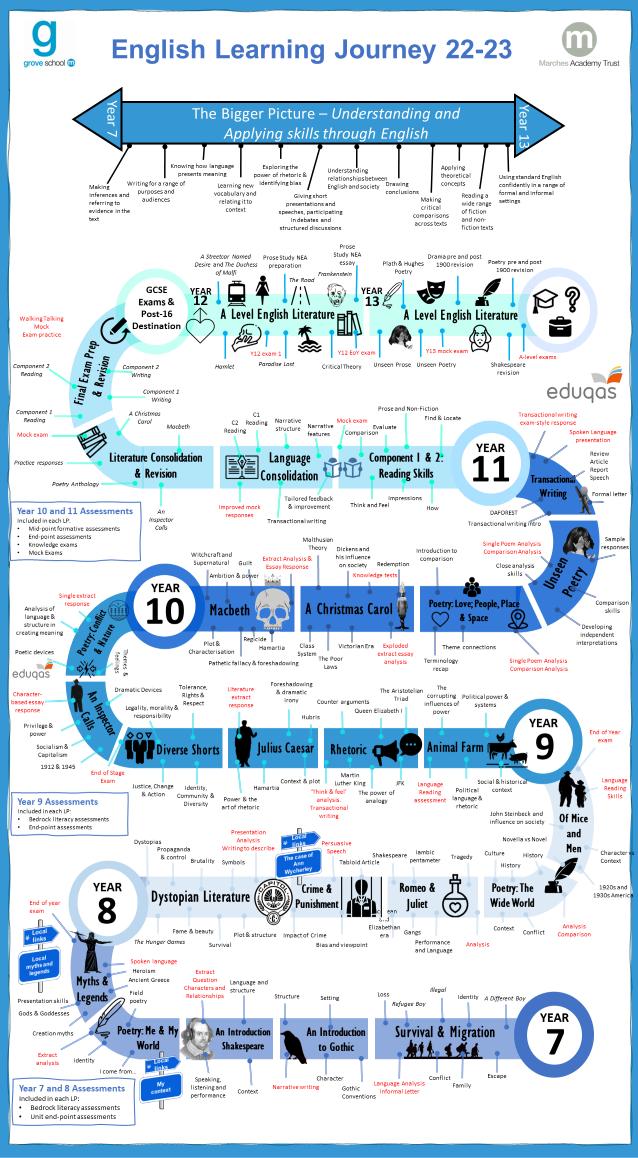
Grove School: Curriculum
Key Stage 3 English g
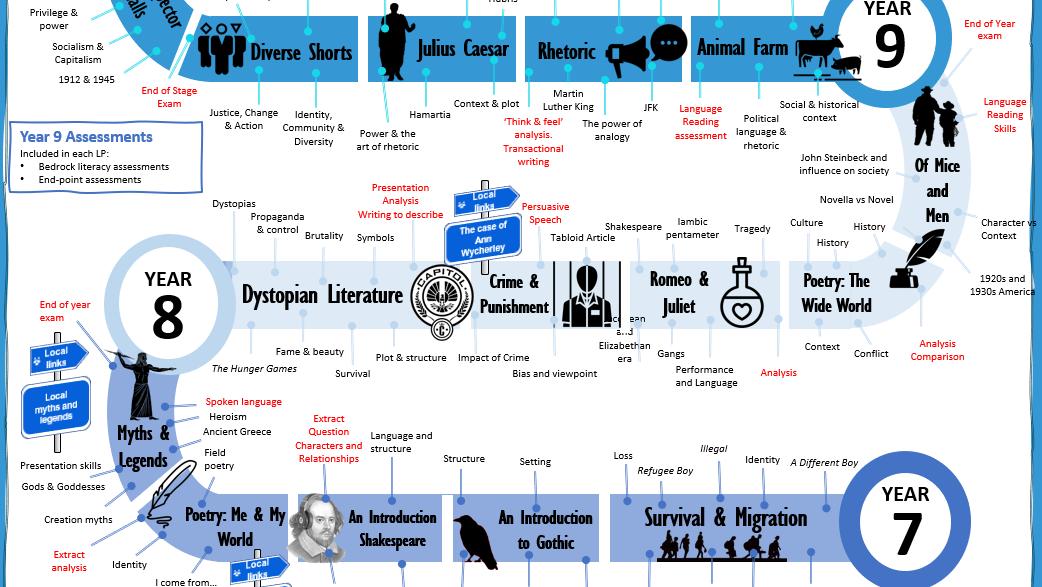
Year 7
Our story begins with a series of perilous journeys. Deserts, cities and oceans are traversed as characters search for safety and freedom, grappling with issues of identity against a turbulent sea of socio -political and economic conflict. From 21st Century diaspora, we take a leap back-in-time to the Gothic-horror of 19th Century England and North America, tip-toeing through a landscape of psychological terror, monsters and madness. An introduction to Shakespeare follows as we jump further back into the cannon of English Literature, this time landing in the 1 6th & 17th Century to e l e a elec i f he Ba d m bel ed cha ac e lil ie a d e A g di g i e ic f m he e ac a a bridge to the next unit in this sequence: an introduction to poetry in our more immediate context as a means for better understanding ourselves and our own journeys. For the final chapter of our Year 7 story, we are transported to faraway lands and ancient civilizations, explorin g a collection of myths and legends which have helped to shape our culture, informing many of the texts and contexts already studied.
Year 8
As the curtain rises on Year 8, a dystopian world collides with a rich tapestry of contemporary issues: freedom and equality, survival and sacrifice, power and propaganda, protest and heroism. The Hunger Games updates one of the key myths of our Year 7 study Theseus and the Minotaur enriching our understanding of the way stories are returned to and reborn across time, with those key messages of resilience and hope an everpresent thread. Building from this longer novel-study, students are inspired by a colourful palette of contexts, genres and text types: an exploration of 19th Century Crime & Punishment (with a specific spot -ligh g i l T e C ime f m he l cal la d ca e b il ds on the g d k laid i Yea G hic d cla ic Shake ea ia T aged i he f m f Romeo and Juliet; horizon-expanding poetry; and closestudy of a masterful 20th Century novella, Of Mice and Men: a modern myth of the American west.
Year 9
Yea a a i e i e f e e a i a d m ali g idi g de a i e ga i f he a e f he h ma condition. The scene i e i h he d f O ell alleg ical fable A imal Fa m a ella hich cha he f llie f li ic a d e and the ways in which language can be used to control. This thread extends into the following unit: a close study of the art of rhetoric in famous speeches across history, from Alexander the Great to Greta Thunberg. Our next stop is Ancient Greece by -way of Stratford-upon-A Shake ea e J li Cae a i he perfect accompaniment to this extended study of language and power an examination of politics, power and betrayal within classical Tragedy. A collection of short stories from diverse authors awaits the students in the next stage of their journey: an eclectic set of m odern stories exploring e ale cie al i e The S mme Te m ma k a a i i d f ke GCSE e i cl di g P ie le cla ic cia l c mme a A I ec Call a he e rich with rhetoric and chiefly concerned with issues of power and morality. Finally, students explore a cluster of selected poems from the Poetry Anthology focusing on the themes of Conflict and Nature: key threads of the Year 7, 8 & 9 jour ney so far.
Grove School: Curriculum Narrative
g

The Big Picture: Y7 is a rich and varied introduction to the study of English at KS3. A bespoke transition unit introduces students to 3 high -quality texts a novella, a graphic novel and a novel each connected to the wider heme f i al and mig a i n in i ing den engage i h a ange f e inen eal -world issues: freedom and human rights, identity and race, hope and loss, politics and power. Building from this longer study, students are challenged by a broad spectrum of contexts, genres and text types: an exploration of nineteenth century Gothic fiction; c lassic Shakespearian drama; an introduction to poetry as a means for understanding themselves and their own journeys; and a collection of myths and legends from faraway and ancient civilizations to more familiar settings. Through these units, a comprehensive mix of reading, writing, and speaking and listening opportunities de el den kn ledge and kill b ilding f m he f nda i n laid a KS f he a k hei c i i and l e f language, promoting the key values of empathy and excellence.
Intent: Lea ning P g amme be c e ed Survival & Migration (Texts: A Different Boy; Illegal; Refugee Boy); An Introduction to Gothic; A Mid e Nigh D ea Poetry: Me and My World; Myths and Legends. The overarching intent of English in Y7 is to promote high standards of language and literacy by equipping pupils with a stro ng command of the spoken and written word, and to develop their love of literature through the exploration of high-quality, challenging texts. The first LP in this planning sequence is designed to provide a transition at the start of Y7, building on the pedagogies and knowledge needed to achieve the end of KS2 standard for writing and reading with KS3 objectives woven in. Skills covered throughout the year are in-line with the KS3 National Curriculum, with the aim that all pupils can: read easily, fluently and with good understanding; develop the habit of reading widely and often, for both pleasure and information; acquire a wide vocabulary, an understanding of grammar and knowledge of linguistic conventions for reading, writing and spoken language; appreciate our rich and varied literary heritage; write clearly, accurately and coherently, adapting their language and style in and for a r ange of contexts, purposes and audiences; use discussion in order to learn; be able to elaborate and explain clearly their understanding and ideas; be competent in the arts of speaking and listening, making formal presentations, demon strating to others and participating in debate. The LPs which form part of this sequence have been selected to lay the foundations of further study throughout KS3, with carefully considered thematic, textual and contextual l inks weaving their way into Y8 and beyond. LP1 in Y8 , for instance, builds on the central theme of i al e abli hed he e b a he eal-world settings for a dystopian back-d hil da ing he G eek m h f The e and he Min a died in LP LP in Y d a n he Y In d c i n G hic de el ing den nde anding f nine een h cen c n e but in a m e l cali ed and eal- ld e ing ‘An Introduction to Shakespeare’ in d ce he den he ld f Shake ea e e and d ama hich ill be expanded upon with Romeo & Juliet in Y8, Julius Caesar in Y9, and Macbeth in Y10 ; and LP g nd den e l a i n f e in hei n c n e bef e Y b ade c l al f c
Implementation:
• There will be five LP units. LP1 Survival & Migration is a longer LP delivered over the first full term, incorporating study of 3 connected texts, each a different form (a novella, a graphic novel, and a novel). The rest of the LPs are half -termly units of approximately 6 weeks.
• Through reading in particular, pupils have a chance to develop culturally, emotionally, intellectually, socially and spiritua lly. Literature, especially, plays a key role in such development.
• The im ance f ken lang age in il de el men ac he ea cognitively, socially and linguistically has also been i i i ed S ken lang age c n in e nde in he de el men f il eading and i ing d ing ke age and eac hers will he ef e en e il c nfidence and c m e ence in hi a ea c n in e de el P il ill be a gh nde and and use the conventions for discussion and debate, as well as continuing to develop their skills in working collaboratively with their pe ers to discuss reading, writing and speech across the curriculum.
• Texts have been selected and resources designed to promote the key values of empathy, integrity, creativity and equality, in support of den i ing a d e cellence Re ce eg la l ign-post these qualities and opportunities to support the unifying v ision of the Grove.
• Achievement will be championed regularly via SIMS InTouch, AtL grades, E-praise postcards, phone calls home, faculty and whole-school Celeb a i n n mina i n and c ciall f den ia eg la e lici feedback f kill and g ade
• Independence and study skills will be fostered through challenging texts and questions, group and pair work, modelling, homew ork and independent reading for pleasure. Flipped learning, literacy tasks, comprehension tasks and creative work will be set for hom ework. S den e i i n kill ill be de el ed b in-cla and h me k a e men e a a i n PfL eca a k and l -stakes quizzes have been built into all schemes to support more effective knowledge retention and revision.
• WOW m men C ea ing nhea d ie f m a graphic novel; conducting l cal field e
• Literacy skills will be addressed within all lessons with high-quality and challenging texts at the forefront of this strategy. These LPs are ed b he b ilding be e en ence and b ilding b illian cab la e ce cheme li e ac -focused homework, LP c nfiden c mm nica ke d li elling e li e ac i e he nline Bed ck li e ac programme, and reading for pleasure.
Impact: Good: Students can access KS3 work. They read with independence, understanding and resilience. They write with accuracy.
Key assessments:
Formal assessment will occur once per half -term.
DIRT time will take place weekly during English lessons.
Homework will be peer marked or used in lesson. Teachers will live mark/ sample mark non -formal assessments.
Autumn Term
Baseline testing
Empathetic letter-writing
Reading and analysis-style assessment: Refugee Boy
Spring Term
Creative writing - Gothic
Reading assessment -
Shakespeare
Summer Term
End of year GCSE style exam
Poetry analysis
Transactional writing: myths and legends
Better: Students can confidently engage with KS3 work: They read with independence, understanding and fluency. They write wit h accuracy, control and growing ambition.
Excellent: Students confidently engage with the most challenging KS3 texts. They demonstrate evaluative skills when reading a nd analysing texts. They write with ambition, creativity and fluency.
Scheme of Learning YEAR 7 OVERVIEW
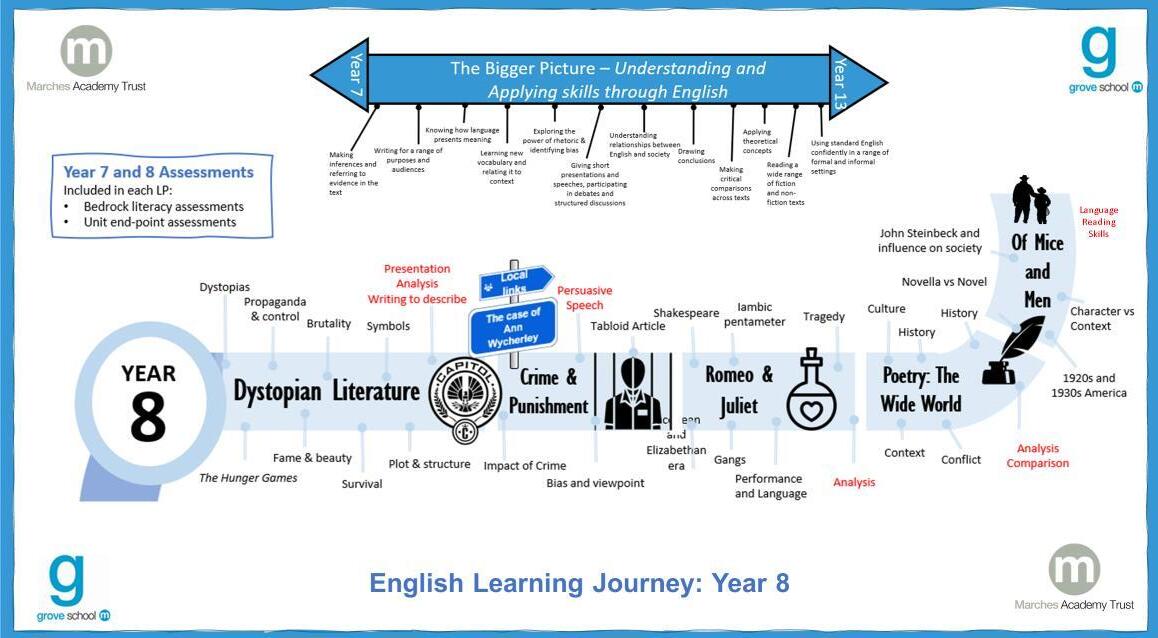
The Big Picture: Y8 is a wonderful representation of the diversity and power of the study of English. A dystopian world collides with a rich t apestry of contemporary issues: freedom and equality, survival and sacrifice, power and propaganda, protest and heroism. Building from this longer novel-study, students are challenged and inspired by a colo urful palette of contexts, genres and text types: an exploration of nineteenth century Crime & Punishment with a specific spot-ligh n g i l T e C ime f m he l cal land ca e cla ic Shake ea ian T aged h i n -expanding poetry; and a masterful twentieth century novella. Through these units, a comprehensive mix f eading i ing and eaking and li ening ni ie de el den kn ledge and kill a king hei c i i y and love of language, and preparing them for the rigors of GCSE study.
Intent for implementation: Lea ning P g amme to be covered: Dystopian Literature: The Hunger Games; Crime & Punishment; Romeo & Juliet; Poetry: The Wide World; Of Mice and Men.
Skills covered are in-line with the KS3 National Curriculum, with the aim that all pupils can: read easily, fluently and with good understanding; develop the habit of reading widely and often, for both pleasure and infor mation; acquire a wide vocabulary, an understanding of grammar and knowledge of linguistic conventions for reading, writing and spoke n language; appreciate our rich and varied literary heritage; write clearly, accurately and coherently, adapting their language and style in and for a range of contexts, purposes and audiences; use discussion in order to learn; be able to elaborate and explain clearly their understanding and ideas; be competent in the arts of speaking and listening, making formal presentations, demonstrating to others and participating in debate.
Thi ea f d ha been ca ef ll e enced b ild n hema ic and e al link e abli hed in Y each ni inned to develop specific understanding linked to text-types, genres, contexts and purposes, providing rich opportunities to acquire and then extend cultural capital in meaningful and intuitive ways. Hence, LP1 builds on the correspo nding Y ni c nnec ing i h he cen al heme f i al b a ing he eal -world settings of the prior unit with a dystopian back-d hil da ing he G eek m h f The e and he Min a LP d a n he Y In d c i n G hic de el ing den nde anding f nine een h cen c n e b in a m e l cali ed and eal- ld e ing Romeo & Juliet delves deeper into the world of Shakespeare as introduced in Y7 ; P e The Wide W ld b aden he f c f he c e nding Y Me and M W ld e ni consider wider cultural connections beyond our local and national boundaries; finally, Of Mice and Men b idge he ga be een he h e n ella f Y A Different Boy, with a more in-depth consideration of historical context in preparation for study of the GCSE novella: A Christmas Carol.
. Implementation:
• There will be five LP units. LP1 Dystopian Literature is a longer novel study and a double-unit delivered over the first full term. The rest of LPs are half-termly units of approximately 6 weeks.
• Through reading in particular, pupils have a chance to develop culturally, emotionally, intellectually, socially and spiritua lly. Literature, especially, plays a key role in such development.
• The im ance f ken lang age in il de el men ac he ea cognitively, socially and linguistically has also been i i i ed S ken lang age c n in e nde in he de el men f il eading and i ing d ing ke age and eac hers will he ef e en e il c nfidence and c m e ence in hi a ea c n in e de el P il ill be a gh nde and and use the conventions for discussion and debate, as well as continuing to develop their skills in working collaboratively with their pe ers to discuss reading, writing and speech across the curriculum.
• Texts have been selected and resources designed to promote the key values of empathy, integrity, creativity and equality, in support of den i ing a d e cellence Re ce eg la l ign-post these qualities and opportunities to support the unifying v ision of the Grove.
• Achievement will be championed regularly via Arbor parental email contact, AtL grades, E-praise postcards, phone calls home, faculty and whole-school ‘Celebration’ nominations, and crucially for students via regular, explicit feedback of skills and Ks criteria gra des.
• Independence and study skills will be fostered through challenging texts and questions, group and pair work, modelling, homew ork and independent reading for pleasure. Flipped learning, literacy tasks, comprehension tasks and creative work will be set for hom ework. S den e i i n kill ill be de el ed b in-cla and h me k a e men e a a i n PfL eca a k and l -stakes quizzes have been built into all schemes to support more effective knowledge retention and revision.
• WOW moments: designing tech-in i ed in en i n f a d ian ld e en ing A en ice le i che e l ing l cal T rue C ime den ec ding hei n ne
• Literacy skills will be addressed within all lessons with high-quality and challenging texts at the forefront of this strategy. These LPs are b he b ilding be e en ence and b ilding b illian cab la e ce cheme li e ac -f c ed h me k LP confident c mm nica ke d li elling e li e ac i e he nline Bed ck li e ac programme, and reading for pleasure.
Key assessments:
Formal assessment will occur once per half-term.
Feedback strategies will be integrated in every lesson
Teachers will live mark/ sample mark non-formal assessments as part of the wider feedback process.
Homework will support learning within individual units.
Bedrock Vocabulary will used within class and as homework to support and enhance students' cross-curricular vocabulary acquisition.
Autumn Term
Hunger Games reading assessment (Extract-Language Component 1 style)
Hunger Games: Dystopian inspired narrative creative writing
Spring Term
Reading assessmentShakespeare Crime & Punishment
transactional writing piece
Summer Term
Poetry analysis assessment Of Mice & Men reading assessment
End of year GCSE style exam
Impact: Good: Students understand some uses of real-world English and they read with independence, understanding and resilience. They wr ite with accuracy; Better: Students have a good understanding of real-world English. They read with independence, understanding and fluency. They write with accuracy, control and growing ambition; Exce llent: Students show confidence evaluating the uses of real -world English. Students confidently engage with the most challenging KS3 texts. They demonstrate evaluative skills when reading and analysing texts. They write with ambition, creativity and fluency.
Scheme
of Learning YEAR 8 OVERVIEW
e
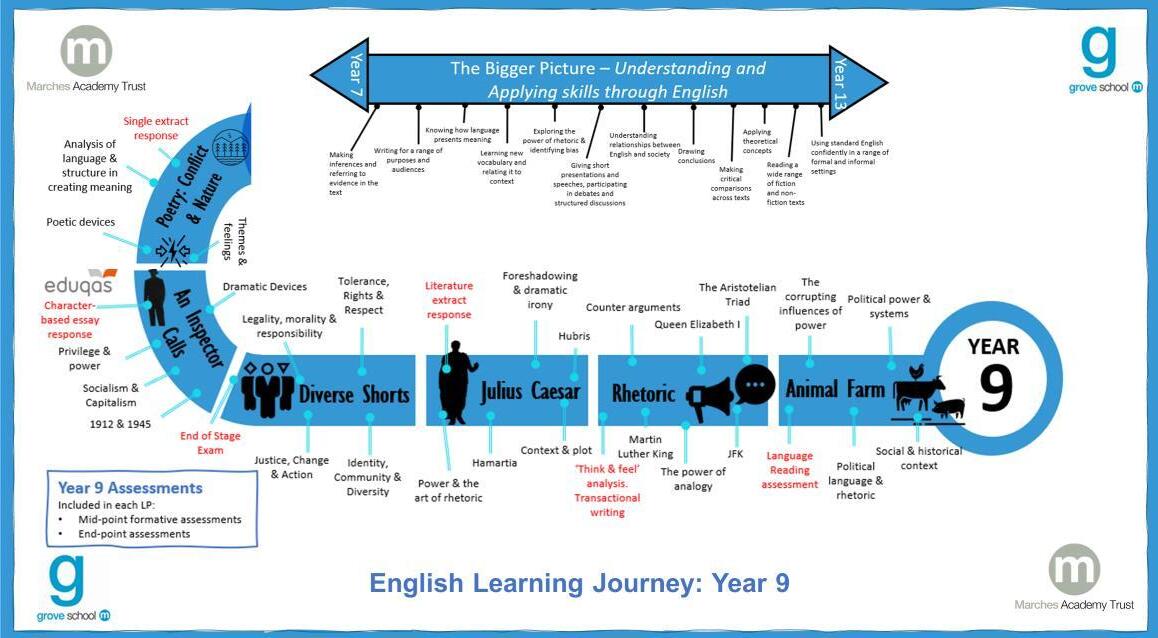
The Big Picture: Y9 is a study of power, persuasion and morality, guiding students to an interrogation of the nature of the human condition. F irs e begin i h O ell alleg ical fable Animal Fa m a d f li ic and power. Students are introduced to the art of rhetoric through study of the novella, particularly the Aristotelian triad of et hos, logos and pathos. This thread extends into the following unit: a close study of rhetoric in famous speeches across history. Study of speeches from Alexander the Great to Greta Thunberg work to support students in their own deployment of rhe ical de ice a he c n c hei n eeche Shake ea e J li Cae a i he e fec accompaniment to this study of rhetoric: an examination of politics, power and betrayal within classical Tragedy. A collectio n of diverse short stories awaits the students in Spring Term 2: this is an eclectic set of stories dealing with modern, controversial issues that affect many in our society. The summer term marks a transition to study of key GCSE texts, incl ding P ie le cla ic cial c mmen a An In ec Call Thi i an ni f den demonstrate their analytical skills and apply their understanding of subtext, using their understanding of rhetoric to help e valuate the balance of power as presented in the play. Finally, students explore a small cluster of selected poems from the Poetry Anthology focusing on the themes of Conflict and Nature: key threads of the Y7, 8 & 9 journey so far.
Intent for implementation: Lea ning P g amme to be covered: ‘Animal Farm’, Rhetoric, ‘Julius Caesar’, Diverse Short Stories, ‘An Inspector Calls’ and Poetry Anthology -’Cluster -Conflict and Nature’
This year of study seeks to expose students to a range of high-quality fiction and non-fiction texts, preparing them for their transition to GCSE at the end of this year. The curriculum carefully seq uences opportunities to explore a range of rhetorical texts to help them understand the purpose of the piece and how particular devices create nuanced effects. Aspects of rhetoric and bias have already been established within text and contexts in Y7 and 8 e.g. the dystopian tyranny in Hunger Games and Crime and Punishment LPs. In Y9, we seek to develop this understanding with close study of Animal Farm and Julius Caesar, where students can understand the real and historical impact that leading political fig e and hei he ic ha e n cie The e cla ic e a e acc m anied b a dedica ed Rhe ic LP exploring the same aspects of composition in great speeches from history from Alexander the Great right through to Greta Thunberg to form a larger schema focused on the language of power and persuasion. Students model their own speech writing thro ugh close study of these examples, refining, editing and improving their technique across series of lessons to achieve the desired impact. This deliberate dovetailing of schemes allows students to experience rhetoric in a var iety of contexts, consolidating knowledge of this and becoming more confident in using techniques in their own creative work and supporting them in their own attempts at mastery. In Diverse Shorts (the last of the Ks3 LPs) we seek to expose students to a range of societal issues that affect adolescents and how writers can convey the world around them. Lastly, studying a GCSE text and part of the Poetry Anthology at the end of the year enables students to be fully prepa red for KS4 studies. All skills will be in line with the GCSE assessment criteria : A01 (read, understand and respond to texts); A02(analyse the language, form and structure used by a writer to create meanings and effects, using relevant subject terminology where appropriate); A03 (show understanding of the relatio nships between texts and the contexts in which they were written; A04 (use a range of vocabulary and sentence structures for clarity, purpose and effect, with accu rate spelling and punctuation).
Implementation:
• There will be six LP units. LP1 ‘Animal Farm’ is read over the first half term and will introduce students to GCSE style questions.. The rest of the LPs are half-termly units of approximately 6 weeks.
• Through reading in particular, pupils have a chance to develop culturally, emotionally, intellectually, socially and spiritua lly. Literature dominates the Y9 LP especially, allowing students to develop a sense of moral responsibility and experience a range of controversial circumstances and dilemmas.
• S ken lang age c n in e nde in he de el men f il eading and i ing d ing ke age and eache ill he refore ensure il c nfidence and c m e ence in hi a ea c n in e de el Wi h he Di e e Sh S ie in a ic la di c i n forms much of the learning as students discuss and debate issues that directly affect us in modern Britain. Pupils will be taught to understand and use the conventions for discussion and debate, as well as continuing to develop their skills in working collaboratively with their peers to discu ss reading, writing and speech across the curriculum.
• Texts have been selected and resources designed to promote the key values of empathy, integrity, creativity and equality, in sup f den striving towards excellence. Resources regularly sign-post qualities and opportunities to support the unifying vision of the Gro ve.
• Achievement will be championed regularly via Arbor parental email contact, AtL grades, E-praise postcards, phone calls home, faculty and wholech l Celeb a i n n mina i n and c ciall f den ia eg la e lici feedback f kill and g ade
• Independence and study skills will be fostered through challenging texts and questions, group and pair work, modelling, homew ork and independent reading for pleasure. Flipped learning, literacy tasks, comprehension tasks and creative work will be set for hom ewo k S den revision skills will be developed by in-class and homework assessment preparation. PfL eca a k and l -stakes quizzes have been built into all schemes to support more effective knowledge retention and revision.
• Literacy skills will be addressed within all lessons with high-quality and challenging texts at the forefront of this strategy. These LPs are supported b he b ilding be e en ence and b ilding b illian cab la e ce cheme li e ac -f c ed h me k LP c nfiden c mm nica ke d li elling e li e ac i e he nline Bed ck li e ac programme, and reading for pleasure.
Key assessments:
Formal assessment will occur once per half-term.
Feedback strategies will be integrated in every lesson
Teachers will live mark/ sample mark non-formal assessments as part of the wider feedback process.
Homework will support learning within individual units.
Bedrock Vocabulary will used within class and as homework to support and enhance students' cross-curricular vocabulary acquisition.
Impact: Good: Students can access KS3 work. They read with independence, understanding and resilience. They write with accuracy and b egin to be creative.
Better: Students can confidently engage with KS3 work: They read with independence, understanding and fluency. They write wit h accuracy, control and growing ambition.
Autumn Term
Reading exam question style assessment: A i a Fa
Writing a formal speech: Rhetoric
Spring Term
Literature style assessment: J i Cae a
Reading assessment: Diverse Short Stories.
Summer Term
Literature style assessment and retrieval assessment: A I ec Ca
Single poem response: Poetry anthology
Excellent: Students confidently engage with the most challenging KS3 texts. They demonstrate evaluative skills when reading a nd analysing texts. They write consistently with ambition, creativity and fluency.
Scheme of Learning YEAR 9 OVERVIEW
Grove School: Curriculum
Key Stage 4 English g

Year 10
Year 10 begins with an in-de h d f e f he g ea e la e e i e William Shake ea e Macbeth.
We navigate the murky waters of supernatural evil, murderous ambition, regicide and tyranny, before arriving at the wreathed door of another titan of English Literature: Charles Dickens, and his most beloved tale, A Christmas Carol. Sc ge a e e a d f e c e ge hel deli e Dicke imele fable f c m a i a d social responsibility. Departing Victorian England, we arrive at the shores of the second cluster of poems from the Eduqas Poetry Anthology collection. Shelley, Dickinson, Larkin and Duffy are just some of the stellar names encountered here before we extend our poetic explorations beyond the anthology and into unknown, wilder territory, in preparation for the unseen poetry section of the Literature qualification. Our Year 10 journey ends with a leap into the Language-based content of Transactional Writing and Spoken Language presentations, crafting personal and engaging responses to wide-reaching, prevalent issues.
Year 11
The fi al e ch f de Ke S age j e ake i a a ied la d ca e f -fiction and fiction texts, honing reading-based skills of retrieval, analysis, evaluation and comparison. Imagination takes centre stage as we return to creative-prose writing skills, lifting inspiration from the genius of those writers studied earlier in the course to craft our own characters and worlds. Finally, we arrive back with those same authors and texts, reconnecting with their stories, characters and messages, to prepare for the final GCSE examinations and the next phase of the journey that awaits.
Grove School: Curriculum Narrative
g

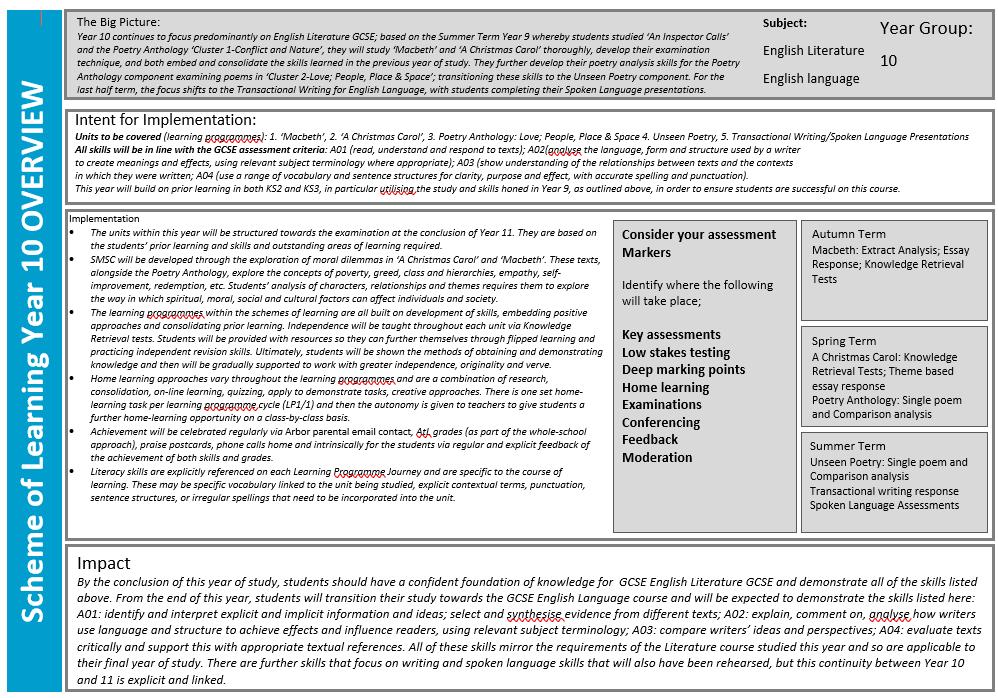
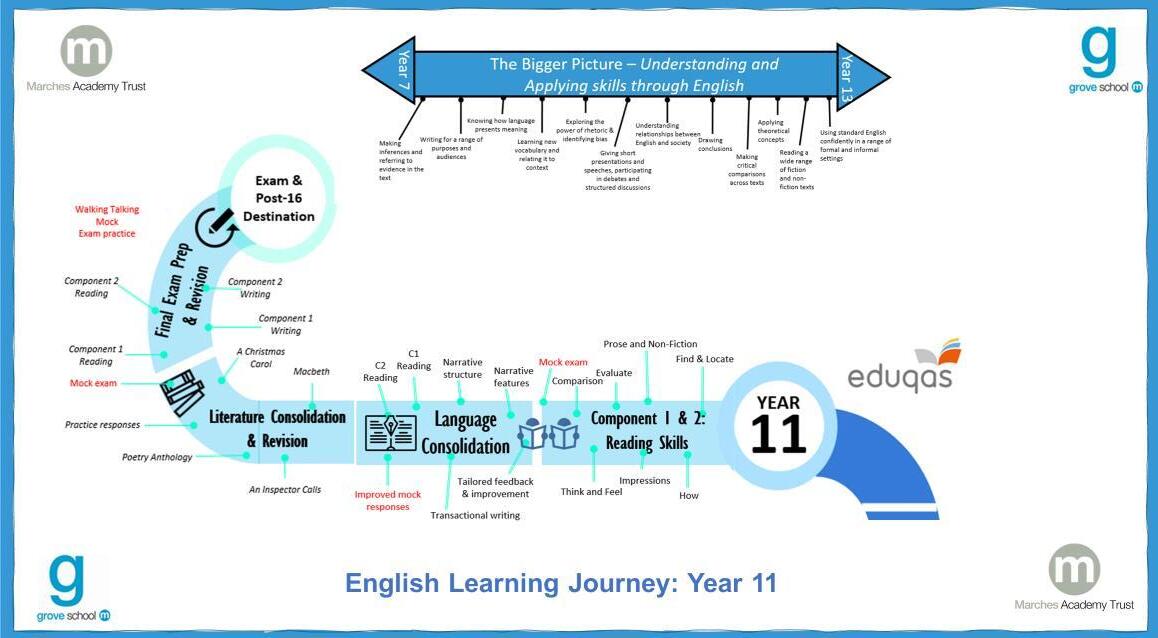
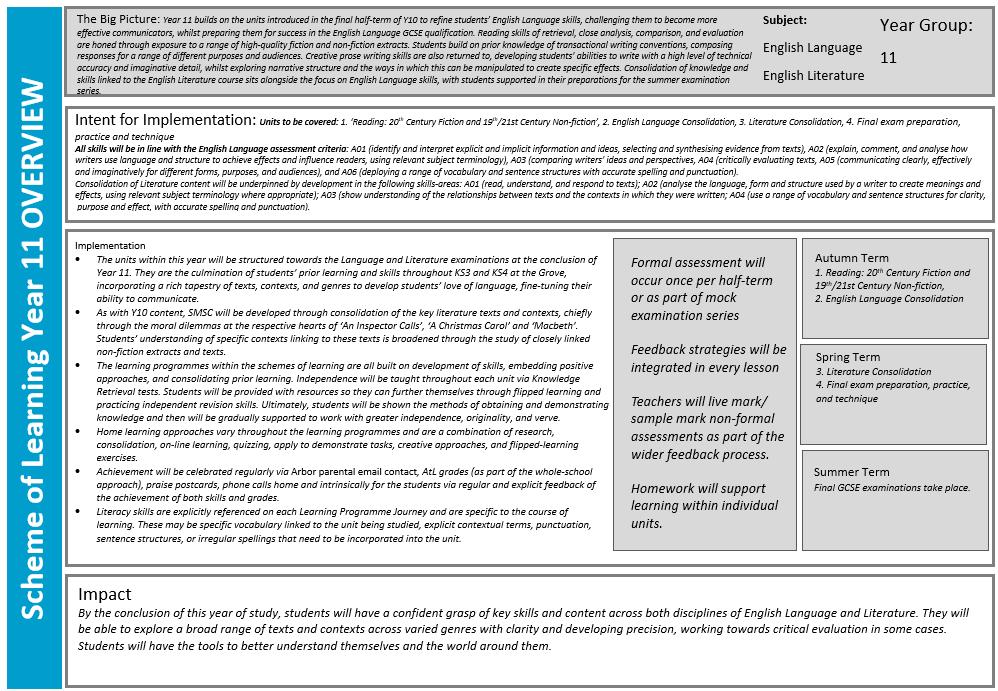
Grove School: Curriculum
Key Stage 5 English Literature g

Year 12
The A Level Literature course begins with two simultaneous trips: one to 15th Century Denmark with Shake ea e cla ic aged Hamlet, a d he he Ne O lea i Te e ee William seminal play, A Streetcar Named Desire A c m a a i e d f J h Web e i ed Jac bea revenge tragedy, The Duchess of Malfi follows, before e g e Mil e ic em Paradise Lost: Book IX a d e l a i f el i e a a i f a e e ded e a Ma Shelle m proto-science fiction, Frankenstein, a d C mac McCa h a cal ic ma e iece The Road.
Year 13
Pulling together the various strands of study from previous years, the Year 13 landscape is wild and varied. There is a strong focus on unseen analysis, both in poetry and prose, and we encounter the best that these forms have to offer whilst fine-tuning skills of analysis, interpretation and evaluation. A comparative study of the poetry of Ted Hughes and Sylvia Plath springs forth in the second halfterm, before returning to Shakespeare, Williams, Webster and Milton in final consolidation before the conclusion of the course.
Grove School: Curriculum Narrative
g

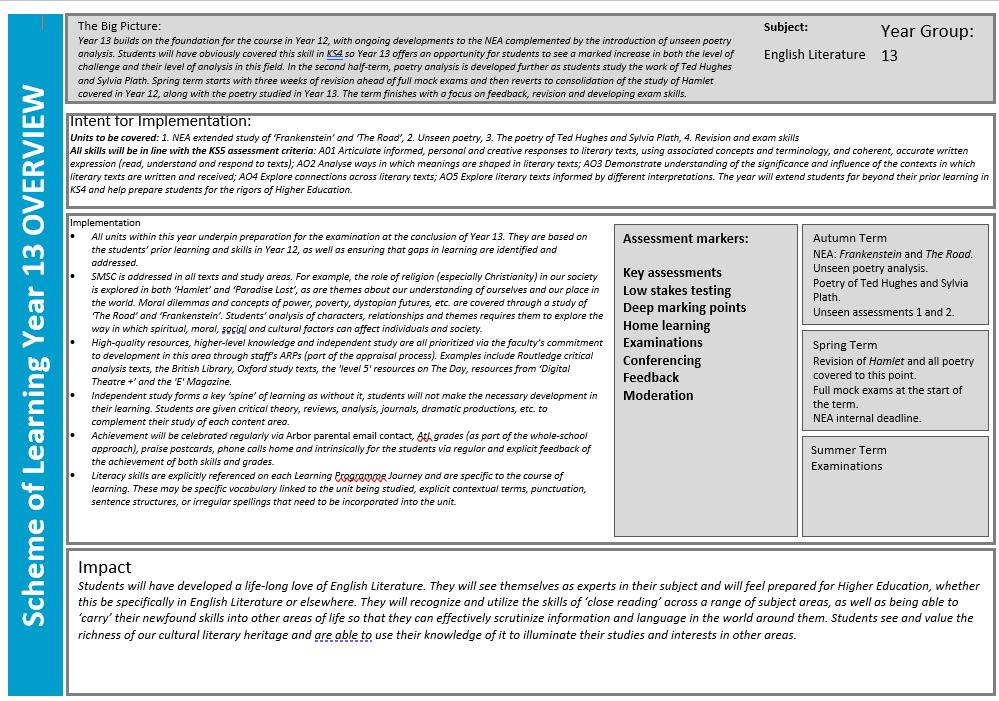
Grove School: Curriculum
Drama English and Drama Faculty g
Vision
Our curriculum aims to ignite, inspire, and challenge, providing the fuel for students to better understand themselves and the world around them.
Context
Drama has been revived for Key Stage 3 and Key Stage 4 and is still being embedded in the curriculum. Not all our students have had a formal experience of Drama before starting at Grove School, and our curriculum has been shaped to provide a grounding in the experience of Drama across a range of contexts. Additionally, students are given the chance to perform through extra -curricular clubs and performances.
Grove School: Curriculum
g
Disciplinary Knowledge
Drama is a skills-based subject focusing on embedding and enhancing performance skills. Students will be introduced to a wide range of styles and writers from around the world, through these they will practise and improve their performance skills as they become confident performers and team members.
In Key Stage 4, students will work on three components. Firstly, devising their own performance as a group and explaining their process through individual coursework. Then they will develop their skills in directing and performing a professional script, before completing a final exam where they will explain both how to take a play from the page to the stage and reviewing a live performance.
Supra Curriculum
For each unit, students are provided with something to watch, read and do to further broaden their knowledge and understanding of the topics that we are exploring. Students will also be provided with activities to allow them to stretch, challenge and hone their performance and review skills, should they wish.
Grove School: Curriculum
g

Grove School: Curriculum
Key Stage 3 Drama g
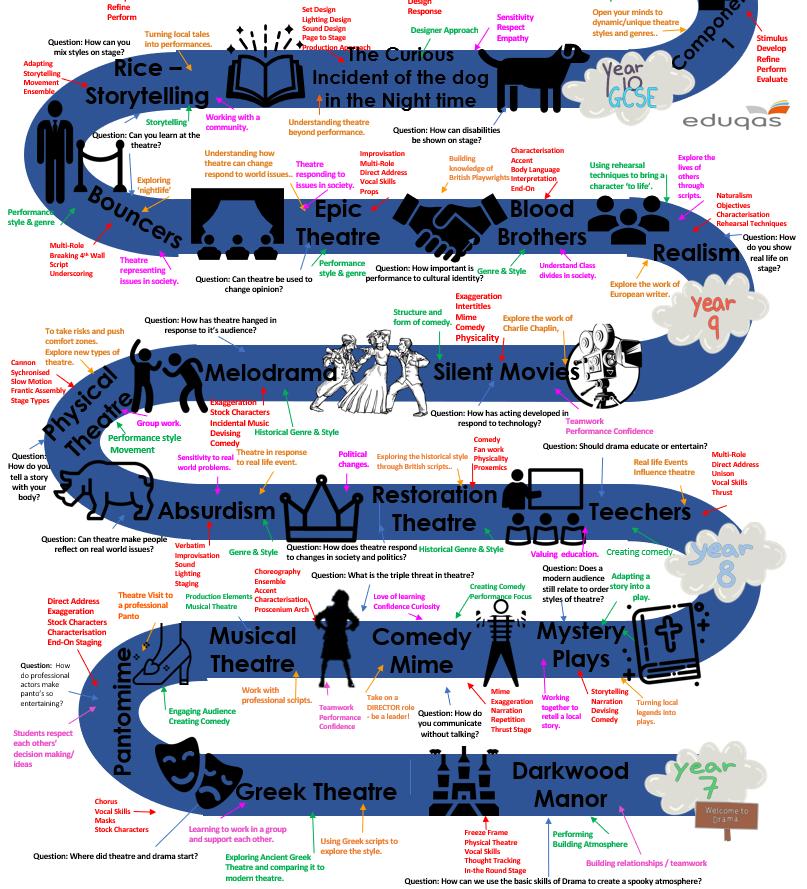
Grove School: Curriculum
Key Stage 4 Subject g
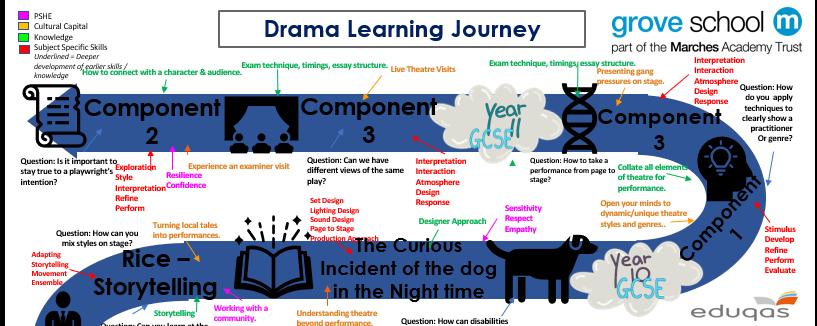
Grove School: Curriculum
Citizenship HMM Faculty g
Vision
To enable students at the Grove School to gain a deeper knowledge of democracy, government and law. We also aim to develop skills for students to be able to create sustained and reasoned arguments, present various viewpoints and plan practical citizenship actions to benefit society. We also aim to teach our students the ability to recognise bias, critically evaluate arguments, weigh evidence and look for alternative interpretations and sources of evidence, all of which are essential skills valued by higher education and employers.
Context
Students living in Market Drayton and the surrounding areas have limited exposure to a range of diverse cultural experiences compared to those students living in inner-city or urban areas. The aim of Grove School s Citi enship curriculum is to give students the e posure to other cultures, diversity, promote tolerance and to empower students to become active citizens in their local community and as a member of wider society.
Grove School: Curriculum
g
Disciplinary Knowledge
Citizenship studies investigate how the citizen is enabled by society to play a full and active part and how citizens are empowered to effect change within society. Citizenship understanding develops through the knowledge of how a society operates and functions and its underl ing values The overarching theme of this course is ho citi ens can tr to make a difference This aim is supported b three content themes Life in modern Britain Rights and responsibilities and Politics and participation. The skills, processes and methods underpin the specification. The first theme, Life in modern Britain, looks at the make -up and dynamics of contemporary society, what it means to be British as ell as the role of the media and the United Kingdom s UK s role on the orld stage
The second theme, Rights and responsibilities, looks at the nature of laws, rights and responsibilities within the UK and has a global aspect due to the nature of international laws, treaties and agreements by which the UK abides. The third theme, Politics and participation, aims to give the student, through an understanding of the political process, the knowledge and skills necessary to understand how to resolve issues, bring about change, and how the empowered citizen is at the heart of our society. Students follow the AQA specification in Year 11. https://www.aqa.org.uk/subjects/citizenship/gcse/citizenship -studies-8100/introduction.
Supra Curriculum
Students have access to a range of independent activities on Microsoft Teams for them to delve into which link to the topics covered in lessons. These will develop their enquiring minds. Activities will be in three forms: academic reading; media clips with activities; and, TED talks. Students could also become active citizenships when completing their own campaigns and within the local communit for e ample as a member of the school s Eco -club.
Grove School: Curriculum
g
What are your next steps?
How can you improve?
What revision am I doing?
What are your next steps? How can you improve?
How can you improve?
What are your next steps?
What revision am I doing?
What revision am I doing?
Revision Rights & Responsibilities










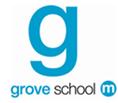


What would change in my project to make it more successful?



What kind of action have taken? Have my actions been successful?
What are your next steps?
How can you improve?
What revision am I doing?
What research have I completed and how did do it?

What issue do I want cover in my project?

Taking actions what can citizens do to take action?
How can citizens bring about political change?
Where does political power reside: with the citizen, parliament or government?

What are the powers of local and devolved government?
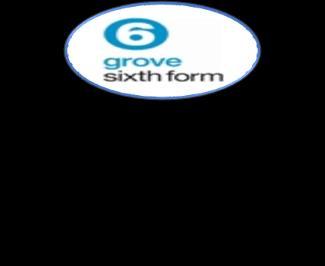
How can citizens participate?
How do others govern themselves?
What are a citizen's rights and responsibilities within the legal system?
What laws does a society require and why?




How has the law developed over time?
How does the law protect the citizens and deal with criminals?

What are the universal human rights and how do we protect them?
How can citizens make their voice heard and make a difference in society?

How do citizens play a part to bring about change in the legal system? Where does political power reside in the UK and how is it controlled?
Can you explain how the genocide in Rwanda links to human rights??
What are your next steps? How can you improve?
What are the universal human rights and how do we protect them?

YEAR 9
Citizenship GCSE Mat Nav Year 9 Year 11 Unit 1 Life in Modern Britain
Unit 1 and 2 revision based on gap analysis.
End of unit assessment End of unit assessment Unit 2 Rights and Responsibilities End of year assessment Unit 2 Rights and Responsibilities continued Unit 3 Politics and Participation End of unit assessment End of unit assessment End of year assessment Revision Life in Modern Britain Unit 4 Active Citizenship Summer exams BUSINESS STUDIES HISTORY ENGLISH PSYCHOLOGY GERMAN GEOGRAPHY SOCIOLOGY N. Warrender 17th January 2020 Overview and introduction to the course 10 YEAR Unit 4 Active Citizenship 11 YEAR PPE 1 PPE 2 Revision - Politics & Participation
many more The choice is yours!
What are the principles and values that underpin British society?
What is the role if the media and the free press? Wha he UK role in key international organisations?
What do we mean by identity?
Many,
Grove School: Curriculum
Key Stage 4 Citizenship g
Year 9 Overview
In the first theme covered as part of the Citizenship curriculum, Life in Modern Britain, students will look at the make -up, values and dynamics of contemporary UK society. They will consider what it means to be British, how our identities are formed and how we have multiple identities. Students will also look at the role and responsibilities of the traditional media, the impact of new media formats and the UK's role in international issues. Students examine and evaluate the impact of citizens making a stand and promoting change.
In the second theme, Rights and Responsibilities, students will look at the nature of laws and the principles upon which laws are based, how the citizen engages with legal processes, how the justice system operates in the UK, how laws have developed over time and how society deals with criminality. Students will consider also how rights are protected, the nature of universal human rights, and how the UK participates in international treaties and agreements. This theme also considers how the citizen can both play a part of and bring about change within the legal system.
Grove School: Curriculum Narrative
g
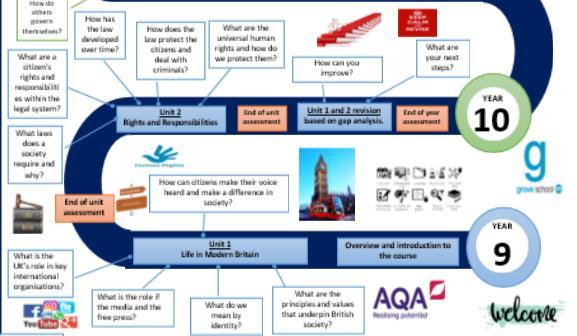
Year 10 Overview
In Year 10, our students will continue to develop their understanding of the unit on Rights and Responsibilities, first studied in Year 9, by examining the justice system and the UK's role in politics. In the third theme that our students study, Politics and Participation, students will then look at the nature of political power in the UK and the core concepts relating to democracy and government. This includes how government operates at its various levels within the UK, how decisions are made, and how the UK parliament works and carries out its functions. It also looks at the role of political parties, the election system, how other countries govern themselves, and how the citizen can bring about political change.
Grove School: Curriculum Narrative
g
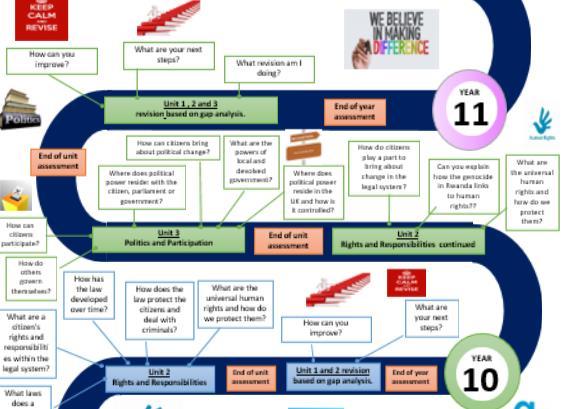
Year 11
In this final unit that our students study, Active Citizenship, students will either alone or working with others, to carry out an investigation into a citizenship issue based upon any part of the subject content explored through the qualification. The investigation will lead to a citizenship action project. This will enable students to demonstrate the application of the citizenship skills, processes and methods listed below:
• Understanding the range of methods and approaches that can be used by governments, organisations, groups and individuals to address citizenship issues in society, including practical citizenship actions.
• Formulating citizenship enquiries, identifying and sequencing research questions to analyse citizenship ideas, issues and debates.
• Presenting their own and other viewpoints and representing the views of others, in relation to citizenship issues, causes, situations and concepts.
• Planning practical citizenship actions aimed at delivering a benefit or change for a particular community or wider society.
• Critically evaluating the effectiveness of citizenship actions to assess progress towards the intended aims and impact for the individuals, groups and communities affected.
Grove School: Curriculum Narrative
g
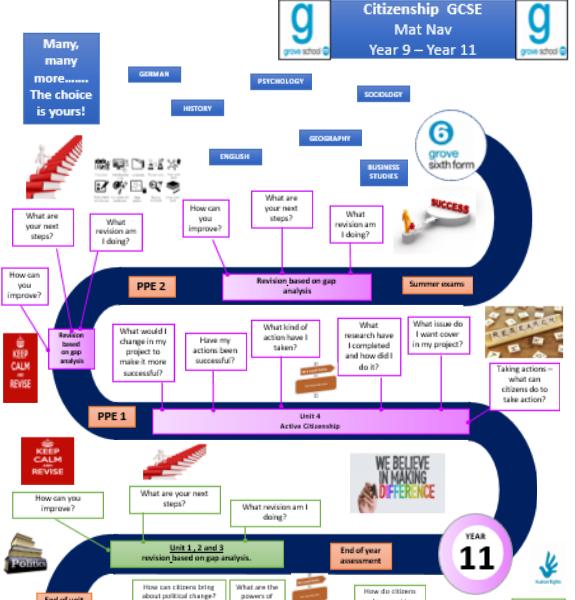
Grove School: Curriculum
Geography HMM Faculty g
Vision
To inspire an infectious, lifelong enthusiasm for geography. Our students will be equipped with the knowledge and skills to develop their own opinions, enabling them to make decisions and solve problems at a range of scales throughout their life. Students will gain an appreciation for the wider world, the environment and community to which they belong.
Context
At Key Stage 2, students will have learned to locate Market Drayton in relation to other UK towns and cities, as well as other places in Europe and the wider world. Students have also studied a range of key aspects of physical and human geography, such as climate zones, volcanoes and earthquakes, economic activity and the distribution of natural resources. Students have also covered a range of geographical skills, including grid references, eight -point compass directions and map symbols.
Grove School: Curriculum
g
Disciplinary Knowledge
Our Geography curriculum has been sequenced to enable students to develop geographical skills and knowledge. A range of Human and Physical Geography topics are taught, ranging from Population, Tectonics, and Settlement, to Rivers and Coastal Landscapes. Case studies from a range of scales are used to give students a sense of perspective, whilst also investigating differing viewpoints and using evidence to make decisions. This curriculum will give our students a secure grounding for further academic study at undergraduate level.
Supra Curriculum
Throughout Key Stage 3, Key Stage 4 and Key Stage 5, our students have access to a range of extended reading material based upon the studies completed within the units covered throughout the curriculum. These resources include age-appropriate films which will allow students to apply the theories and a critical approach to what they represent.
Grove School: Curriculum
g
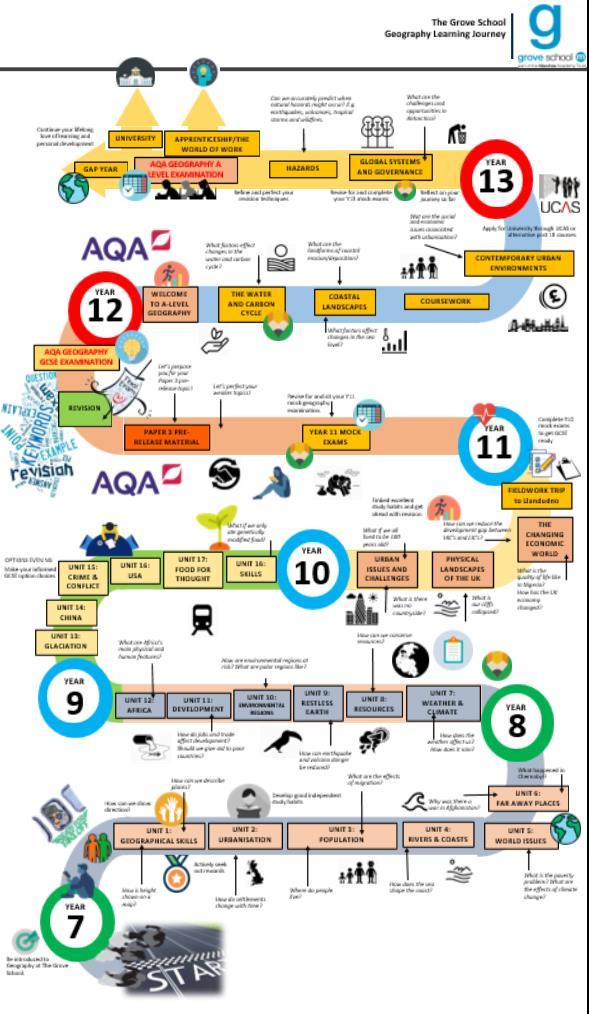
Grove School: Curriculum
Key Stage 3 Geography g
Year 7
Year 7 are armed with SKILLS to take a journey through different SETTLEMENTS to see what makes them tick before investigating the POPULATIONS that live within them and how they are distributed around the world. Next, we move from these human topics to exploring the physical land also the journey of RIVERS right down to the COASTS.
The final leg of our Year 7 journey looks at the world on a whole to identify solutions to a range of global issues, with a specific focus upon Afghanistan and Russia.
Grove School: Curriculum Narrative
g
UNIT 6: Brazil
UNIT 3: Population



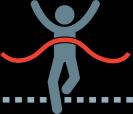



UNIT 1: Geographical Skills




In Geography at The Grove School you will:



The Grove School Geography MAT Nav
introduced to Geography at The Grove School, expectations and Extra-Curricular activities!
Geography in Year 7
YEAR 7 Be
UNIT 2: Urbanisation
UNIT 4: Rivers and Coasts
UNIT 5: World issues
What are the types of Geography? What are the different types of maps? How many oceans and continents are there? Maps skills: how can we find a location on a map? How would you describe Market Drayton? Using photos and skills from map work lessons. Volunte er to help others What are the different type of settlements? Which settlement is Market Drayton? What is the difference between rural and urban areas? Is Mumbai rich or poor? Introduction of the Mumbai case study. How has shopping changed in Mumbai? Revise your keywords! Are we spread evenly? How does population change? What are the effect of migration? What is migration? Who migrates to the UK? Why are we living longer? What is the difference between weathering and erosion? How can coastal erosion be reduced? How is the landscape shaped? What causes waterfa lls? How can the risk of flooding be reduced? Develop good independent study habits What are world issues? What are the effects of climate change? What is the water problem? What is the poverty problem and how might it be reduced? How can our energy use change? What is the climate like in Brazil? What is the culture like in Brazil? How do tribes use the Amazon? Why is there inequality in Brazil? How does football help Brazil develop?
Define, describe, explore, compare, apply, categorise and evaluate.
Year 8
In Year 8, we look at the wider world starting with WEATHER AND CLIMATE exploring the varying weathers we experience and can see all over world. We then move on to RESOURCES AND THE ENVIRONMENT where students can learn about the importance of our environment and how we can protect it. We will then journey through the RESTLESS EARTH topic to explore the exciting topics of volcanoes and earthquakes around the world whilst swiftly moving into other ENVIRONMENTAL REGIONS.
The next leg of their journey has a Human Geography focus where students will begin to understand INTERNATIONAL DEVELOPMENT and how people are impacted around the world. Reminding us of our Year 7 topics exploring global issues, students will finish the year with the topic of AFRICA (GIS).
Grove School: Curriculum Narrative
g
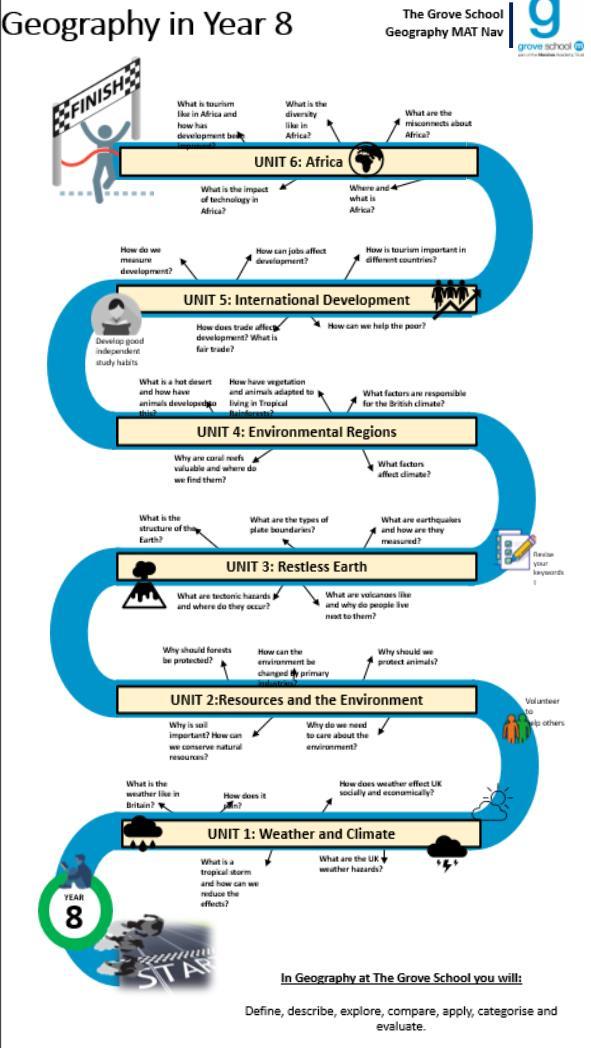
Year 9
Our Year 9 Geographers will embed their physical process skills from Year 8 when they begin by studying GLACIATION at the start of the academic year. Here they explore the dramatic landscapes left behind by swathes of ice and snow in upland areas such as the Lake District. Then the next step of their journey in the Autumn Term is visiting CHINA to traverse its unique characteristics and culture. Spring Term takes us on a study of the geography of CONFLICT with a focus on the wars of the Middle East and how they have changed the geography of region. The totally awesome landmarks of the USA are then visited later in the term. Students will undertake a visual and stimulating virtual tour of this vast and diverse country.
The Summer Term begins with FOOD FOR THOUGHT when students are encouraged to investigate the vital resources of the world and explain the reasons why some places have significant challenges accessing the basics for life, and how these can be overcome. Year 9 will then end their Key Stage 3 journey by rounding off the wide-ranging SKILLS that they have developed by applying them to several novel scenarios, including a zombie apocalypse.
Grove School: Curriculum Narrative
g
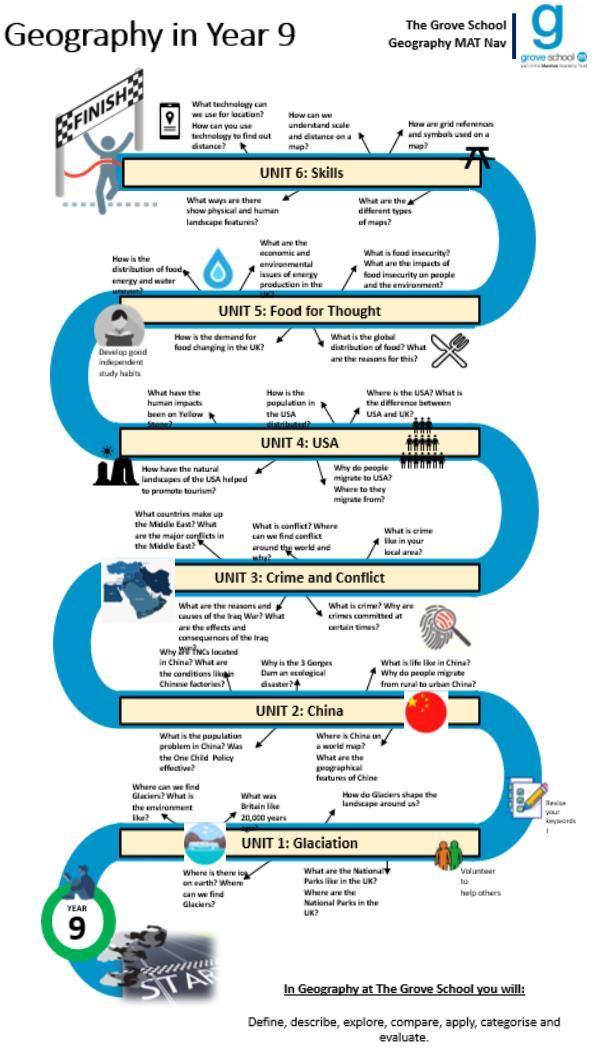
Grove School: Curriculum
Key Stage 4 Geography g
Year 10
The Year 10 GCSE Geography journey begins with an investigation into URBAN ISSUES AND CHALLENGES. Here, students will explore global patterns of urban change in low and high income countries as well as in newly emerging economies. To finish this unit, students will debate a controversial topic of whether urban areas can ever be sustainable.
Students then move on to look at PHYSICAL LANDSCAPES IN THE UK which includes how distinctive coastal landforms are created and how threats to coastlines can be managed. RIVERS are the next stop, where fluvial landforms and the effects of flooding are the main focus.
At the start of the Summer Term, students will have an adventure for the day when they partake in their FIELDWORK study trip and set out to prove/disprove different hypotheses. The last part of the term is when one of the largest units is studied, called THE CHANGING ECONOMIC WORLD. This unit explains the global development gap, rapid economic development in Nigeria and the changing UK economy.
Grove School: Curriculum Narrative
g

Year 11
In Year 11, he final leg of our journey as GCSE-level Geographers, this year is an exciting yet scary year where we will finish off our last few topics and move onto exam preparation. We start in the exciting and ever CHANGING ECONOMIC WORLD, here we will explore the development gap, other continents and even our own changing economy. After this focus on the very human factors of Geography, we swiftly move on to exploring the LIVING WORLD where we can investigate all things weird and wonderful about the environments that we live in and h he e en i nmen can im ac life e en h e en i nmen e d n li e in
Maintaining our focus on the physical Geography theme, we find ourselves exploring the NATURAL HAZARDS of the world. Students will be armed with all of the skills and knowledge needed to understand what is happening in the world around them, including the very topical issue of climate change.
Once we have then become fully developed Geographers, we can move on to looking at the AQA PreRelease materials that will help us to prepare for the final exams.
Grove School: Curriculum Narrative
g
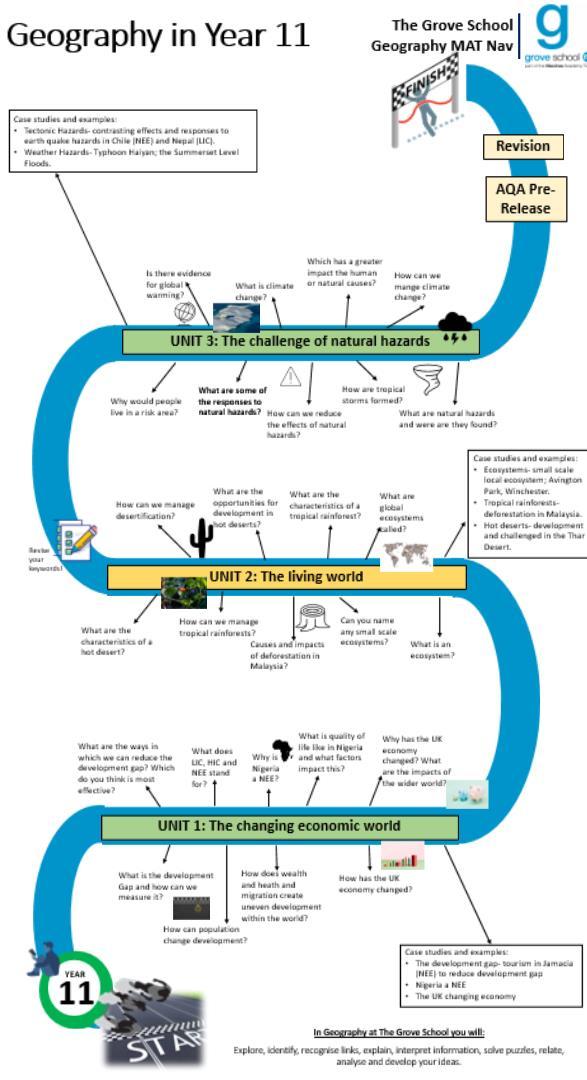
GCSE Exam Board: AQA
By studying AQA GCSE Geography, students will travel the world from their classroom. They will investigate a range of case studies as far and wise as Nigeria, Malaysia, Brazil and Pakistan.
Topics of studies include climate change, poverty, deprivation, global shifts in economic power and the challenge of sustainable resource use.
Grove School: Curriculum Narrative
g
Grove School: Curriculum
Key Stage 5 Geography g
Year 12
Year 12 Geography captivates right from the start of the A Level course, with an immediate focus on two essential physical geography topics. COASTAL SYSTEMS AND LANDSCAPES studies dynamic and beautiful environments, developed by the interaction of winds, waves, currents, and sediments to create rich diversity and important human habitats. WATER AND CARBON CYCLES delivers a careful study of concepts fundamental to many physical geography topics. How these systems cycle and change is examined, along with the contemplation of their magnitude, significance, and relevance to wider geography, and their central importance for human populations. While students navigate the channels of these first two topics, they will also immerse themselves in FIELDWORK principles and skills, in preparation for starting their NEA proposals later in the year.
As the year progresses, a wind change brings two human topics, including vibrant and diverse CONTEMPORARY URBAN ENVIRONMENTS - where students develop awareness and insight into profound questions of opportunity, equity and sustainability of human habitations. CHANGING PLACES is also taught in part. It looks at the concept of 'place' and how the character of places are shaped, bringing a lot of reflection and examination of preconceptions, stereotypes and bias.
Finally, the earlier forays into fieldwork now evolve into decisions for an individual study, or NEA - students will choose a topic from the course to investigate, and submit a proposal for a hypothesis and methodology before carrying out their research and data collection in the summer sunshine. This final effort is supported by a fantastic residential visit to the Duddon Valley and the Birks, in Cumbria, to put many of the various physical and human concepts studied to the test through applied fieldwork strategies and data collection.
Grove School: Curriculum Narrative
g
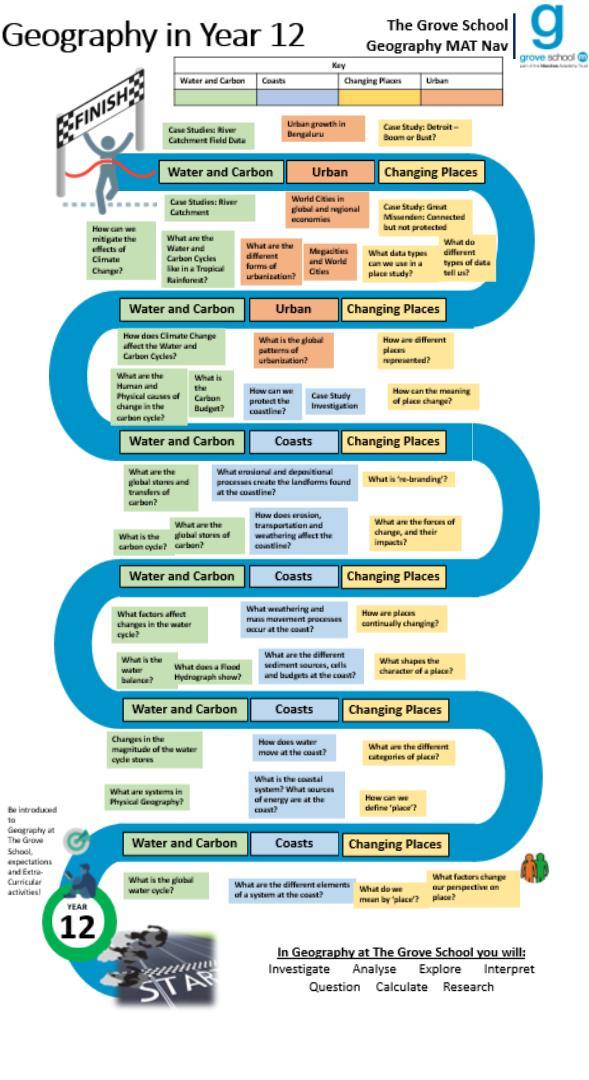
Year 13
Moving into Year 13, we will complete our studies of CHANGING PLACES. Here, our inquisitive minds will focus on people's experiences of place; how places are known and experienced, their character is appreciated, the factors and processes which impact upon places and how they change and develop over time. Along with this, we will investigate the natural HAZARDS which pose risks to human populations, from the lithosphere and atmosphere. By analysing the origin and nature of these hazards, and the various ways in which people respond to them, we will explore the many dimensions of the relationships between people and the environments they occupy.
As we continue to hone our curious Geographical minds, we will explore how a globalised world has led to change in the GLOBAL SYSTEMS AND GOVERNANCE unit. Economic, political and social changes have all helped shape the world in recent years, and with a focus on international trade, world affairs and our place within them, we will develop an appreciation of human factors which help shape our world.
The NEA gives us the opportunity to put our Geographical skills and curious nature to work on fieldwork. Carrying out investigations, designing methodologies and collecting data, all before analysing results, drawing conclusions, and writing up our projects enables us to experience what it is like to conduct primary Geographical research.
Grove School: Curriculum Narrative
g
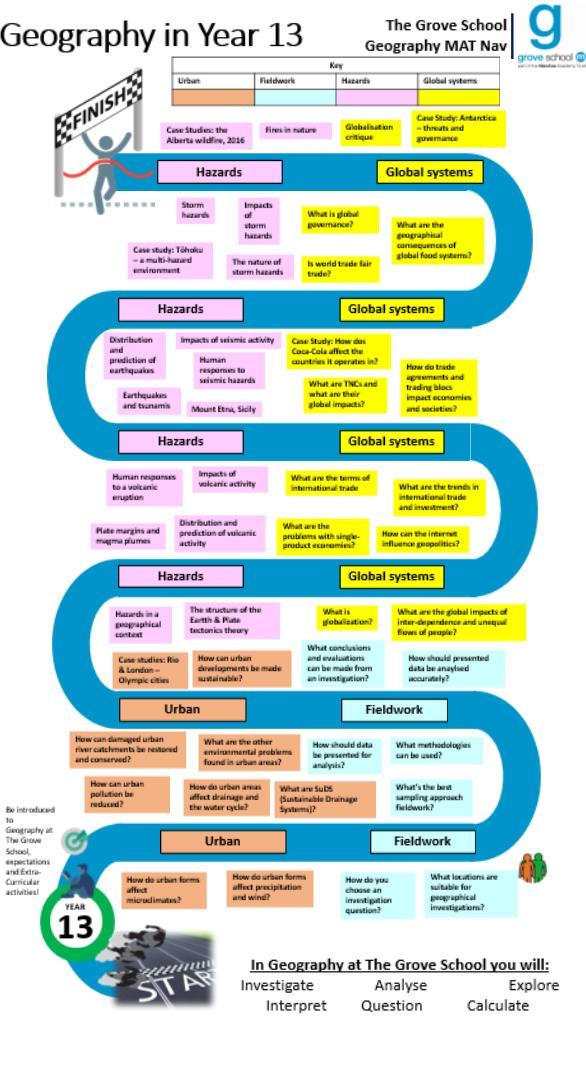
A Level exam board: AQA
AQA A Le el Ge g a h c e ill e ci e den mind challenge perceptions and stimulate their investigative and analytical skills. The course delivers on the traditional expectations for an A Level Geography study through enjoyable and popular topics, such as hazards and urbanisation, in addition to brand new units that reflect the world we live in today, for example, changing places and the water and carbon cycles.
Grove School: Curriculum Narrative
g
Grove School: Curriculum
History HMM Faculty g
Vision
To encourage a curious, infectious, lifelong enthusiasm for History. Our students will have the ability to think independently and be able to make valid, reasoned and evidenced judgements about the past. Our students will be confident in using transferrable skills that can be applied to both their local community and wider world. Students will grasp how events in the past have helped shape our local, national and international identity both in the present day and the future.
Context
Our students will build on their own historical skills learnt at Key Stage 2. Students will be introduced to second-order concepts such as cause and consequence, and change and continuity, which will be developed throughout their study in history. Students will be taught in chronological order, studying a range of historical topics beginning with Roman Britain and going all of the way to the twentieth century, focusing on both British and worldwide history.
School: Curriculum
g
Disciplinary Knowledge
Our History curriculum has been sequenced to enable our students to develop historical skills, such as inference, analysis and evaluation. This sequence of learning has been specifically designed in chronological order. The subject coverage follows the National Curriculum, enabling a range of historical events to be taught from differing viewpoints both nationally and globally. Homework is embedded to further develop knowledge covered in class and encourage curious learners to explore a wider understanding of topics covered in the classroom.
Supra Curriculum
Our curriculum goes far beyond what is taught in lessons. All Key Stage 3, Key Stage 4 and Key Stage 5 students have access to a range of extended reading material based upon their studies completed within the units covered throughout the course. Materials have been chosen to deepen students' curiosity, allowing them to be immersed within history. Historiography has been carefully chosen to encourage debate and questions amongst our students. There are also age-appropriate films which will allow students to further understand the curriculum content and encourage further challenge in relation to the development of their own skills through questioning.
Grove School: Curriculum
g

Grove School: Curriculum
Key Stage 3 History g
Year 7 Curriculum
O Yea jo ne in Hi o begin i h an in od c ion o he ke hi o ical kill and conce ha he ill be using throughout each topic. Students will then delve back in time to the year 1066, a turning point in British History, that brought an end to Anglo -Saxon rule and the great battles that resulted in the Norman Conquest. Students will then investigate what life was like during the Medieval Era, exploring villages to castles, analysing he he he ag ee i h Hi o o a al of King John a a illain befo e e amining he con e ence of he deadly Black Death.
During the Spring Term, students will explore one of the most infamous family dynasties in our history, the Tudors, from the turmoil of the Wars of the Roses through to the Golden Age of Elizabeth I. Continuing forward, students will consider the turbulent events of the English Civil War, where families turned against one another, the New Model Army was formed, and a king was put on trial for treason. In the final topic of the year, our students will discover a different type of revolution during the Industrial Age and see how it transformed Britain and catapulted it into the modern age, whilst also considering the impact that this had upon their local area.
Grove School: Curriculum Narrative
g

Year 8 Curriculum
The Yea co e b ild on den lea ning f om he e io ea b e lo ing c ime and ni hmen d ing he nineteenth century, with a particular focus on the gruesome crimes of Jack the Ripper to continue with the consistent chronological approach. Students will then progress by studying the trans -Atlantic slave trade, covering the triangular trade route, its eventual abolit ion, and the struggle for equality. This unit will enable students to establish empathy for those involved and to demonstrate thei r key skills through the sensitive analysis of primary sources. This will then naturally lead on to the next topic of the British Empire where students will have the opportunity to study different colonial countries, to examine the rise and fall of the Empire and make their own judgements based upon different interpretations about the impact of the empire.
Students will then study the First World War, this starts with how the war began and recruitment, before moving through key aspects such as the Battle of the Somme, arguably the greatest bloodbath in British history, exploring the weaponry and tacti cs used, considering life in the trenches and finally understanding how the Treaty of Versailles brought an end to one war but s et the stage for another.
The final topic will offer students the opportunity to study how women in Britain campaigned for the right to vote, allowing them to explore the methods of the Suffragists and Suffragettes and linking back to the previous topic through examining the impact of World War I before ultimately allowing students to decide how successful the campaign actually was.
Grove School: Curriculum Narrative
g
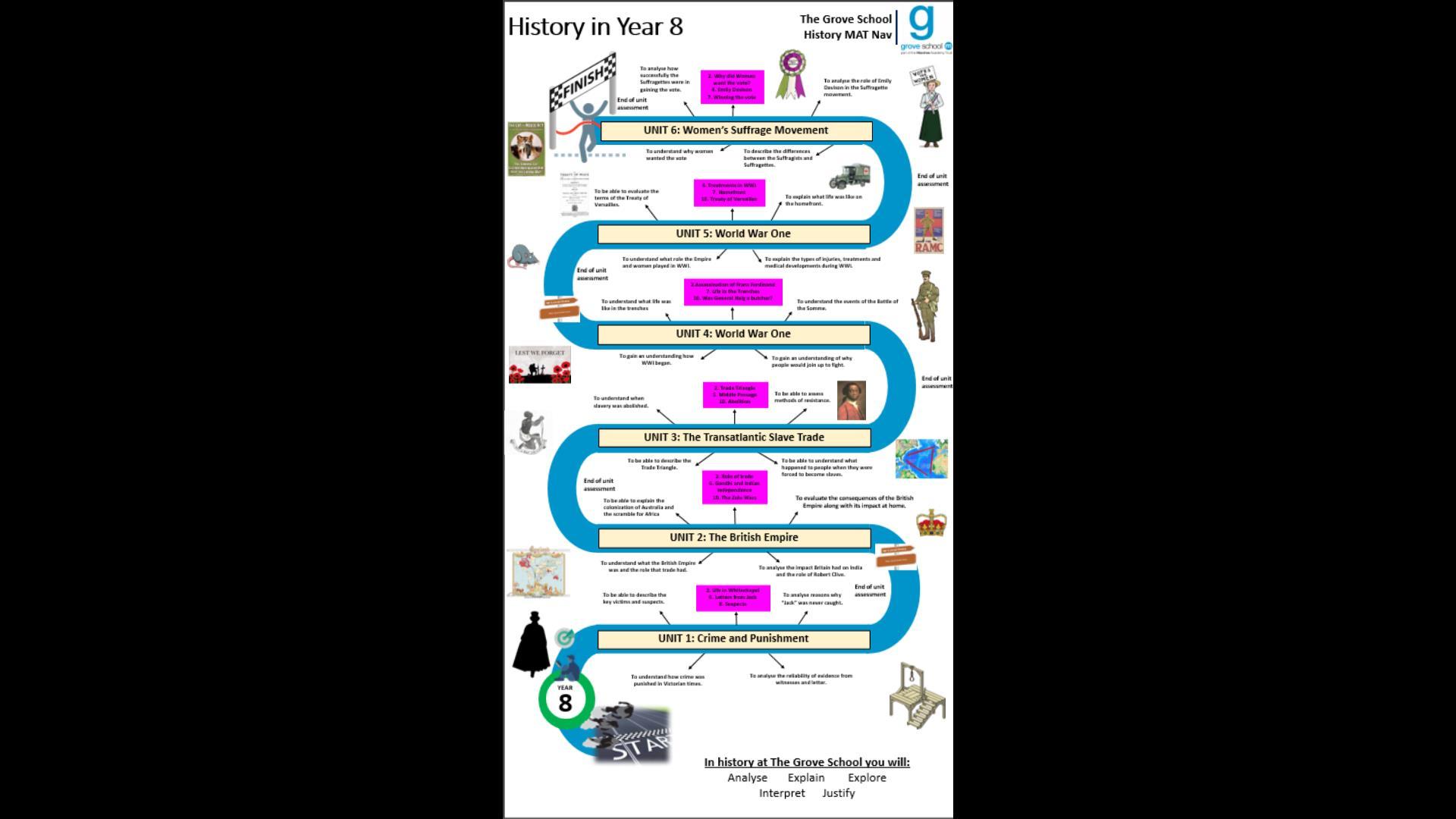
Year 9 Curriculum
The Year 9 History journey begins with the Inter -War years, following the completion of units exploring the First World War and The Suffragettes in Year 8, to enable a consistent chronological approach. Students will study the 1920s from a range of co n ie mo no iceable looking a The Roa ing T en ie and ho ocie de elo ed a idl in a ne age
Our students will then be directly introduced to the situation in Europe in the lead up to The Second World War. Germany will be looked at in detail to enable students to understand how dictatorship was established and the impact of the Treaty of Versailles on both the political position of Germany as well as the general public, leading to another catastrophic war that followed so closely after the first. Students will then naturally study the outbreak of The Second World War along with key battles and analyse policies, such as evacuation, and the impact this had on the British people. The changing nature of warfa re will be addressed, allowing students to link previous wars with The Second World War and assess the amount of change and the reasons for this. Next, students will study the Holocaust so that they understand how it was carried out and attempt to articulate the significance of such a devasting act by a dictator. Facts, along with numerous individual stories, will allow students to understand the extreme nature of the policy.
Students will then look at America and the issue of civil rights, most noticeably through key people such as Malcolm X and ke y events in the 1950s and 1960s. This unit of study allows students to showcase their chronological understanding and link back to previous learning, such as slavery, to understand the foundations of racism within the country as well as analyse modern day issues that still exist, such as the Black Lives Matter movement. Finally, students study terrorism to understand the history behind such contemporary events, looking closely at more recent terrorist acts, such as 9/11.
Grove School: Curriculum Narrative
g

Grove School: Curriculum
Key Stage 4 History g
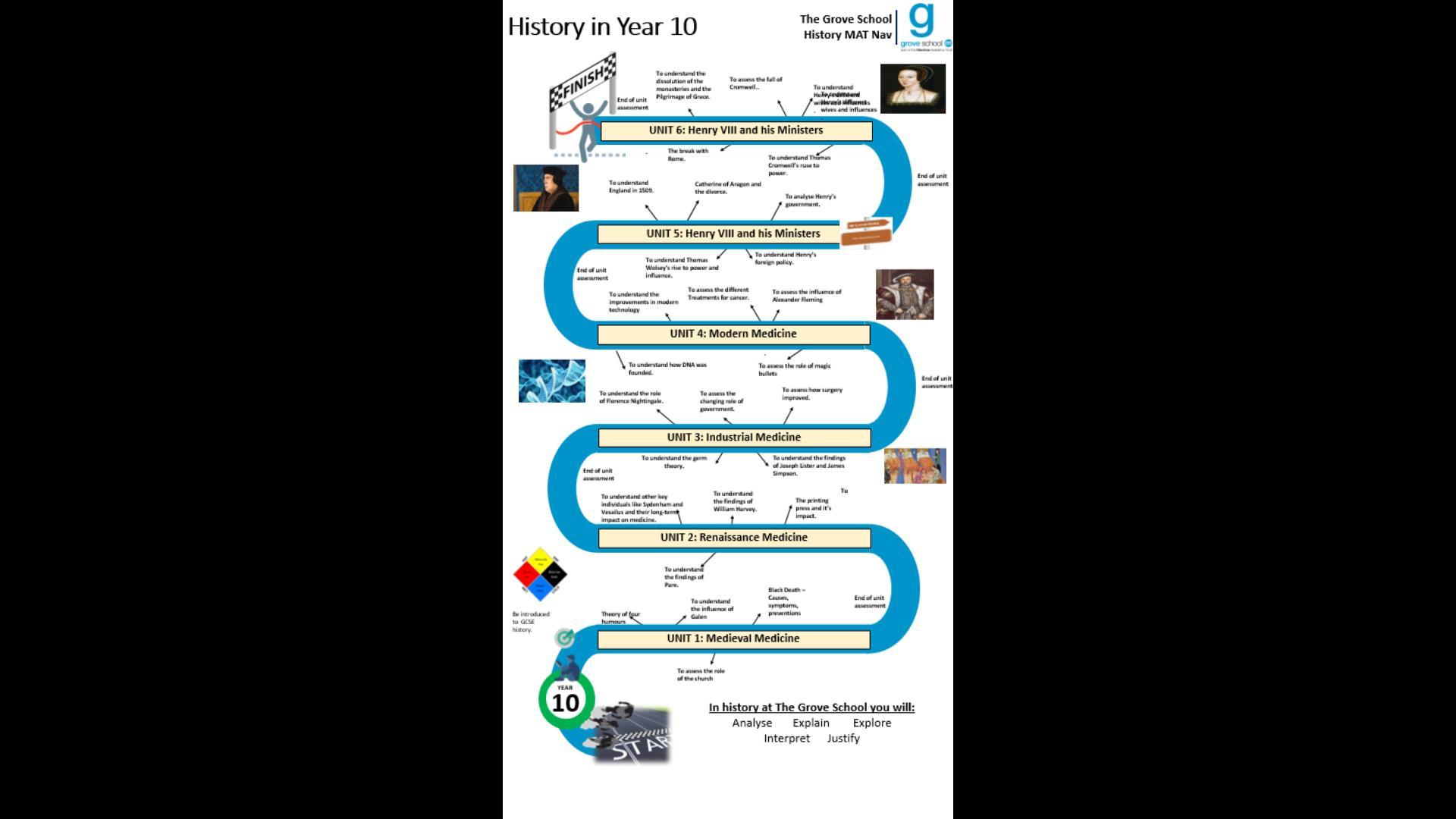
Our students begin their GCSE coursed by studying the changing nature of medicine in chronological order dating all the way back to the Ancient Greeks right up to twentieth century medicine. Students will begin by looking at the fo nda ion of medical kno ledge h o gh Hi oc a e and Galen finding and their lasting influence all the way to The Renaissance period when the power of the church lost influence. Students then look at modern methods of medical procedures that are still common today such as X -Rays and Key hole surgery. To finish the unit, students address the changing nature of warfare and therefore medicine on the Western Front.
At the start of the Summer Term, students study Henry VIII and his Ministers. Our students will delve into Henry's love life, political decision making and British foreign policy, largely through the lens of Thomas Wolsey and Thomas Cromwell.
Grove School: Curriculum Narrative
g
Year 10 Curriculum
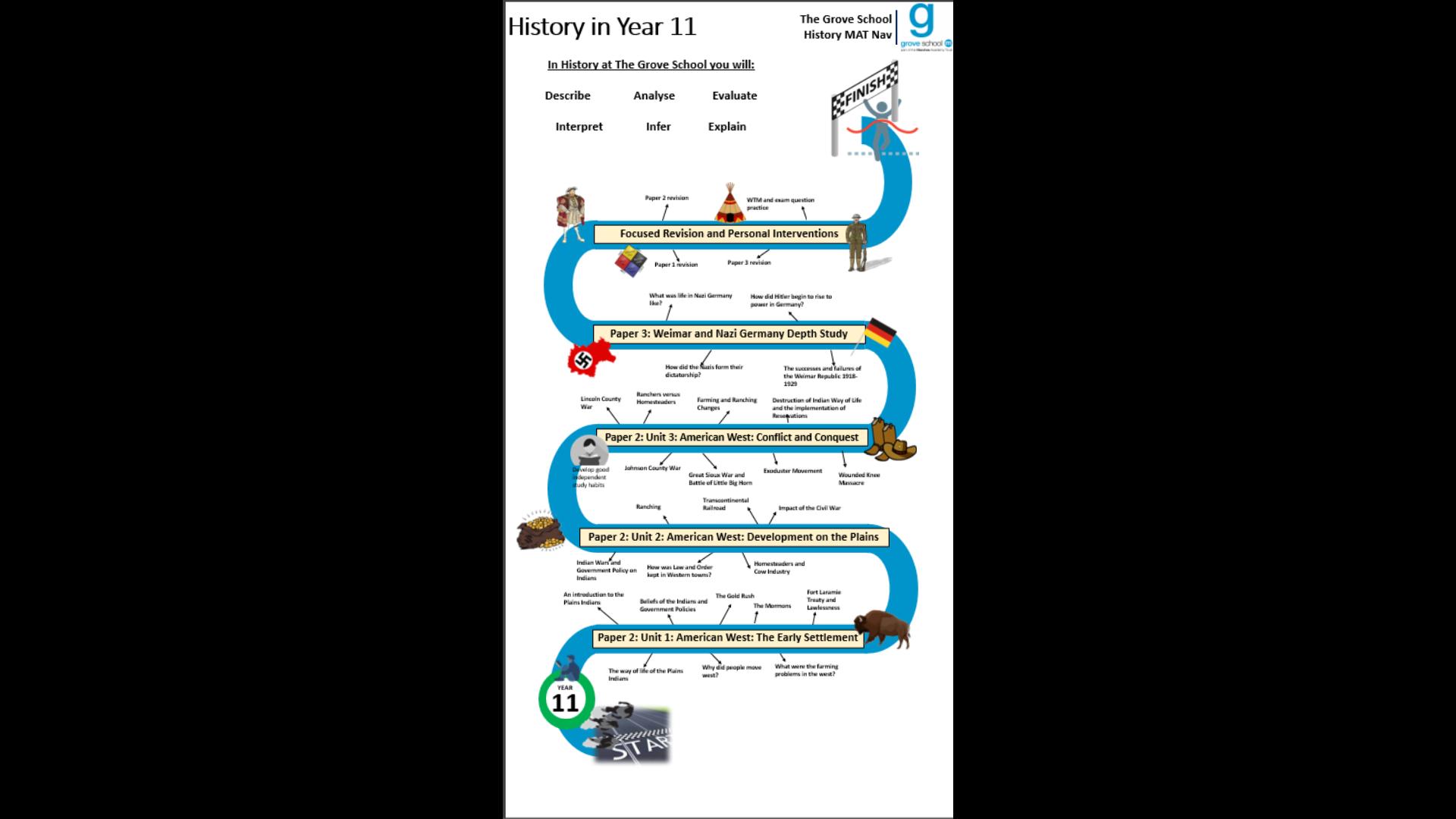
Year 11 Curriculum
In Year 11, students will continue their History journey by taking a trip across the Atlantic back to the American West in 1835. They will delve into the Plains Indians' traditional beliefs and their way of life before assessing how far this changed when westward migration (in pursuit of gold, land and settlements) began to emerge. The unit will round off with the conflict and eventual conquest over the Plains Indians that resulted in the destruction of Native American lifestyles. Students will then finish Year 11 with a depth study of Germany from the Weimar Republic through to the Nazis at the brink of World War 2. There will be a focus on synthesising previously taught content on Germany to ensure students have a wealth of knowledge on the evolution of Germany from a democratic republic through to Hi le Na i dic a o hi The ea ill fini h i h a ge ed e i ion and e onal intervention for students in preparation for their final GCSE exams.
Grove School: Curriculum Narrative
g
GCSE Exam Board: Edexcel
Within the Edexcel GCSE History curriculum, the course is broken down into 3 papers which focus on both a rich and deep knowledge of the topics selected, as well as the skills needed to make a successful historian. These skills include in depth analysis and evaluation, inference from both written and picture sources, sequencing, and synthesising information across time periods. Topics of study include Medicine in Britain 1250 -Present day, which allows us to draw on the multitude of time periods we have already familiarised students with over the course of their history journey at Grove School. As part of this, there is a specific study which looks at medicine on the British sector of the Western Front. Students enjoy this as a chance to re-discover elements of the First World War from a different perspective.
S d ing Hen VIII and hi mini e link ell i h den io lea ning of he T do in Yea Similarly, the topic of Weimar and Nazi Germany gives students the opportunity to build on their 20th Century history knowledge from Year 9. The American West is a topic that students enjoy for the chance to diversify their knowledge and understand the history of the expansion of America.
Grove School: Curriculum Narrative
g
Grove School: Curriculum
Key Stage 5 History g
Year 12 Curriculum
In the first topic, Year 12 students will explore key features of monarchical and republican rule in Britain in the seventeenth century, set within the context of broader social, economic and religious change. They will discover how the events of this period saw a decisive shift in the balance of power between crown and parliament. Students will analyse how both the Stuarts and the Republicans failed to find a stable system of governance in the British Isles during the period 1625 -88 able to cater for the increasing complexity of diversity of interests and views within the Kingdom. Students will also study the Glorious Revolution of 1688-1701, a political, religious and financial settlement whereby the impact is subject to different interpretations by both Whig and Revisionist historians.
In their second topic, Year 12 students will investigate how the period 1894-1924 was a tumultuous one in the governance of the Russian Empire. They will consider how the Tsarist governance from 1894 to 1917 grappled with the plethora of complexities in governing such a diverse Empire. Students will study how the temporary unity created on the outbreak of the First World War in 1914 was shattered by the Russian Revolution of 1917. Students will gain an in-depth understanding of revolutionary activity in Russia in the years 1894 to 1917, the response of successive governments in opposition to their rule and the reasons for the successful consolidation of the revolution of October 1917 under both Lenin and the Bolsheviks.
Grove School: Curriculum Narrative
g
Year 13 Curriculum
Year 13 students will explore the dramatic developments in late -Medieval England that centred around he Wa of he Ro e he name gi en o a e ie of ci il a ha ook lace f om -1485 between the two rival families of the Lancastrians and the Yorkists. They will explore how Henry V defea ed he F ench a he Ba le of Aginco h o gh o Richa d III b al dea h a he Ba le of Bosworth and the resulting rise of the Tudor Dynasty. Students will learn about a period of history that involves political intrigue, noble rivalries, great battles, murder, accusations of witchcraft and a great royal romance. Within the primarily political focus on the nature of kingship and authority in England, students will also study the wider social and economic contexts of political struggle.
In Year 13, students will also embark on their Non -Examined Assessment (NEA) that will enable students to develop skills in the analysis and evaluation of interpretations of an aspect of Weimar and Nazi Germany, as part of an independently researched assignment. Students will focus on understanding the nature and purpose of the work of the historian. They will be required to form a critical view based upon relevant reading of the question, problem or issue. They will also be specifically required to analyse, explain and evaluate the interpretations of three historians.
Grove School: Curriculum Narrative
g
A Level Exam Board: Edexcel
The Edexcel specification has been selected for our A Level students to study, following their experiences of the Key Stage 4 syllabus to further develop concepts and skills covered at GCSE. The course is broken down into 3 papers as well as an independent Non -Examined Assessment (NEA) unit to develop both analysis and interpretation skills.
Topics have been chosen to build on foundations of knowledge studied at Key Stage 3, including The Tudors, the Civil War and the Inter -War years. Alongside this, the topics are both interesting, engaging with the Russian Unit being particularly relevant to modern day conflicts in current affairs that can be addressed globally, nationally and locally.
Grove School: Curriculum Narrative
g
Music Humanities, MFL and Music Faculty
Grove School: Curriculum
g
Vision
To provide all students with a high-quality music education which engages and inspires them to develop a life-long love of music, increases their self-confidence, creativity and imagination, and provides opportunities for self-expression and a sense of personal achievement. Modelled on the National Curriculum, we offer opportunities for students to develop their talents in all aspects of music including composition, singing and performing, and appreciation.
Context
Students will build upon the skills they have learnt in Key Stage 2 through a range of listening, performing and composing activities. Students will also be exposed to a wide range of musical genres and their context within society. Those students who have one-to-one instrumental lessons will have the opportunity to continue receiving instrument tuition and develop their performance skills both within the classroom and through whole school and community events.
Grove School: Curriculum
g
Disciplinary Knowledge
A wide range of musical genres and opportunities are included in the curriculum offer at KS3 allowing enough time for instrumental skills to be embedded, whilst keeping students curiosity and interest through discovering a range of musical styles. Taking guidance from the Model Music Curriculum, within musical genres studied students are also introduced to key composers/songwriters of the time and study their work. Instrumental/vocal skills are naturally developed through content of each unit/style of music. At KS4 students follow the AQA GCSE Music course as it follows suitably from skills and knowledge gained at KS3. They will build on their capabilities and as a performer and composer by completing coursework. Theoretical/contextual knowledge of music and styles is covered across four areas of study. These include music from western classical traditions, as well as pop music and music from around the world. Areas of Study are taught out of numerical sequence for unit 1, to allow students to be taught the setworks for each unit at the same time as the area of study they are related to.
Supra Curriculum
All students will be provided with a range of wider listening and reading activities to allow them to further explore and broaden their knowledge and understanding of musical genres, styles and artists/composers introduced throughout the curriculum. Students will be provided with activities to allow them to stretch, challenge and hone their listening skills should they wish to, as well as being provided with reading and research tasks with articles from online/magazines/newspapers, ideas of places to visit, written and creative tasks.
Grove School: Curriculum
g
Grove School: Curriculum
Key Stage 3 Music g
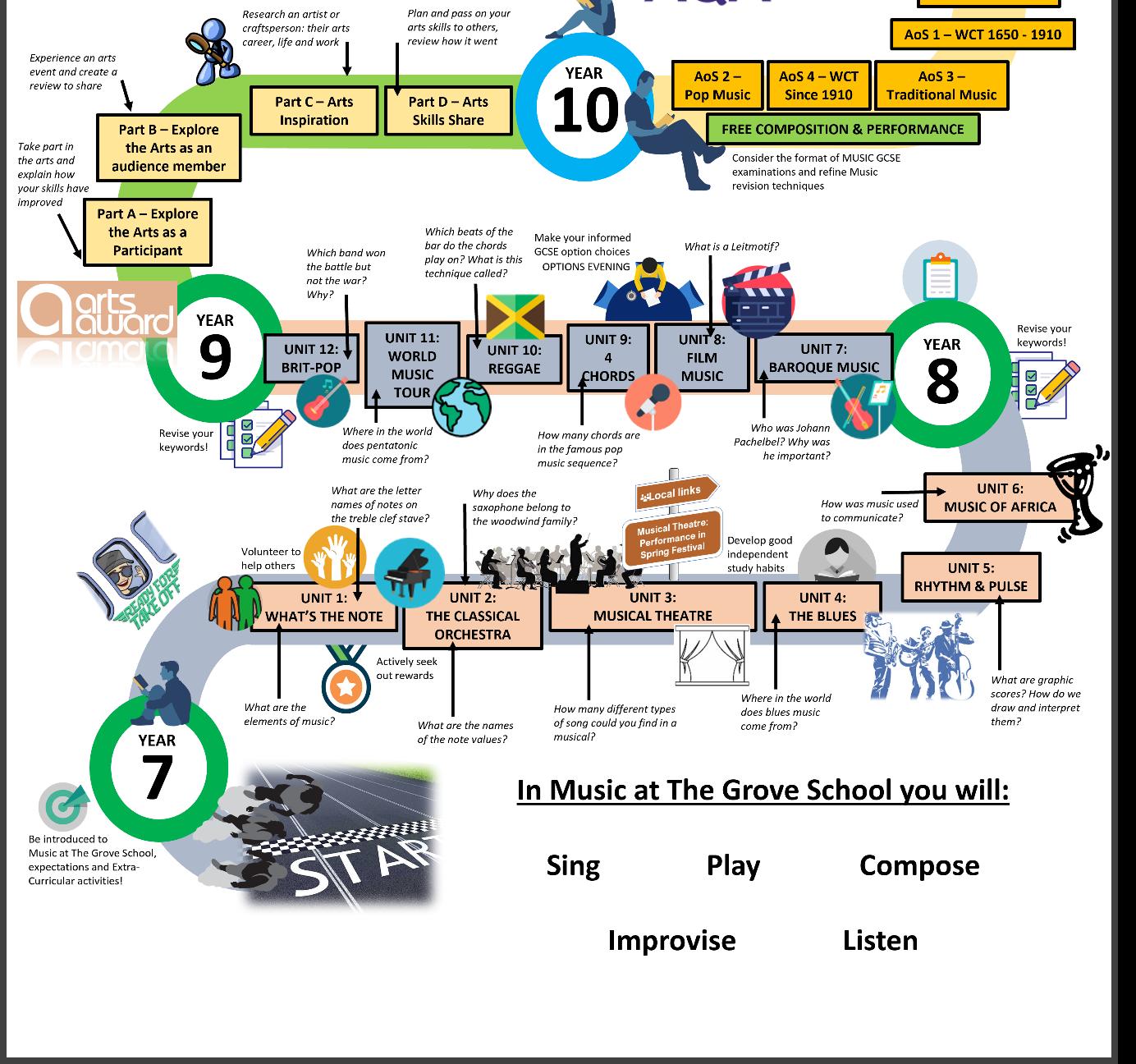
Year 7
Our Year 7 curriculum begins with learning to understand the fundamental building blocks needed to talk about, create and play music, with a particular focus on reading notation. Putting these skills into practice leads to an introduction to Wolfg ang Amadeus Mozart and what he has to do with one of the first pieces that we ever learn. From this, we then move on to learning about the families of instruments, and how they look and sound in the setting of a classical orchestra with the help of compo ser Benjamin Britten. Next, we explore musical theatre and begin to understand how storytelling comes alive on the stage and the important part music has to play in this. From Broadway to Mississippi where we will look at a different type of storytelling in o e plo a ion of Bl e m ic Lea ning abo i oo and ho i became he Bl e B B King ho he a a e a t to create our very own 12-bar Blues song. Finally, its all about rhythm, writing our very own pulse pieces and exploring the importance of drumming and call and response in the music of Africa.
Year 8
Our Year 8 curriculum begins by travelling back in time to revisit the Western Classical Tradition, this time meeting Johann Pachelbel and understanding his importance in the Baroque era. We use his work to continue to build on keyboard/note reading skills learned throughout Year 7. Then it is on to film music. No one writes musical motifs quite like John Williams, making characters instantly recognisable before you even see them. This unit of work lets us understand why and, as well as pe fo ming he o k of o he gi e he oppo ni o c ea e o e o n Ne in Yea i Pop m ic We hea i e e he e on he adio in o ca alking a o nd he pe ma ke So i mo e impo an han e e o nde and i and pla i o el e The ied and e ed -cho d e ence ho he i ing of h nd ed of ong and gi e he ool o i e o o n F om he e i off o Jamaica he e i i all abo Reggae m ic Bob Ma le i non mo i h Reggae o hi work becomes our focus here, using it to further develop our instrumental and performing skills. Our world music tour then takes us to Japan and China, working to understand their musical traditions and ways of composing. Finally, we end up back in Britain. Oasis vs Blur are the two main protagonists in our Brit -Pop battle: which band won the battle (but maybe not the war)?
Grove School: Curriculum Narrative
g
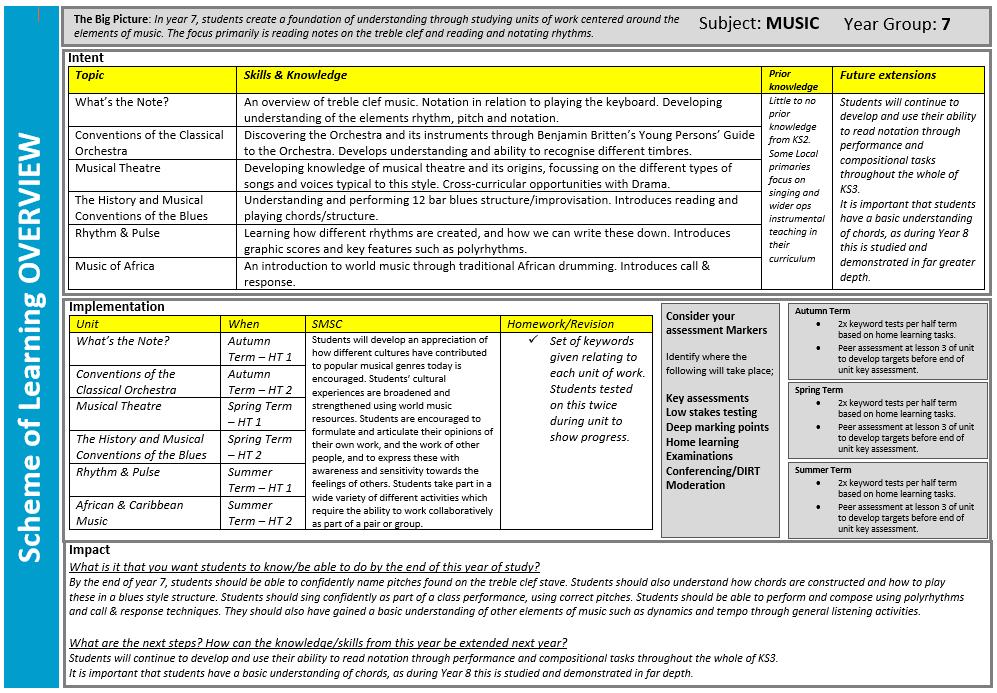
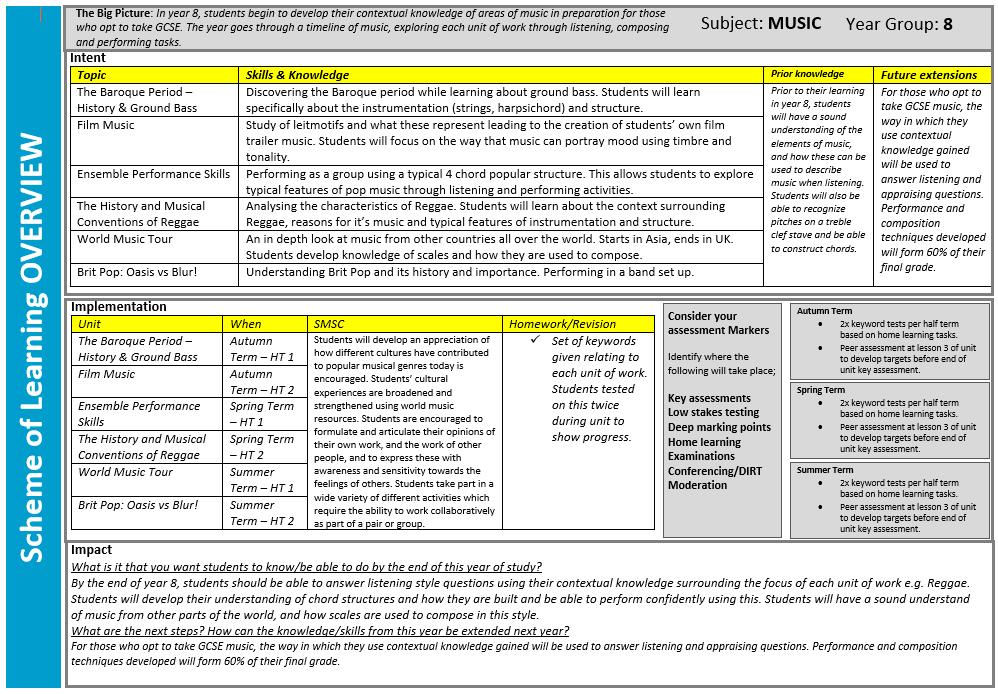
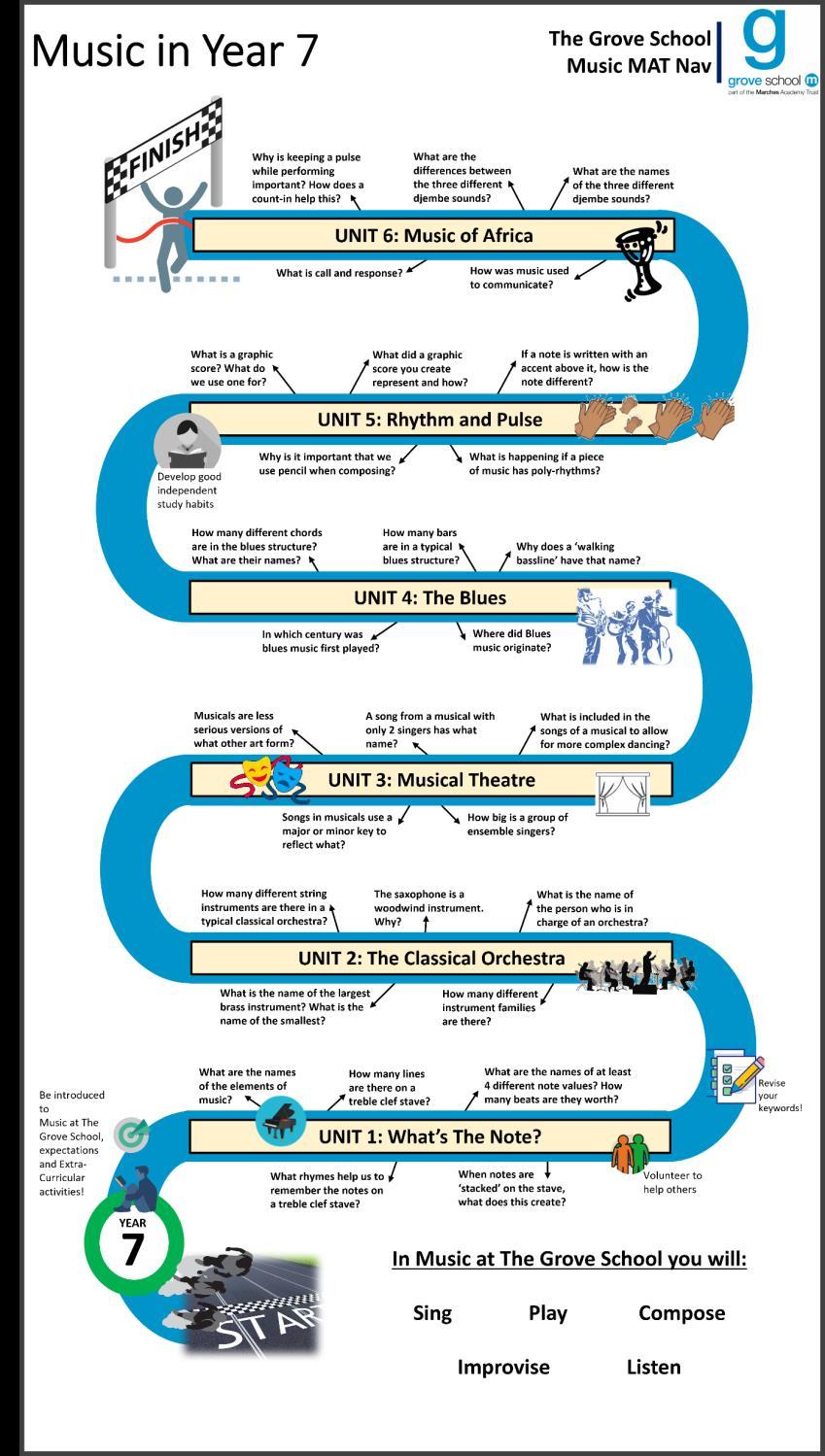
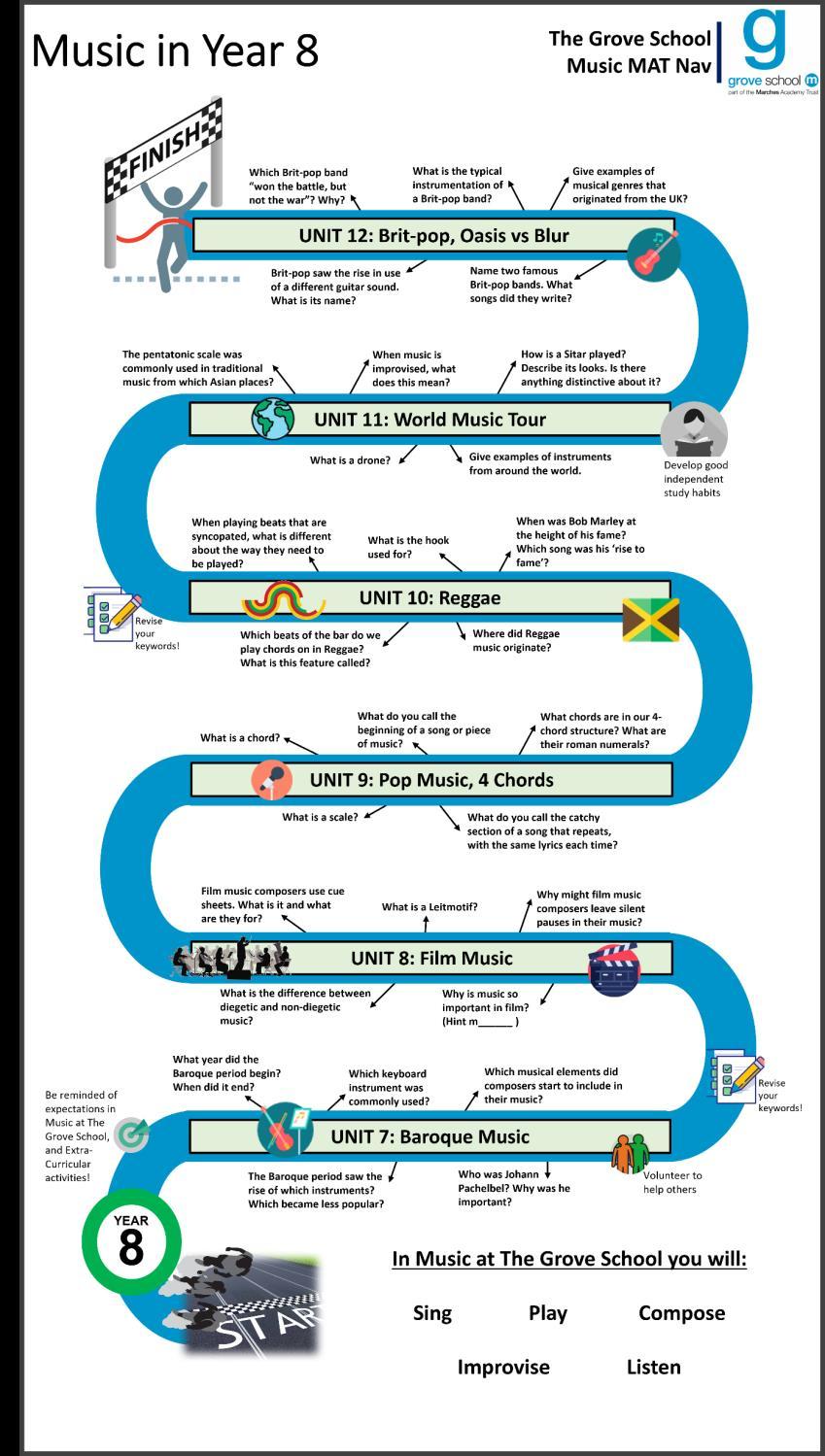
Year 9 Bronze Arts Award at The Grove School
Year 9 becomes a transition year with purpose where all students will work to achieve an arts -based qualification across Music, Drama and Art. It is unique in its approach and is a culmination of all the skills learned throughout Year 7 and Year 8 across the three subjects, using them to complete the Bronze Arts Award, a nationally recognised qualification offered by Trinity Colleg e, London. At Grove School, the arts are highly valued, and we are committed to ensuring that every student is given the opportunity to develop their interests further as part of a broad and balanced curriculum, and therefore continue their studies of the arts throughout Year 9.
With Music, in partnership with Art and Drama, following the Bronze Arts Award it means that all of our students will have th e opportunity to take part in the arts as a participant, become an audience member and take a closer look at artists whose work and career interest them the most.
For Music specifically, this gives us the opportunity to further develop practical skills on instruments that students have particularly liked in previous years of study and to share these with others. Students will also become a theatre reviewer in Drama, by forming their own critical opinions of a performance that they have the opportunity to watch and then discuss with others. In Art, students will consider which artists inspire them the most. They will take a closer look at their career and con ide ha he needed o do o achie e hi S den ill al o e al a e hei o n opinion of he a i o k Students will fill in their logbooks as they go, collecting their evidence, and this will help them to achieve the Bronze Art s Award at The Grove School.
Grove School: Curriculum Narrative
g
Year 9 – Bronze Arts Award at The Grove School


Grove School: Curriculum
Key Stage 4 Music g
Exam Board Selection
At The Grove School, students have the option to continue their musical journey in Key Stage 4 and Key Stage 5.
As a school, at Key Stage 4 we have chosen to offer AQA GCSE Music for a number of reasons. The content in each area of study for Unit 1 (Understanding Music) builds on previous knowledge and foundations laid throughout the Key Stage 3 curriculum and is a natural development of students' understanding. Students are familiar with completing unfamiliar listening tasks in Key Stage 3 as they explore new genres of music, which is a skill that can be further built upon in exam preparation for the AQA GCSE Music paper.
All GCSE Music exam boards have a composing and performing coursework element. Students are provided with the building blocks for these skills in Key Stage 3 to naturally develop their musical maturity in exploring these further as aspects of t he GCSE qualification.
At Key Stage 5, the Grove School has chosen to offer the OCR Cambridge Technical Foundation Diploma in Performing Arts. This is a Level 3 vocational qualification that prepares students for the world of work in the music industry. In addition to this , there is a substantial focus upon performance in the units offered and through the assessment criteria, therefore allowing students to understand exactly what style of performer they would like to specialise as and to develop vital performance skills through t hese opportunities. Within this course, students will continue to develop important theoretical understanding of music and specifi c knowledge of significant performers and composers.
Students who study GCSE Music would also be suitably prepared for A Level Music, should they decide upon this route of study.
Grove School: Curriculum Narrative
g
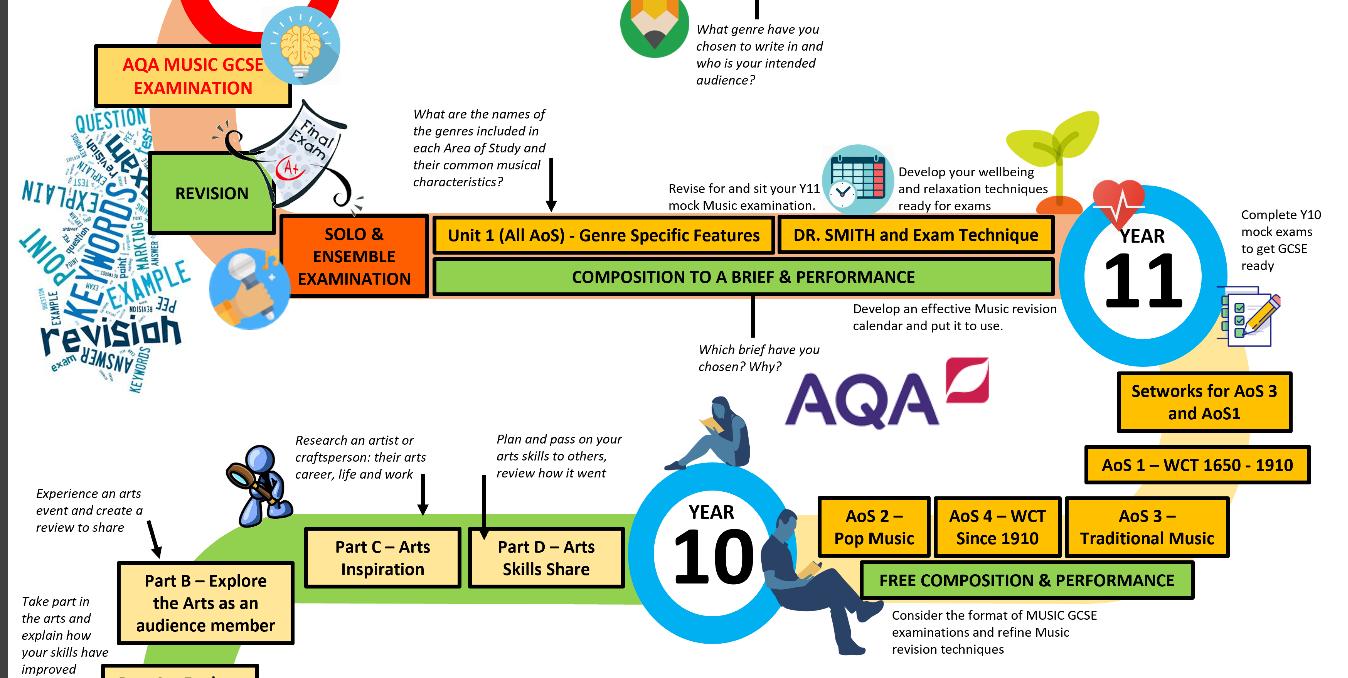
Year 10
GCSE Music is split into three units: understanding, composing and performing music. Performing opportunities arise throughout Key Stage 4 in the preparing of group and solo performances not only for use as part of the course of study, but f or community events too.
Composing music is an integral part of Key Stage 4 and this is based within the Music Department using our state -of-the-art technology and further developing skills introduced throughout Key Stage 3 to get creativity flowing. Unde anding m ic i pli in o fo a ea of d We a i h Pop la M ic hich ha a ide -ranging context from m ical hea e and he pop m ic of oda o he m ic of ideo game and film Then e look a he We e n Cla ical Tradition post- incl ding gen e ch a Minimali m and Se iali m and he o k of compo e ch a Te Rile and John Cage F om he e e look a T adi ional M ic hich ee d of bo h m ic f om a o nd he o ld a ell a folk m ic of he B i i h I le The final a ea of d ha e look a in Yea i ha of he We e n Cla ical T adi ion - before looking at both set works from this era and traditional music, which looks in detail at pieces of work by Mozart and Paul Sim on respectively.
Year 11
In Year 11, the performing and composing coursework takes centre stage. Students have the opportunity to record performances alone and with others, and to complete both their own compositions and those in response to a brief provided by the exam board.
Alongside this, students continue to develop their theoretical knowledge by further embedding their of understanding DR. SMITH and how this can develop exam technique. Students also revisit each of the areas of study covered in Year 10 in further depth by looking closely at unique features that characterise each genre and the works of key composers.
Grove School: Curriculum Narrative
g
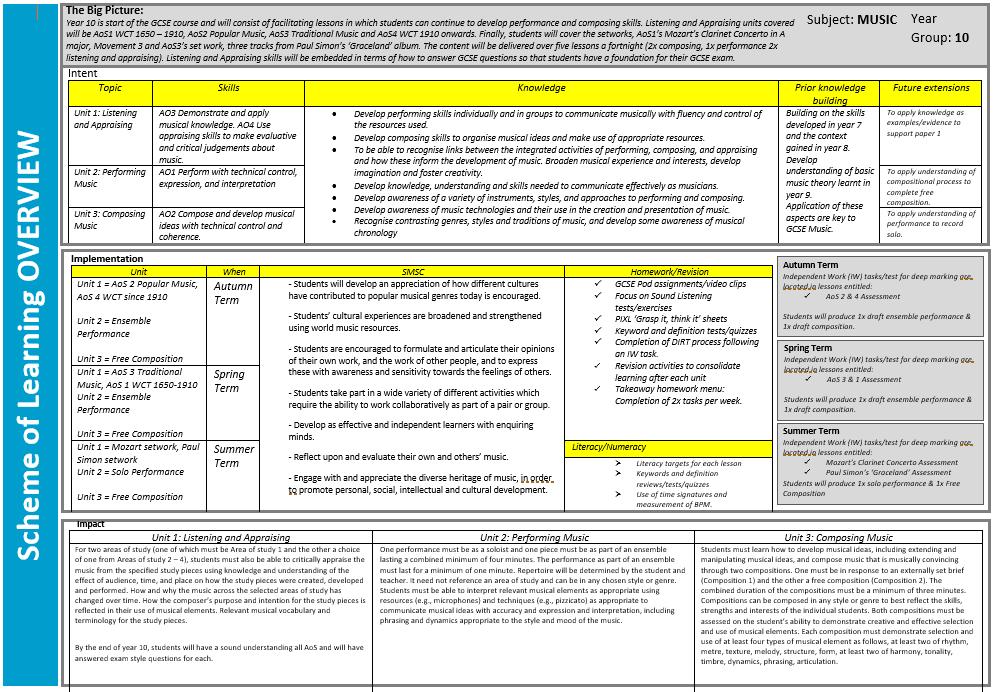
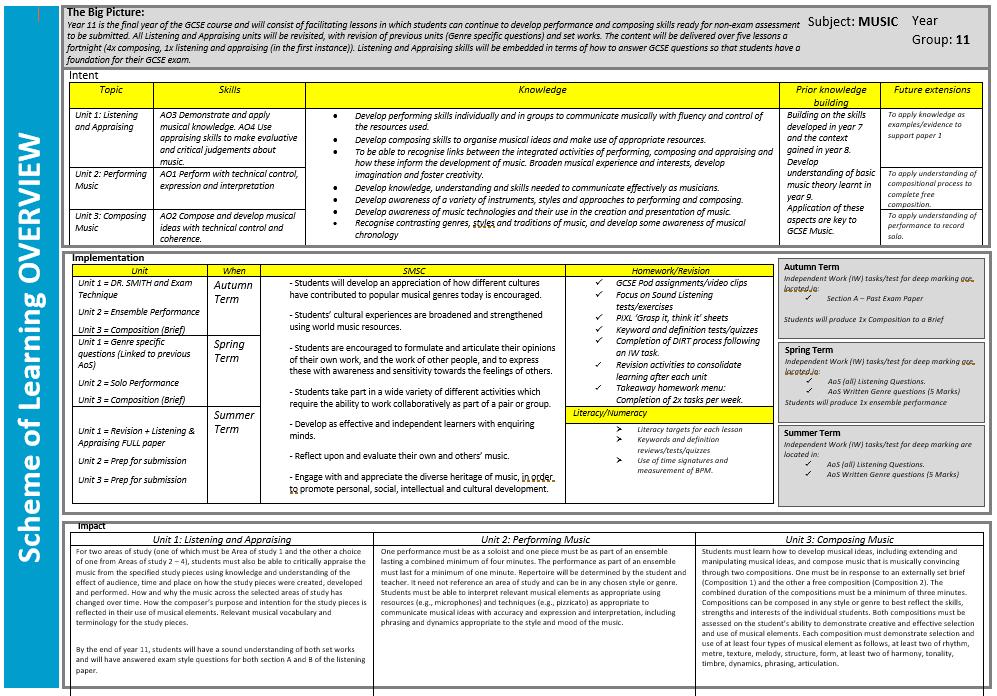
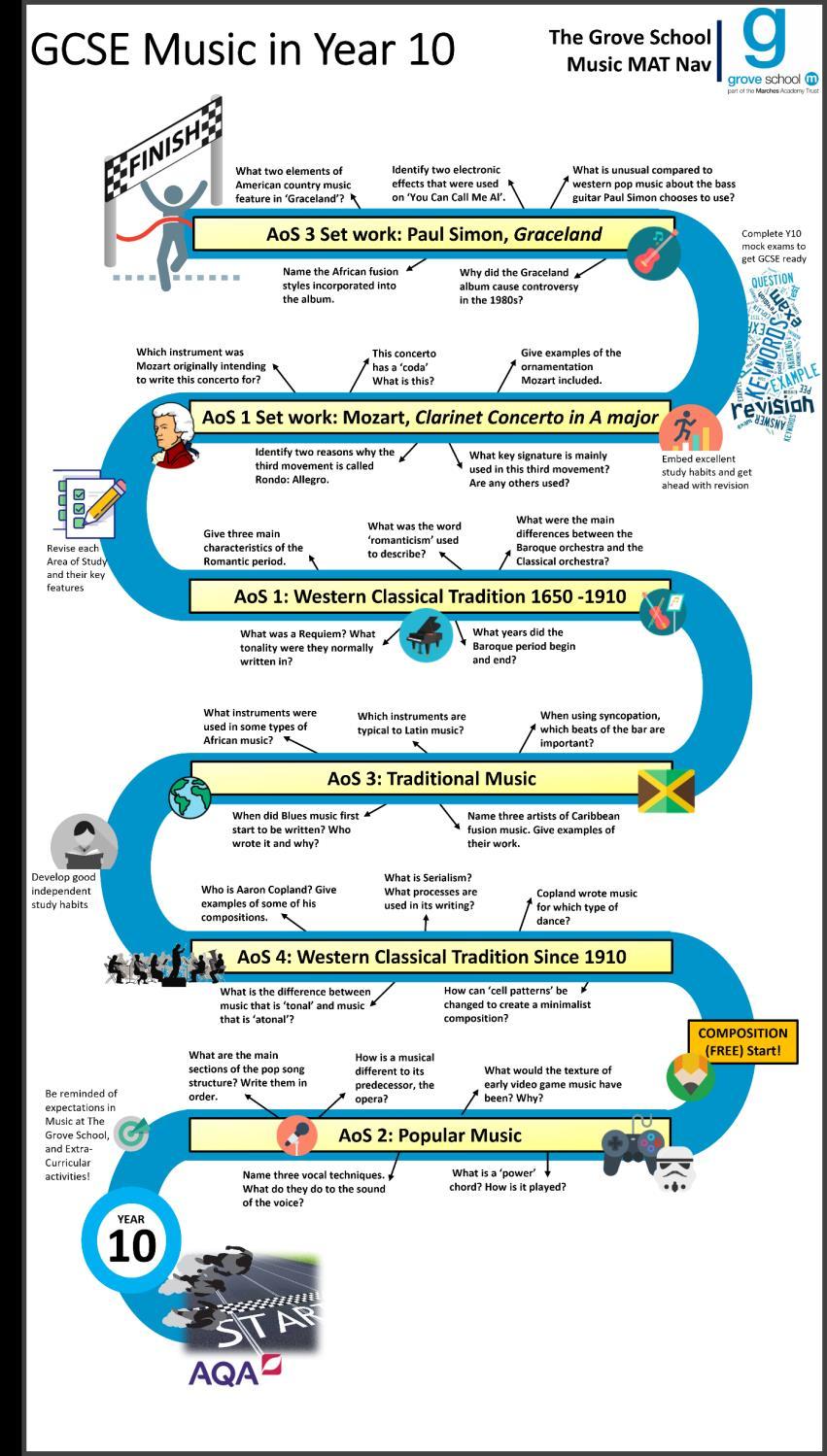
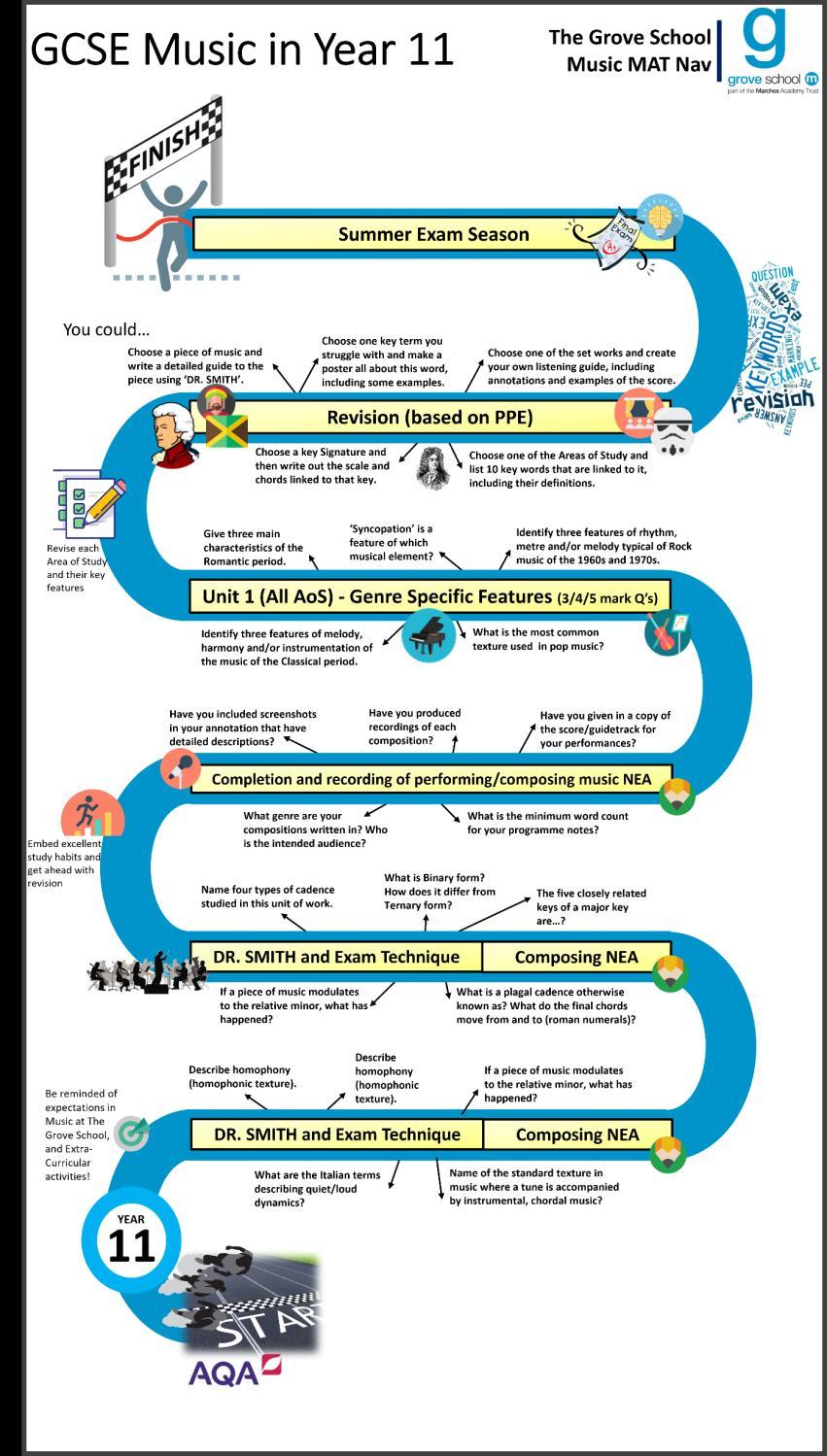
Grove School: Curriculum
Key Stage 5 Music g

Year 12
The Performing Arts Industry is a large and complex business. As well as playing a part in the cultural life of a country, it has significant economic benefits and impacts on the lives of most people. For the first unit of the Cambridge Technical Level 3 Foundation Diploma that we study in Year 12 will explore how to prepare musicians to work in the Performing Arts Industry. It looks at strategies, attitudes and survival skills for sustaining a career in the industry. It will also give students an und erstanding of the expectations of potential employers so that they can maximise their chances of getting work in a fiercely competitive environment. We then move on to responding to a proposal for a commissioning brief. This will equip students with the range of skills to be able to set out proposals as a response to a given brief, and then set up and pilot performances and/or works hops. It will also provide students with a set of transferable skills that will underpin freelance work in their chosen field. Fina lly in Year 12, we create music to perform. This unit aims to provide students with the opportunity, as a creative musician, to prod uce an individual style of creative composition or arrangement. The unit does not limit expressive scope to traditional notation or convention.
Year 13
In Year 13, the journey through the Foundation Diploma continues with looking at influential performance practices. Students will learn about genres, styles and periods, social, cultural and historical influences and significant performance developme nts and practitioners. They will become familiar with a range of different styles and periods within their social, cultural and historical contexts and will be able to select, adapt and apply elements of this research into their practical performance. N ext, as a working musician you need to have the theoretical skills that underpin all elements of music and be able to apply them practically. Students will learn skills that will equip them for the world of professional work, especially as they will deve lop their aural awareness and the ability to transcribe music using forms of notation, particularly staff notation. The final unit is all about performing and exploring the process it takes to prepare a performance. Students will investigate different genres of music, then select pieces to prepare for performance as both a soloist and as a member of an ensemble, whether this be a rock band, as a duo or even part of a full classical orchestra.
Grove School: Curriculum Narrative
g

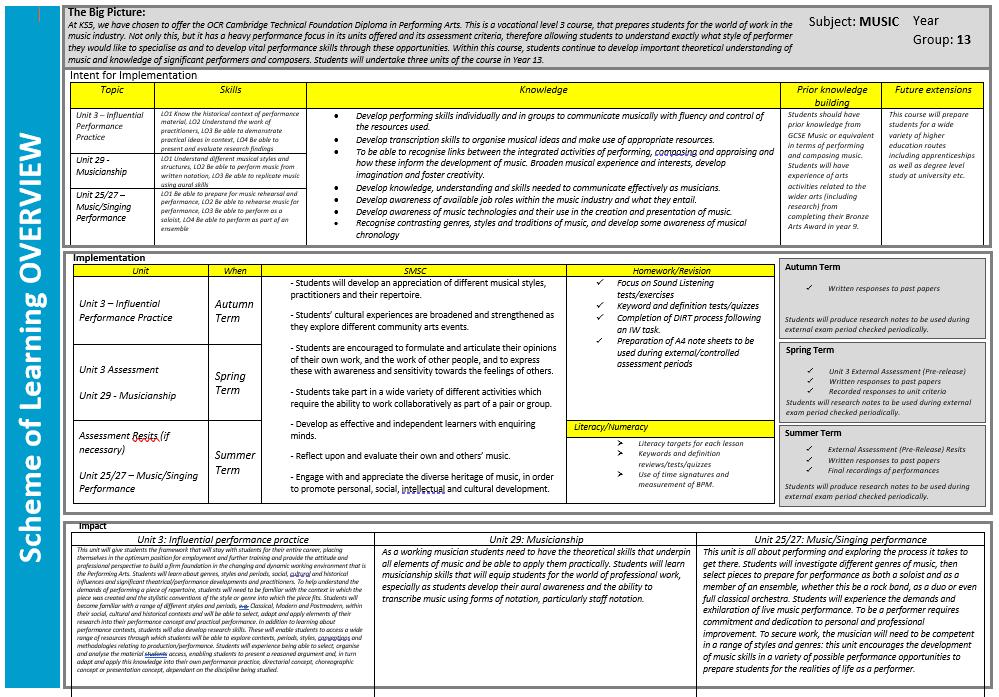
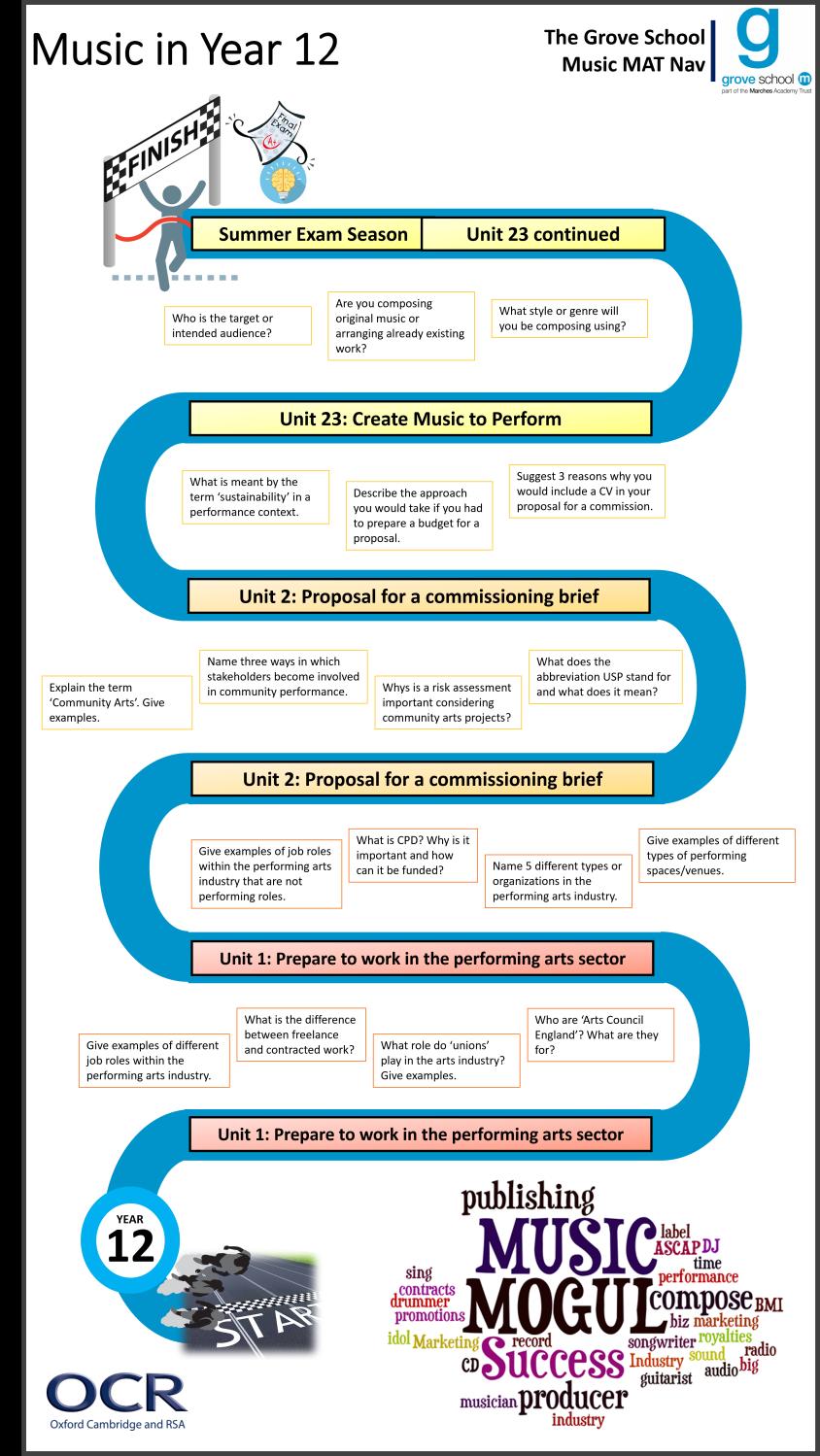
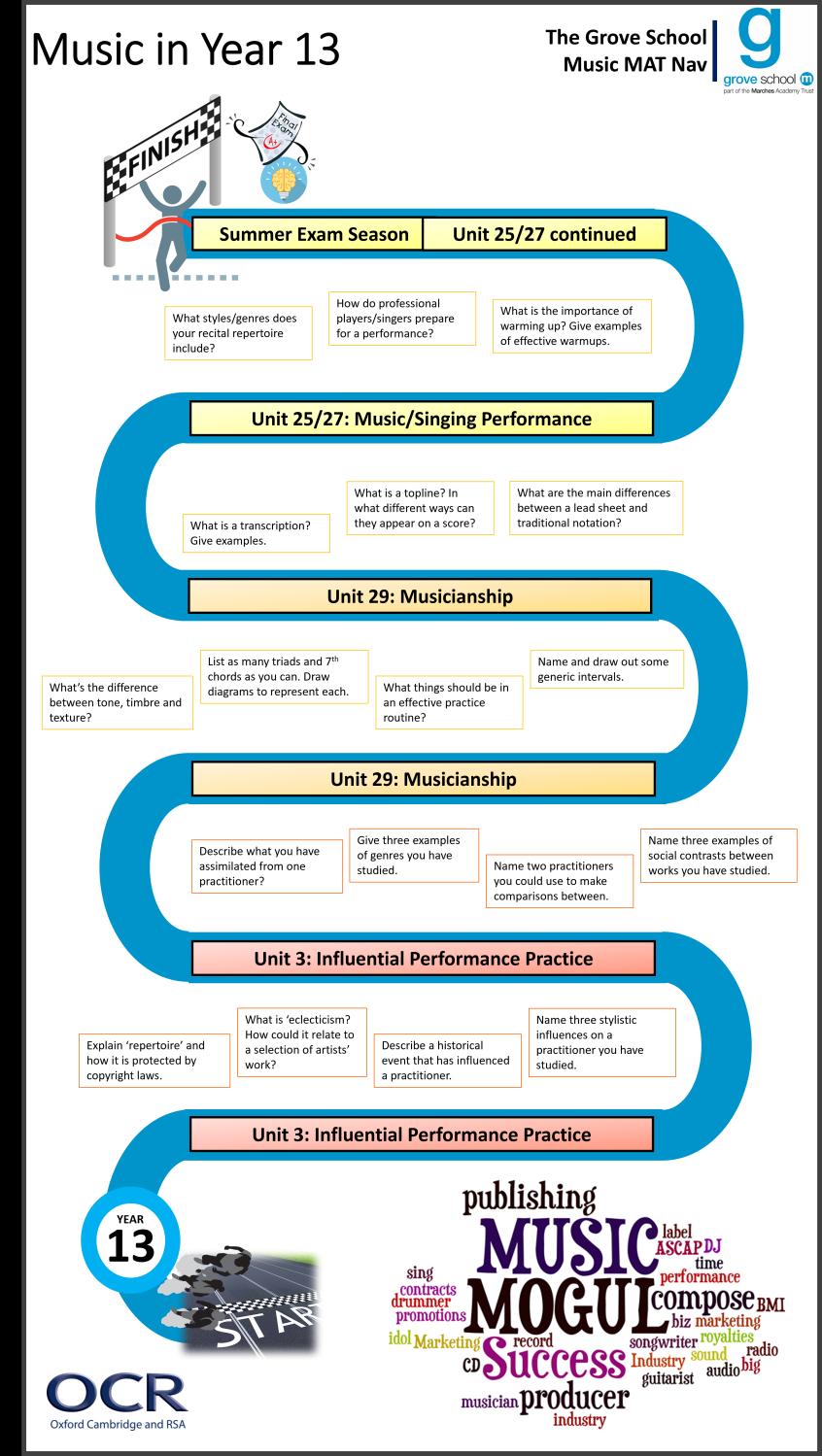
Grove School: Curriculum
Psychology HMM Faculty g
Studying Psychology will provide students with an invaluable insight into human behaviour in a range of typical and atypical contexts. Through the development of psychological terminology and evaluative language students demonstrate knowledge, analysis and application to real-world scenarios in their learning. Through the development of an understanding of research methodology, students gain an insight into the processes psychologists engage within to form and provide evidence for their theories.
Context
Students will have personal reference points for typical behaviours, such as memory and attachment. Living in a rural area they will be able to recognise local factors that may contribute to atypical behaviours and the development of mental disorders, such as depression and phobias.
Grove School: Curriculum
Vision
g
Disciplinary Knowledge
GCSE: Students begin by developing a working knowledge of the research methods used by psychologists. They then apply these to learn about memory and social influence. These, alongside development are designed to be foundationary ni and allo den o p og e cce f ll on o d Pe cep ion Lang age ho gh and comm nica ion The B ain and Ne op cholog and P chological P oblem
A Level: The approaches and experimental research methods develop the foundations of knowledge students require on the nature of Psychology as a discipline and how psychologists engage in the research p oce S den p og e on o d he co e Pape opic of Memo Social Infl ence A achmen and P chopa holog Th o gho he e ni den kno ledge of non -experimental research methods is developed and allows them to have the majority of the knowledge they need to complete Paper and a he end of Yea In Yea den p og e o comple e ni in Biop cholog and he Pape opic I e and deba e Gende Schi oph enia and Fo en ic P cholog
Supra Curriculum
At both Key Stage 4 and Key Stage 5, students have access to a range of extended learning material based on the theories and studies completed within the units covered on the course. These can be accessed through the Psychology area on MicrosoftTeams . There are also age -appropriate films which will allow students to further their knowledge of the psychological concepts covered on their courses.
Grove School: Curriculum
g
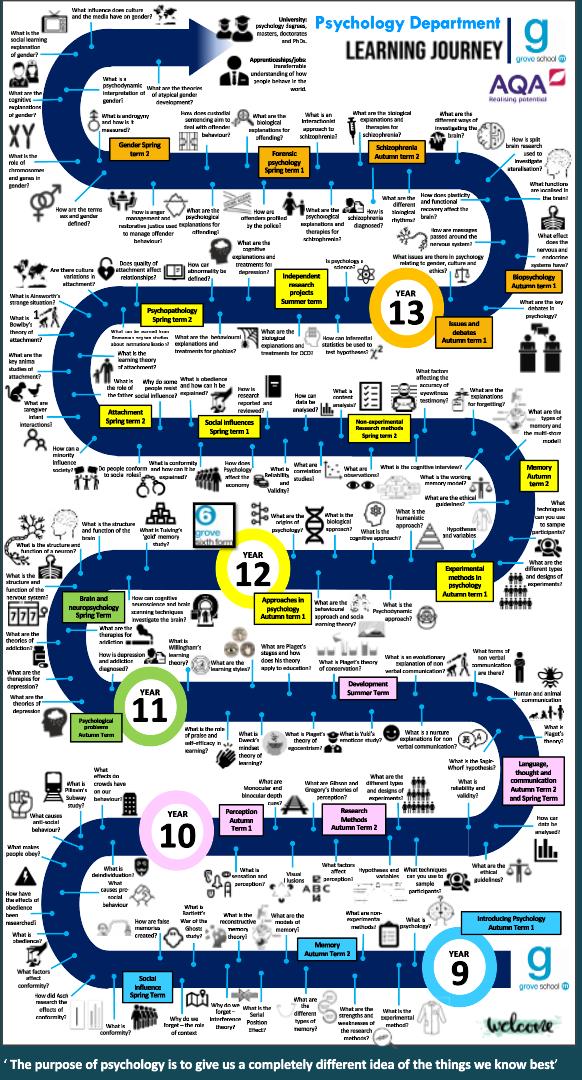
Grove School: Curriculum
Key Stage 4 Psychology g
Year 10
The beginning; students are introduced to an understanding of the role of a psychologist, what their motives are and how they achieve them. Next, to look at applying this understanding to typical cognitive behaviours and the role of internal mental factors, such as memory. Focus then switches to looking at external factors, such as how people can be influenced by others. As the year progresses, students broaden their understanding of the realms of psychology with application to more complex perceptual processes and how these develop through childhood. This is all done under the lens of the scientific model and the use of statistics to create an objective view of the world.
Year 11
Students gain a more substantial view of psychology, incorporating a biological understanding and the role the brain and nervous system play in behaviour. The multi -disciplined approach to Psychology is highlighted to students when exploring atypical behaviour and psychological problems. This unit, more than any other, challenges the students to pull together the analytical skills that they have developed throughout the course to compare and contrast explanations and methods of research to form clear and coherent evaluative commentary.
Grove School: Curriculum Narrative
g
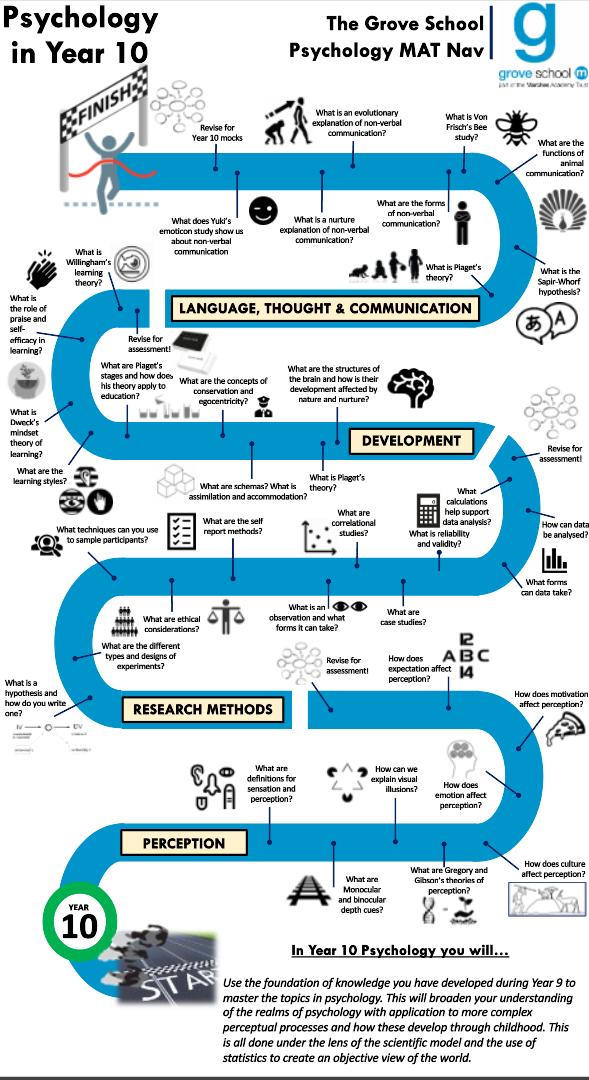
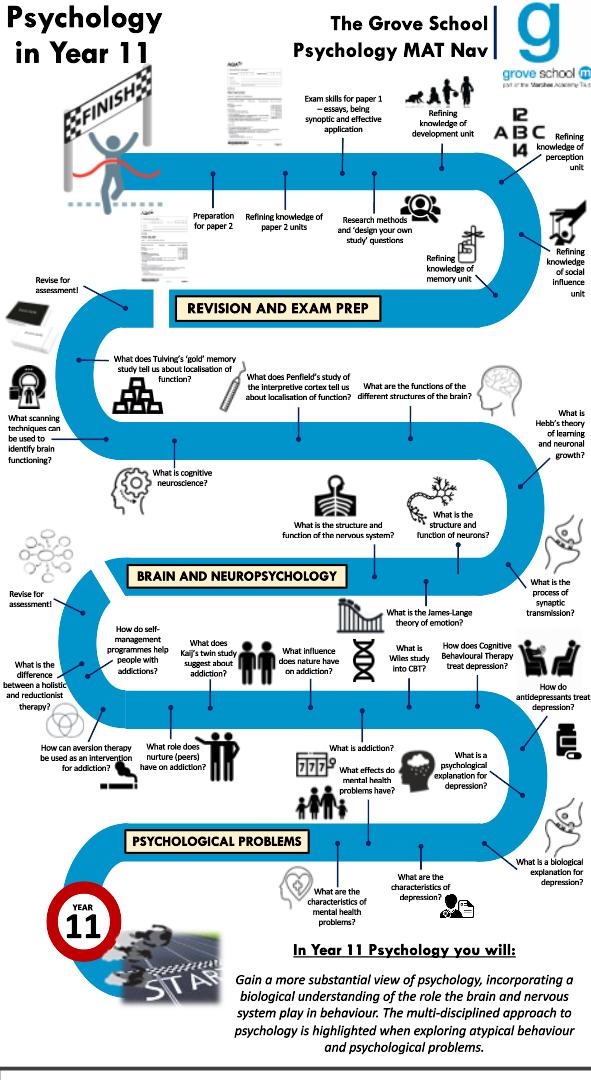
Grove School: Curriculum
Key Stage 5 Psychology g
Year 12
In Year 12, students begin by exploring what Psychology entails and the exciting history of psychological theories and research. By understanding both the different approaches psychologists take and the experimental methods that can be employed in research, students develop a foundation of knowledge that can be built upon throughout the course. Students then zoom in on core units that embody these app oache Cogni i e Unde anding of Memo Social Unde anding of Infl ence o Beha io De elopmen al Unde anding of A achmen and Biological Unde anding of he Ph ical Infl ence on Beha io P chopa holog comple e hi jo ne and f ll embodie he m l i -disciplined nature of p cholog and p ll on den no -developed ability to compare and contrast different ways of explaining and treating the same, atypical, mental disorder. At the end of the year, students complete their own research project, applying their knowledge of quantitative, statistical processes to identify and objectively test a hypothesis.
Year 13
Year 13 builds upon the foundations developed in Year 12, beginning with reviewing the topics they have previously learned under the lens of the issues, debates and discussions that are central in the world of academic psychology. Students complete the course by looking at Psychology in contexts of Gende Schi oph enia and Fo en ic P cholog
Grove School: Curriculum Narrative
g
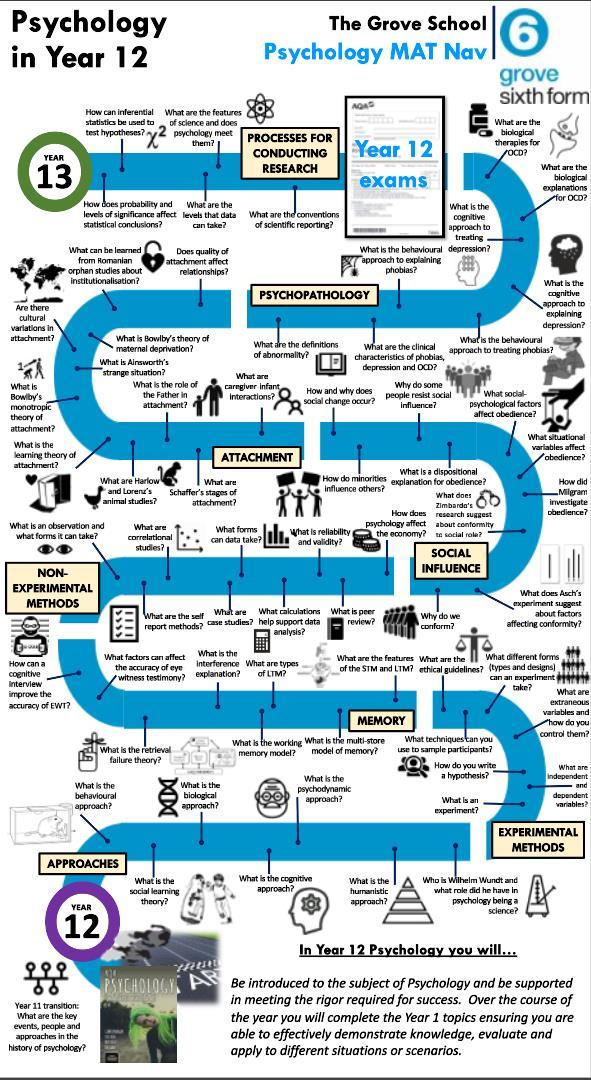
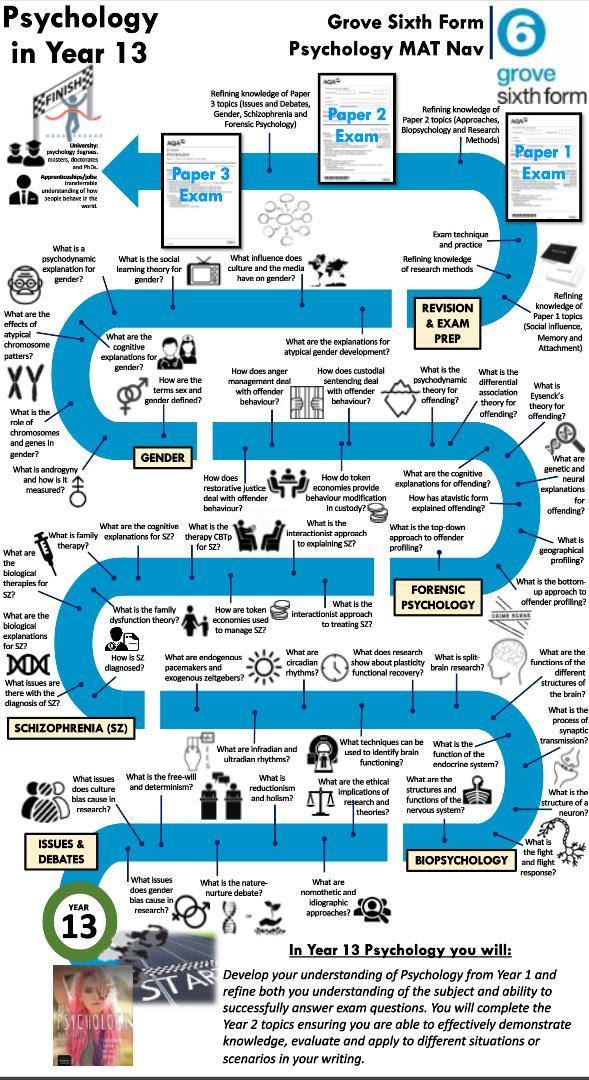
Grove School: Curriculum
Religious Studies HMM Faculty g
Vision
To explore what people believe and what difference this makes to how they live, so that students can gain the knowledge, understanding and skills needed to handle questions raised by religion and beliefs, reflecting on their own ideas and ways of living We aim to develop students ider understanding of the orld be ond the limited context of the surrounding area. We aim to develop their cultural understanding, cultural experience and tolerance of others, enabling them to be ready to face the multi-cultural world that awaits them.
Context
Students living in Market Drayton and the surrounding areas have low exposure to a range of cultural diversity compared to students living in either inner city or urban areas. The aim of Grove School is to give students the exposure to other cultures and diversity to help prepare them to engage fully within modern Britain and the wider world when they leave us.
Grove School: Curriculum
g
Disciplinary Knowledge
The subject coverage for Religious Studies has been linked to the Local Agreed Syllabus for Shropshire. In the first term students are taught an introduction to the main religions. This is as a basic starting point that students can use as reference points throughout Key Stage 3. As students come from various backgrounds at the start of Year 7, this introduction is an opportunity to bring everyone together and appreciate this diversity. From this point, we focus on key aspects of all six of the main religions, either through classwork or homework. The homework is built around retrieval practice extending knowledge gained either from the previous academic year or from Key Stage 2. Through completing this, students have both an overview of all the main religions but also an opportunity to investigate key aspects of the religion in more depth. We therefore ensure there is both depth and breadth within the curriculum at Grove School.. At Key Stage 3, key themes are developed in line with core questions from the Agreed Syllabus . Please follow the link for more information on this. https://www.shropshirelg.net/curriculum-subjects/re/introduction -to-the-local-agreed-syllabus/
At Key Stage 4 we follow the AQA Religious Studies Short Course specification. We start with Christianity (Beliefs) in Year 1 0 and complete Theme A. In Year 11, we move on to Islam (Beliefs) and Theme B. The Key Stage 4 course develops areas initially looked at during Key Stage 3 learning and applies religious thought to moral issues. At Key Stage 4 we observe the Agreed Syllabus and follow AQA due to the content and structure of the exam. Please find the links to the Agreed Syllabus and exam specification below:https://www.shropshirelg.net/curriculum-subjects/re/introduction-to-the-local-agreed-syllabus/ https://www.aqa.org.uk/subjects/religious-studies/gcse/religious-studies-short-course-8061
Supra Curriculum
Students have access to a range of independent activities on Microsoft Teams for them to delve into which link to the topics covered in lessons. These will develop their enquiring minds. Activities will be in three forms: academic reading, media clips with activities and TED Talks.
Grove School: Curriculum
g
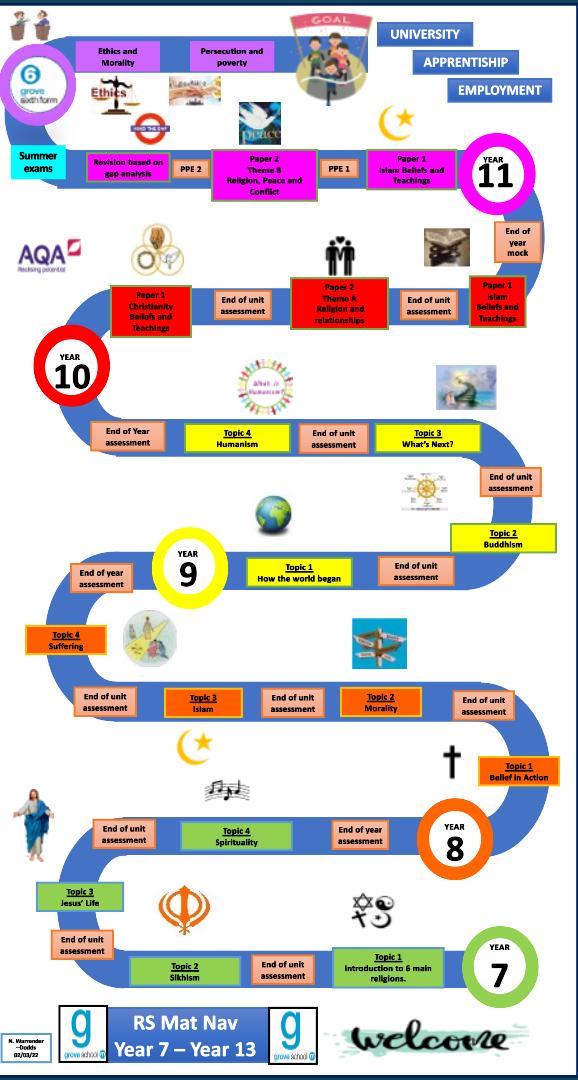
Grove School: Curriculum
Key Stage 3 Religious Studies g
Year 7
We start our journey of curiosity together focusing on gaining a foundation of knowledge on the six main religions which give us the building blocks to stem our curiosity in future units. We first develop our knowledge and understanding of Sikhism and consider how Sikh teachings on equality and service are put into practice and why the core beliefs are practiced today. Our second unit sees us exploring and questioning the life of Jesus and how the teachings of Jesus guide people in their decision -making today. Finally, we look at how religious belief and spirituality are expressed through the arts. The classroom curriculum will be further extended through autonomous learning opportunities linked to the topic areas of: ’The A-Z of Religion Judaism and Inspirational People
Year 8
As we start this year, we examine how Chrisitians put their faith into action and are challenged by the questions raised by r eading religious texts. The second unit draws on how religious beliefs and practices can help form reasons for wider issues on morality. This part of our curiosity journey draws on previous units when looking at core and central beliefs. Our third unit examines the foundations of Islam and how Mu slims put beliefs into action and the challenges that Muslims face. Our final unit draws on the big question of why people suffer. In this unit we examine types of suffering and look specifically at the Holocaust. The classroom curriculum will be further extended through autonomous learning opportunities linked to the topic areas of: Hinduism Sikhism and Inspirational People
Year 9
The third year of our curiosity journey begins by examining how the world began and humans' impact on the environment. This allows for students to question and evaluate a range of theories and beliefs. We then lead into the topic of Buddhism where we draw on previous units such as belief in action, how the world began and suffering. In the Buddhism unit, students delve deeper into the religious views and practices, challenging themselves on different viewpoints. The third unit of our journey has the big question of life after death as the focus. In this unit students question religious and non-religious views on the afterlife and draw on the unit on morality when considering what make s a good life. Finally, we look at Humanism and consider non -religious approaches to the big questions and the religiosit of the orld toda . The classroom curriculum will be further extended through autonomous learning opportunities linked to the topic areas of: Islam Christianit and Inspirational
People
Grove School: Curriculum Narrative
g
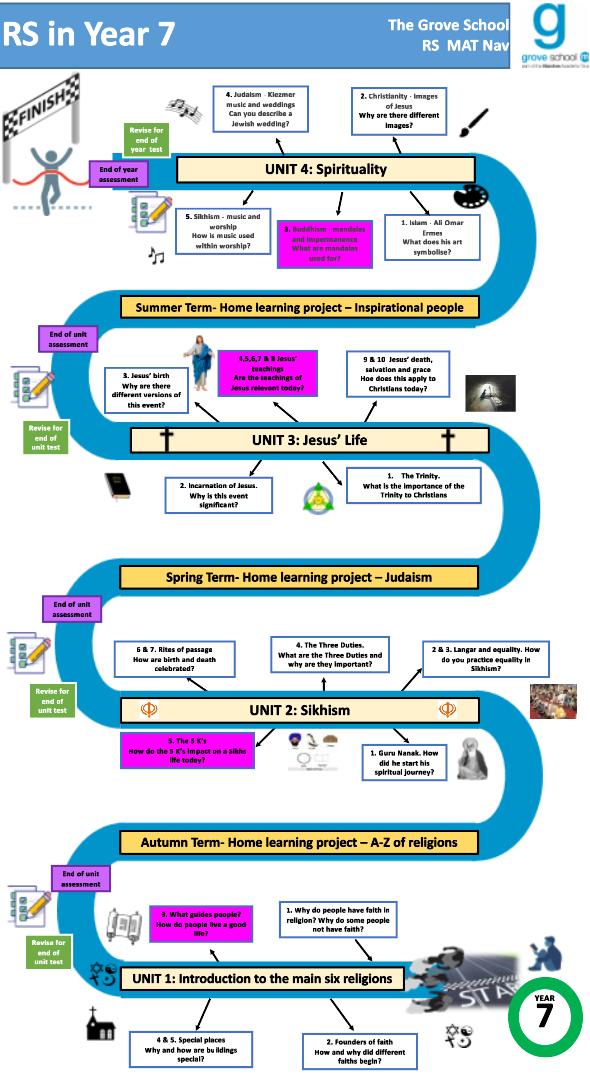

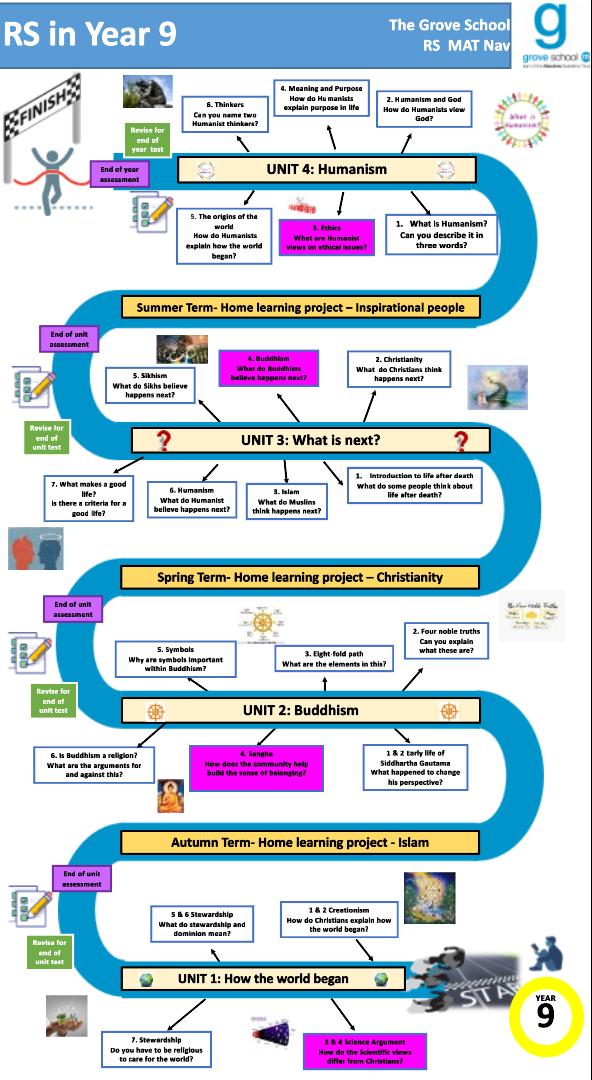
Grove School: Curriculum
Key Stage 4 Religious Studies g
Year 10
In Year 10 we begin our GCSE Short Course journey. We explore the complexity of Christian beliefs and teachings; we draw on our previous learning at Key Stage 3 and develop our analytical skills. As we progress through the year, we apply our knowledge of religious and non-religious beliefs to the theme of relationships and the family. This theme also considers some of the wider issues within society and notes how society has developed and changed. Finally, we begin to look at the core beliefs of Islam. We draw on the learning from Key Stage 3 and develop a greater understanding of the impact of Islamic beliefs. Comparisons between religious and non -religious views are developed and evaluated throughout the year.
Year 11
As we move to the second year of our GCSE Short Course, we recap on last year's learning and continue with our investigation into the core beliefs of Islam. The next stage of our journey is looking at the theme of peace and conflict. In this unit we examine the causes and impact of war and the role of religion both within peace and conflict. We draw on learning from Key Stage 3 by considering how beliefs can influence our decisions in how we act in different situations. We question motives and incentives and compare religious to non-religious views throughout the year.
Grove School: Curriculum Narrative
g
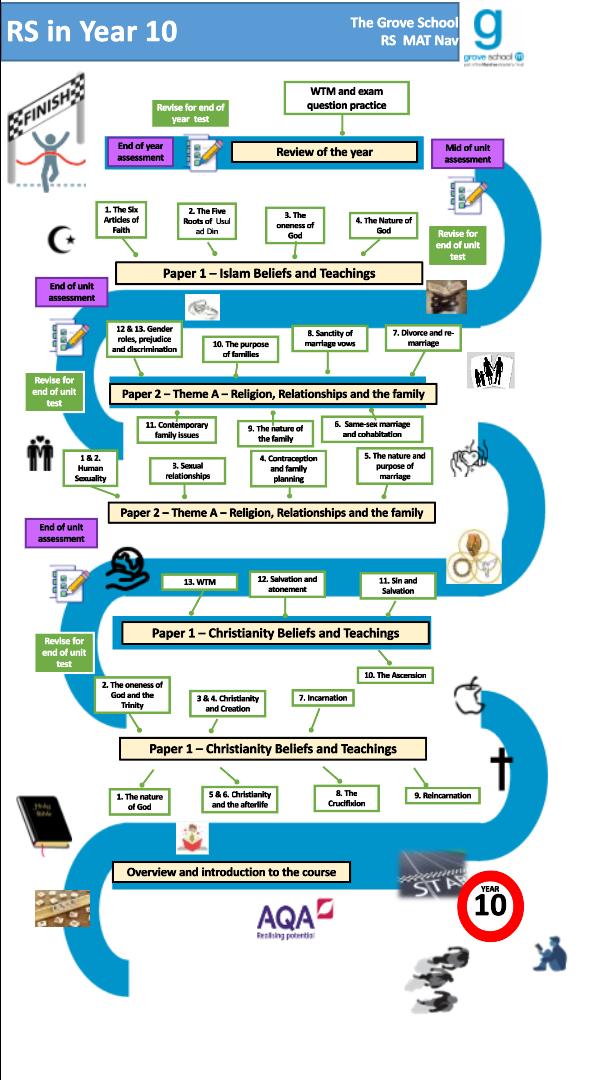
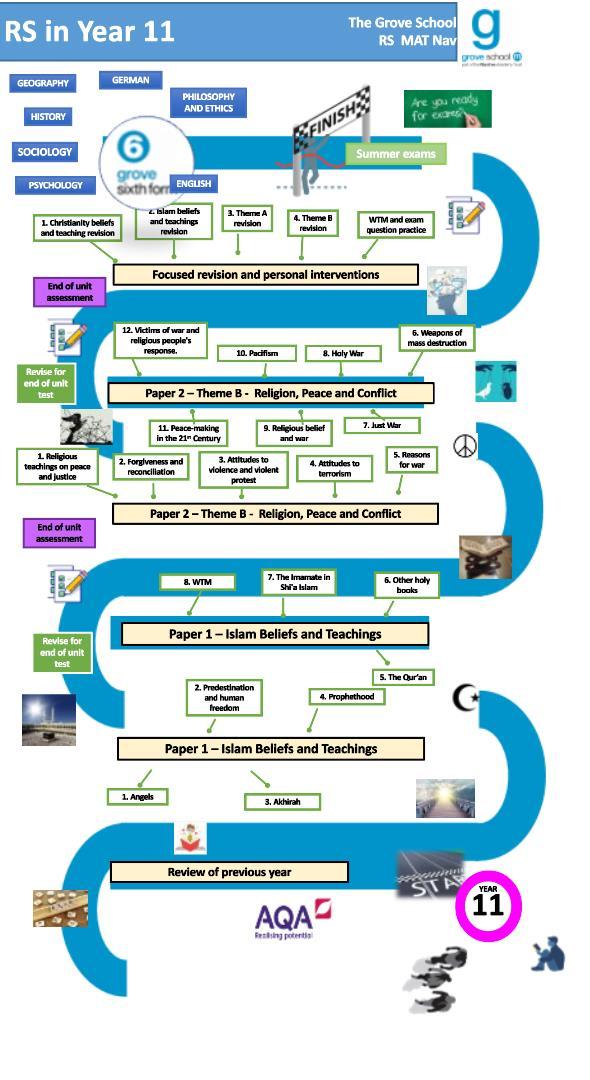
Grove School: Curriculum
Key Stage 5 Religious Studies g
Year 12 and Year 13
In Year 12 we focus on moral and ethical issues. We apply learning from both Key Stage and Ke Stage to current events and s nthesise our o n vie s and others ideas and arguments. We argue and justify personal positions on world views and compare them to religious and non-religious views. We enquire into and develop insightful evaluations of ultimate questions.
In the Grove School Sixth Form, we draw on personal experiences and current world issues to ensure debates are relevant. We develop cultural awareness, tolerance of others and the acceptance of others. Through Discovery Days we develop a wider understanding of the world around us, enabling students to be prepared for the world of work or further education.
Grove School: Curriculum Narrative
g
Grove School: Curriculum
Sociology HMM Faculty g
Vision
Studying Sociology gives students a valuable knowledge and understanding of today’s society through studying families, education, crime and deviance, beliefs and social stratification. It allows students to develop critical and evaluative skills. It is relevant to the society students live in, so learning is about topics that are relevant to everyday life. Studying Sociology also opens the door to a fantastic range of interesting careers.
Context
Students within Market Drayton have limited exposure to more diverse and cosmopolitan environments. Sociology opens students to a wide range of social and global issues that can challenge misconceptions and develop more critical thinking.
Grove School: Curriculum
g
Disciplinary Knowledge
Studying Sociology gives valuable knowledge and understanding of today’s society through exploring families, education, crime and deviance, beliefs and social stratification. It allows students to develop critical and evaluative skills.
Sociology is relevant to the society that students live in, explores topics that are relevant to everyday life; and, it opens the door to a fantastic range of interesting careers. You also learn how to apply various research methods to different sociological contexts including: how to investigate facts to make deductions; how to develop opinions and new ideas on social issues; and, how to analyse and understand the social world.
In Sociology students are exposed to a variety of situations removed from their own experiences therefore developing their wider view of the world and cultures.
Supra Curriculum
At both Key Stage 4 and Key Stage 5, students have access to a range of extended reading materials based on the studies completed within the units covered on the course. These can be accessed through Microsoft Teams. There are also age-appropriate films which will allow students to apply the theories and a critical approach to what they represent. The focus will be on academic reading and TED talks.
Grove School: Curriculum
g
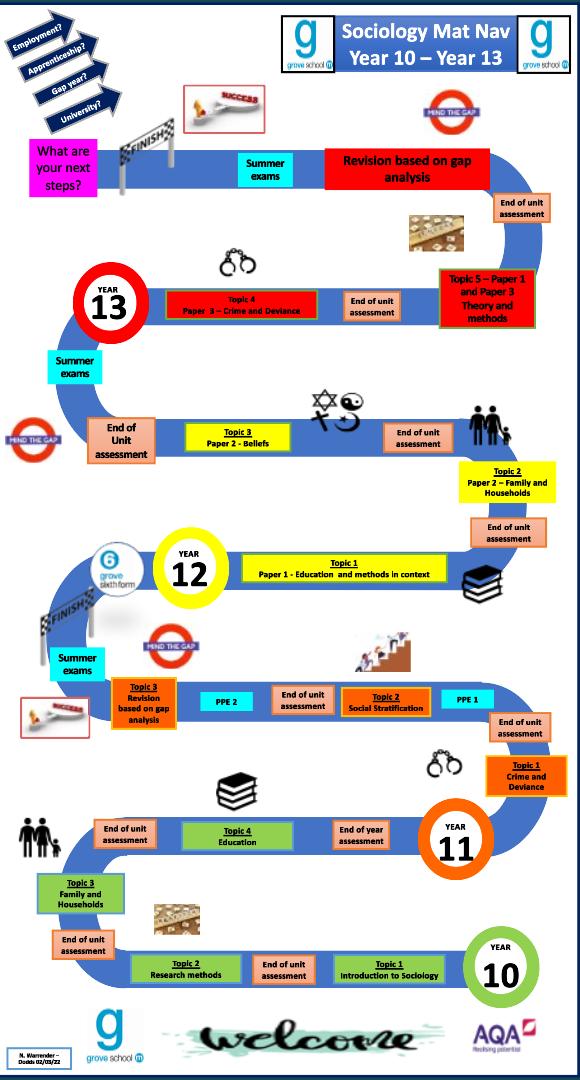
Grove School: Curriculum
Key Stage 4 Sociology g
Year 10
Sociology is a crucial subject to study when desiring to gain a deeper understanding about how society operates both in the past and present day. It gives students the opportunity to participate in topical debates and also promotes individuality and the right of opinion. We begin the journey of understanding society through the study of classical sociologists, such as Durkheim, Weber and Marx who have been instrumental in the efforts to study society from different theoretical perspectives. In Year 10, students will explore the roles that education and families have on the development of contemporary society and what social issues might occur as a result of changes in society.
Year 11
Taking the knowledge of understanding issues within society to the next level, students in Year 11 will explore the reasons why people commit crime and the reasoning as to why it occurs and has existed in every society. Students will consider the following questions: Why does crime exist? How does one become labelled as ‘criminal’ or ‘deviant’?
Students will then move onto social stratification theories that build on a deeper level of understanding of the differing perspectives that people have on society, such as Functionalism and Feminism. Widening their skills in relation to Sociology, students will learn about different research methods and will be able to carry out their own sociological research, to put this skill into practice.
Grove School: Curriculum Narrative
g
Scheme of Learning Unit Overview : Introducing Sociology
Time frame: Year 10 Autumn term 1 Approximate number of Lessons: 10
What is the big picture? This is the first unit for the students completing the Sociology course. In this unit students will become familiar with key concepts, theories, and thinkers. Students can develop this information in the upcoming units.
How does this link to and build on the previous year of learning? Students will build on the theories learnt in the education unit to form a basis for their understanding for this unit . 12 mark answer exam skills will also be applied.
Intent for implementation: What do you want the students to be able to know and do?
Implementation -
Knowledge Skills
Students must know and understand:
Debates within sociology including conflict versus consensus
How sociological knowledge and ideas change over time and how these ideas inform our understanding of the social world
The contextualised work (a sense of time and place) of key classical socio logists Durkheim, Marx and Weber referencing both their view of the world and their contribution to the development of the discipline
Different sociological perspectives on social structures, social processes and social issues, including those informed by : feminism, functionalism, interactionism and Marxism as specified in the topics listed below and key arguments (identified through reading and respondi ng to extracts from key sociological texts)
The interrelationship between the core areas of sociology
How to use sociological research methods as outlined in the topics and how they apply in the specified contexts ie families, e ducation, crime and deviance, social stratification.
Key sociological terms and concepts concerned with social structures, social processes and social issues and the explanation of social phenomena including: society, socialisation, norms, values, roles, labelling, discrimination, power and authority.
What are the opportunities for deep-learning
Functionalism
Marxism
Feminism
Labelling
What might be the pitfalls? What home-learning tasks are planned?
Video clips – films from the list given at the start of the year
What work will be deepmarked
AO1: Demonstrate knowledge and understanding of: sociological theories concepts and evidence sociological research methods
AO2: Apply sociological theories, concepts, evidence and research methods to a range of issues
AO3: Analyse and evaluate sociological theories, concepts, evidence and research methods in order to: present arguments make judgements draw conclusions
What tracking data will be recorded?
Confusion over main theories
Confusion over key terms
Learning of key studies
Exam questions are set fortnightly
Keyword and definition tests/quizzes
Completion of DIRT process following an IW task.
Flip Learning tasks in readiness for next lesson to ensure best usage of class time.
Revision activities to consolidate learning after each unit
Low stakes knowledge quizzes
Engagement: What will be the wow moments What are the hooks for student engagement
All long exam questions (12 markers)
End of unit assessment
Marks for individual questions recorded on tracker to inform students of their personal learning checklist (PLC) Students will record exam question breakdowns on their Learning Journey Tracker for end of unit assessments and exams
Learning about: Use of examples such as relevant studies to help students grasp the concepts use of game star power to explain the concept of Marxism
Impact: How will we know if outstanding learning has occurred?
Students will be able to recall and apply key studies to their learning as well as relevant case studies. Students will be ab le to use PERCY/PEEEL structure within their longer exam answers ( 12 mark answers).
Next steps: How will this link to subsequent learning? Consider skills and knowledge
Content from this module is the foundation of the other units that are assessed in the course for GCSE.
Scheme of Learning Unit Overview : Research Methods Time frame: Year 10 Autumn term 2 Approximate number of Lessons: 10
What is the big picture? This is the second unit for the students completing the Sociology course and focuses on how sociologists gather their own research and how different methods are applied to different studies. This is an important aspect to consider before starting the topic contents.
How does this link to and build on the previous year of learning? This links to previous learning by looking at the main theories and concepts of conflict/consensus theory.
Intent for implementation: What do you want the students to be able to know and do?
Implementation -
Knowledge Skills
Students must know and understand: identify, describe and explain various methods and methodological issues identify and explain the advantages and disadvantages, strengths and weaknesses of a particular method for a specific area of research demonstrate an understanding of the process of research design for a specific area of research, including practical difficulties and ethical issues
demonstrate an understanding of the relevance and usefulness of various primary and secondary sources for a specific area of research demonstrate the ability to interpret dat a presented in a variety of forms
What are the opportunities for deep-learning
Students getting to complete their own research project and evaluating the impact
What might be the pitfalls? What home-learning tasks are planned?
Video clips – films from the list given at the start of the year
AO1: Demonstrate knowledge and understanding of: sociological theories concepts and evidence sociological research methods
AO2: Apply sociological theories, concepts, evidence and research methods to a range of issues
AO3: Analyse and evaluate sociological theories, concepts, evidence and research methods in order to: present arguments make judgements draw conclusions
Confusion over main PET
Confusion over key terms
Learning of key studies
Exam questions are set fortnightly
Keyword and definition tests/quizzes
Completion of DIRT process following an IW task.
Flip Learning tasks in readiness for next lesson to ensure best usage of class time.
Revision activities to consolidate learning after each unit
Low stakes knowledge quizzes
Engagement: What will be the wow moments What are the hooks for student engagement
Learning about: Use of examples within the studies and when students complete their own studies.
Impact: How will we know if outstanding learning has occurred?
What work will be deepmarked
All long exam questions (12 markers)
End of unit assessment
What tracking data will be recorded?
Marks for individual questions recorded on tracker to inform students of their personal learning checklist (PLC) Students will record exam question breakdowns on their Learning Journey Tracker for end of unit assessments and exams
Students will be able to recall and apply key studies to their learning as well as relevant case studies. Students will produce and evaluate own study. Next steps: How will this link to subsequent learning? Consider skills and knowledge
Content from this module is the foundation of the other units that are assessed in the course for GCSE. Content in this module is applied to paper 1 and paper 2. Research methods are embedded throughout the topics.
Scheme of Learning Unit Overview : Family
Time frame: Year 10 SPRING TERM Approximate number of Lessons: 24
What is the big picture? This is the third unit for the students completing the Sociology course. They will start by looking at the main functions of the family and different family forms. They will look at how roles have changed in the family and how society has changed also. Throughout the unit t hey will consider the main sociological theories of functionalism, Marxism and feminism. They will also use studies to help explain and validate the arguments and consider the reliability of the research.
How does this link to and build on the previous y ear of learning? Students will build on the theories learnt in the first unit to form a basis for their understanding for this unit. 12 mark answer exam skills will also be applied.
Intent for implementation: What do you want the students to be able to know and do?
Knowledge Skills
Functions of the family
Differing views of the functions of families.
Parsons functionalist perspective on primary socialisation and the stabilisation of adult personalities.
Changing relationships within the family
Changing relationships within families.
How relationships within families have changed over time.
The theory of the symmetrical family and the principle of stratified diffusion developed from the functionalist perspective of Willmott and Young.
Implementation -
What are the opportunities for deep-learning
Class
Ethnicity
Childhood
Roles
Family forms
How family forms differ in the UK and within a global context.
The work of the Rapoports on family diversity.
Criticisms of the family
Different criticisms of families (isolation and unrealistic idealisation, loss of traditional functions, lack of contact with wider kinship networks, the status and role of women within families, marital breakdown, dysfunctional families).
The work of Zaretsky on developments in families from a Marxist perspective and Delph and Leonard s feminist critique of families
What might be the pitfalls? What home-learning tasks are planned?
Sensitive material
Confusion over main theories
Confusion over key terms
Learning of key studies
Video clips – films from the list given at the start of the year
Exam questions are set fortnightly
PIXL sheets
Keyword and definition tests/quizzes
Completion of DIRT process following an IW task.
Flip Learning tasks in readiness for next lesson to ensure best usage of class time.
Revision activities to consolidate learning after each unit
Low stakes knowledge quizzes
Engagement: What will be the wow moments What are the hooks for student engagement
Conjugal forms
Different views of conjugal role relationships.
The feminist perspective of Oakley on the idea of the conventional family.
Divorce
Changes in the pattern of divorce in Britain since 1945 and the consequences of divorce for family members and structures.
AO1: Demonstrate knowledge and understanding of: sociological theories concepts and evidence sociological research methods
AO2: Apply sociological theories, concepts, evidence and research methods to a range of issues
AO3: Analyse and evaluate sociological theories, concepts, evidence and research methods in order to: present arguments make judgements draw conclusions
What work will be deepmarked
All long exam questions (12 markers)
End of unit assessment
What tracking data will be recorded?
Marks for individual questions recorded on tracker to inform students of their personal learning checklist (PLC) Students will record exam question breakdowns on their Learning Journey Tracker for end of unit assessments and exams
Learning about: Use of examples such as relevant TV show s to show different family structures and dynamics across the country and world , use of demonstrations and news articles to grasp the learners. Up to date case studies. Also use of documentaries/news reports on family types and demographic trends
Impact: How will we know if outstanding learning has occurred?
Students will be able to recall and apply key studies to their learning as well as relevant case studies. Students will be able to use PERCY /PEEEL structure within their longer exam answers ( 12 mark answers). Students will be able to use their past learning to understand and explain family in toda s society
Next steps: How will this link to subsequent learning? Consider skills and knowledge
What is the big picture? This is the final unit in year 10 for the students completing the Sociology course They will start by looking at the main areas affecting education, class, gender and ethnicity. Within this they will examine theories on education. Students will then move on to look at how education is studie d whilst also considering the impact of extern al and internal factors.
How does this link to and build on the previous year of learning? Content from unit 1 and 2 on research methods and overview of sociological theory. Students can draw on the family unit when considering external factors on education.
Intent for implementation: What do you want the students to be able to know and do?
Implementation -
Knowledge Skills
Roles and functions of education
Different views of the role and functions of education.
The functionalist perspective of Durkheim on education as the transmission of norms and values and Parsons on achieved status and the operation of schools on meritocratic principles.
The relationship between education and capitalism
Different views of the correspondence principle on the relationship between education and capitalism as developed from a Marxist perspective by Bowles and Gintis.
Processes within school Educational achievement
Processes within schools affecting educational achievement.
The work of Ball on teacher expectations and Willis on the creation of counter school cultures.
What are the opportunities for deep-learning
Factors affecting educational achievement.
The work of Halsey on class-based inequalities and Ball on parental choice and competition between schools.
What might be the pitfalls? What home-learning tasks are planned?
Video clips – films from the list given at the start of the year
Exam questions are set fortnightly
PIXL sheets
Keyword and definition tests/quizzes
Completion of DIRT process following an IW task.
Flip Learning tasks in readiness for next lesson to ensure best usage of class time.
Revision activities to consolidate learning after each unit
Low stakes knowledge quizzes
Engagement: What will be the wow moments What are the hooks for student engagement
AO1: Demonstrate knowledge and understanding of: sociological theories concepts and evidence sociological research methods
AO2: Apply sociological theories, concepts, evidence and research methods to a range of issues
AO3: Analyse and evaluate sociological theories, concepts, evidence and research methods in order to: present arguments make judgements draw conclusions
What work will be deep-marked What tracking data will be recorded?
End of unit assessment on Education
Essay questions (at least two on each of the longer question type)
Marks for independent work tasks recorded on IW tracker.
Marks for individual questions recorded on tracker to inform students of their personal learning checklist (PLC)
Students will record exam question breakdowns on their Learning Journey
Learning about: Use of examples such as relevant TV show (education Manchester etc), use of demonstrations and news articles to grasp the learners. Up to date case studies. Also use of documentaries /news reports on different school systems
Impact: How will we know if outstanding learning has occurred?
Students will be able to recall and apply key studies to their learning as well as relevant case studies. Students will be ab le to use PERCY/PEEEL structure within their longer exam answers ( 12-mark answers). Students will be able to use their past learning to understand and explain education today
Next steps: How will this link to subsequent learning? Consider skills and knowledge
Content from education can be applied to crime and deviance and social stratification units.
Scheme of Learning Unit Overview : Education Time frame: Year 10 Summer term Approximate number of Lessons: 22
Globalisation Class Gender Ethnicity Research methods
material
over main theories
over globalisation and different
Sensitive
Confusion
Confusion
school systems
Time frame: Year 11 Autumn term Approximate number of Lessons: 22
What is the big picture? In this unit students will cover the main areas affecting Crime. They will look at age, gender, class, ethnicity, the role of the media, education, and the family. They will consider the impact of globalisation on crime and look at the impact of prevention .
How does this link to and build on the previous year of learning? The knowledge and application to crime will be new, however, students can use the information gained in year 10 on the basic theories to help develop their understanding of crime. Exam skills will be transferable from previous units studied . Students can apply factors raised from previous units.
Intent for implementation: What do you want the students to be able to know and do?
Implementation -
The social construction of crime and deviance
Knowledge Skills
Social control
The social construction of concepts of crime and deviance and explanations of crime and deviance.
The work of Merton on the causes of crime from a functionalist perspective and Becker from an interactionist perspective.
Formal and informal methods of social control.
The work of Heidensohn on female conformity in male dominated patriarchal societies.
Criminal and deviant behaviour Data on crime
Factors affecting criminal and deviant behaviour and ways in which criminal and deviant behaviour have generated public debate.
The work of Albert Cohen on delinquent subcultures and Carlen on women, crime, and poverty.
What are the opportunities for deep-learning
Moral panics
Globalisation
Media Data
The usefulness of the main sources of data on crime, the collection of official data on crime, patterns, and trends in crime figures and the dark figure
What might be the pitfalls? What home-learning tasks are planned?
Sensitive material
Confusion over left and right realist perspectives
Confusion over Marxist and Neo
Marxist
Video clips – films from the list given at the start of the year
Exam questions are set fortnightly
PIXL sheets
Keyword and definition tests/quizzes
Completion of DIRT process following an IW task.
Flip Learning tasks in readiness for next lesson to ensure best usage of class time.
Revision activities to consolidate learning after each unit
Low stakes knowledge quizzes
Engagement: What will be the wow moments What are the hooks for student engagement
What work will be deep-marked
End of unit assessment on Crime and Deviance
Essay questions (at least two on each of the longer question type)
AO1: Demonstrate knowledge and understanding of:
sociological theories concepts and evidence sociological research methods
AO2: Apply sociological theories, concepts, evidence and research methods to a range of issues
AO3: Analyse and evaluate sociological theories, concepts, evidence and resea rch methods in order to: present arguments make judgements draw conclusions
What tracking data will be recorded?
Marks for independent work tasks recorded on IW tracker. Marks for individual questions recorded on tracker to inform students of their personal learning checklist (PLC) Students will record exam question breakdowns on their Learning Journey
Learning about: Use of examples such as relevant TV shows for impact of the media, use of demonstrations and news articles to grasp the learners. Up to date case studies link ed to moral panics. Also use of current crime statistics to analyse patterns and trends.
Impact: How will we know if outstanding learning has occurred?
Students will be able to recall and apply key studies to their learning as well as relevant case studies. Students will be ab le to use PERCY/PEEEL structure within their longer exam answers (12 - mark answers). Students will be able to use their past learning to understand and explain crime.
Next steps: How will this link to subsequent learning? Consider skills and knowledge
Crime content will be used for the theory and research methods section in paper 1 and paper 2. Skills practiced can be applied through both exam papers.
Scheme of Learning Unit Overview : Crime and Deviance
Scheme of Learning Unit Overview : Social Stratification
Time frame: Year 11 Spring term Approximate number of Lessons: 22
What is the big picture? In this unit students will cover the main areas affecting social stratification. They will look at the impact of relationships and power. This final unit brings all aspects together previously learnt when looking at society, control and power.
How does this link to and build on the previous year of learning? The knowledge gained throughout year 10 can be built on in this final unit. Exam skills will be transferable from previous units studied .
Intent for implementation: What do you want the students to be able to know and do?
Implementation -
Functionalist theory of stratification
Different views of the functionalist theory of social stratification.
The work of Davis and Moore on social stratification from a functionalist perspective.
Knowledge Skills
Socio-economic class Life chances
Different views of socio -economic class.
The work of Marx and Weber on socio-economic class.
Different views on factors affecting life chances.
The work of Devine revisiting the idea of the affluent worker.
Poverty of a social issue Power and authority Power relationships
Different interpretations of poverty as a social issue.
The work of Townsend on relative deprivation and Murray on the underclass.
What are the opportunities for deep-learning
Power relationships
Poverty Control
What might be the pitfalls?
Sensitive material Recall from previous learning
Different forms of power and authority.
The work of Weber on power and authority.
What home-learning tasks are planned?
Video clips – films from the list given at the start of the year
Exam questions are set fortnightly
PIXL sheets
Keyword and definition tests/quizzes
Completion of DIRT process following an IW task.
Flip Learning tasks in readiness for next lesson to ensure best usage of class time.
Revision activities to consolidate learning after each unit
Low stakes knowledge quizzes
Engagement: What will be the wow moments What are the hooks for student engagement
Describe and explain different views on factors affecting power relationships.
The work of Walby on patriarchy.
What work will be deep-marked
End of unit assessment on social stratification.
Essay questions (at least two on each of the longer question type)
AO1: Demonstrate knowledge and understanding of:
sociological theories concepts and evidence
sociological research methods
AO2: Apply sociological theories, concepts, evidence and research methods to a range of issues
AO3: Analyse and evaluate sociological theories, concepts, evidence and research methods in order to: present arguments make judgements draw conclusions
What tracking data will be recorded?
Marks for independent work tasks recorded on IW tracker.
Marks for individual questions recorded on tracker to inform students of their personal learning checklist (PLC) Students will record exam question breakdowns on their Learning Journey
Learning about: Use of examples such as relevant TV shows when looking at poverty. Use of articles to help motivate students with real life examples.
Impact: How will we know if outstanding learning has occurred?
Students will be able to recall and apply key studies to their learning as well as relevant case studies. Students will b e able to use PERCY/PEEEL structure within their longer exam answers (12 - mark answers). Students will be able to use their past learning to understand and explain social stratification.
Next steps: How will this link to subsequent learning? Consider skills and knowledge
Content will be used for crossover in paper 1 and paper 2. Skills practiced can be applied through both exam papers. Information gained can be used moving forward for A -level studies
Grove School: Curriculum
Key Stage 5 Sociology g
Year 12
In Year 12, students expand their sociological knowledge and critical understanding of society through studying the role that education plays in contemporary society. What factors have impacted our right to education? Why is it now compulsory and a basic necessity of Westernised life? The development of education has also had its setbacks; factors such as gender, ethnicity and social class -based inequalities have led us to question why some individuals are at a disadvantage when it comes to schooling. The following journey, and an integral element of Sociology, is to understand the strengths and weaknesses of various methodological approaches and research methods. Students will get the opportunity to carry out a piece of sociological research themselves from scratch. Being able to apply aspects of sociological research to societal matters, such as the family, health, welfare and cultural identity is crucial in order to gain a rich understanding of how society has changed over the years and what impacts these changes have had upon a range of issues.
Year 13
Carrying the vital knowledge and skills developed from Year 12 in relation to the study of the role of Education and Research Methods, Year 13 put themselves in the shoes of enforcers and perpetrators of the law in the ‘Crime and Deviance’ topic. Students will explore the social attributes of crime and deviance by ethnicity, gender, and social class, including recent trends in crime rates. This will help them to develop their social awareness of issues in today’s society and promote intellectual curiosity in terms of why people choose to commit crime. Students will come to combine their prior knowledge of Sociology and other Humanities subjects, such as History and Geography, when studying globalisation and understanding the theories as to why crimes (such as genocide and environmental crime) occur on a global scale.
Grove School: Curriculum Narrative
g
Scheme of Learning Unit Overview : Education
Time frame: Year 12 Autumn term Approximate number of Lessons: 35
What is the big picture? This is the first unit for the students completing the Sociology course. They will start by looking at the main areas affecting education, class, gender and ethnicity. Within this they will examine theories on education. Students will then move on to look at how education is studied whilst also considering the impact of external and internal factors. How does this link to and build on the previous year of learning? First unit, however students can build on own experience of school and education
Intent for implementation: What do you want the students to be able to know and do?
Intent: What do you want the students to be able to know and do?
Knowledge Skills
A01
(Knowledge
and understanding) A02
Good Largely accurate knowledge
Limited range of points
Limited depth, eg basic account given of a point
Some understanding of the question
Limited understanding of the presented material (vague)
Better Useful points made but incomplete needing more expansion
Aware of parts of the question
Reasonable understanding of the points made
Excellent Used concepts well and explained them in detail
Range of points explored
Good understanding of the question
Good understanding of points made
Good understanding of Item.
Implementation -
What are the opportunities for deep-learning
Globalisation
Class Gender
Ethnicity
Research methods
(Apply )
Material presented in a list-like fashion
Limited focus on the question
Tendenc to scatter-g n from topic area
Limited engagement with Item.
A03 (Evaluation and analysis)
Evaluation limited
Tendency to juxtapose a limited range of points
Analysis thin and at a tangent in places
AO1: Demonstrate knowledge and understanding of: sociological theories concepts and evidence sociological research methods
Most of the material is largely relevant to the question
Greater focus would benefit the answer. A reasonable engagement with Item.
Material is applied accurately to the question
Points made will be explicitly relevant to the question
The answer is well structured Item is engaged with and applied effectively in answer.
Limited evaluation shown Points are analysed effectively, ie) a debate emerging between views
Evaluation will be explicit and relevant. Evaluation may be explicit as well as more general Evaluation emerges from contrasting theories/points
Analysis will be clear
Conclusions are made clear
AO2: Apply sociological theories, concepts, evidence and research methods to a range of issues
AO3: Analyse and evaluate sociological theories, concepts, evidence and research methods in order to: present arguments make judgements draw conclusions
What might be the pitfalls?
Sensitive material
Confusion over main theories
Confusion over globalisation and different school systems
What home-learning tasks are planned?
Video clips – films from the list given at the start of the year
Exam questions are set fortnightly
PIXL sheets
Keyword and definition tests/quizzes
Completion of DIRT process following an IW task.
Flip Learning tasks in readiness for next lesson to ensure best usage of class time.
Revision activities to consolidate learning after each unit
Low stakes knowledge quizzes
Engagement: What will be the wow moments What are the hooks for st udent engagement?
What work will be deep-marked
End of unit assessment on Education
Essay questions (at least two on each of the longer question type) Mock of paper 1
What tracking data will be recorded?
Marks for independent work tasks recorded on IW tracker.
Marks for individual questions recorded on tracker to inform students of their personal learning checklist (PLC)
Students will record exam question breakdowns on their Learning Journey
Learning about: Use of examples such as relevant TV show (education Manchester etc), use of demonstrations and news articles to grasp the learners. Up to date case studies. Also use of documentaries /news reports on different school systems
Impact: How will we know if outstanding learning has occurred?
Students will be able to recall and apply key studies to their learning as well as relevant case studies. Students will be ab le to use PERCY structure within their longer exa m answers (10.20 and 30 mark answers). Students will be able to use their past learning to understand and explain education in toda s society
Next steps: How will this link to subsequent learning? Consider skills and knowledge
Scheme of Learning Unit Overview : Family Time frame: Year 12 Spring term Approximate number of Lessons: 25
What is the big picture? This is the second unit for the students completing the Sociology course. They will start by looking at the main areas affecting the family, class, demographic trends and ethnicity. Within this they will examine theories on the family. Students will then move on to look at h ow the family has changed over the years and the reasons for this, looking at key changes and the impact of policies and changing of societies needs and views.
How does this link to and build on the previous year of learning? Students will build on the theories learnt in the education unit to form a basis for their understanding for this unit. 10 mark and 20 mark exam skills will also be applied.
Intent for implementation: What do you want the students to be able to know and do?
IImplementation -
Knowledge Skills
A01 (Knowledge and understanding) A02 (Apply ) A03 (Evaluation and analysis)
Good Largely accurate knowledge
Limited range of points
Limited depth, eg basic account given of a point
Some understanding of the question
Limited understanding of the presented material (vague)
Better Useful points made but incomplete needing more expansion
Aware of parts of the question
Reasonable understanding of the points made
Excellent Used concepts well and explained them in detail
Range of points explored
Good understanding of the question
Good understanding of points made
Good understanding of Item.
What are the opportunities for deep-learning
Class
Ethnicity
Childhood
Domestic violence
Material presented in a list-like fashion
Limited focus on the question
Tendenc to scatter-g n from topic area
Limited engagement with Item.
Evaluation limited
Tendency to juxtapose a limited range of points
Analysis thin and at a tangent in places
AO1: Demonstrate knowledge and understanding of: sociological theories concepts and evidence sociological research methods
Most of the material is largely relevant to the question
Greater focus would benefit the answer. A reasonable engagement with Item.
Material is applied accurately to the question
Points made will be explicitly relevant to the question
The answer is well structured Item is engaged with and applied effectively in answer.
What might be the pitfalls? What home-learning tasks are planned?
Sensitive material
Confusion over main theories
Confusion over key terms
Learning of key studies
Limited evaluation shown Points are analysed effectively, ie) a debate emerging between views
Evaluation will be explicit and relevant. Evaluation may be explicit as well as more general
Evaluation emerges from contrasting theories/points
Analysis will be clear
Conclusions are made clear
Video clips – films from the list given at the start of the year
Exam questions are set fortnightly
PIXL sheets
Keyword and definition tests/quizzes
Completion of DIRT process following an IW task.
Flip Learning tasks in readiness for next lesson to ensure best usage of class time.
Revision activities to consolidate learning after each unit
Low stakes knowledge quizzes
Engagement: What will be the wow moments What are the hooks for student engagement
AO2: Apply sociological theories, concepts, evidence and r esearch methods to a range of issues
AO3: Analyse and evaluate sociological theories, concepts, evidence and research methods in order to: present arguments make judgements draw conclusions
What work will be deep-marked What tracking data will be recorded?
End of unit assessment on Family
Essay questions (at least two on each of the longer question type)
Marks for independent work tasks recorded on IW tracker.
Marks for individual questions recorded on tracker to inform students of their personal learning checklist (PLC)
Students will record exam question breakdowns on their Learning Journey
Learning about: Use of examples such as relevant TV shows to show different family structures and dynamics across the country and world , use of demonstrations and news articles to grasp the learners. Up to date case studies. Also use of documentaries /news reports on family types and demographic trends
Impact: How will we know if outstanding learning has occurred?
Students will be able to recall and apply key studies to their learning as well as relevant case studies. S tudents will be able to use PERCY structure within their longer exam answers (10 and 20 mark answers). Students will be able to use their past learning to understand and explain family in toda s society
Next steps: How will this link to subsequent learning? Consider skills and knowledge
What is the big picture? In this unit students will cover the main areas affecting beliefs and religious behaviour in society . They will look at how religion is defined, how different perspectives explain the role of religion, secularisation, new age movements (NAMs), the impact o f globalisation, fundamentalism and the relationship between science and religion. How does this link to and build on the previous year of learning? Students will have studied the core perspectives as part of their initial units in year 12. The family and household s unit has exam questions that share the same structure and therefore students will be able to transfer knowledge regarding how to f ulfil each of the AO s in the and mark questions
Intent for implementation: What do you want the students to be able to know and do?
Implementation -
Knowledge Skills
A01 (Knowledge and understanding) A02 (Apply ) A03 (Evaluation and analysis)
Good Largely accurate knowledge
Limited range of points
Limited depth, eg basic account given of a point
Some understanding of the question
Limited understanding of the presented material (vague)
Better Useful points made but incomplete needing more expansion
Aware of parts of the question
Reasonable understanding of the points made
Excellent Used concepts well and explained them in detail
Range of points explored
Good understanding of the question
Good understanding of points made
Good understanding of Item.
What are the opportunities for deep-learning
Perspectives on religion
Secularisation theories
Fundamentalism
Science and religion
Material presented in a list-like fashion
Limited focus on the question
Tendenc to scatter-g n from topic area
Limited engagement with Item.
Evaluation limited
Tendency to juxtapose a limited range of points
Analysis thin and at a tangent in places
AO1: Demonstrate knowledge and understanding of:
sociological theories concepts and evidence sociological research methods
Most of the material is largely relevant to the question
Greater focus would benefit the answer. A reasonable engagement with Item.
Material is applied accurately to the question
Points made will be explicitly relevant to the question
The answer is well structured Item is engaged with and applied effectively in answer.
What might be the pitfalls? What home-learning tasks are planned?
Sensitive material managing variations between student s experiences of religion.
Management of multiple researchers and studies.
Cultural sensitivity issues.
Limited evaluation shown Points are analysed effectively, ie) a debate emerging between views
Evaluation will be explicit and relevant. Evaluation may be explicit as well as more general Evaluation emerges from contrasting theories/points
Analysis will be clear
Conclusions are made clear
What work will be deep-marked
Exam questions are set fortnightly Keyword and definition tests/quizzes Completion of DIRT process following an IW task. Flip Learning tasks in readiness for next lesson to ensure best usage of class time.
Revision activities to consolidate learning after each unit Low stakes knowledge quizzes
Engagement: What will be the wow moments What are the hooks for student engagement
AO2: Apply sociological theories, concepts, evidence and research methods to a range of issues
AO3: Analyse and evaluate sociological theories, concepts, evidence and research methods in order to: present arguments make judgements draw conclusions
End of unit assessment on Beliefs in Society
Essay questions (at least two on each of the longer question type)
Mock of paper 2
What tracking data will be recorded?
Marks for independent work tasks recorded on IW tracker.
Marks for individual questions recorded on tracker to inform students of their personal learning checklist (PLC) Students will record exam question breakdowns on their Learning Journey
Discussions stemming from the role of religion in the modern day, e.g. the feminist view of women in religion. Fundamentalis m and it s relevance both historicall and in modern da events. Understanding of how religion in different cultures impacts upon behaviour.
Impact: How will we know if outstanding learning has occurred?
Students will be able to recall and apply key studies to their learning as well as relevant case studies. Students will be ab le to use PERCY structure within their longer exam answers (10 and 20 mark answers). Students will be able to use their past learning to understand and explain crime.
Next steps: How will this link to subsequent learning? Consider skills and knowledge
Beliefs content from paper 2 will be used for the theory and research methods section in paper 1 and paper 3. Skills practiced in paper 2 can be applied to paper 1.
Time frame: Year 12 Spring/Summer term Approximate number of Lessons: 35
Scheme of Learning Unit Overview : Beliefs in Society
What is the big picture? In this unit students will cover the main areas affecting Crime. They will look at age, gender, class, ethnicity, the role of the media, education and the family. They will consider the impact of globalisation on crime and look at the impact of prevention.
How does this link to and build on the previous year of learning? The knowledge and applicati on to crime will be new, however, students can use the information gained in year 12 on the basic theories to help develop their understanding of crime. Paper 1 (taught in year 12) is the same as paper 3 in terms of layout so exam skills are transferable. Intent for implementation: What do you want the students to be able to know and do?
Implementation -
Knowledge Skills
A01 (Knowledge and understanding) A02 (Apply ) A03 (Evaluation and analysis)
Good Largely accurate knowledge
Limited range of points
Limited depth, eg basic account given of a point
Some understanding of the question
Limited understanding of the presented material (vague)
Better Useful points made but incomplete needing more expansion
Aware of parts of the question
Reasonable understanding of the points made
Excellent Used concepts well and explained them in detail
Range of points explored
Good understanding of the question
Good understanding of points made
Good understanding of Item.
What are the opportunities for deep-learning
Moral panics
Globalisation
Media
Victims
What might be the pitfalls?
Sensitive material
Confusion over left and right realist perspectives
Confusion over Marxist and Neo
Marxist
Material presented in a list-like fashion
Limited focus on the question
Tendenc to scatter-g n from topic area
Limited engagement with Item.
Most of the material is largely relevant to the question
Greater focus would benefit the answer. A reasonable engagement with Item.
Material is applied accurately to the question
Points made will be explicitly relevant to the question
The answer is well structured Item is engaged with and applied effectively in answer.
What home-learning tasks are planned?
Evaluation limited
Tendency to juxtapose a limited range of points
Analysis thin and at a tangent in places
Limited evaluation shown Points are analysed effectively, ie) a debate emerging between views
Evaluation will be explicit and relevant. Evaluation may be explicit as well as more general Evaluation emerges from contrasting theories/points
Analysis will be clear
Conclusions are made clear
What work will be deep-marked
AO1: Demonstrate knowledge and understanding of: sociological theories concepts and evidence sociological research methods
AO2: Apply sociological theories, concepts, evidence and research methods to a range of issues
AO3: Analyse and evaluate sociological theories, concepts, evidence and resear ch methods in order to: present arguments make judgements draw conclusions
Video clips – films from the list given at the start of the year
Exam questions are set fortnightly
PIXL sheets
Keyword and definition tests/quizzes
Completion of DIRT process following an IW task.
Flip Learning tasks in readiness for next lesson to ensure best usage of class time.
Revision activities to consolidate learning after each unit
Low stakes knowledge quiz zes
Engagement: What will be the wow moments What are the hooks for student engagement
End of unit assessment on Crime and Deviance
Essay questions (at least two on each of the longer question type)
Mock of paper 3
What tracking data will be recorded?
Marks for independent work tasks recorded on IW tracker. Marks for individual questions recorded on tracker to inform studen ts of their personal learning checklist (PLC) Students will record exam question breakdowns on their Learning Journey
Learning about: Use of examples such as relevant TV shows for impact of the media, use of demonstrations and news articles to grasp the learners. Up to date case studies link ed to moral panics. Also use of current crime statistics to analyse patterns and trends.
Impact: How will we know if outstanding learning has occurred?
Students will be able to recall and apply key studies to their learning as well as relevant case studies. Students will be ab le to use PERCY structure within their longer exam answers (10.20 and 30 ma rk answers). Students will be able to use their past learning to understand and explain crime.
Next steps: How will this link to subsequent learning? Consider skills and knowledge
Crime content from paper 3 will be used for the theory and research method s section in paper 1 and paper 3. Skills practiced in paper 3 can be applied to paper 1.
Year 13 Autumn
Approximate
Scheme of Learning Unit Overview : Crime and Deviance Time frame:
term
number of Lessons: 35
Scheme of Learning Unit Overview : Theory and Methods
Time frame: Year 13 Spring Term Approximate number of Lessons: 35
What is the big picture? In this unit students will cover the main theories within Sociology. They will look at age, gender, class, ethnicity, the role of the media, education and the family in terms of concepts that the theories apply themselves to and use to explain the running of society. They will consider which a pproach is the best whilst also analysing how sociologists study society and the different methods applied.
How does this link to and build on the previous year of learning? The knowledge and application of previous units in year 12 and 13 can be used when looking at the theories and examples of studies can be applied. Paper 1 (taught in year 12) is the same as paper 3 in terms of layout so exam skills are transferable. Research methods in context (studied in year 12 within education) can be applied here also. Intent for implementation: What do you want the students to be able to know and do?
Implementation -
Knowledge Skills
A01 (Knowledge and understanding) A02 (Apply ) A03 (Evaluation and analysis)
Good Largely accurate knowledge
Limited range of points
Limited depth, eg basic account given of a point
Some understanding of the question
Limited understanding of the presented material (vague)
Better Useful points made but incomplete needing more expansion
Aware of parts of the question
Reasonable understanding of the points made
Excellent Used concepts well and explained them in detail
Range of points explored
Good understanding of the question
Good understanding of points made
Good understanding of Item.
What are the opportunities for deep-learning
Globalisation
Slut walks and feminism
Postmodernism
Sociology as a science
Material presented in a list-like fashion
Limited focus on the question
Tendenc to scatter-g n from topic area
Limited engagement with Item.
Evaluation limited
Tendency to juxtapose a limited range of points
Analysis thin and at a tangent in places
AO1: Demonstrate knowledge and understanding of:
sociological theories concepts and evidence
sociological research methods
Most of the material is largely relevant to the question
Greater focus would benefit the answer. A reasonable engagement with Item.
Material is applied accurately to the question
Points made will be explicitly relevant to the question
The answer is well structured Item is engaged with and applied effectively in answer.
Limited evaluation shown Points are analysed effectively, ie) a debate emerging between views
Evaluation will be explicit and relevant. Evaluation may be explicit as well as more general
Evaluation emerges from contrasting theories/points
Analysis will be clear
Conclusions are made clear
What might be the pitfalls?
Sensitive material
Confusion over interactionist theories (phenomenology, ethnomethodology etc)
Confusion over Marxist and Neo Marxist
What home-learning tasks are planned?
Video clips – films from the list given at the start of the year
Exam questions are set fortnightly
PIXL sheets
Keyword and definition tests/quizzes
Completion of DIRT process following an IW task.
Flip Learning tasks in readiness for next lesson to ensure best usage of class time.
Revision activities to consolidate learning after each unit
Low stakes knowledge quizzes
Engagement: What will be the wow moments What are the hooks for student engagement
What work will be deep-marked
AO2: Apply sociological theories, concepts, evidence and research methods to a range of issues
AO3: Analyse and evaluate sociological theories, concepts, evidence and research methods in order to: present arguments make judgements draw conclusions
End of unit assessment on Theory and Methods
Essay questions (at least two on each of the longer question type)
Mock of paper 3
What tracking data will be recorded?
Marks for independent work tasks recorded on IW tracker.
Marks for individual questions recorded on tracker to inform students of their personal learning checklist (PLC)
Students will record exam question breakdowns on their Learning Journey
Learning about: Use of examples such as relevant TV shows for impact of the media, use of demonstrations and news articles to grasp the learn ers. Up to date case studies. Also use of documentaries e.g. slut walks
Impact: How will we know if outstanding learning has occurred?
Students will be able to recall and apply key studies to their learning as well as relevant case studies. Students will be ab le to use PERCY structure within their longer exam answers (10.20 and 30 mark answers). Students will be able to use their past learning to understand and explain theories and methods
Next steps: How will this link to subsequent learning? Consider skills and knowledge
Grove School: Curriculum
Learning Support Learning Support/SEND Faculty g
Vision
Our curriculum and support aims to allow students to feel empowered and engaged with their learning. To challenge their perception of their future and support them through the challenges they may encounter.
Context
We are a nurturing and caring faculty that enhances your child’s confidence and meet their specific needs as best we can. We offer a range of interventions to meet these needs in order to help students thrive with in the school environment. Grove School and Sixth Form College promotes the principle of inclusive education and high quality teaching and learning. For the majority of our pupils, most of the time QFT (Quality First Teaching) will be sufficient to ensure they achieve their full potential. We believe that all practitioners are teachers of students with SEND .
Grove School: Curriculum
g
Read Write Inc. ‘Fresh Start’ Phonics Scheme
What is it? Who? Assessment
A literacy-based scheme to help students to become confident and fluent readers. Students will read a range of texts, both fiction and nonfiction, to develop reading and writing skills: skills such as inference, language analysis, paragraph use and spelling. Students are displaced from specific foundation lessons, totalling to five lessons per fortnight.
Hodder – 85 and below SAT score – usually below 80 Any previous difficulties, such as dyslexic tendencies.
Once students have been identified to take part, a reading and writing task is completed for each module. The tasks are completed at the end of each module and then, once marked, re-attempted in order to gain a higher mark. Formative feedback should enable this.
Grove School: Curriculum
g
Grove School: Curriculum
Key Stage 3 Intervention Learning Support Faculty g
Title The Thing from the Black Planet
Bright’s Fishing Trip
A Player to be Proud Of Cook and Enjoy
Grove School: Curriculum
Y7 Module 1 2 3 4 5 6
A
Big
Hay
Bill
Type Fiction Fiction Fiction Fiction Non-Fiction Fiction AUTUMN TERM Y7 7 8 9 10 11 12 Title The
Baboons on the
Bart the Chimp Lorna A Bad Hair Day A Good Win for the Red Shirts Type Fiction Fiction Fiction Fiction Fiction Non-Fiction SPRING TERM Y7 13 14 15 16 17 Title
Late The Weaving Contest Celia Smith’s Quick Goldfish Pie Type
Non-Fiction Fiction Fiction Non-Fiction
TERM g
Wolf Cub
Malc
Into Gold Keeping a Cat
Yellow Light
Loose
Non-Fiction
SUMMER
Grove School: Curriculum
Y8 Module 18 19 20 21 22 23 Title Beep! Spellbound The Outlaws Romeo and Juliet Sunburst Teen Magazine How does it Feel to be an Astronaut? Type Fiction Fiction Fiction Fiction Non-Fiction Non-Fiction AUTUMN TERM Y8 24 25 26 27 28 29 Title Raiders of the Lost Shark Jason s Q es New Boy Kevin the Killer Hamster Il Bello Emergency Type Non-Fiction Fiction Non-Fiction Fiction Non-Fiction Non-Fiction SPRING TERM Y8 30 31 32 33 Title Creature Macbeth The Invisible City Penalty for Pirate Execution Type Non-Fiction Fiction Non-Fiction Non-Fiction SUMMER TERM g
Grove School: Curriculum
Key Stage 4 Intervention Learning Support Faculty g
AAA – Achievement, Aspiration and Access
What is it? Who? Assessment
A bespoke programme to support students that take the subject as an option in Block A. Sessions focus on English and maths skills, supporting content in timetabled lessons. Students are displaced from specific option lessons, totalling to five lessons per fortnight.
Students who take this option from Option Block A.
Grove School: Curriculum Intervention
These sessions focus on the development of skills in both English and maths. Much of the assessment, albeit not formal, will be based on exam tasks and questions.
g
Y10
English
Unit Macbeth A Christmas Carol Poetry
Unseen poetry
Possible assessment Extract based task Extract based task Comparison skills
Narrative Writing Narrative Writing
Identifying key techniques in poetry
Narrative structure Descriptive writing
Maths
Unit Angles, Number & Decimals
Possible assessment Exam based questions
Algebra, Graphs and collecting & representing data
Exam based questions
Grove School: Curriculum
Perimeter and Area. Percentages.
Exam based questions
Real life graphs, equations and ratio
Exam based questions
Transformations, 2D and 3D shapes
Exam based questions
Basic probability
Exam based questions
Autumn 1 Autumn 2 Spring 1 Spring 2 Summer 1 Summer 2
Y10
Autumn 1 Autumn 2 Spring 1 Spring 2 Summer 1 Summer 2
g
Possible assessment Practising 10 mark questions
Practising 10 mark questions
Essay based questions
Extract based questions
Final exam
Unit Circumference & area
Possible assessment
Number recap and quadratic equations
3D shapes, fractions.
Exam based questions
Exam based questions
Exam based questions
Exam based questions
Exam based questions
Grove School: Curriculum
English Autumn 1 Autumn 2 Spring 1 Spring 2 Summer 1 Summer 2
Y11
Poetry
Unit English Language C2 English Language C1 Macbeth
An Inspector Calls
preparation
Maths Autumn 1 Autumn 2 Spring 1 Spring 2 Summer 1 Summer 2
Y11
Reciprocals
and algebra. Vectors
g
Grove School: Curriculum
Maths Maths Faculty g
Vision
Our aim is to be a Centre of Excellence for Mathematics, where we are a provider of choice for learners at any stage of their mathematical journey. Our curriculum focuses on fostering a love of the learning of maths, giving students the opportunity to see success across a subject that encompasses a wide variety of skills and topics.
Context
Our students have a wide variety of attainment levels and aspirations that have developed from their Key Stage 2 experiences. Through the use of team planning and curriculum development, alongside mixed attainment, cross-curricular work and enrichment opportunities, we look to foster a confidence in our learners and ultimately raise their aspirations and achievements.
Grove School: Curriculum
g
Disciplinary Knowledge
Students follow the National Curriculum through the White Rose Maths scheme of work at Key Stage 3, allowing for a smooth transition from our primary feeder schools. At Key Stage 4, students follow the AQA specification for both Foundation and Higher tier learning. At Key Stage 5, A Level Maths students use a bespoke scheme of learning, following the AQA Specification for A Level Maths and MEI OCR (B) Specification for Further Maths.
Supra Curriculum
Enrichment opportunities are provided within lessons and also through national competitions such as UKMT as well as clubs such as Future Mathematicians, STEM links, and further study through Level 2 Further Maths qualifications. Students also have access to online learning platforms. In KS3 and 4 students use Hegarty Maths (hegartymaths.com) and at KS5 they additionally have Integral Maths (integralmaths.org.uk) tsupport and broaden their knowledge and understanding of mathematics.
Grove School: Curriculum
g
Grove School: Curriculum
Key Stage 3 Maths g
Year 7
This year will build on the foundations of maths knowledge and skills gained in Key Stage 2 as a continuation of the White Rose Maths scheme of learning that is followed by our feeder primary schools. All students will gain a secure grounding in the key concepts of number, algebra, geometry, ratio, and statistics, which underpin their future learning in Key Stage 4 and are crucial in building the more complex GCSE knowledge and concepts around.
Year 8
This year will build on the foundations of maths knowledge and skills gained in Key Stage 2 and Year 7 as a continuation of the White Rose Maths scheme of learning that is followed by our feeder primary schools. All students will gain a secure grounding in the key concepts of number, algebra, geometry, ratio, and statistics, which underpin their future learning in Key Stage 4 and are crucial in building the more complex GCSE knowledge and concepts around.
Year 9
This year will build on the foundations of maths knowledge and skills gained in Key Stage 2, Year 7 and Year 8 as a continuation of the White Rose Maths scheme of learning that is followed by our feeder primary schools. All students will gain a secure grounding in the key concepts of number, algebra, geometry, ratio, and statistics, which underpin their future learning in Key Stage 4 and are crucial in building the more complex GCSE knowledge and concepts around.
Grove School: Curriculum Narrative
g



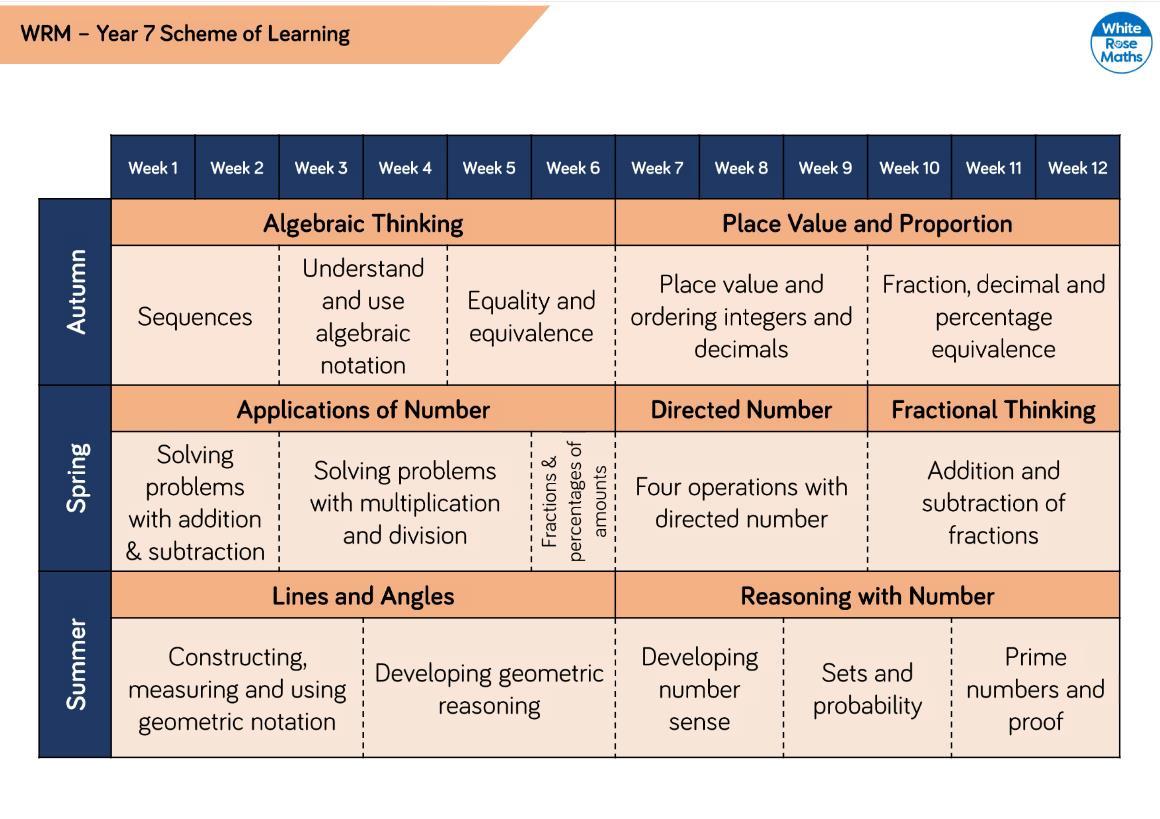
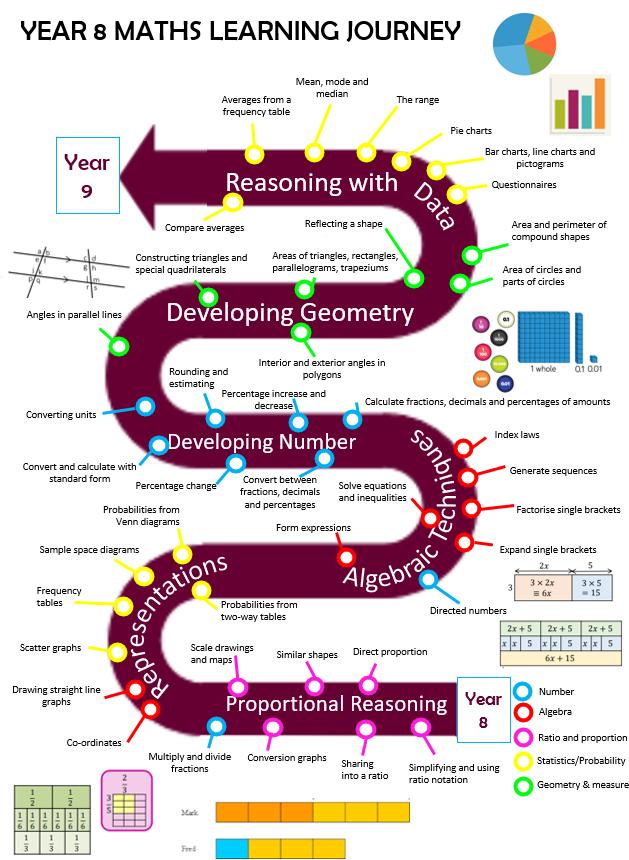

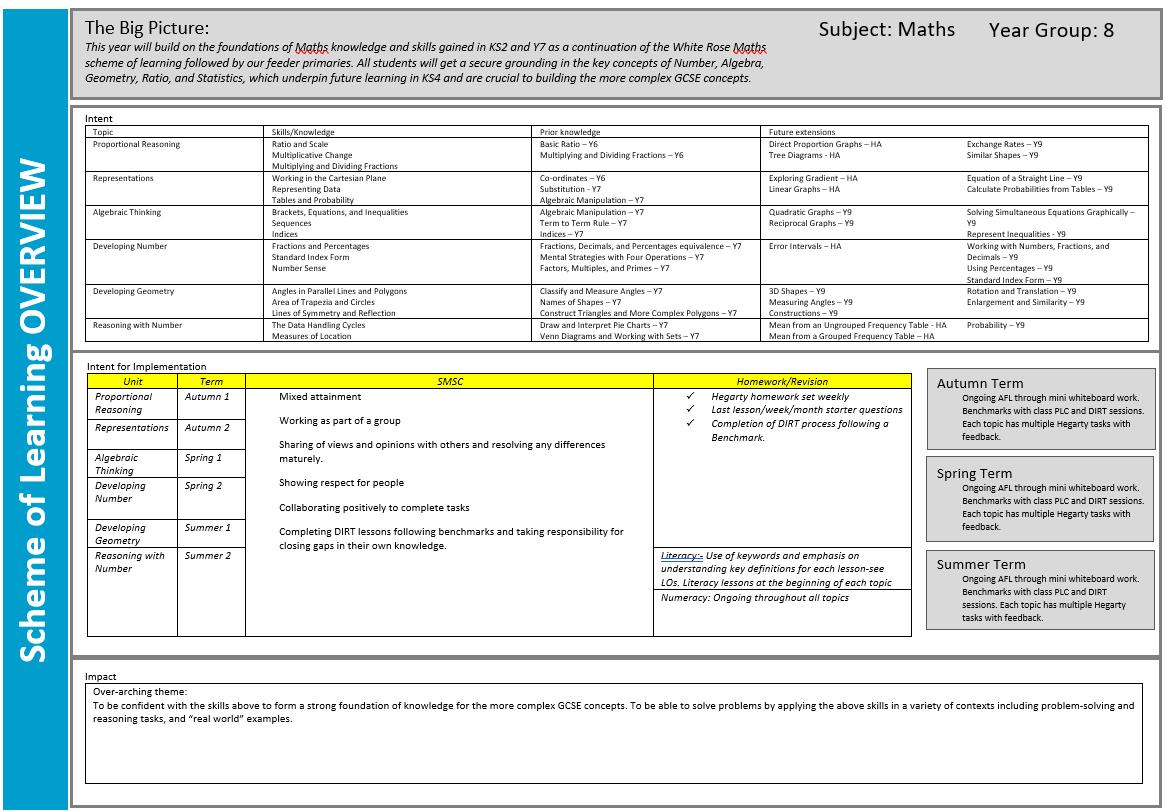
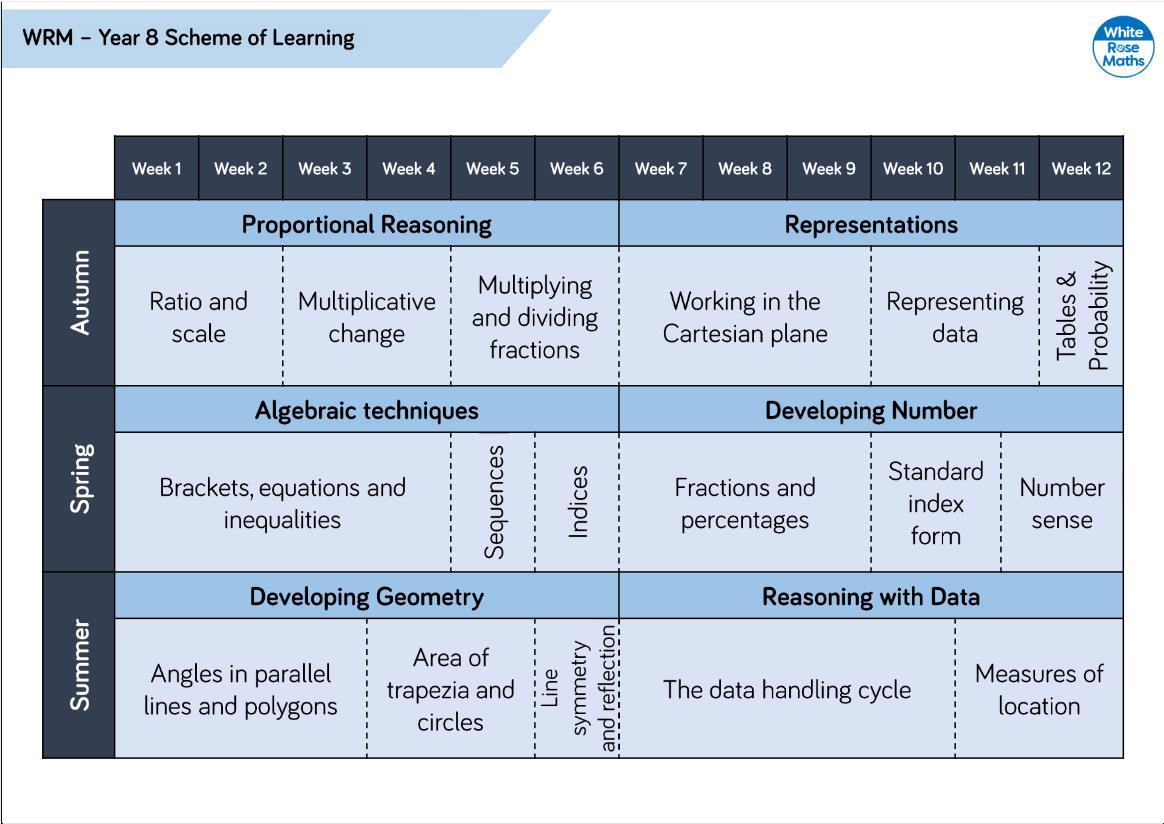
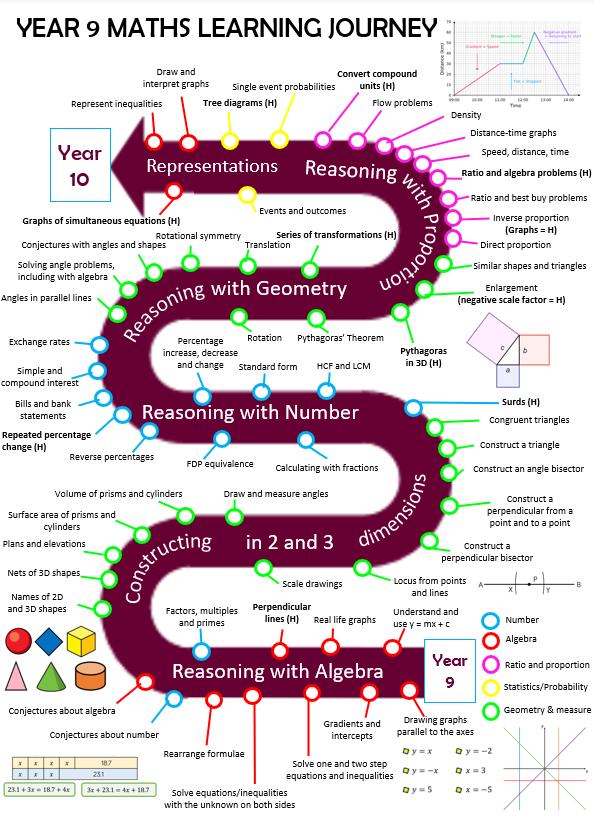

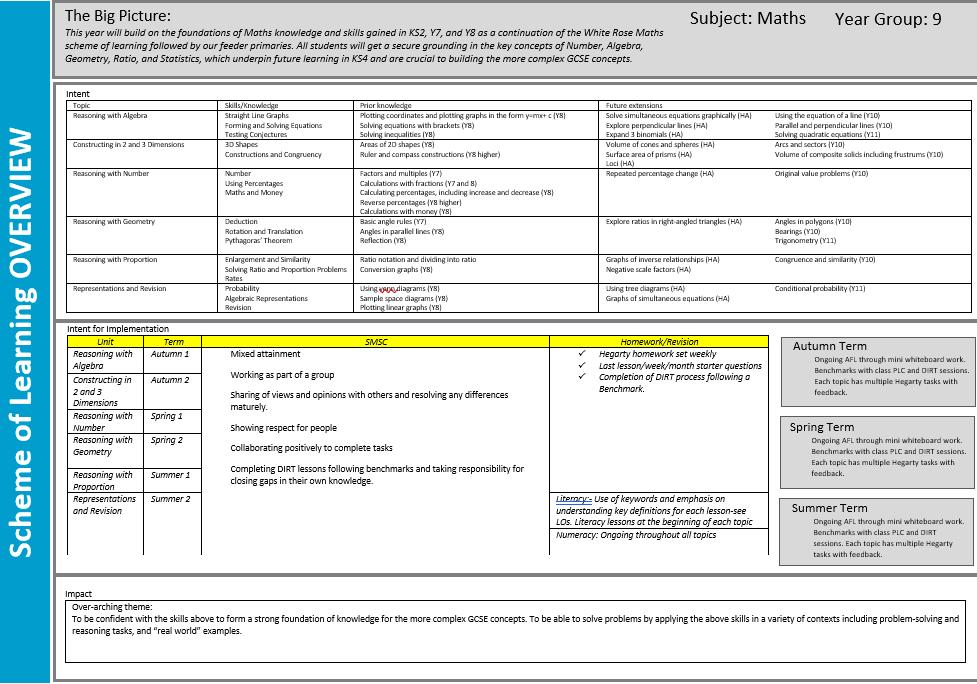
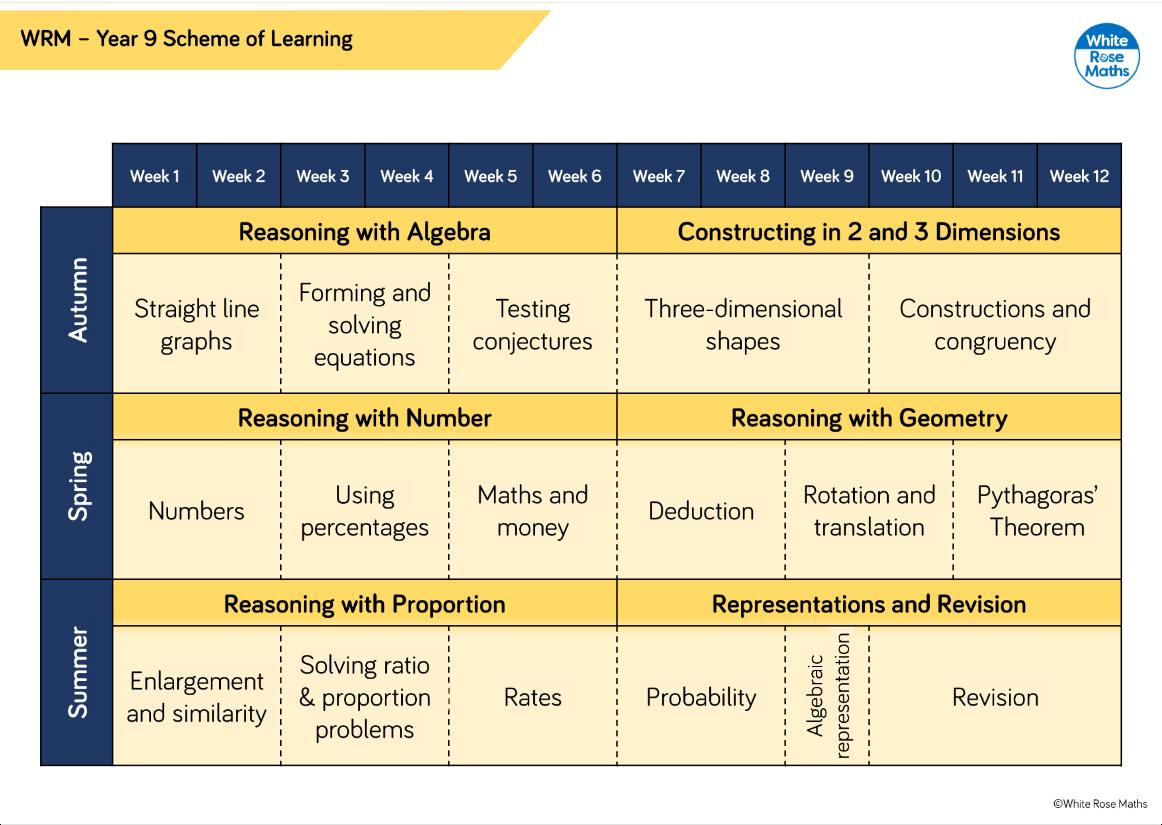
Grove School: Curriculum
Key Stage 4 Maths g
Year 10
This year will build on the foundations of Maths knowledge and skills gained in Key Stage 3. All students will get a secure grounding in the key concepts of number, algebra, geometry, ratio, and statistics which underpin the future learning in Year 11 and are crucial to building the more complex GCSE concepts.
Year 11
This year will build on the foundations of Maths knowledge and skills gained in Key Stage 3 and Year 10. All students will get a secure grounding in the key concepts of number, algebra, geometry, ratio, and statistics which underpin the future learning in Year 11 and are crucial to building the more complex GCSE concepts.
Grove School: Curriculum Narrative
g

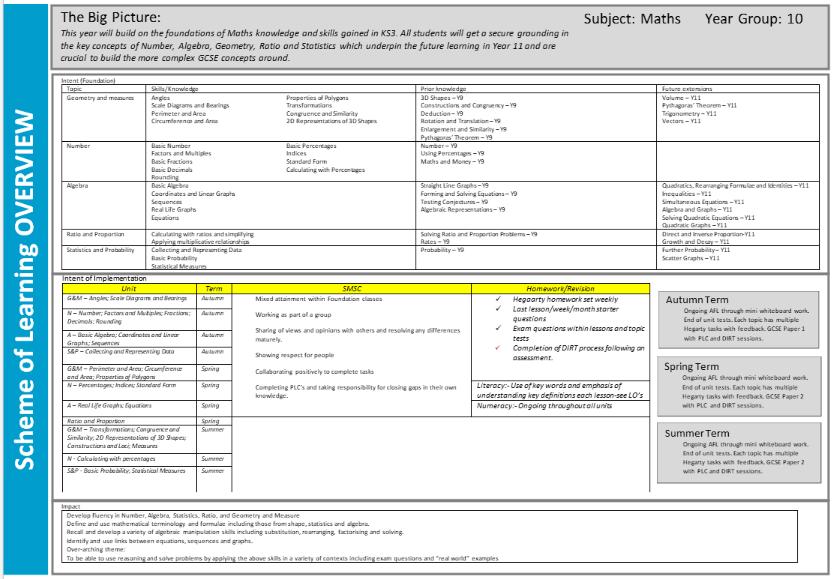
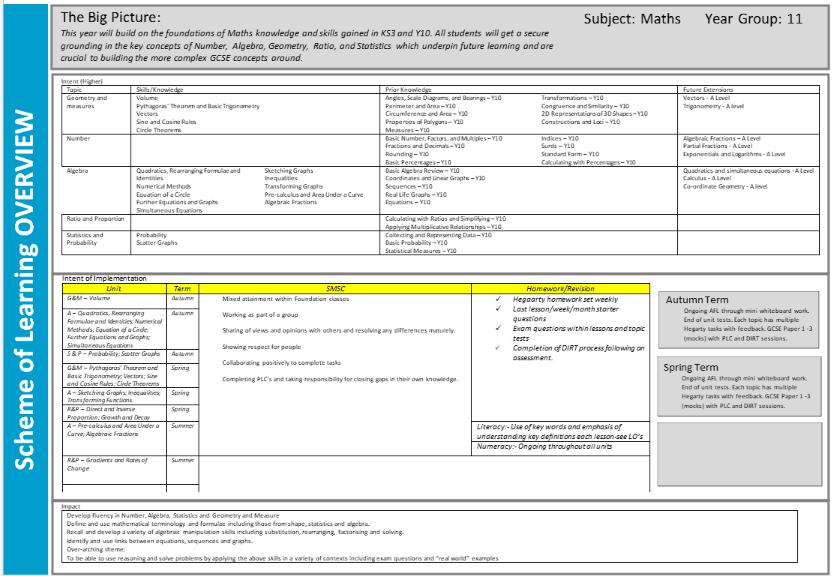
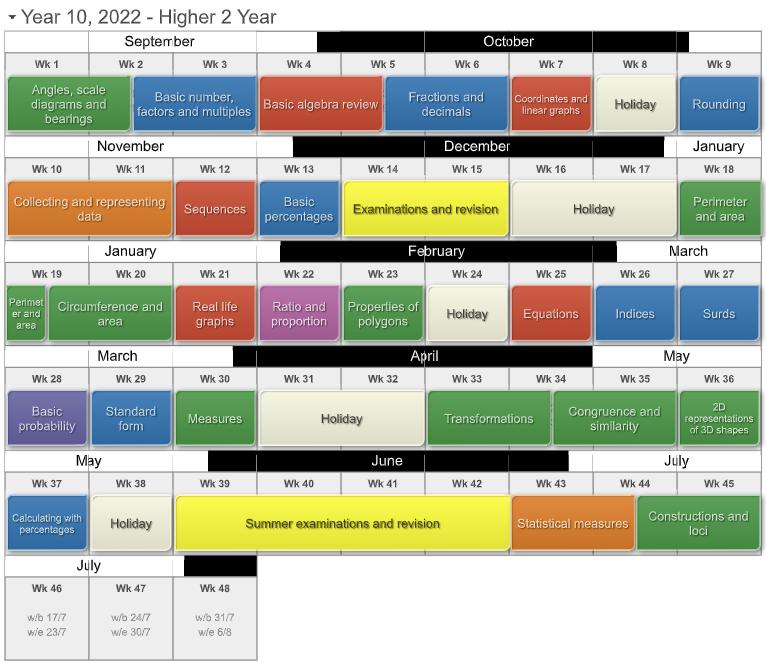
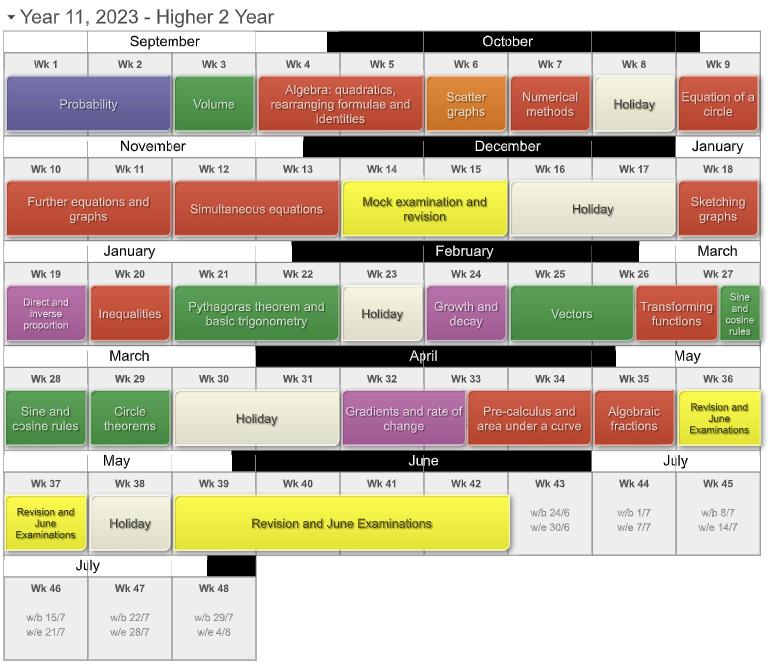
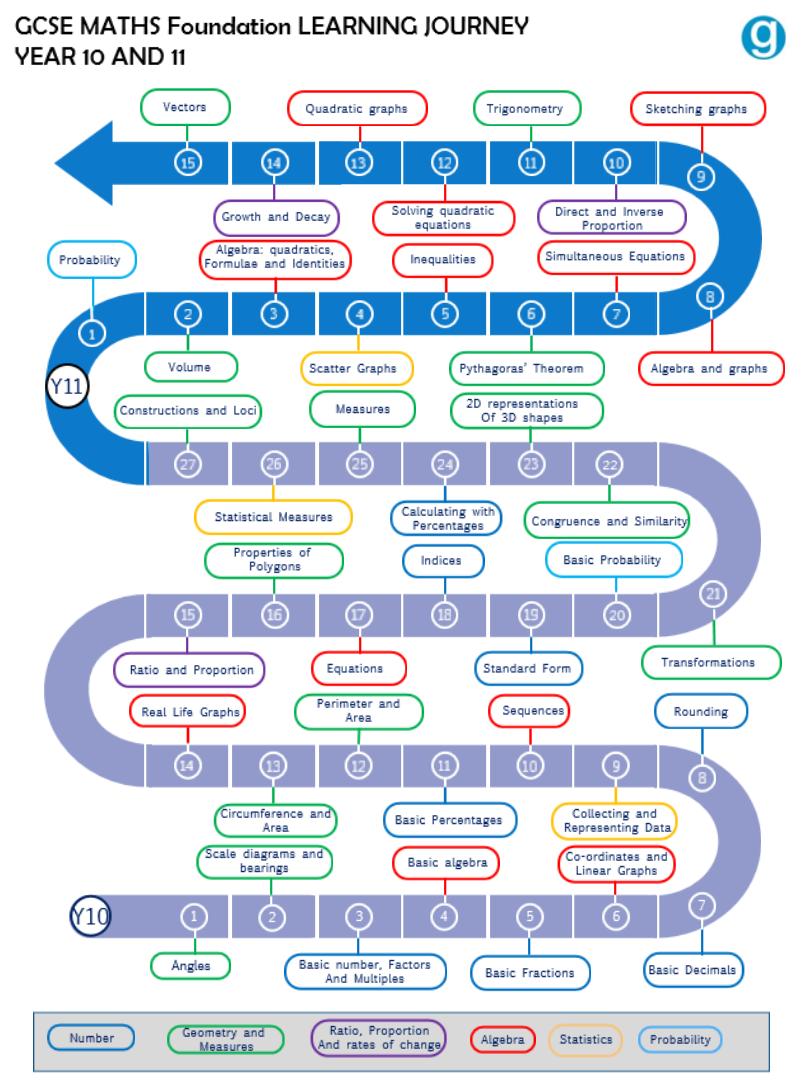
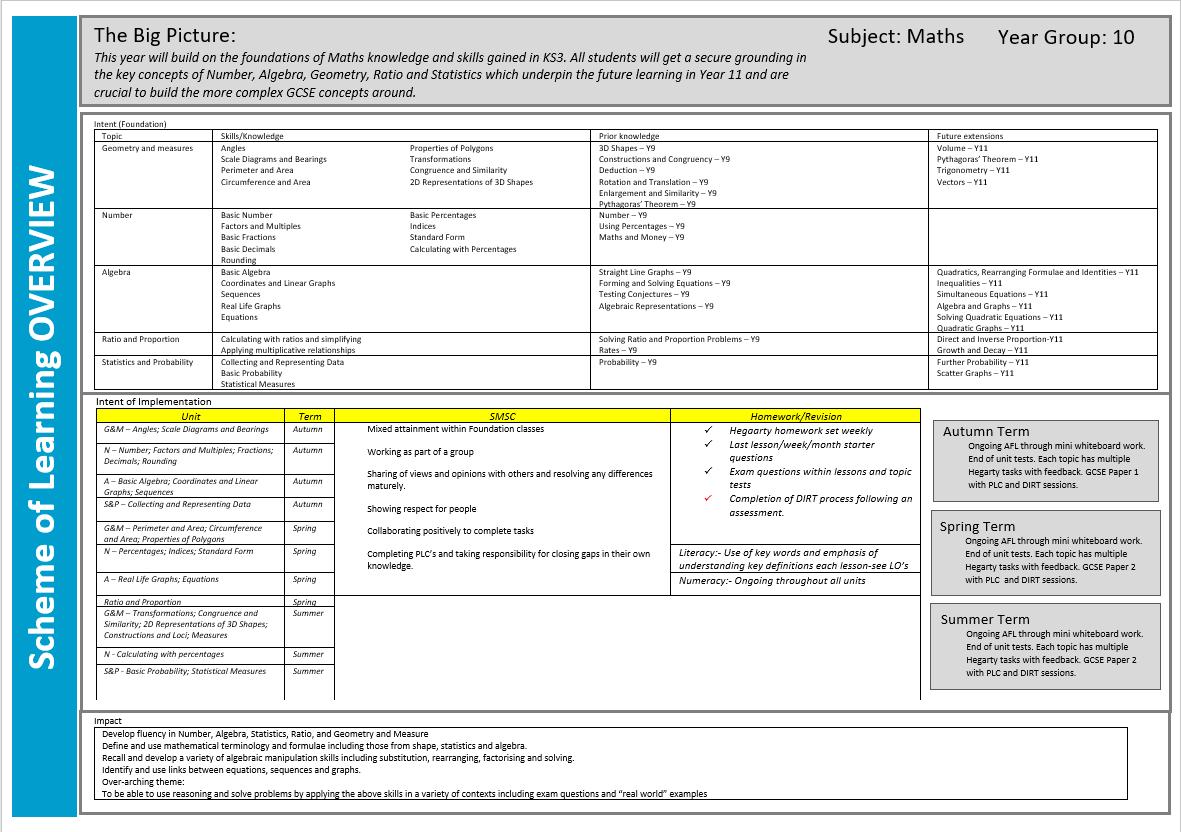
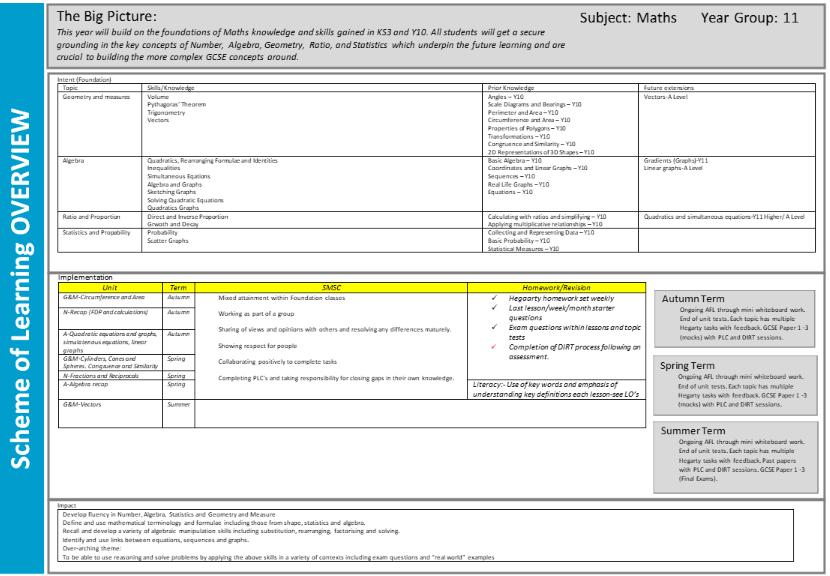

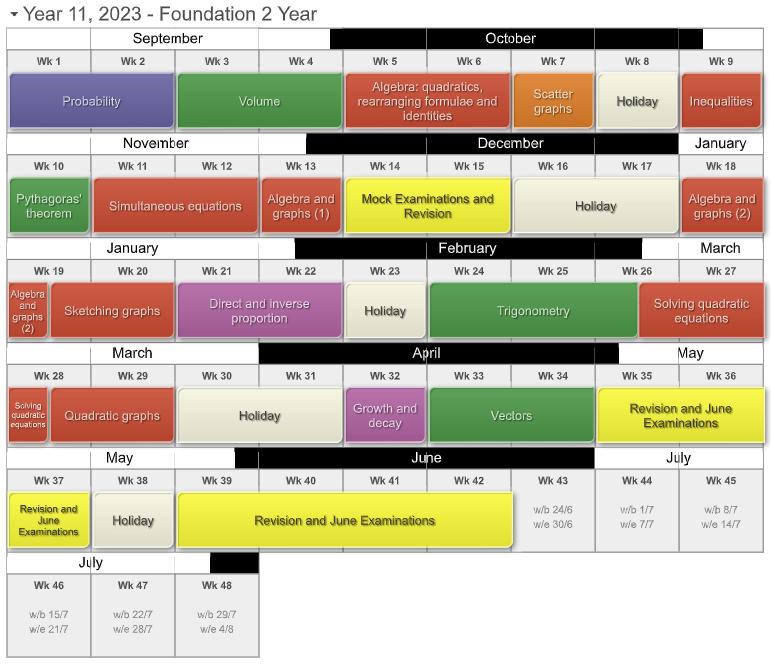
Grove School: Curriculum
Key Stage 5 Maths g
Year 12
This year will build on the foundations of maths knowledge and skills gained in Key Stage 4. All students will gain a secure grounding in the key concepts of Pure Maths, Statistics, and Mechanics which underpin their future learning in Year 13 and are crucial to building the more complex concepts around.
Year 13
This year will build on the foundations of Maths knowledge and skills gained throughout Key Stage 4 and in Year 12. All students will consolidate and develop knowledge and understanding of the additional key concepts of Pure Maths, Statistics, and Mechanics which underpin the application of Maths at A Level and are crucial to building the complex concepts that are being examined around, whilst preparing students for higher-level and undergraduate study.
Grove School: Curriculum Narrative
g
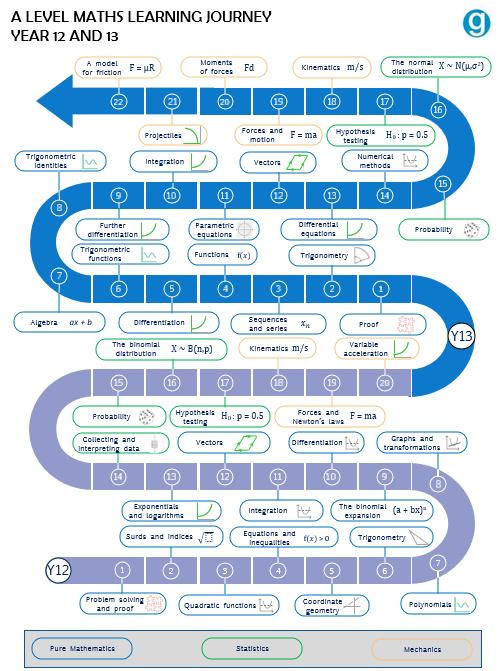
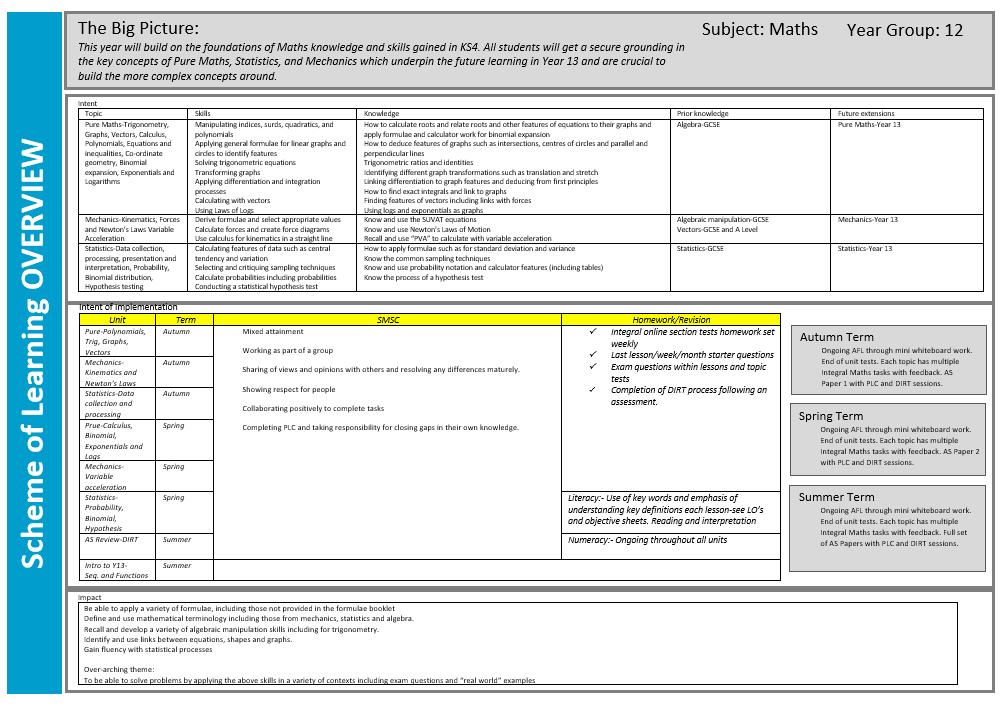





Grove School: Curriculum
Science Science Faculty g
Vision
To engage, enthuse and inspire students to have a passion for science, a curiosity for the world around them and how it works and to provide all students the ability to progress and be successful regardless of their starting position. It is designed to build upon the foundations of learning from Year 6 on a seven year journey to the end of A Level. Each year builds upon previous learning whilst introducing new ideas and concepts to the students in a logical order. There is an emphasis on students gaining the key knowledge and skills needed to be successful in Science and to be able to relate science to the world around them so they can understand and engage with the issues of the day from the environment to the pandemic and beyond.
Context
Students living in Market Drayton and the surrounding areas come from a diverse range of backgrounds and with vastly differing aspirations and attitudes towards learning and education. Students have varied levels of exposure to science in Year 6 though most reach Year 7 with a basic knowledge of the fundamental concepts in Biology, Chemistry and Physics. g Grove School: Curriculum
Substantive Knowledge
The curriculum is linked to the AQA specification and follows the requirements of the national curriculum. Every student learns each of the three sciences. This is delivered through a combined thematic approach in Key Stage 3 and as the difficulty and complexity builds through to GCSE, the content is delivered in discrete science subjects. The knowledge builds upon the content acquired in Key Stage 2 and is scaffolded logically throughout a 7-year plan to develop all aspects of science. Care is taken in planning to ensure that students have received a grounding in the key concepts needed before they are built upon with new knowledge. Working scientifically skills as disciplinary knowledge are embedded throughout the curriculum. Interleaving via knowledge quizzes and constant reinforcement of key concepts and ideas is designed to help students to have a good solid base of knowledge. End of unit assessments take place, accompanied by dedicated reflection and improvement time. Intervention materials are provided to support students.
Supra Curriculum
Students have access to online learning platforms ezyscience (https://www.ezyeducation.co.uk/ezyscience.html) and Seneca learning as well as the Kerboodle online text book (https://www.kerboodle.com/). Students use the Science news website (https://www.sciencenews.org/) to help to develop scientific literacy and to encourage an interest in science issues outside of the curriculum.
Grove School: Curriculum
g
Grove School: Curriculum
Key Stage 3 Science g
Year 7
Students being their secondary school journey in Science by building upon the Key Stage 2 curriculum through themed units. Themed units will consist of the different scientific disciplines of Biology, Physics, Chemistry and including the developmen t of Wo king Scien ificall kill The cien ific opic ha ill be co e ed i hin Yea a e Cells, tissues, organs and systems; Sexual reproduction; Muscles and bones; Ecosystems; Mixtures and separation; Acids and alkalis; Particle model; Atoms, elements and compounds; Energy; Current and electricity; Forces and sound. Skills that are covered include Maths in Science , and Wo king Scien ificall fo he de elopmen of p ac ical kill
Year 8
Students will build upon our Key Stage 3 Year 7 curriculum through themed units. Themed units will consist of the different cien ific di cipline of Biolog Ph ic Chemi and incl ding he de elopmen of Wo king Scien ificall kill Scien tific topics that will be covered within Year 8 are: Digestive system; Role of enzymes in the body specifically the digestive system; Organs and organ systems; Immune response and immune system; Aseptic technique . Students will continue with learning skills for Ma h in Science and he de elopmen of Wo king Scien ificall kill
Year 9
Students will review the key pillars of science which underpin the GCSE learning to follow. In Biology, students will examine basic cell structure, plants and animals and adaptations. In Chemistry, students will look at basic atomic structure, formula e of atoms and reaction with acids and alkalis. They will look at different materials and their properties. In Physics students wi ll look a he ba ic of ene g elec ici and fo m lae and con c ing g aph S den ill con in e o de elop Wo king Scien ificall kill in p ac ical ac i i ie and in e iga ion
Grove School: Curriculum Narrative
g
The Big Picture: Present a clear outline of the year in this subject.
Subject: Science
Year Group: 7
Six themed units addressing a combination of disciplines Biology, Chemistry and Physics within each themed unit. Skills involving application, Maths in Science and Working Scientifically skills will be addressed alongside the subject content , where appropriate.
Intent: List the units to be covered :- Unit 1: Not all scientists wear white coats; Unit 2- 999 What's your emergency?; Unit 3- Titanic; Unit 4- Shipwrecked; Unit 5- Earth in Danger; Unit 6- Leaving Earth
List the overall skills and knowledge to be covered:- Cells, tissues, organs and systems; sexual reproduction; muscles and bones; ecosystems; mixtures and separation; acids and al kalis; particle model; atoms, elements and compounds; Energy; Current electricity; forces and sound. Skills: Maths in Science and Working Scientifically for development of practical skills.
Clearly outline how this year of study will build on prior learning dur ing the previous academic year : Working Scientifically-building on being able to conduct experiments, analysing results by drawing simple conclusion Biology topics involving plant parts and their life cycle; Nutrition and Health; Skeletal system; Habitats and interdependence-introduction of pyramids of numbers/biomass and adaptations of animals and plants to their e nvironment; Light builds on the idea of light and dark and shadows by introducing the visible light spectrum, refraction, dispersion and reflection; Forces and magnets building from poles and attraction to magnetic fields and weight on other planets; states of matter builds by introducing the particle and changes of state; Electricity builds on by classifying simple circuits, drawing circuit diagrams
Implementation
How will the units within this year of study be organised/structured?
Six themed units addressing a combination of disciplines Biology, Chemistry and Physics within each themed unit.
Unit 1: Not all scientists wear white coats; Unit 2- 999 What's your emergency?; Unit 3- Titanic; Unit 4- Shipwrecked; Unit 5Earth in Danger; Unit 6- Leaving Earth
How will you promote SMSC through this year of study?
Unit 1: Jake's story-Heartburn; Unit 2: Condition of asthma and its effects on sufferers; Unit 3: Story of Titanic and lifeboats Unit 4; Survival needs-making shelters; Unit 5; Use of fossil fuels, global warming and alternative sources of energy; Unit 6; How was the Earth, atmosphere and solar system created? Journey to Mars-opportunity for spiritual discussions versus science and human limitations.
How will you develop and build thinking skills and independent learner behaviours?
Group work; research opportunities; problem solving approach through competitions
What style of home learning will you set and how will this build on or prepare for class work? Is it purposeful?
In what ways are you developing interleaving/revision skills?
Various ways of revision are being encouraged to be developed as each unit progresses
Interleaving- Assessments, spellings, themed series of lessons with overarching story, whilst linking scientific disciplines in the unit to enhance recall and retention
Where are the WOW moments and how will you celebrate achievement ?
Achievement: school reward policy, postcards, SIMS INTOUCH, ATL 1's, Faculty rewards for end of year. WOW- Competition through design, experimental exploration, application to daily and world events
How are literacy and numeracy skills to be developed and extended? Scientific literacy, experimental write ups, spellings, presentations. Numeracy involving mathematical equations and the rearrangement of, standard index units, measurements, conversion between units
Impact
Consider your assessment
Markers
Identify where the following will take place;
Key assessments- EOU Tests
Low stakes testing: Application, data, skills tests in each unit
Deep marking points: Tests
Home learning: Tasks are based on Working Scientifically, improving literacy, data, application Examinations-EOUT
Conferencing/DIRT- lesson after EOUtest and low stakes testing points.
Moderation-Termly of EOU Tests/Skills tests
Autumn Term Unit 1, Unit 2
Spring Term Unit 3, 4
Summer Term Unit 5, Unit 6
What is it that you want students to know/be able to do by the end of this year of study? Develop scientific literacy and communication skills, by developing scientific techniques
Developing working scientifically skills including developing scientific thinking; Experimental skills and strategies; Analys is and Evaluation. Developing maths skills in science including arithmetic and numerical computation; data handling; algebra; grap hical skills; Awareness of health and safety within the laboratory environment and be able to name and use scientific apparatus in an appropriate manner.
What are the next steps? How can the knowledge/skills from this year be extended next year?
Grove School: Curriculum
Through the next series of themed units, Masterchef, Fireworks, Top Gear, Materials and Recycling, Down the Farm and Going fo r Gold covering biology, physics and chemistry disciplines, continue to develop and apply developing working scientifically skills, through various topics within these themes. These include developing scientific thinking; Experimental skills and strategies; Analysis and Evaluation. Continuation of developing maths skills in science including arithmetic and numerical computation; data handling; algebra; graphical skills. Continue developing health and safety within the laboratory environment and be able to name and use scientific apparatus in an appropriate manner. Possible introduction to extend learne rs to using Hazcards.
g
Learning OVERVIEW
The Big Picture: Present a clear outline of the year in this subject.
Subject: Science
Six themed units addressing a combination of disciplines Biology, Chemistry and Physics within each themed unit. Skills involving application, Maths in Science and Working Scientifically skills will be addressed alongside the subject content , where appropriate.
Intent: List the units to be covered:- Unit 1: Masterchef; Unit 2- Fireworks; Unit 3- Down on the Farm; Unit 4- Materials & Recycling; Unit 5- Going for Gold; Unit 6- Top Gear
List the overall skills and knowledge to be covered:- Digestive system; Role of enzymes in the body-specificallthe digestive system; Organs and organ systems; Immune response and immune system; Aseptic technique; Writing of a risk assessment; Calculations involving equations; rearranging an equation;
Clearly outline how this year of study will bui ld on prior learning during the previous academic year: Working Scientifically-building on being able to conduct experiments, analysing results by drawing simple conclusion and improving planning phases of investigations
Biology topics involving plant biology; Nutrition and Health; Human Biology - digestive and immune systems; Habitats and interdependence-introduction of pyramids of numbers/biomass and adaptations of animals and plants to their environment; Physics: Light builds on the idea of light and dark and shadows by introducing the visible light spectrum, refraction dispersion and reflection; Forces and magnets building from poles and attraction to magnetic fields and weight on other planets; states of matter builds by introducing the Periodic Table and the structure of an atom.
Implementation
How will the units within this year of study be organised/structured?
Six themed units addressing a combination of disciplines Biology, Chemistry and Physics within each themed un it: Unit 1: Masterchef; Unit 2- Fireworks; Unit 3- Down on the Farm; Unit 4- Materials & Recycling; Unit 5- Going for Gold; Unit 6- Top Gear
How will you promote SMSC through this year of study?
Consider your assessment
Markers
Identify where the following will take place;
Unit 1: Teamworking. Shunning people with different/unknown diseases? ; Unit 2: Symbolism of November 5th & why we have fireworks; Unit 3: Genetic engineering-plants & animals-should we? Unit 4; Wearable Technology ; Unit 5; Ethics of Performance
Enhancing drugs & sport; Unit 6; Driving whilst being under the influence
How will you develop and build thinking skills and independent learner beh aviours?
Group work; research opportunities; problem solving approach through competitions ; Dissections; Investigations
What style of home learning will you set and how will this build on or prepare for class work? Is it purposeful? Seneca; Skills assessments
In what ways are you developing interleaving/revision skills?
Various ways of revision are being encouraged to be developed as each unit progresses
Interleaving- Assessments, spellings, themed series of lessons with overarching story, whilst linking scientific disciplines in the unit to enhance recall and retention
Where are the WOW moments and how will you celebrate achievement ?
Achievement: school reward policy, postcards, SIMS INTOUCH, ATL 1's, Faculty rewards for end of year.
WOW- Competition through design, experimental exploration, application to daily and world events
How are literacy and numeracy skills to be developed and extended? Scientific literacy, experimental write ups, spellings, presentations. Numeracy involving mathematical equations and the rearrangement of, standard index units, measurements, conversion between units
Impact
Autumn Term Unit 1, Unit 2
Key assessments- EOU Tests
Low stakes testing: Application, data, skills tests in each unit
Deep marking points: Tests
Home learning: Tasks are based on Working Scientifically, improving literacy, data, application
Examinations-EOUT
Conferencing/DIRT- lesson after EOUtest and low stakes testing points.
Moderation-Termly of EOU Tests/Skills tests
Spring Term Unit 3, 4
Summer Term Unit 5, Unit 6
What is it that you want students to know/be able to do by the end of this year of study? Develop scientific literacy and communication skills, by developing scientific techniques .
Developing working scientifically skills including developing scientific thinking; Experimental skills and strategies; Analys is and Evaluation. Developing maths skills in science including arithmetic and numerical computation; data handling; algebra; grap hical skills; Awareness of health and safety within the laboratory environment and be able to name and use scientific apparatus in an appropriate manner.
What are the next steps? How can the knowledge/skills from this year be extended next year?
Transitioning and building upon KS3 into GCSE . These include developing scientific thinking; Experimental skills and strategies; Analysis and Evaluation. Continuation of developi ng maths skills in science including arithmetic and numerical computation; data handling; algebra; graphical skills. Continue deve loping health and safety within the laboratory environment and be able to name and use scientific apparatus in an appropriate manner. Possible introduction to extend learners to using Hazcards.
Grove School: Curriculum
g
Scheme of Learning OVERVIEW Year Group: 8
The Big Picture:
Catch up Al the skills identified as requiring improvement form the end of year tests and revisiting key skills which students are required to know in-order to build GCSE skills.
Scientific Enquiry Working scientific skills taught alongside scientific enquiries, these skills are required for the GCSE course.
Cell Biology and Organisation Cell identification, Use of microscopes, calculating magnification.
Atomic Structure and the periodic table Be able to draw an atom, describing the history of the atom.
All the knowledge identified as requiring improvement form the end of year tests and revisiting key knowledge which students are required to know in-order to build GCSE skills.
Knowledge from these topics are required and form a good basis for starting the GCSE course. The knowledge is delivered as part of wider scientific enquiries
Year Group: 9
KS2 science content Ks4 content
KS3 science content KS4 content
Cells and their structures, Cell specialisation, Osmosis and diffusion, Stem cells Blood, The heart Structure of animal and plant cells - Y7/8
Structure of the atom, Isotopes, trends and patterns in the periodic table - groups 1 and 7. Structure of the atom -Y7/8
Chemical analysis RP - Chromatography and calculating Rf value. How to define and identify pure and impure substances. Gas tests. Separating mixtures - chromatography and distillation.
Theraputic cloning and DNA - Y11
Predicting reactions - Y10
Analysis of unknown chemicals
Evolution of our atmosphere, effects of fossil fuels, Greenhouse effect Energy resources yr 7; Fossil fuels Yr 7 Ecology- Yr 11, Organic Chemistry Energy Predict energy transfers, compare power stations and manipulate complex equations. Different types of energy and power stations including their advantages and disadvantages. SCH calculations. Generating electricity - Y7 Energy - Y7
Chemistry of the atmosphere Explaining the origins of our atmosphere
Particles and Atomic structure.
Latent heat - Y19 Forces - Y11
RP - calculating density. Density equation. Kinetic theory, latent heat and specific latent heat. Brownian motion. Changes of state - Y8 Gas laws, pressure at A-level and GCSE
Catch up Autumn Working as part of a group or team, sometimes to create their own working teams
Sharing of views and opinions with others and resolving any differences maturely.
Showing respect for people, living things, property and the environment
Ezyscience homework set weekly on average.
Exam questions are set fortnightly
Deep marking of LOR questions
Research tasks / projects
Keyword and definition tests/quizzes
Autumn Term
Assessment based on catch up test unit
Assessment based on working scientifically knowledge
End of term assessment.
B1 - Cell Biology Spring
C1 - Atomic Structure Spring
P1 Energy Spring/ Summer
P3 – Particle model of Matter Spring/ Summer
C8 – Chemical Analysis Summer
C9 – Chemistry of the atmosphere, Summer
Collaborating positively to carry out experiments and required practical’s.
Completing PLC and taking responsibility for closing gaps in their own knowledge.
Debating the best power stations to use by balancing economic and environmental concerns.
Assessing the impact of burning fossil fuels on the environment.
Completion of DIRT process following an assessment.
Revision activities to consolidate learning after each unit.
Spring Term
End of unit tests and long answer exam questions Each topic has multiple opportunities for work to be deep marked
Literacy:- Use of key words and emphasis of understanding key definitions (including key WS terms) each lesson
Numeracy:- Interpretation of graphs and data in tables. Calculations using formulae and rearranging 3 and 4 term equations. Significant figures applied correctly and prefixes k (1000) and m(0.001) known.
Impact Biology Chemistry Physics
How to calculate magnification.
Identify complex features in cells and their functions and to distinguish the key features and behaviours of Eukaryotic and Prokaryotic cells.
The difference between diffusion and osmosis and the mechanism for each
The role of active transport with living organisms
The role of the blood within the body and its composition.
Definitions of elements, mixtures and compounds and sepa ration techniques. Balancing chemical equations.
The structure of the atom, mass number, atomic number, isotopes, electron shells and electronic structure.
The history of the periodic table, properties of group 1 and group 7 elements and trends within the period for each group.
Summer Term
End of unit tests and long answer exam questions.
Each topic has multiple opportunities for work to be deep marked
End of year examinations.
Types of energy stores and how devices convert form one to another.
How to calculate kinetic en ergy, gravitational potential energy, elastic energy, power and the efficiency of devices. What happens to wasted energy.
Insulation, payback time and how to calculated specific heat capacity.
How 11 types of power station work and their advantages and dis advantages compared to others. Economic and environmental issues with power stations.
Grove School: Curriculum
The structure of the heart and the tissues within it
.Knowing the gas tests. How to perform paper chromatography. The composition of the early atmosphere compared the current one
Calculating density and measuring the density of regular and irregular objects. Describing kinetic theory and changes of state. Calculating specific latent heat and specific heat capacity
g
Scheme of Learning OVERVIEW
Intent Topic Skills Knowledge Prior knowledge Future extensions
Implementation Unit Term SMSC Homework/Revision
This year will build on the foundations of science knowledge and working scientifically skills gained in KS3. All students will get a secure grounding in the key concepts of Biology, Chemistry and Physics which underpin the future learning in Years 10 and 11 and are crucial to build the more complex GCSE concepts around.
Scientific Enquiry Autumn
Subject: Science
Grove School: Curriculum
Key Stage 4 Trilogy Science g
Year 9
All students will begin their journey of discovery into GCSE by studying the fundamental areas of Biology, Chemistry and Physics. They will gain a greater understanding of the working of cells, the nature of atoms and the periodic table and energy changes. They will learn how different power stations work and address some of the i e a o nd hem S den ill ca o eq i ed p ac ical and enhance hei Wo king Scien ificall kill Year 10
Students continue their journey into Biology by looking at systems and organs in the body, examining how organs work together and how reactions are affected by catalysts. Students will look at diseases, their causes, effects and treatments and the science behind the development of those treatments. Students will see how lifestyle can affect health. They will look at the processes of photosynthesis and respiration.
In Chemistry, students will look at how bonding occurs and how it links to the properties of the compounds created. They will learn about the mole and chemical reactions including salts, electrolysis and exothermic reactions. Students will link catalysts to the rate of chemical reactions.
In Physics, students will learn about electrical circuits and domestic electricity. They will look at kinetic theory, linking the arrangement and behaviour of particles to the properties of materials and examine the energy change i hin change of a e The ill hen look a n clea adia ion con ide ing i pe p ope ie benefi e and po en ial ha a d S den ill e end hei nde anding of fo ce and Ne on La of Motion, including scalar and vector quantities.
S den ill con in e o de elop hei Wo king Scien ificall kill h o gh e pe imen and in e iga ion
Grove School: Curriculum Narrative
g
Year 11
Students continue their journey into Biology by looking at diabetes, its causes and treatments. They look at natural selection, DNA, genetics and genetic engineering and examine the issues associated with it. Students will look at adaptations of animals and plants to see how they are designed to live in their specific ecosystems. They then look at ecosystems, how they function and the impact upon them by human activity including global warming and the greenhouse effect.
In Chemistry, students look at rates of reaction, alkanes, alkenes and crude oil. They examine the development of he ea h a mo phe e and ho he b ning of fo il f el i ca ing change incl ding global a ming and he greenhouse effect. Students then look at issues involving sustainability maintaining resources and recycling.
In Physics, students learn more about forces including acceleration, terminal velocity, speed and acceleration. Students learn to calculate values from distance -time and velocity-time graphs. Students learn the different types of waves and the uses and properties of each wave in the electromagnetic spectrum. They look at magnetic fields, electromagnets and the motor effect.
S den ill con in e o de elop hei Wo king Scien ificall kill h o gh e pe imen and in e iga ion becoming increasingly adept and independent when planning, performing and assessing experiments.
Grove School: Curriculum Narrative
g
Scan this QR code to take you to the specification we study.
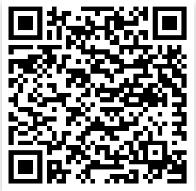
What is my Learning Journey for Year 9 to 11?
Content Interdependence, adaptation, ecosystems, recycling materials, biodiversity and human impacts.
Bigger Picture Focus To consider the impacts our actions have on other organisms and ways we can make positive changes.

Content Homeostasis, the nervous system, hormonal coordination, blood glucose control, menstrual cycle, infertility and contraception
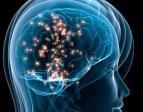
Exams:
-6 x 75 minute papers 2 for biology, 2 for chemistry, 2 for physics
There is no coursework element.
Micro bit programmer
Bigger Picture Focus To understand how we can manipulate the hormonal system to prevent pregnancy or help people have children who normally would not be able to.

Assessments:
-End of unit tests
6 mark question practice for each unit
B6 Inheritance, variation and evolution
Content Photosynthesis, rates of photosynthesis, aerobic and anaerobic respiration, responses to exercise and metabolism.
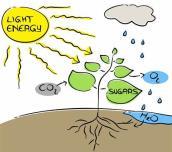
Bigger Picture Focus To understand the role of plants in our ecosystems and how, without them, we would not be here.
B4 Bioenergetics
Content Pathogens and the diseases they cause, human defences and the immune response, vaccination, antibiotics, drug discovery and development.

Bigger Picture Focus To examine the different types of diseases and ways we can prevent their spread and treat them to save lives around the world.
Content Reproduction, DNA, inheritance, inherited disorders, variation, evolution, selective breeding, genetic engineering, fossils, extinction and classification
#realworldready
• Appreciate how scientific understanding can lead to the development of cures and treatments for diseases to save live
To understand how we can use our knowledge of genetics to enhance crops, develop more valuable livestock as well as appreciating how our actions have caused the loss of species
Bigger Picture Focus
How computers work
B7 Ecology B2 Organisation (11)
Content Levels of organisation, food, digestion, enzymes, heart and blood, cardiovascular disease, cancer, plant organs and plant transport

Bigger Picture Focus To link how understanding how our bodies work enable scientists to develop a variety of ways of treating diseases.
• Understand how to minimise our impact on the organisms in the world around us
• Consider whether just because science allows us to manipulate organisms, should we be allowed to?
• Understand the importance of science to a wide variety of careers.
11 YEAR B1 Cells
Content Cells, specialised cells, microscopy, cell division, stem cells and transport in cells.
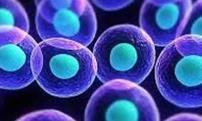
Key Skills:
• Recall and retention of scientific facts
• Analysing and interpreting data
• Evaluating information
Useful websites and support
-GCSE bitesize
-Kerboodle
-Oak Academy
-Seneca
-Ezyscience
Bigger Picture Focus
To understand how knowledge of the fundamental building blocks that make up living organisms and can lead to the development of therapies to cure diseases.

9 YEAR 10 YEAR B2 Organisation (1)
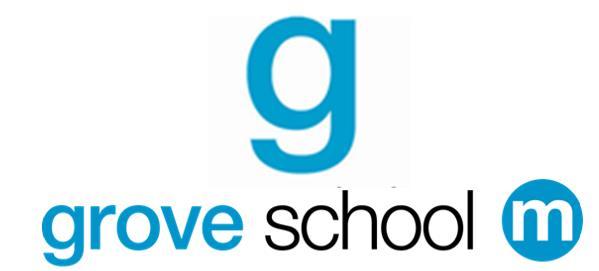
Microscopy
Home Learning
-Weekly interleaving quizzes and homework
Other tasks may include:
-6 mark question practice for each unit
-Past paper practice
-Flipped learning tasks
Trilogy Biology Key Stage 4 Overview
Microbes and disease, Working Scientifically, Living things and their habitats, Human Biology, Cells Exploring the Elements Isabel thomas 10 Working Scienctifically, Elements, Chemistry, Atomic Structure What
Working scientifically, Cells and Organisation, Health and drugs, Ecosystems, Genetics and Evolution, Particles, Atoms, Elements and compounds, The Periodic Table, Materials, Earth and the atmosphere, Energy, Motion and Forces, Waves, Electricity, Space Physics, Atomic Structure.
Plants, Botany, Working Scientifically, Photosynthesis, Ecology, Living things and their habitats

Question Everything - 132 Science questions
O'Hare 10 All Biology, Chemistry and Physics
Title Author Year Science Topic
The Senses Matteo Farinella 10 Cells, Working Scientifically, Skeleton, Light and sound, Never home alone Rob Dunn 10
If? Randall Munroe 11
Lab Girl Hope Jahren 11
Mick
Bill
Does anything eat wasps and 101 other questions Mick O'Hare 10 All Biology, Chemistry and Physics The Body - A guide for occupants
Bryson 10 Biology
Trilogy Science Chemistry Key Stage 4 Overview
What is my Learning Journey for Years 9 to 11?
Content Recycling, Water, Reducing use of resources, Finite and renewable resources

Big picture focus – how recycling can extend the use of resources and positively impact the environment.
C10 Using Resources
Scan this QR code to take you to the specification we study.
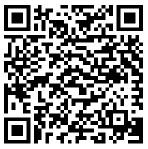
Content Calculating formula mass, Conservation of mass, Calculating concentration, Balancing equations
Big picture focus – formulae and calculations
C3 Quantitative
Content Three states of matter, Ionic bonding, Covalent bonding, Metals and alloys.
Big picture focus – linking properties to bonding
Content Chromatography, Rf values, Pure substances and mixtures.

Big picture focus – use of analysis techniques.
Content Crude oil, Hydrocarbons and alkanes.
Big picture focus – Uses of crude oil and the impact on the environment.

C7 Organic Chem
Content Reactions of metals, Acids, alkalis, salts, Electrolysis
Big picture focus – Use of electrolysis in extracting useful products and the financial and environmental impacts of doing so.
How computers work
C4 Chem Changes
Content Developing the atmosphere, Polluting the atmosphere
Big picture focus – climate change, its causes and the likely impact on the world.
Content Affect of catalyst, concentration, temperature on rate of reaction. Reversible reactions


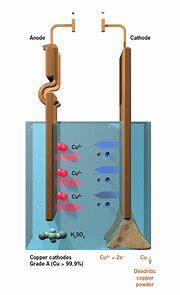
Big picture focus – the role of catalysts in everyday reactions.

C6 Rates
Content Endothermic and exothermic reactions, Reaction profiles

Big picture focus – everyday uses of exothermic and endothermic reactions
11 YEAR
Exams:
-6 x 75 minute papers 2 for biology, 2 for chemistry, 2 for physics
There is no coursework element.
Assessments:
-End of unit tests
--6 mark question practice for each unit
#realworldready
• Understanding about the elements that make up the world around us, how we can study and separate each of these elements and compounds.
• Looking at the history behind different scientific theories and understanding how these change over time.
• Topics look at how we can best look after the world around us and live more sustainably.
• Understand the importance of science to a wide variety of careers.
C5 Energy Changes
Content Periodic table, element, compound, atomic structure, groups of the periodic table.
Big picture focus – Uses of the periodic table in chemistry.
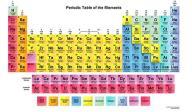
C1 Atomic Structure
9
Key Skills:
• Recall and retention of scientific facts
• Analysing and interpreting data
• Evaluating information
Useful websites and support
-GCSE bitesize

- Kerboodle
-Oak Academy
-Seneca
-Ezyscience
Home Learning
-Weekly interleaving quizzes and homework
Other tasks may include:
-6 mark question practice for each unit
-Past paper practice
-Flipped learning tasks
YEAR
Atmosphere
C9
Chem Analysis
C8
10
YEAR
Question Everything - 132 Science
Does anything eat wasps and 101 other
Working scientifically, Cells and Organisation, Health and drugs, Ecosystems, Genetics and Evolution, Particles, Atoms, Elements and compounds, The Periodic Table, Materials, Earth and the atmosphere, Energy, Motion and Forces, Waves, Electricity, Space Physics, Atomic Structure.

Title Author Year Science Topic Atomic Women Roseanne Montillo 10 Working Scientifically, Atomic Structure, Energy
home alone Rob Dunn 10
Exploring the Elements Isabel thomas 10 Working
If? Randall Munroe 11
Never
Microbes and disease, Working Scientifically, Living things and their habitats, Human Biology, Cells
Scienctifically, Elements, Chemistry, Atomic Structure What
questions Mick
10 All
O'Hare
Biology, Chemistry and Physics
Mick O'Hare 10 All
questions
Biology, Chemistry and Physics
What is my Learning Journey for Years 9 to 11?
Content Permanent and induced magnets, magnetic field, Electromagnets. The motor effect, Big picture focus understanding what role electromagnets and motors play in our lives.
P7 Magnets
Scan this QR code to take you to the specification we study.
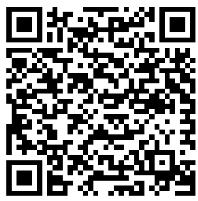
Content Static electricity. Current, Voltage, Resistance. Circuits symbols and how to build circuits. Series and parallel circuits, a.c and d.c, mains electricity. Power, National grid.
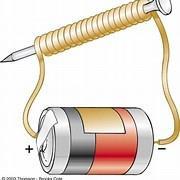
Big picture focus to understand how a.c electricity differs from d.c and what safety features are in place to protect us from shocks.
P2 Electricity
10 YEAR
Content Transverse and longitudinal waves Labeling a wave, calculating wave speed, refraction, electromagnetic waves uses and dangers. Big picture focus Seeing how we use different types of e-m waves every day.
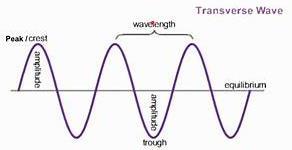
P6 Waves
Micro bit programmer
Forces
Exams:
-6 x 75 minute papers 2 for biology, 2 for chemistry, 2 for physics
There is no coursework element.
Assessments:
-End of unit tests
6 mark question practice for each unit
#realworldready
• Appreciate how our Earth is part of a wider system and the study into this.
Content Atomic model, Discovery of the atomic model, Isotopes, Ions, Radioactive decay, Uses and dangers of radiation.

Big picture focus How experiments led to the atomic model and how theories will change over time. How radiation is able to harm us and how we can protect against it.
Content Density, States of matter, Changes of state, Gas particles. Specific heat capacity and specific latent heat.
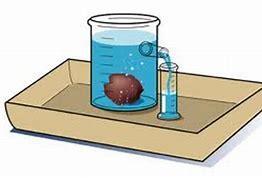

Big picture focus – how the behaviour of particles affects the properties of solids, liquids and gases
P4 Atomic Structure
Content Energy stores, Energy calculations, Work, Power, Renewable and Non-Renewable. Energy transfers. Power stations and the national grid. Big picture focus how different power stations affect the environment and how to generate carbon free electricity

Content Speed, Acceleration, Distance-Time graphs, Velocity-Time graphs, Contact and non-contact forces, Gra i , Hooke s La Ne on s laws, Scalar and Vectors. Big picture focus how streamlining and design can reduce air resistance and improve efficiency and top speed of a vehicle. Model
P1 Energy
11 YEAR
• Understanding how and why objects act in the way that they do
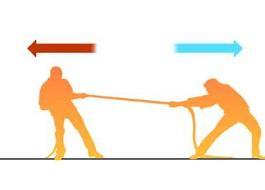
• Understanding the theories that Scientists have developed over time and how/why these change
• Looking at the use of electricity in everyday lives and how we can develop our usage to be more sustainable.
• Understand the importance of science to a wide variety of careers.
Useful websites and support
-GCSE bitesize

- Kerboodle
-Oak Academy
-Seneca
-Ezyscience
9 YEAR
Key Skills:
• Recall and retention of scientific facts
• Analysing and interpreting data
• Evaluating information
Home Learning
-Weekly interleaving quizzes and homework
Other tasks may include:
-6 mark question practice for each unit
-Past paper practice
-Flipped learning tasks
Key Stage 4 Overview
Trilogy Science Physics
Particle
Plants, Botany, Working Scientifically, Photosynthesis, Ecology, Living things and their

Title Author Year Science Topic The Senses Matteo Farinella 10 Cells,
Women Roseanne Montillo 10 Working
the
Isabel thomas 10 Working
What If? Randall Munroe 11
Structure. Lab Girl Hope Jahren 11
habitats The Mysteries of the Universe Will Gater 10 seps Space, Physics, Astronomy, Question Everything - 132 Science questions Mick O'Hare 10 All Biology, Chemistry and Physics Does anything eat wasps and 101 other questions Mick O'Hare 10 All Biology, Chemistry and Physics The Radium Girls Kate Moore 10 Radiation
Working Scientifically, Skeleton, Light and sound, Atomic
Scientifically, Atomic Structure, Energy Exploring
Elements
Scienctifically, Elements, Chemistry, Atomic Structure
Working scientifically, Cells and Organisation, Health and drugs, Ecosystems, Genetics and Evolution, Particles, Atoms, Elements and compounds, The Periodic Table, Materials, Earth and the atmosphere, Energy, Motion and Forces, Waves, Electricity, Space Physics, Atomic
Grove School: Curriculum
g
Grove School: Curriculum
Key Stage 4 Triple Science Biology g
Year 9
All students will begin their journey of discovery into GCSE by studying the fundamental areas of Biology. They will gain a greater understanding of the workings of cells, movement of substance and the uses and ethical quandaries of stem cells. The students develop an understanding of the body, its digestive system, circulatory system and respiratory system, examining how organs work together and how reactions are affected by catalysts. Students delve into plants and organ systems. Students conclude the year by discovering how infectious disease spreads and how to prevent this. Incorporated is learning how to live a healthy lifestyle. Students discover the world of monoclonal antibodies. Students will carry out required practical's and enh ance hei Wo king Scien ificall kill
Year 10
Students continue their journey into Biology by looking at how disease can be treated. Specifically delving into plant diseas e. Student also develop the skill to investigate bacterial growth. They discover how our own body fight back against pathogens and why we may need additional help. Students understand how vaccines are made and consider the moral, legal and scientific drug discovery process. The students then look at other diseases such as cancer, diabetes and heart disease and how we can both treat, prevent and potentially cure illness. Moving on to the topic of the nervous system, students develop a knowledge of how nerves work to control our body. The brain and eye functions and disease play a key part to learning. Students acquire knowledge in how the body hormones can cause issues when not regulated, but the importance of hormones in homeostatic mechanisms. Discovering diabetes, plant hormones, osmoregulation and thermoregulation rounds up the year. Students will con in e o de elop hei Wo king Scien ificall kill h o gh e pe imen and in e iga ion h o gho he year, becoming more adept and independent when planning, performing and assessing experiments.
Grove School: Curriculum Narrative
g
Year 11
Students continue their journey into Biology by looking at gene expression from DNA. Students begin to develop their understanding of reproduction and the importance of inheritance to species survival. Studies into inherited disorders such as Polydactyl and Cystic Fibrosis concludes in understanding XX versus XY. Students acknowledge every organism has variation and link their previous learning to how animals evolved. Students also learn how we can choose to breed a certain gene through selective breeding, genetic engineering and cloning. Students recognise the importance of proof of theories and why questioning is key to Biology.
A trip into why extinction occurs and what the future holds for antibiotic resistance takes place. We look at how to group organisms and take a dive into the world of ecology. Students will look at adaptations of animals and plants to see how they are designed to live in their specific ecosystems. They then look at ecosystems, how they function and the impact upon them by human activity including global warming and the greenhouse effect. This element of the course culminates in describing and explaining how food industries are designed to work in the modern day. Students will con in e o de elop hei Wo king Scien ificall kill h o gh e pe imen and in e iga ion throughout the year, becoming adept and independent when planning, performing and assessing experiments, culminating in the end of year exam process.
Grove School: Curriculum Narrative
g
Scan this QR code to take you to the specification we study.

What is my Learning Journey for Years 9 to 11?
Content Interdependence, adaptation, ecosystems, recycling materials, biodiversity and human impacts.
Bigger Picture Focus To consider the impacts our actions have on other organisms and ways we can make positive changes.

Content Homeostasis, the nervous system, hormonal coordination, blood glucose control, menstrual cycle, infertility and contraception

Bigger Picture Focus To understand how we can manipulate the hormonal system to prevent pregnancy or help people have children who normally would not be able to.

Exams:
-2 x 1 hour 45 minute papers
There is no coursework element.
Assessments:
-End of unit tests
6 mark question practice for each unit
Micro bit programmer
B6 Inheritance, variation and evolution
Content Photosynthesis, rates of photosynthesis, aerobic and anaerobic respiration, responses to exercise and metabolism.

Bigger Picture Focus To understand the role of plants in our ecosystems and how, without them, we would not be here.
Content Reproduction, DNA, inheritance, inherited disorders, variation, evolution, selective breeding, genetic engineering, fossils, extinction and classification

Bigger Picture Focus To understand how we can use our knowledge of genetics to enhance crops, develop more valuable livestock as well as appreciating how our actions have caused the loss of species
How computers work
B7 Ecology B2 Organisation (11)
B4 Bioenergetics
Content Pathogens and the diseases they cause, human defences and the immune response, vaccination, antibiotics, drug discovery and development.

Bigger Picture Focus To examine the different types of diseases and ways we can prevent their spread and treat them to save lives around the world.
Content Levels of organisation, food, digestion, enzymes, heart and blood, cardiovascular disease, cancer, plant organs and plant transport

Bigger Picture Focus To link how understanding how our bodies work enable scientists to develop a variety of ways of treating diseases.
YEAR
11
Content Cells, specialised cells, microscopy, cell division, stem cells and transport in cells.

Bigger Picture Focus To understand how knowledge of the fundamental building blocks that make up living organisms and can lead to the development of therapies to cure diseases.
Key Skills:
• Recall and retention of scientific facts
• Analysing and interpreting data
• Evaluating information
#realworldready
• Appreciate how scientific understanding can lead to the development of cures and treatments for diseases to save live
• Understand how to minimise our impact on the organisms in the world around us
• Consider whether just because science allows us to manipulate organisms, should we be allowed to?
• Understand the importance of science to a wide variety of careers.
Useful websites and support
-GCSE bitesize
-Kerboodle
-Oak Academy
-Seneca
-Ezyscience
9 YEAR 10 YEAR B2 Organisation (1)

Home Learning
B1 Cells
-Weekly interleaving quizzes and homework
Other tasks may include:
-6 mark question practice for each unit
-Past paper practice
-Flipped learning tasks
Triple Science Biology Key Stage 4 Overview
Microscopy
Microbes and disease, Working Scientifically, Living things and their habitats, Human Biology, Cells Exploring the Elements Isabel thomas 10 Working Scienctifically, Elements, Chemistry, Atomic Structure What
Working scientifically, Cells and Organisation, Health and drugs, Ecosystems, Genetics and Evolution, Particles, Atoms, Elements and compounds, The Periodic Table, Materials, Earth and the atmosphere, Energy, Motion and Forces, Waves, Electricity, Space Physics, Atomic Structure.
Plants, Botany, Working Scientifically, Photosynthesis, Ecology, Living things and their habitats
Question Everything - 132 Science questions Mick O'Hare 10 All Biology, Chemistry and Physics

Title Author Year Science Topic
The Senses Matteo Farinella 10 Cells, Working Scientifically, Skeleton, Light and sound, Never home alone Rob Dunn 10
If? Randall Munroe 11
Lab Girl Hope Jahren 11
Bill
Does anything eat wasps and 101 other questions Mick O'Hare 10 All Biology, Chemistry and Physics The Body - A guide for occupants
Bryson 10 Biology
Grove School: Curriculum
g
Grove School: Curriculum
Key Stage 4 Triple Science Chemistry g
Year 9
All students will begin their journey of discovery in GCSE by studying the fundamental areas of Chemistry. They will gain a greater understanding of the working of the nature of atoms and gain an understanding of the history and trends of the periodic table. Students will learn how to balance equations and to separate mixtures of elements and compounds. The e of Ma h in Science i in od ced h o gh in ance ch a a omic c e molec la fo m lae and ili ing anda d fo m Students ill ca o eq i ed p ac ical hich a e a p ac ical foc of he GCSE q alifica ion and de elop hei Wo king Scien if icall skills.
Year 10
Students continue their journey in Chemistry. Students will formulate an understanding of structure and bonding within substances and how bonding occurs; there is also a focus upon how this links to the properties of the compounds created. Maths in Science skills are developed further, by focussing upon chemical calculations together i h Wo king Scien ificall skills.
Next, students progress by developing an understanding of surrounding chemical reactions and energy changes, where they learn about how metals are extracted from ores and experimental techniques to make salts; use electricity to split apart ionic compounds via electrolysis, and be able to understand the energy released in reactions and how these can be used to power batteries and fuel cells. Students will investigate the rate of chemical reactions and understand the factors which aff ect these rates.
S den ill con in e o de elop hei Wo king Scien ificall kill h o gh eq i ed p ac ical e pe imen and in e iga ions.
Grove School: Curriculum Narrative
g
Year 11
Students continue their journey into Chemistry by looking at organic chemistry including alkanes, alkenes, alcohols, carboxylic acids and esters. They will examine how these compounds react and are formed, as well as how crude oil is used to form many useful products. They examine and begin to explain using chemical reactions how polymers are formed and explore the many uses of natural and synthetic polymers. Additionally, chemical analysis and the Earth's resources are explored by students investigating methods of chemical analysis such as, how scientists can use simple tests and spectroscopy to indicate the presence of diffe en elemen The e amine he de elopmen of he Ea h a mo phe e and ho he b ning of fo il f el is causing change.
Students then look at issues such as sustainability; maintaining resources, the use of resources, for example, making water safe to drink and treating waste water. Students study the assessment of product life cycles; making fertilisers in the lab and industry; making ammonia using the Haber process and reducing waste through reduction, reusing and recycling.
Students will continue to develop Ma h in Science kill and addi ionall hei Wo king Scien ificall kill through required practical experiments and investigations.
Grove School: Curriculum Narrative
g
Triple Science Chemistry Key Stage 4 Overview
What is my Learning Journey for Years 9 to 11?
Content Recycling, Water, Reducing use of resources, Finite and renewable resources

Big picture focus – how recycling can extend the use of resources and positively impact the environment.
C10 Using Resources
Scan this QR code to take you to the specification we study.

Content Calculating formula mass, Conservation of mass, Calculating concentration, Balancing equations
Big picture focus – formulae and calculations
C3 Quantitative
Content Three states of matter, Ionic bonding, Covalent bonding, Metals and alloys. Big picture focus – linking properties to bonding
Content Chromatography, Rf values, Pure substances and mixtures.

Big picture focus – use of analysis techniques.
Content Crude oil, Hydrocarbons and alkanes.
Big picture focus – Uses of crude oil and the impact on the environment.

C7 Organic Chem
Content Reactions of metals, Acids, alkalis, salts, Electrolysis
Big picture focus – Use of electrolysis in extracting useful products and the financial and environmental impacts of doing so.
How computers work
C4 Chem Changes
Content Developing the atmosphere, Polluting the atmosphere
Big picture focus – climate change, its causes and the likely impact on the world.
11 YEAR
Content Affect of catalyst, concentration, temperature on rate of reaction. Reversible reactions



Big picture focus – the role of catalysts in everyday reactions.

Exams:
-2x 1 hour 45 minute papers
There is no coursework element.
Assessments:
-End of unit tests
6 mark question practice for each unit
#realworldready
• Understanding about the elements that make up the world around us, how we can study and separate each of these elements and compounds.
Content Endothermic and exothermic reactions, Reaction profiles

Big picture focus – everyday uses of exothermic and endothermic reactions
C5 Energy Changes
Content Periodic table, element, compound, atomic structure, groups of the periodic table.
Big picture focus – Uses of the periodic table in chemistry.

C1 Atomic Structure
9 YEAR
Key Skills:
• Recall and retention of scientific facts
• Analysing and interpreting data
• Evaluating information
• Looking at the history behind different scientific theories and understanding how these change over time.
• Topics look at how we can best look after the world around us and live more sustainably.
• Understand the importance of science to a wide variety of careers.
Useful websites and support
-GCSE bitesize

- Kerboodle
-Oak Academy
-Seneca
-Ezyscience
Home Learning
-Weekly interleaving quizzes and homework
Other tasks may include:
-6 mark question practice for each unit
-Past paper practice
-Flipped learning tasks
Atmosphere
C9
Chem Analysis
C8
10
YEAR
Question Everything - 132 Science
Does anything eat wasps and 101 other
Working scientifically, Cells and Organisation, Health and drugs, Ecosystems, Genetics and Evolution, Particles, Atoms, Elements and compounds, The Periodic Table, Materials, Earth and the atmosphere, Energy, Motion and Forces, Waves, Electricity, Space Physics, Atomic Structure.

Title Author Year Science Topic Atomic Women Roseanne Montillo 10 Working Scientifically, Atomic Structure, Energy
home alone Rob Dunn 10
Exploring the Elements Isabel thomas 10 Working
If? Randall Munroe 11
Never
Microbes and disease, Working Scientifically, Living things and their habitats, Human Biology, Cells
Scienctifically, Elements, Chemistry, Atomic Structure What
questions Mick
10 All
O'Hare
Biology, Chemistry and Physics
Mick O'Hare 10 All
questions
Biology, Chemistry and Physics
Grove School: Curriculum
Key Stage 4 Triple Science Physics g
Year 9
Students will begin their journey of discovery of the GCSE course by studying the fundamental area energy within Physics. The y will learn about the different forms in which energy can exist and how energy changes as the behaviour of an object changes. They will develop their understanding and practice of handling 3 -term equations and applying them to find solutions to problems. Students will then learn how different power stations work and address some of the issues around them, examining their advantages, disadvantages and their suitability for use in different situations. Students will carry out required pract icals and enhance their working scientifically skills.
Year 10
Students continue their journey into Physics. Students will learn about electrical circuits and domestic electricity. They wi ll look at current and static electricity, examine series and parallel circuits and their working and circuit symbols. Students will learn the difference between ac and dc and the structure of the plug. They will develop a good knowledge of electrical safety and become adept at using and rearranging the electricity equations. Students will then look and density and how to calculate it. They will look at kinetic theory, linking the arrangement and behaviour of particles to the properties of materials and exami ne he ene g change i hin change of a e The ill hen look a n clea adia ion con ide ing i pe p ope ie ben efits, uses and potential hazards. Students will look at nuclear fission and chain reactions and link this to the design and operati on of a nuclear reactor. They will also learn about nuclear fusion as the process which powers the sun and could, one day provide limi le clean po e on Ea h S den ill e end hei nde anding of fo ce and Ne on La of Mo ion incl ding scalar and vector quantities, resultant forces and free body diagrams and the principles of moments. S den ill con in e o de elop hei Wo king Scien ificall kill h o gh e pe imen and in e iga ion h o gho he year.
Grove School: Curriculum Narrative
g
Year 11
Students continue their journey into Physics. They will learn more about forces including acceleration, terminal velocity, speed, acceleration and momentum. Students learn to calculate values from distance-time and velocitytime graphs and employ the use of more advances 4 -term equations. They will learn about pressure in each state on matter. Students learn the different types of waves and the uses and properties of each wave in the electromagnetic spectrum including for medical scans. Students will look in depth at wave properties and behaviour, looking at reflection, refraction, diffraction and dispersion and link these properties to familiar phenomena. Students will look at colour and the mechanism by which we see. They will learn how the two different types of lenses work and how they can be used to form images usefully, in optical instruments in the lab and in the eye and to calculate magnification. They look at magnetic fields, electromagnets and the motor effect to understand and explain how electric motors work. Students will learn the principles of electromagnetic induction to explain how electricity is generated and how devices such as microphones and loudspeakers work. They will then apply all their electrical knowledge to explain the workings of a transformer. Finally, students will look at space, examining the formation of stars and linking the production of elements to nuclear fusion. Students will look at evidence for the big bang such as red-shift and look at theories for the end of the universe. They will also look at the principle of circular motion and link this to the orbits of satellites around the earth.
S den ill con in e o de elop hei Wo king Scien ificall kill h o gh e pe imen and in e iga ion throughout the year, becoming increasingly adept and independent when planning, performing and assessing experiments.
Grove School: Curriculum Narrative
g
What is my Learning Journey for Years 9 to 11?
Content Big bang theory, Red shift, Lifecyle of a star. The formation of the solar system. Circular motion and satellites. Big picture focus To understand theories for the beginning and end of the universe.
P8 Space
Scan this QR code to take you to the specification we study.

Content Static electricity. Current, Voltage, Resistance. Circuits symbols and how to build circuits. Series and parallel circuits, a.c and d.c, mains electricity. Power, National grid.

Big picture focus to understand how a.c electricity differs from d.c and what safety features are in place to protect us from shocks.
10 YEAR P2 Electricity
Content Permanent and induced magnets, magnetic field, Electromagnets. The motor effect, electromagnetic induction, generators and transformers.
Big picture focus understanding how electricity is generated and what role electromagnets play in our lives.
Content Transverse and longitudinal waves Labeling a wave, calculating wave speed, refraction, electromagnetic waves uses and dangers. Seismic waves.

Big picture focus Seeing how we use different types of e-m waves every day.
Micro bit programmer
P6 Waves P7 Magnets
Content Atomic model, Discovery of the atomic model, Isotopes, Ions, Radioactive decay, Uses and dangers of radiation.

Big picture focus How experiments led to the atomic model and how theories will change over time. How radiation is able to harm us and how we can protect against it.
P4 Atomic Structure
Content Speed, Acceleration, Distance-Time graphs, Velocity-Time graphs, Contact and non-contact forces, Gra i , Hooke s La Ne on s laws, Scalar and Vectors. Pressure Big picture focus how streamlining and design can reduce air resistance and improve efficiency and top speed of a vehicle.
11 YEAR
Exams:
-2x 1 hour 45 minute papers
There is no coursework element.
Assessments:
-End of unit tests
6 mark question practice for each unit
#realworldready
• Appreciate how our Earth is part of a wider system and the study into this.
• Understanding how and why objects act in the way that they do

• Understanding the theories that Scientists have developed over time and how/why these change
• Looking at the use of electricity in everyday lives and how we can develop our usage to be more sustainable.
• Understand the importance of science to a wide variety of careers.
Useful websites and support
-GCSE bitesize

- Kerboodle
Content Density, States of matter, Changes of state, Gas particles. Specific heat capacity and specific latent heat.


Big picture focus – how the behaviour of particles affects the properties of solids, liquids and gases
Model Particle
Content Energy stores, Energy calculations, Work, Power, Renewable and Non-Renewable. Energy transfers. Power stations and the national grid. Big picture focus how different power stations affect the environment and how to generate carbon free electricity

-Oak Academy
-Seneca
Energy
9 YEAR
Key Skills:
• Recall and retention of scientific facts
• Analysing and interpreting data
• Evaluating information
Home Learning
-Ezyscience P1
-Weekly interleaving quizzes and homework
Other tasks may include:
-6 mark question practice for each unit
-Past paper practice
-Flipped learning tasks
Triple Science Physics Key Stage 4 Overview
Plants, Botany, Working Scientifically, Photosynthesis, Ecology, Living things and their

Title Author Year Science Topic The Senses Matteo Farinella 10 Cells,
Women Roseanne Montillo 10 Working
the
Isabel thomas 10 Working
What If? Randall Munroe 11
Structure. Lab Girl Hope Jahren 11
habitats The Mysteries of the Universe Will Gater 10 seps Space, Physics, Astronomy, Question Everything - 132 Science questions Mick O'Hare 10 All Biology, Chemistry and Physics Does anything eat wasps and 101 other questions Mick O'Hare 10 All Biology, Chemistry and Physics The Radium Girls Kate Moore 10 Radiation
Working Scientifically, Skeleton, Light and sound, Atomic
Scientifically, Atomic Structure, Energy Exploring
Elements
Scienctifically, Elements, Chemistry, Atomic Structure
Working scientifically, Cells and Organisation, Health and drugs, Ecosystems, Genetics and Evolution, Particles, Atoms, Elements and compounds, The Periodic Table, Materials, Earth and the atmosphere, Energy, Motion and Forces, Waves, Electricity, Space Physics, Atomic
Grove School: Curriculum
g
Grove School: Curriculum
Key Stage 5 A-Level Biology g
Year 12
All life on Earth shares a common chemistry. This provides indirect evidence for evolution. We start our journey, building upon knowledge already gained from GCSE, with an exploration of the cells of all living organisms. We will learn that they contain only a few groups of carbon -based compounds that interact in similar ways. We will discover that nucleic acids carry the genetic code for the production of proteins. The genetic code is common to viruses and to all living organisms, providing evidence for evolution. The most common component of cells is water; hence our search for life elsewhere in the universe involves a search for liquid water. Students will learn that all cells have a cell-surface membrane and, in addition, eukaryotic cells have internal membranes. The basic structure of these membranes is the same and enables control of the passage of substances across exchange surfaces by passive or active transport. We will also find that cell membranes contain proteins and that these are vital for passage in and out of cells and for cell signalling. We then take a journey through the immune system, looking at the differences between B and T cells.
We follow our journey through to multicellular organisms, delving deeper to find that the internal environment of a cell or organism is different from its external environment. The exchange of substances between the internal and external environments takes place at exchange surfaces. To truly enter or leave an organism, most substances must cross cell membranes.
We then look at the wider world of genes and biodiversity. Biological diversity biodiversity is reflected in the vast number of species of organisms, in the variation of individual characteristics within a single species and in the variation of cell types within a single multicellular organism.
Grove School: Curriculum Narrative
g
Year 13
As we make the switch to A2 level, we build on our foundations from Year 12.
Life depends on continuous transfers of energy. In photosynthesis, light is absorbed by chlorophyll, and this is linked to the production of ATP. In respiration, various substances are used as respiratory substrates. The hydrolysis of these respiratory substrates is linked to the production of ATP.
We will look further into the nervous system, looking deeper at how our neurons communicate and how these signals are processed around the body. In contrast, mammalian hormones stimulate their target cells via the blood system. We will also learn that plants control their response using hormone -like growth substances.
The theory of evolution underpins modern Biology. All new species arise from an existing species. This results in different species sharing a common ancestry, as represented in phylogenetic classification. We will acquire knowledge of how common ancestry can explain the similarities between all living organisms, such as common chemistry (e.g. all proteins made from the same 20 or so amino acids), physiological pathways (e.g. anaerobic e pi a ion cell c e DNA a he gene ic ma e ial and a ni e al gene ic code
On the last stop on our journey, we will master gene expression. Cells control their metabolic activities by regulating the transcription and translation of their genome. Although the cells within an organism carry the same coded genetic information, they translate only part of it. In multicellular organisms, this control of translation enables cells to have specialised functions, forming tissues and organs.
Grove School: Curriculum Narrative
g
Grove School: Curriculum
g
Grove School: Curriculum
Key Stage 5 A-Level Physics g
Year 12
Students cover five big topics during this year.
Students begin at the smallest possible level with Particles and Radiation. This builds on prior learning from GCSE but exten ds into nuclear forces, quarks and leptons and particle interactions, learning new particles and rules for their creating and behaviour. Students lea rn the principle that energy and matter are interchangeable. They then learn about quantum phenomena from energy levels to the photoelectric effect and fluorescence.
In the second topic, Waves and Optics, students extend their knowledge and understanding of waves from GCSE. Students learn about polarisation of waves and stationary and progressive waves. They will extend their understanding of refraction and total internal reflection by looking a Snell La and he ef ac i e inde of ma e ial ing he e idea o e plain he o king of op ical fib e S udents then look at the wave / particle duality of light an the experimental evidence for light behaving as a wave. They look at singles and double s lits and the diffraction grating and apply formulae to these ideas.
In the third topic, Mechanics and Materials, students take an in-depth look at forces. Expanding on ideas from GCSE and linking to A-Level mechanics in the maths course, students look at equilibrium, balanced forces and moments. They look at the 4 suvat equations of motion and how he e a e applied in inc ea ingl comple i a ion S den look a o k done ene g po e and Ne on La of Mo ion They investigate springs in series and parallel and Young Modulus and how this affects materials.
In the fourth topic, Electricity, students expand upon their knowledge of current electricity and circuits form GCSE. Student s learn how to calculate resistance in series circuits and the potential divider. They learn the concepts of electromotive force emf and resistivity and how these can be used and applied in circuits.
Finally, students begin to look at Thermal Physics , learning the concept of absolute zero, expanding on their knowledge of k inetic theory and gas laws to examine the behaviour and energy in a gas at particle level. Students review and apply the mole concept from GCSE Che mistry
Throughout the year, students will improve their practical skills during experiments and required practicals and extent their Working Scien ificall kill ho gh p ac ice and e po e o ne e m and idea The ill be come inc ea ingl independen a pla nning and carrying out experiments and using more complex equipment. Students will become familiar will experimental errors and their impact on the accuracy of results.
Grove School: Curriculum Narrative
g
Year 13
Students study four big topics this year. Students will begin by studying circular motion and simple harmonic motion. They will see how the principles of motion from Y ear 12 can be applied to new systems and link simple harmonic and circular motion mathematically.
Students will then study the Fields topic. They will examine in depth the concepts associated with gravitational, electric an d magnetic fields. Fi l he ill look a g a i a ional field lea ning abo g a i a ional po en ial and Ne on la of g a i a ion The will explore the origins of he e m g a i a ional field eng h a died a GCSE and appl hei ne lea ning o nde and and calc la e he mo io n of planets and satellites. Students will then examine electric fields and see the similarities with electric fields in areas such as electri c potential. Students will learn the role and function of capacitors. They will learn and apply Coulombs Law to charged objects, linking back to static charge from GCSE. Students will then examine magnetic fields. They will apply the principles of circular motion to the working of the mass spec trometer, combining them with electric and magnetic field equations. Students will extend their understanding of electromagnetic induction from G CSE using the new laws learned and return to the concept of emf from year 12.
The third topic is Nuclear Physics. Students will build upon their foundation of knowledge from GCSE to examine half -life, types of radioactive decay, nuclear fission and fusion and the working of a nuclear reactor in much greater detail. They will link the exponential decay associated with half-life to that of capacitors.
Finally, students will study the option topic of Astrophysics. They will learn about the construction and use of different ty pes of telescope and how astronomical distance are calculated, including the concepts of the light year, parsec, absolute and apparent magnitude of st ars. They will look at the classification of stars and the Hertzsprung-Russell diagram and examine the formation of black holes and methods to calculat e their mass and radius. Students will finish by extending their knowledge of red-shift and the expanding universe from GCSE and learning the methods scientists use to detect exoplanets.
Throughout the year, students will improve their practical skills during experiments and required practicals and extend their Working Scien ificall kill ho gh p ac ice and e po e o ne e m and idea The ill be come p oficien a independen l pla nning and carrying out experiments analysing results and factoring errors as well as using complex equipment.
Grove School: Curriculum Narrative
g
The topics you will study in Year 13 build on your knowledge and understanding of the Year 12 content to provide the foundations and principles for further study in science. This foundation of knowledge, as well as the practical skills learnt, will equip you well. The skills you learn in each topic will prepare you for future career as well as to be curious, innovative, and independent scientists!
Keeping a track of your progress: Your teacher will be assessing your progress informally every lesson. In addition, you will have regular pieces of assessed h omework and end of unit tests. You will be expected to keep track of your progress and work with your teachers to plan consolidation and to fill in gaps.
Autumn 1
Mock exam
Assessment of Circular motion and Gravitational fields



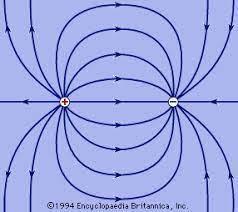
Chapters 17, 18 and 21

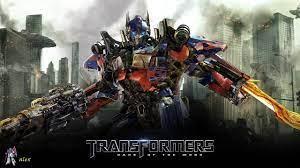
Autumn 2 .
Assessment of Electric Fields, Capacitors and Magnetic fields


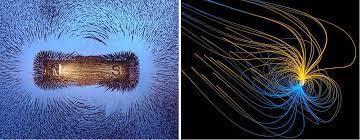
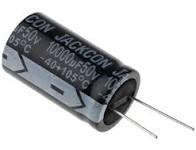
Chapters 22, 23, 24 and 25
Spring 1
Mock exams

Assessment of Nuclear Physics








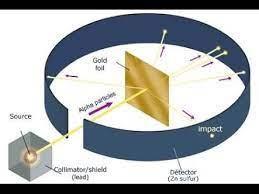
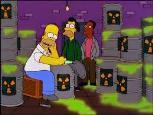
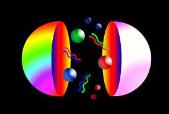
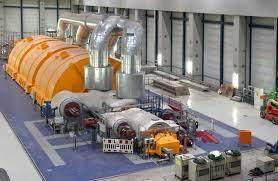



Chapters 26 and 27

1 3 YEAR
Spring 2
Option A Astrophysics
1
2
and Exams.
Assessment of
Summer
Revision Summer
Revision
RP9. Investigating Capacitors Electric Fields Capacitance Magnetic Fields Nuclear Physics RP11 MagneticFlux linkage Mock exam Discharging and Charging Kepler s Laws Charged particles in an Electric field Coulomb's Law Free fall Point Charges Uniform Fields Radioactive decay Generatin g electricity Flux density and EMF Transformer s Farada s law RP12 Radioactive decay Astrophysics Big Bang Astronomical distances Stars and black holes RP10 Force onawire Storing charge Half-life and decay constant Nuclear stability Free fall Uniform fields RP7Forced anddamped Oscillations Resonance Angular velocity Simple harmonic motion























































































































































































































































































